Welcome to our August archive of Essential Politics, our daily feed on California government and politics news. This year’s legislative session closed out at the end of the month.
Take a look at some scenes from the legislative session captured by the L.A. Times.
Find our current news feed here.
Be sure to follow us on Twitter for more, or subscribe to our free daily newsletter and the California Politics Podcast
Here’s a look at some of the Legislature’s most notable moments
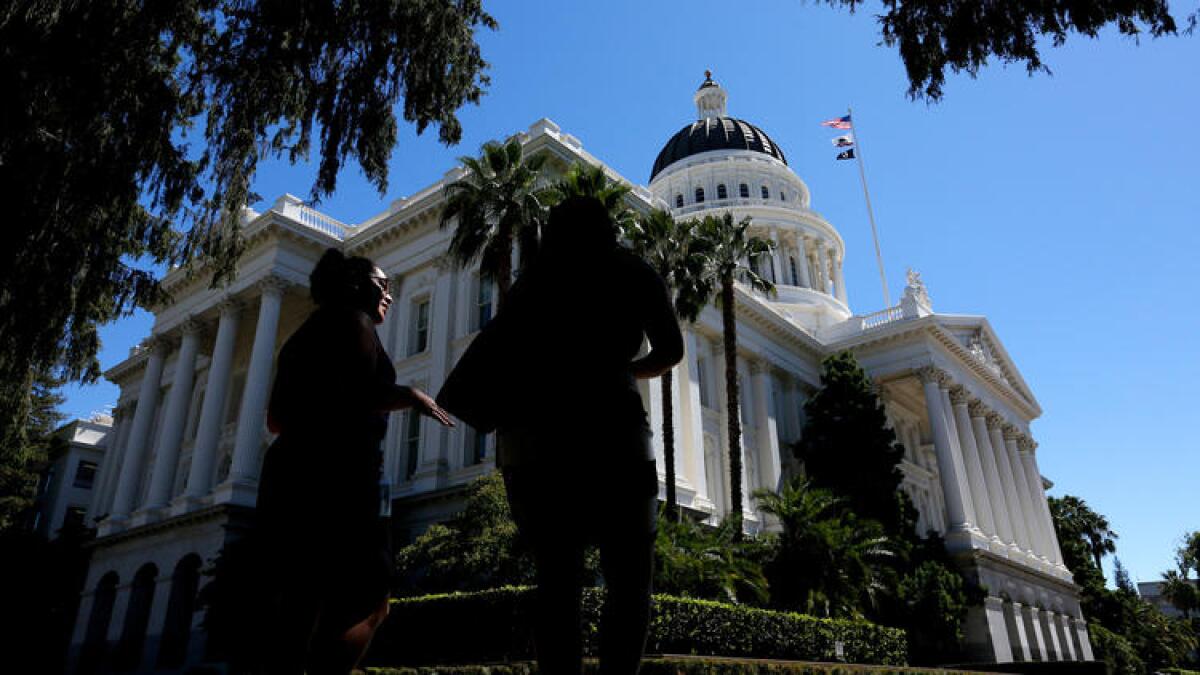
Lawmakers early Thursday morning wrapped up their work for the two-year session of the California Legislature, heaping praise on their many accomplishments.
Even so, at least one major item on the to-do list was never resolved. And some of the battles during this session could leave political scars that last much longer.
Consumers could pay a new battery recycling fee under a bipartisan bill sent to the governor’s desk
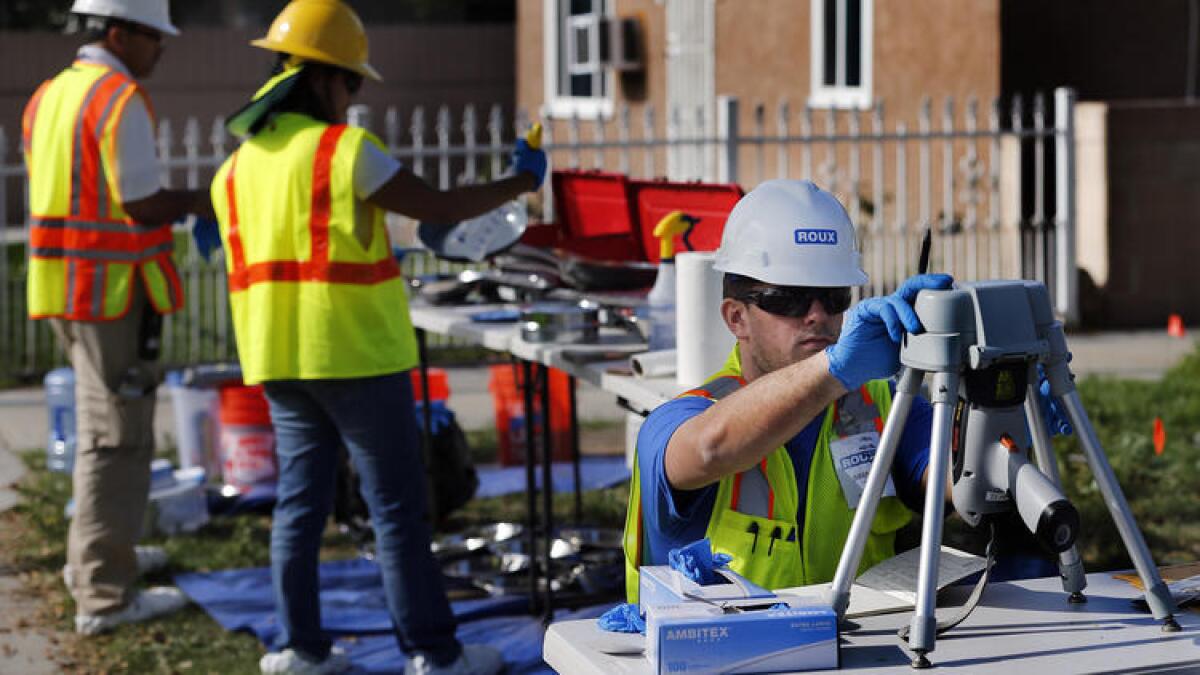
Californians who purchase lead-acid batteries like those used to start cars and trucks would pay a new $1 fee under legislation sent to Gov. Jerry Brown early Thursday morning, with the funds earmarked for cleaning up contaminated sites such as the former Exide battery plant in Los Angeles County.
The fee charged to battery buyers would rise to $2 in 2022. Lawmakers would direct the revenues — estimated to be as much as $40 million a year — to deal with contamination sites as needed.
”For four decades, our community has been waiting for something,” said Assemblywoman Cristina Garcia (D-Bell Gardens), the author of AB 2153.
The bill was the final piece of legislation taken up before the Legislature adjourned, and it received a quick bipartisan vote in both houses within a span of only a few minutes. Garcia said there were late negotiations with the Brown administration on the final details.
AB 2153, if signed into law, would not take effect until April 1, 2017. Battery manufacturers and consumers would each pay $1 fees on each new battery for the first five years of the proposal; after that, the full $2 fee would be shouldered by consumers.
Some Republican legislators said that setup is a mistake.
“This tax is regressive,” Assemblyman Travis Allen (R-Huntington Beach) said during the midnight debate. “It’s paid by the people who make the least amount of money.”
The Vernon site of the former Exide battery plant was closed under a deal with federal prosecutors last March. Lead contamination in the soil of homes around the plant was discovered two years ago. The battery fee would likely go first to Exide cleanup efforts, which are already underway. Brown estimated in February that the price tag could reach $176.6 million.
Sorry, Internet poker fans. It won’t be legal in California anytime soon
After 10 bills over eight years failed to legalize Internet poker in California, the latest plan also died Wednesday in the Legislature amid continued squabbling by competing factions of the gambling industry.
A bill that would have allowed Californians to legally play poker online lacked support from two-thirds of Assembly members and was not brought up for a vote on the last day of the legislative session.
The clock runs out on a major bid to overhaul the state’s energy regulator
Effort to add members to Southern California air quality board fails
Lawmakers say goodbye to their termed-out colleagues on the final day in Sacramento
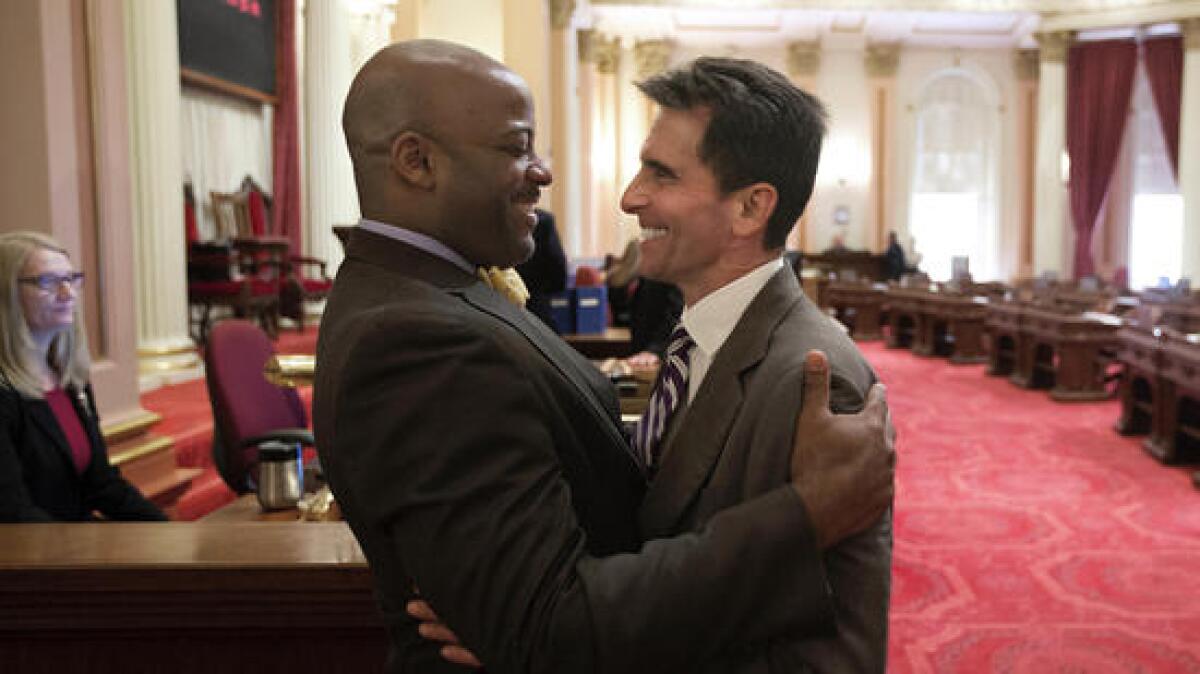
Lawmakers cried, sang, recited limericks and confessed crushes on departing colleagues this week in their farewell speeches for California legislators whose terms are up.
For 14 Assembly members and six state senators, Wednesday likely marked their last day arguing on the floors of their respective chambers. In an end-of-session tradition, lawmakers said goodbye to their termed-out colleagues between voting on bills.
Assemblyman Matt Dababneh (D-Encino) revealed he might have a legislative crush on outgoing Assemblywoman Nora Campos (D-San Jose).
“I will not miss anyone more than I will miss you,” Dababneh told Campos, who is running for state Senate this fall. “Often as a single guy, I get asked ... when are you going to find the perfect girl, and I say, ‘If I find anyone half as amazing as Nora Campos, I would be married the next day.’”
Campos, like the other members whose terms are up, served six years in the Assembly. Termed-out state senators have served eight years. Although new 12-year term limits were passed in 2012, lawmakers elected in 2010, including Campos, are still subject to the old term limits.
Assemblywoman Cheryl Brown (D-San Bernardino) sang “Katcho, Katcho Man” to the tune of “Macho Man” by the Village People while saying goodbye to Assemblyman Katcho Achadjian (R-San Luis Obispo).
Assemblyman Joaquin Arambula (D-Fresno) recited a limerick he wrote for departing Assemblyman Roger Hernández (D-West Covina) that drew chuckles for the line, “As a doctor, I’m happy your blood pressure is lower.”
Hernandez was running for U.S. Congress before allegations of domestic violence involving his ex-wife “crippled” his ability to campaign, he told reporters earlier this month. After a judge issued a domestic violence restraining order against him, he took a nearly three-week leave of absence from the Legislature for high blood pressure.
The speeches featured many bipartisan compliments for departing lawmakers.
Sen. Joel Anderson (R-Alpine) described Sen. Mark Leno (D-San Francisco) as his liberal complement in the Senate.
“This is a sad day for me. You see, Mark completes me,” Anderson said. “I’m sorry I have two more years and I won’t be spending them here with you.”
Assemblyman Richard Gordon (D-Menlo Park) wiped away tears as fellow Assemblyman Brian Jones (R-Santee) thanked him.
“If I have been able to have any effect across the aisle, it’s because of your grace and your compassion,” Jones said. “If I had the opportunity to give back my six years so you could have six more, I would do it in a heartbeat.”
California workers won’t be getting double pay for Thanksgiving Day duty

State lawmakers defeated a measure late Wednesday that would have given retail and grocery store employees who work on Thanksgiving double pay.
Assemblywoman Lorena Gonzalez (D-San Diego), the bill’s author, said it was needed as more and more retailers were extending Black Friday sales into Thanksgiving Day.
“I narrowed and narrowed and narrowed this bill so it only affects the things that concern us the most: the larger retailers who continue to open up on Thanksgiving rather than allowing people to stay home with their families,” Gonzalez said.
No opponents to the measure spoke on the Assembly floor, but numerous business groups, including the California Chamber of Commerce, were against it. They argued the bill unfairly hurts big-box retailers that are competing with online outlets for sales. The measure fell 10 votes short of passage, with both Republicans and Democrats in opposition.
A similar bill from Gonzalez failed last year.
Bill to advance California’s high-speed rail project is sent to Gov. Brown
In the last few hours before the end of session, lawmakers passed a measure to advance the California bullet train project.
Voters approved nearly $10 billion in bonds for the high-speed rail project in 2008, but it has since stalled. The bill passed Wednesday would clarify wording in the 2008 measure and allow some of the money for the project to upgrade existing rail lines.
“It’s a critical investment in our infrastructure,” the bill’s author, Assemblyman Kevin Mullin (D-South San Francisco), said.
But opponents say the bill passed Wednesday alters the voter-approved measure too much.
“This is a revision of what the voters intended,” Assemblyman Jim Patterson (R-Fresno) said.
The bill, AB 1889, now heads to the governor for approval.
An overhaul of California’s taxi regulations passes the Legislature
In potentially a major change to California’s taxi business, state lawmakers passed legislation late Wednesday to centralize control over the industry, an effort supporters said would allow cabs to better compete with Uber, Lyft and other ride-hailing services.
The bill, AB 650, would prohibit local governments from setting taxi rates or limit the number of taxis on the road as well as allowing cabs to pick up and drop off passengers outside specific local jurisdictions. Ride-hailing companies have looser regulations in those areas and have made significant inroads into the taxi business.
“The laws and regulations governing the provisions of transportation services are many decades old and have evolved slowly,” said the bill’s author, Assemblyman Evan Low (D-Campbell). “As with many new technologies, the rapid growth of [ride-hailing] companies has created a disruption in taxis’ archaic model of transportation.”
Under the bill, the taxi industry would be regulated by state departments that handle transportation. The measure exempts San Francisco, which backers of the measure described as having a unique taxi medallion system. AB 650 would take effect as soon as next year, once Gov. Jerry Brown finishes a reorganization of transportation departments.
The bill has caused significant consternation among local governments and within the taxi industry. Last week, the city of Los Angeles voted to oppose the measure unless it was also exempted. Since that vote, Low changed the legislation to accommodate some of the largest objections. Cities will still be allowed to force taxis to pick up in every neighborhood to prevent discrimination and require taxis to accommodate people with disabilities.
Some lawmakers opposed to the bill argued on the Assembly floor that it was rushed.
Assemblywoman Lorena Gonzalez (D-San Diego) also contended that the measure lowered worker protections for taxi drivers in an effort to increase competition with ride-hailing companies.
“Those are such terrible jobs with such few regulations that protect workers that to say the answer to the [ride-hailing] problem, and there is a problem in the sharing economy, is to say, ‘Let’s just forget regulations?’” Gonzalez said. “That may be somebody’s answer, but that’s not mine.”
The bill now heads to Brown’s desk.
Times staff writer Laura J. Nelson contributed to this report.
The clock is ticking towards midnight in the Assembly
A $3.5-billion statewide parks bond will not go forward this year
After facing long odds, $3 billion low-income housing bond is done for the year
A $3 billion low-income housing bond is done for the year.
The measure, which would have put a ballot measure authorizing the bond before voters in 2018, was aimed at helping relieve the state’s huge housing supply deficit, especially for California’s poorest residents. The bill, authored by state Sen. Jim Beall (D-San Jose), didn’t come up for a vote in the Assembly. It faced long odds, needing a bipartisan vote there and then the signature of Gov. Jerry Brown, who had already expressed his opposition.
After a rocky final few months, Roger Hernández quietly finishes his legislative career
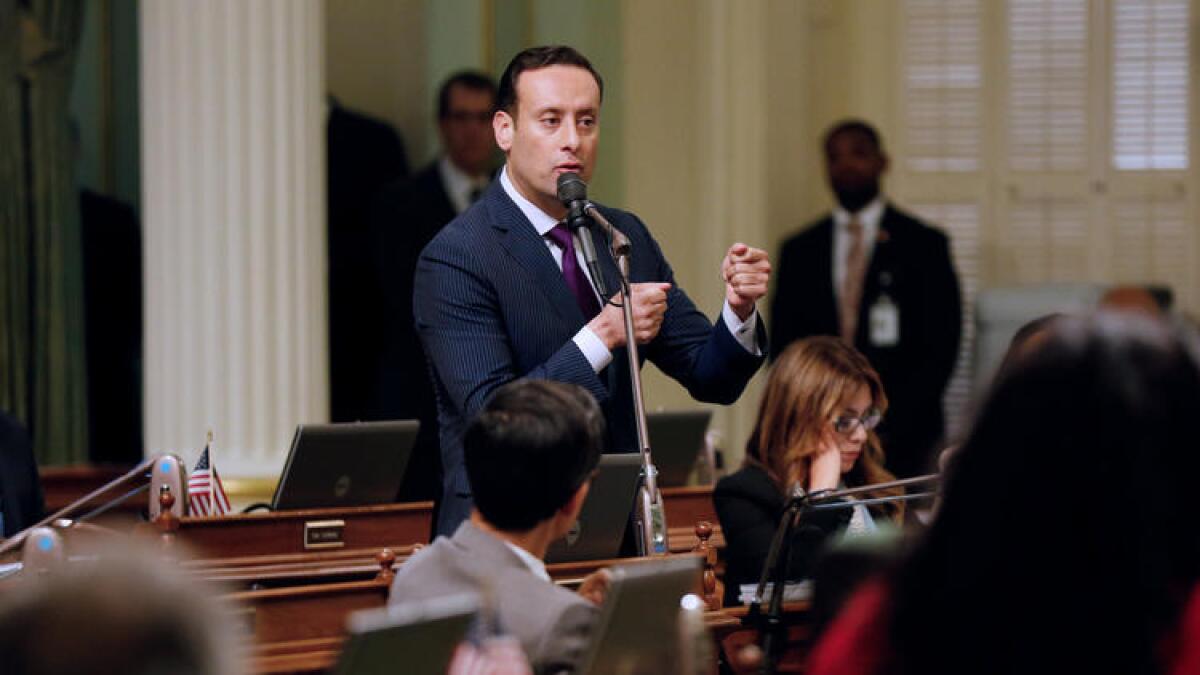
A number of politicians wrapped their legislative careers on Wednesday as the Legislature adjourned for the year, but few face as much uncertainty in the months to come as Assemblyman Roger Hernández.
The West Covina Democrat spent much of the final day of the 2016 legislative session sitting quietly at his desk after returning to Sacramento last week in the wake of a domestic violence restraining order in July. Hernández was then excused on medical leave for the first few days of the August proceedings.
In a final farewell speech in the Assembly on Wednesday afternoon, the lawmaker briefly reflected on some 17 years in local and state public service.
“I leave this floor with great joy and some sadness because I love this job,” Hernández said. “This is my favorite job I’ve ever had.”
In the final legislative hours, Hernández also sought to explain his decision as a committee chairman this summer to kill a closely watched bill to expand the state’s parental leave law — only to then vote for the proposal once it was resurrected by its author, state Sen. Hannah-Beth Jackson (D-Santa Barbara). In a post on his Facebook page, he said the earlier action was because of the original bill’s impact on small businesses.
“I believe the impact on small businesses has been taken into greater consideration in today’s bill,” he wrote on Tuesday.
Hernández recently said that he no longer feels he can mount a campaign for Congress against Rep. Grace Napolitano (D-Norwalk).
The lawmaker left his Assembly colleagues with some advice in his farewell speech.
“There are so many people that are depending on each and every one of us to fight ardently for them.” he said. “You are their champion. Don’t forget that please.”
Planned Parenthood-inspired bill to crack down on secret recordings clears Legislature
It’s already illegal to record someone without their permission in California; under a bill that got final legislative approval on Wednesday, distributing such a recording could lead to even more legal trouble.
The bill by Assemblyman Jimmy Gomez (D-Echo Park) would make it illegal to distribute secret recordings involving a healthcare provider. The measure was inspired by the high-profile videos taken by anti-abortion activists that purported to show Planned Parenthood doctors and employees engaged in illegal sale of fetal tissue. Planned Parenthood was not charged with any wrongdoing, and the organization argued the videos were doctored.
The bill, AB 1671, represents a compromise between Planned Parenthood and media organizations, which were wary that the proposed crime could ensnare journalists.
But approval from Gov. Jerry Brown is not a sure thing; the bill creates a new crime and the governor has rebuffed other efforts to add to the penal code.
Lawmakers approve new climate plans to help California’s disadvantaged communities

Three more measures intended to address climate change in poor and polluted communities were passed by state lawmakers Wednesday night.
They followed on the heels of major legislation approved last week to set a new target for reducing greenhouse gas emissions and to increase oversight of state regulators.
One of the bills, AB 1550 from Assemblyman Jimmy Gomez (D-Echo Park), would refine guidelines for spending revenues from the state’s auction of greenhouse gas pollution credits and would require more money be used to help low-income households.
Gomez said the bill would bring greater equity to the state’s programs.
“Our most polluted neighborhoods are disproportionately home to Latinos, African Americans and other communities of color,” he said.
AB 2722 from Assemblywoman Autumn Burke (D-Marina del Rey) would ensure more state grants awarded through a housing program would go toward disadvantaged communities.
A third measure, SB 1383 from state Sen. Ricardo Lara (D-Bell Gardens), would direct state regulators to crack down on “short-lived climate pollutants,” which include emissions that contribute to global warming and create health hazards.
Gov. Jerry Brown’s office has signaled that he supports all of the proposals.
Lawmakers and Capitol staff, tired as long and final day dragged on, vented on Twitter
Technical difficulties in California’s Capitol
On the last night of the legislative session, the state Senate is going “old school,” said the chief of staff for Senate leader Kevin de León.
Is this the last time a legislative session ends in Sacramento with quickly amended bills?
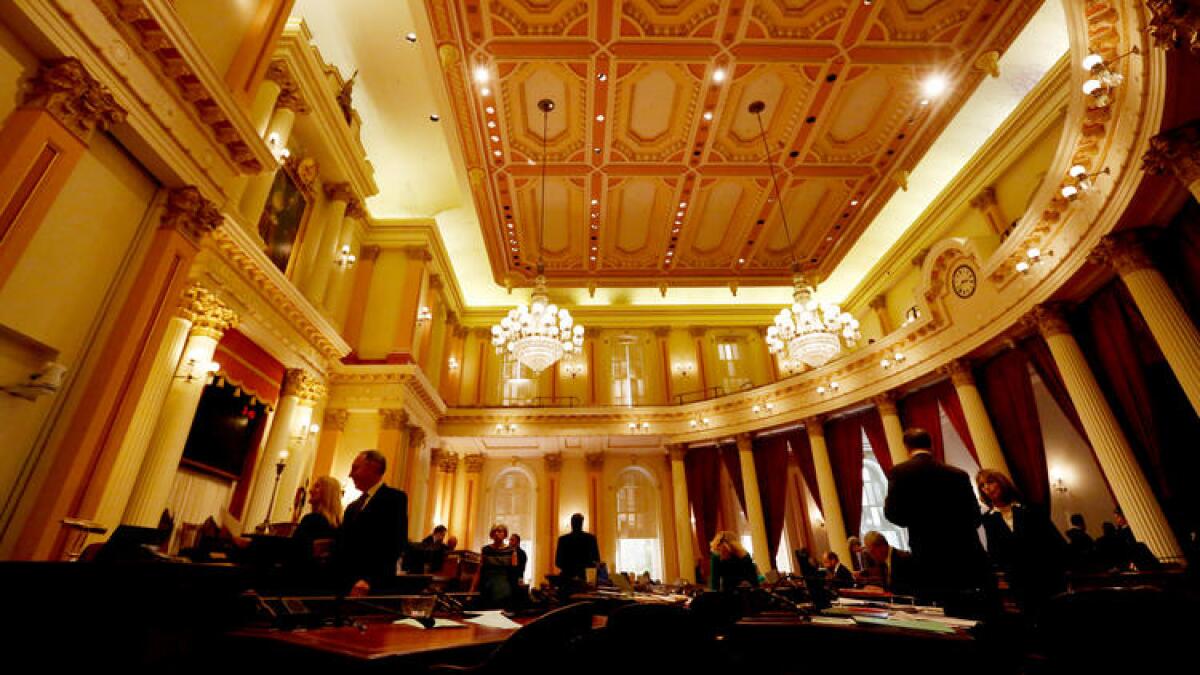
At several points Wednesday night, with only hours before the end of the legislative session, proposed laws were being quickly rewritten and placed in front of weary lawmakers for a fast vote.
It’s a familiar scene at the state Capitol. But one group hopes it’s also the last time it happens.
Proposition 54, which will be considered by California voters on Nov. 8, would require most bills be in print and online for public review for at least 72 hours before final legislative votes.
That would almost completely eliminate a number of bills debated and passed Wednesday, usually brought up “without reference to file.”
The idea behind Proposition 54, written by Republican donor Charles Munger Jr. and former legislator Sam Blakeslee, actually originated in the Legislature. The two men circulated their initiative after the Legislature failed for several years to move the idea forward.
‘Let’s get the Olympics back to California’: Lawmakers OK $250-million spending guarantee for 2024 Summer Games
State lawmakers on Wednesday sent the governor a bill that would allow him to provide up to $250 million in financial guarantees in case the city of Los Angeles goes over budget in its proposal to host the 2024 Summer Olympic Games and Paralympic Games.
Senate President Pro Tem Kevin De Leon (D-Los Angeles) said the authorization is needed to allow the city of Los Angeles to compete to host the Games, which he said are not expected to show a deficit.
“Let’s get the Olympics back to California,” De Leon told his Senate colleagues before they voted to approve the bill. The guarantee is required by the U.S. Olympic Committee and the International Olympic Committee as a prerequisite before any city can be considered for hosting an Olympic Games.
“Hosting the Games in California is expected to generate billions of dollars for the state’s economy,” stated De Leon’s bill giving authorization to the governor. “The city of Los Angeles expects there will be net revenue exceeding expenses that can be devoted to legacy programs for youth and citizens of California.”
New processing standards for medical marijuana would be set under bill sent to governor
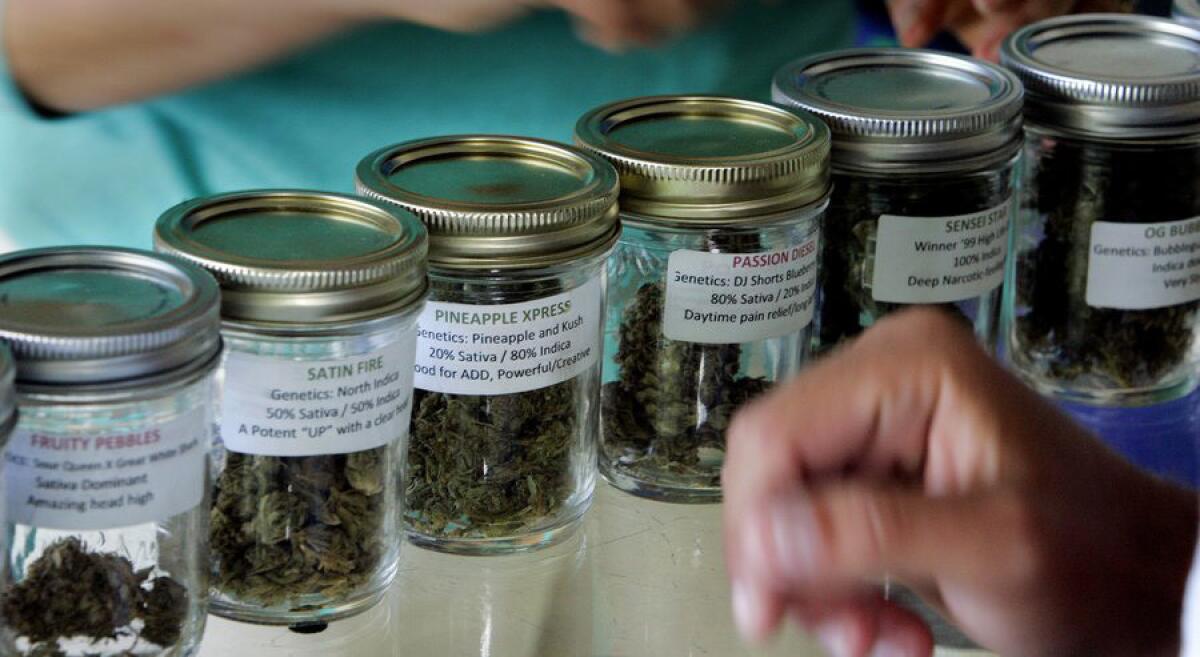
The University of California would conduct a study of the effects of marijuana on motor skills, and new standards would be set for manufacturing medical cannabis products under legislation sent Wednesday by state lawmakers to the governor.
The measure was approved as California prepares to begin issuing licenses to marijuana growers and sellers in 2018 and as voters consider a November ballot measure that would legalize recreational use of pot.
The bill by Assemblyman Ken Cooley (D-Rancho Cordova) and others would exempt collectives and cooperatives that manufacture medical cannabis products from some criminal sanctions if they meet state requirements. The manufacturing must use processes without solvents or processes with nonflammable, nontoxic solvents.
“Recent raids and busts on the ground have highlighted the need for this bill,” said Assemblyman Rob Bonta (D-Oakland), a co-author of the bill.
Cooley said the new manufacturing standards can be enforced by the new Bureau of Medical Cannabis Regulation.
“As the bureau ramps up licensure programs and puts regulations in place, it is important that local governments have clarification about what types of manufacturing and extraction are allowed,” Cooley said.
The measure, which also provides for reporting of license denials, is supported by the California Cannabis Industry Assn., which said it will protect the health and safety of medical cannabis patients.
The study on pot’s effect on motor skills comes as groups opposing recreational use charge that legalization will lead to more automobile accidents in California.
Capitol cracks down on traditional penny toss
Every year at the end of the legislative session, lobbyists and staff members gather on the second floor of the Capitol rotunda and toss pennies off the balcony. If they land a coin in the crown of the statue below, it’s supposed to bring good luck.
Here’s a video of the ritual from 2014.
But some blamed the penny tossing for damage to the statue of Queen Isabella and Christopher Columbus. And with another legislative session ending on Wednesday, officials took steps to cut off the ritual before it began.
Yes, in your backyard: Legislature OKs easing restrictions on building ‘granny flats’ in California
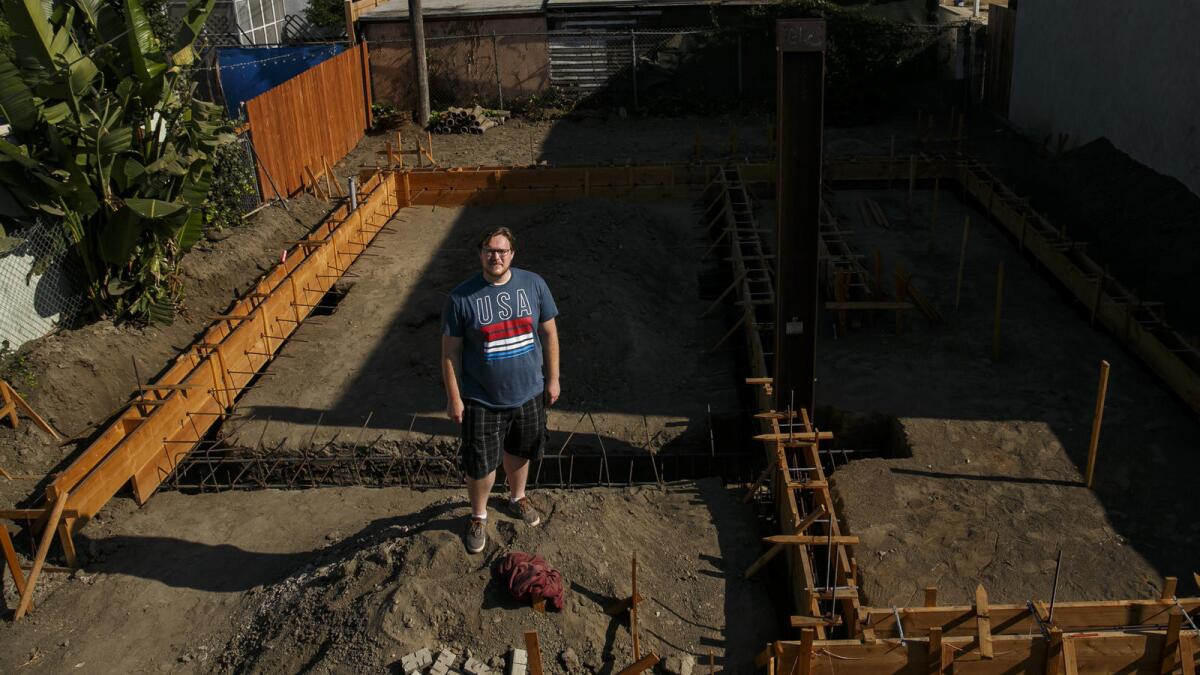
It might soon be easier for California homeowners to convert garages into new residences or build additional freestanding structures in their backyards, after lawmakers approved a measure to streamline restrictions on the units statewide.
This week, the Legislature approved two measures, SB 1069 from Sen. Bob Wieckowski (D-Fremont) and AB 2299 from Assemblyman Richard Bloom (D-Santa Monica) aimed at forcing local governments to approve the secondary housing units, often known as “granny flats.”
“People are shocked and frustrated when they see the enormous fees and requirements that are preventing them from adding a small unit or converting a room in their house,” Wieckowski said in a statement. “SB 1069 will eliminate unnecessary fees and reduce requirements to give homeowners more control over their home.”
Under the two bills, local governments will no longer be able to require homeowners to add parking for new granny flats near transit stops or have a large uncovered pathway to the street, and will limit fees for connecting the additional unit to water and sewer lines.
State lawmakers who have tried to encourage building such units for more than a decade as a way to address California’s soaring housing costs have expressed frustration with local government inaction.
In Los Angeles, for example, all granny flat permitting is on hold after a Superior Court ruling earlier this year found a conflict between local rules and state law. City officials have tried to resolve the issue recently, but are facing opposition from homeowners who argue that the units would hurt the character of neighborhoods.
Gov. Jerry Brown endorsed both measures earlier this year, and is expected to sign them.
UPDATE
Aug. 31, 4:22 p.m. This post was updated after AB 2299 passed the Legislature.
This was originally posted on Aug. 30 at 7:04 p.m.
Wear your jean jacket proudly. Legislature makes denim California’s official fabric
It’s official.
The California Legislature has declared denim the state’s official fabric.
Assemblyman Marc Levine (D-Marin County) presented the wryly named AB 501, while his colleagues displayed jean jackets and joked whether Jordache jeans would be included.
“AB 501 tells both the story of California and global culture,” Levine said.
Levine easily overcame the opposition.
The bill passed 59-3. Gov. Jerry Brown hasn’t weighed in yet.
Uber and Lyft drivers could soon face tougher background checks, thanks to bill headed to Gov. Jerry Brown
Drivers for Uber, Lyft and other ride-hailing services could soon face stricter background checks under a measure that passed the California Legislature on Wednesday.
The bill would prohibit the companies from hiring drivers who are registered sex offenders, have been convicted of violent felonies or, within the last seven years, have a driving-under-the-influence conviction.
The bill’s author, Assemblyman Jim Cooper (D-Elk Grove), said the measure “will help ensure the safety of passengers utilizing [ride-hailing] services.” He noted that prosecutors in Los Angeles and San Francisco last year found 25 people with lengthy criminal histories driving for Uber.
But Assemblyman Bill Quirk (D-Hayward) argued that the measure is too strict and hurts the ability of those with long-ago convictions to find jobs.
“The language in the bill doesn’t take into consideration individuals who committed crimes 10, 15 or 20 years ago, have paid their debt to society and are now model citizens,” Quirk said.
The bill also mandates a maximum $5,000 fine each time a ride-hailing company violates the background-check rules. The measure now heads to Gov. Jerry Brown’s desk.
California lawmakers ask governor to criminalize possession of synthetic drug ‘spice’

Alarmed that dozens in Los Angeles have been sickened after ingesting a synthetic drug called “spice,” state lawmakers on Wednesday sent the governor a bill outlawing possession of the substance.
The urgency measure requested by the California Narcotics Officers Assn. would make a first offense of possession of specified synthetic cannabinoids or stimulants an infraction. A second or third offense could be a misdemeanor. It is already a crime to sell the drugs.
Sen. Cathleen Galgiani (D-Stockton) cited the situation on Los Angeles’ skid row in which more than 50 people have been hospitalized in the last few weeks, many suspected of using the drug.
“These synthetic drugs are a uniquely dangerous threat to public safety,” Galgiani told her Senate colleagues before a unanimous vote to approve her bill, Senate Bill 139.
The measure’s supporters also included the Assn. for Los Angeles Deputy Sheriffs, the California Police Chiefs Assn. and the Los Angeles Police Protective League.
The measure is opposed by the American Civil Liberties Union and the Drug Policy Alliance.
California soon could expand the state’s family leave law to smaller businesses
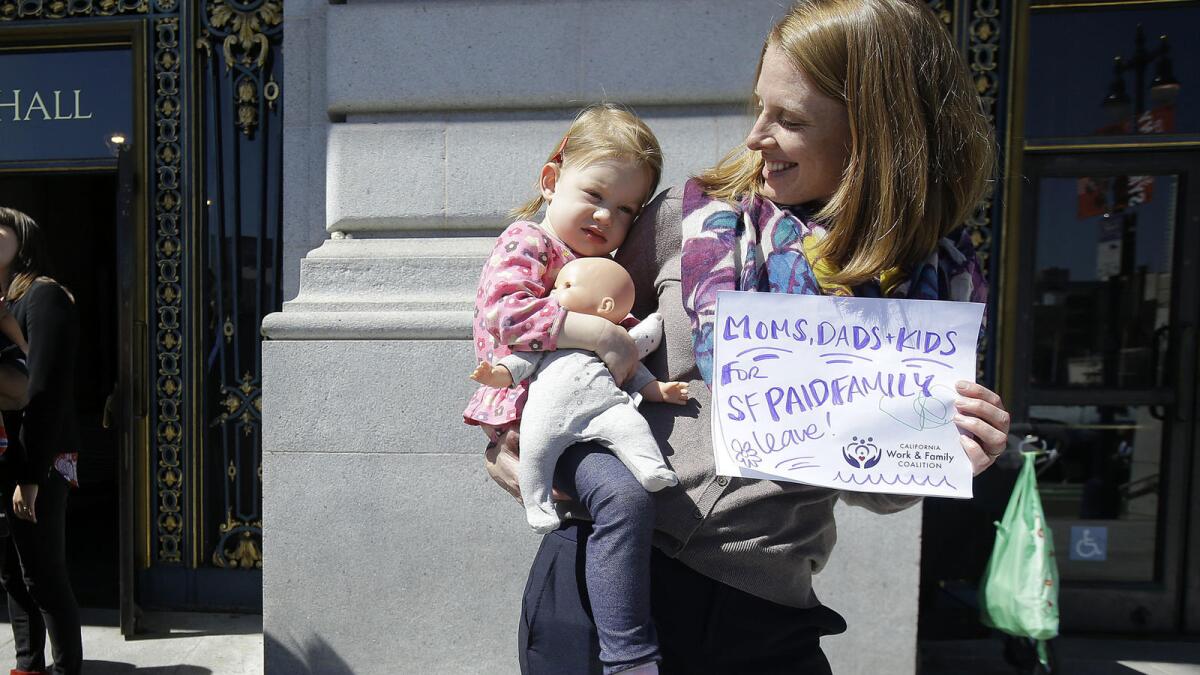
California soon could expand its family leave law to 2.7 million residents across the state, the latest of legislative efforts this session that have sought to assist working parents.
SB 654, dubbed the New Parent Leave Act, is headed to the governor’s desk after it passed out of the state Senate on Wednesday with a 24-12 vote.
The bill would allow parents at smaller companies with 20 to 49 employees to take six weeks’ leave to care for a newborn or newly adopted child, without fear of losing their jobs. Current state law extends only such job protection to those at businesses with 50 or more employees.
The legislation also would allow parents to access the state’s Paid Family Leave Program, which provides up to six weeks of partial wages for some caregiving responsibilities.
Supporters of the bill said it closes a loophole in the state’s family leave law for many employees who already pay for the leave program through payroll deductions and are not eligible for its benefits. But the legislation has faced major opposition from the business community, which has labeled it a job killer, saying it would overwhelm small companies.
On the Senate floor Wednesday, Sen. Jeff Stone (R-Murrieta) said it would hurt small businesses already struggling to meet new minimum wage requirements signed into law this year.
Sen. Hannah-Beth Jackson (D-Santa Barbara) argued her bill would impact only 6.3% of California companies, while helping 16% of its workforce. She said she had done everything possible to address the concerns of small businesses through amendments that narrowed the scope of the legislation.
“But we live in a different world today, colleagues,” she said. “It is a world where both men and women are working. It is a world where both men and women want the opportunity to bond with their newborns, and frankly, no parent should be forced to choose between the well-being of their new child and their family’s financial security.”
The vote Wednesday comes as momentum continues to grow for stronger family leave laws nationwide, and as some tech giants in California have rushed to amend their policies.
The state became the first in the country to guarantee workers paid leave to care for a new child or ailing family member more than 15 years ago. But two main challenges have kept many parents from taking advantage of the law: Some could not afford to take time off because of the limited partial wages offered, while others feared they would lose their jobs if they did.
Gov. Jerry Brown sought to address the first obstacle when he signed legislation earlier this year to help low-income families. That allows people earning close to minimum wage to be paid 70% of their salary while on leave, while workers with higher pay, up to $108,000 annually, will get 60% of their salary during leave. The change takes effect in 2018.
Jackson’s bill seeks to tackle the latter challenge and is a priority of the California Legislative Women’s Caucus, which the senator co-chairs. It faced trouble earlier this year when it was surprisingly killed in an Assembly committee, following friction between Jackson and Assemblyman Roger Hernández (D-West Covina). He was stripped of his committee chairmanship earlier this year after a judge granted his ex-wife a domestic violence restraining order against him
Legislative leaders in both houses have supported the measure’s revival.
Scenes from the end of session
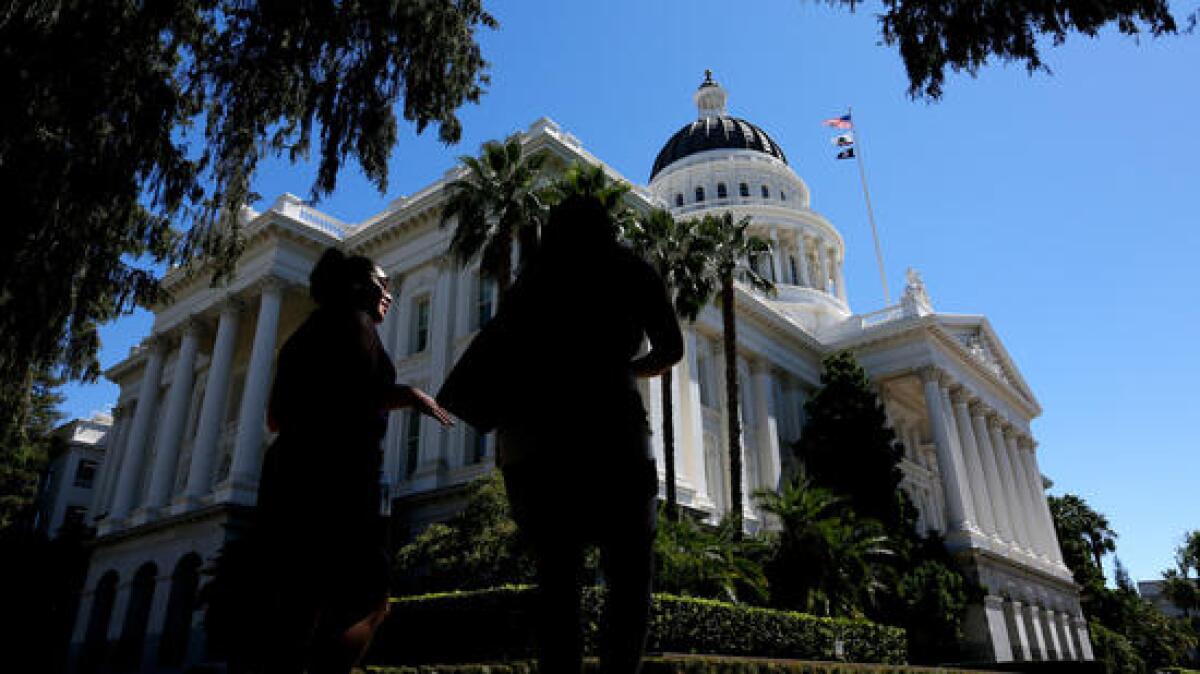
The California Legislature wraps up its two-year session Wednesday. As lawmakers debate and vote on hundreds of bills in the final few days, lobbyists and residents have swarmed the Capitol to advocate on issues ranging from energy policy to farmworker overtime pay.
Here are some images showing what it’s like in Sacramento at the close of session. Click the link to see the full gallery.
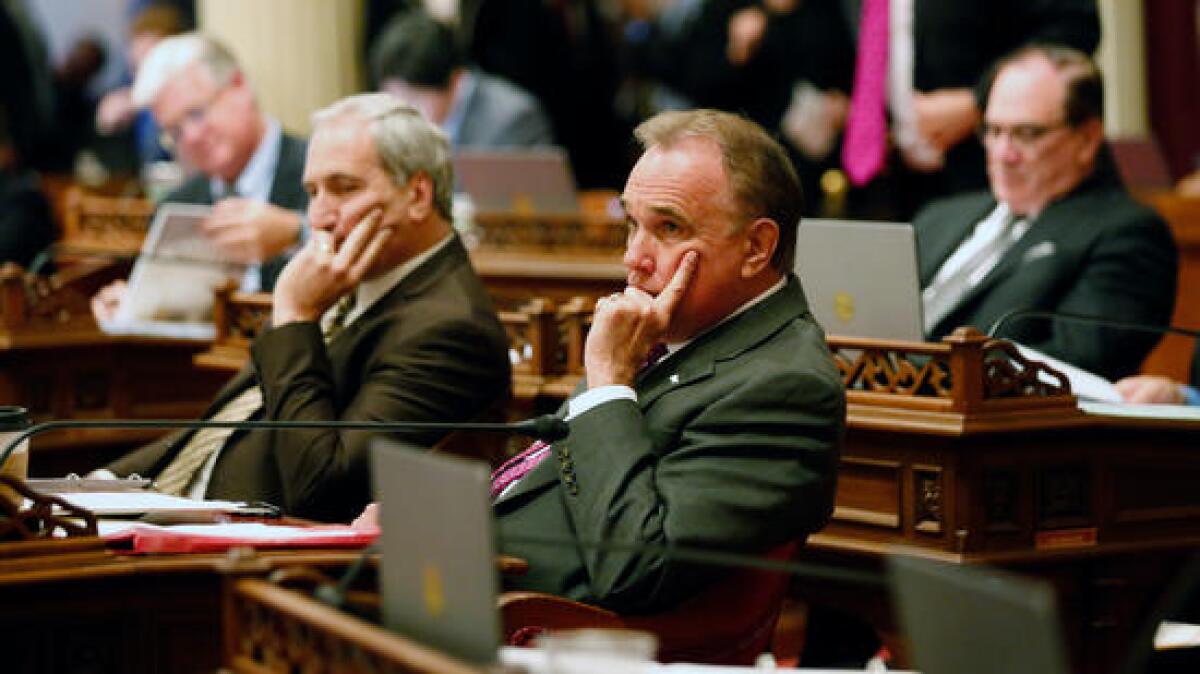

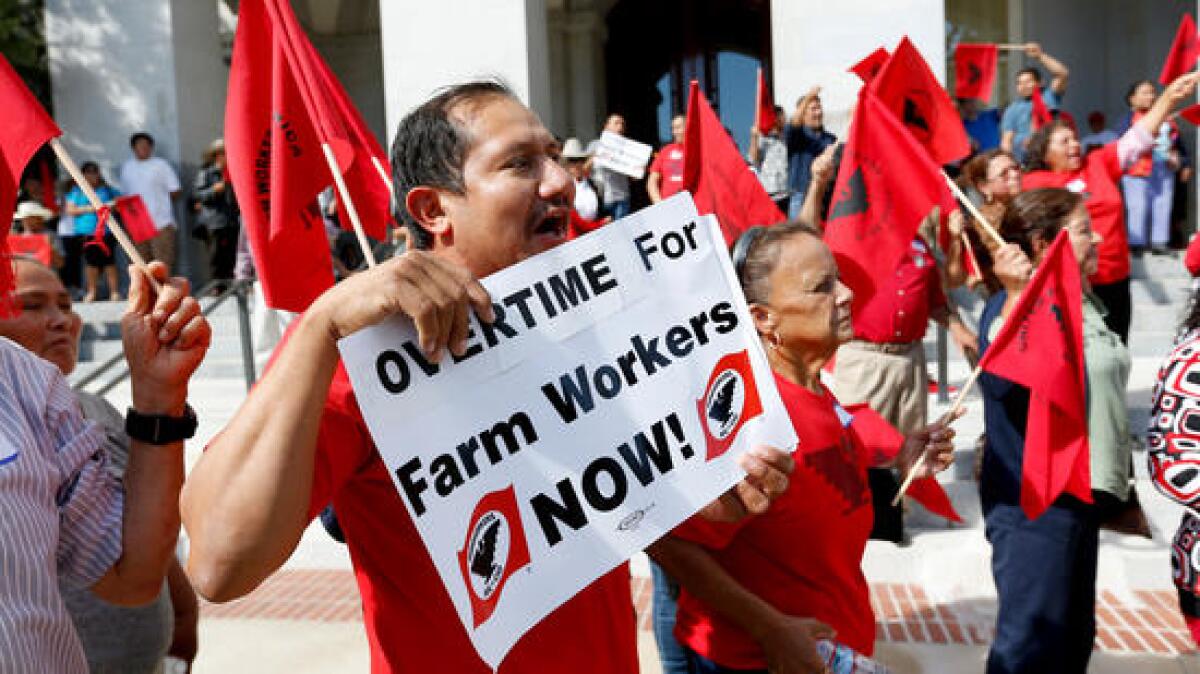
California’s former budget director tapped to pitch in on Puerto Rico crisis
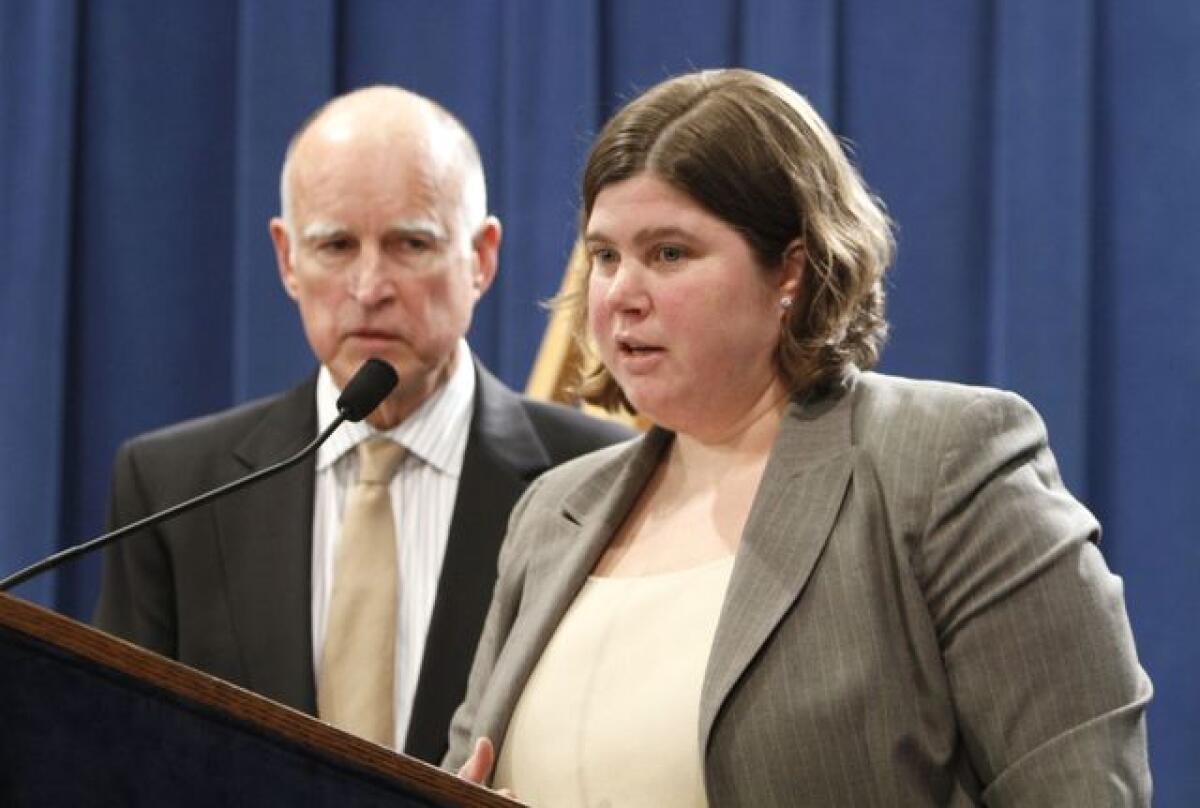
Ana Matosantos, who served two governors as budget director, was appointed Wednesday by President Obama as one of seven members of a financial oversight board to assist cash-strapped Puerto Rico.
Matosantos’ role on the Financial Oversight and Management Board for Puerto Rico, created through a new federal effort to help the U.S. territory through its fiscal crisis, will be to help create a new dialogue between the island’s government and its creditors.
Puerto Rico defaulted on a $422-million bond in May, and faces significant problems in providing basic government services.
Matosantos, 40, left Gov. Jerry Brown’s administration in 2013 and has been in private consulting roles ever since. She also served in the Arnold Schwarzenegger administration.
“With a broad range of skills and experiences, these officials have the breadth and depth of knowledge that is needed to tackle this complex challenge and put the future of the Puerto Rican people first,” Obama said in a written statement.
Gov. Jerry Brown, state lawmakers reach last-minute deal on spending cap-and-trade revenues
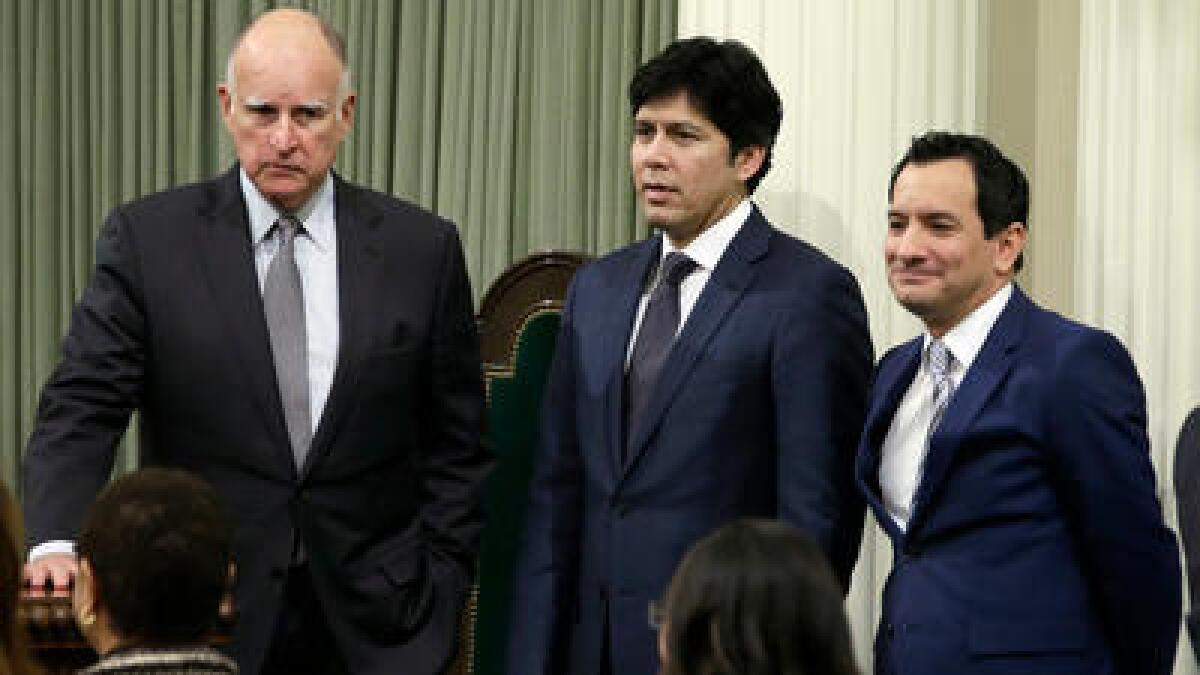
In the closing hours of the legislative year, lawmakers approved a last-minute deal Wednesday to free up hundreds of millions of dollars from the state’s cap-and-trade program to fund green projects across the state. Under the agreement, which broke a two-year impasse, the state will spend $900 million on programs to reduce greenhouse gas emissions — nearly two-thirds of $1.4 billion that has been raised but was tied up unspent in a political stalemate. The money will go toward subsidies for electric cars, new park space and pedestrian-friendly affordable housing. California’s 4-year old cap-and-trade program raises money from businesses that purchase permits to pollute.
The deal was announced on the Legislature’s final day, and was hailed by the governor and legislative leaders. It comes not long after they inked an ambitious plan to combat climate change by extending and expanding California’s targets to reduce greenhouse gas emissions.
“California’s combating climate change on all fronts and this plan gets us the most bang for the buck,” Brown said in a statement. “It directs hundreds of millions where it’s needed most – to help disadvantaged communities, curb dangerous super pollutants and cut petroleum use – while saving some for the future.”
The deal is expected to land on Gov. Jerry Brown’s desk as early as Thursday morning.
The spending proposal is tilted toward urban areas and low-income communities, marking a win for lawmakers who argued their poorer constituents were being left out of the largesse generated by the cap-and-trade program. The final deal included money for energy efficiency upgrades for aging buildings and urban parks, but no money for conservation projects such as wetlands restorations.
Such spending priorities are typically haggled over during the budget process, but for two years, the funds were trapped in political limbo, being held as leverage while politically fraught climate bills were being debated in the Legislature. Another 60% of the auction revenues are not subject to the annual budget process; instead, they are automatically directed each year toward certain projects, including the bullet train and affordable housing.
This new agreement would allocate $135 million for transit projects such as intercity and commuter rail systems.
It would spend $133 million for the state’s main subsidy program for low- and zero-emission vehicles, and another $80 million for a second subsidy for low-income Californians living in poorer parts of Los Angeles and the San Joaquin Valley.
Thousands of consumers were pushed to wait lists while the cap-and-trade funds were held in limbo. Once the budget is finalized, rebates will go out to those already on the waiting list, with priority going to low-income buyers.
It includes $80 million for urban parks and other green spaces. Such projects will be chosen by state and local agencies during a grant process over the next several years.
“The reality is we have many communities…especially in Los Angeles, that are urban asphalt and concrete wastelands,” said Senate leader Kevin de León (D-Los Angeles). He said urban greenery—which can be as small as an alleyway or pocket park — help combat high temperatures caused by vast stretches of asphalt and concrete, leading to lower cooling costs.
The plan allocates $140 million to assist disadvantaged communities to develop their own local efforts to combat climate change, such as city planning that includes affordable housing and pedestrian walkways.
Multiple bills expected to pass in the Legislature late Wednesday add new restrictions on how the money is spent. About half of those who had received subsidies to purchase low- or zero-emission vehicles were earning more than $200,000 a year, according to a state survey. A new bill would limit the subsidy to those making less than $150,000.
Similarly, the spending package includes $50 million to reduce methane emissions from dairy and livestock dependent on a separate bill that would require sharp cuts in these emissions by 2030.
And a third bill creates a new program that encourages disadvantaged communities to develop their own local efforts to combat climate change, such as such as city planning that includes affordable housing and pedestrian walkways. The legislation includes $140 million to fund this effort statewide.
The spending plan is not as expansive as the one proposed by De León earlier this month, which sought to spend $1.2 billion.
Assembly Speaker Anthony Rendon (D-Paramount) had expressed reservations about using nearly all of the available cash in light of dwindling proceeds from recent cap-and-trade auctions.
Facing legal uncertainty due to a pending lawsuit, cap-and-trade auction revenue has sharply declined. The most recent auction, held in August, generated around $8 million. Lawmakers said they hoped the recent extension of the state’s emissions targets — which demonstrated a political will to shore up the program — would restore faith from the markets.
“With this agreement, we take an aggressive approach to investing cap-and-trade funds that provides tangible results for cleaner air and helps lower income Californians benefit from emission reduction programs,” Rendon said in a statement. “At the same time, we are also maintaining a responsible reserve to provide for the future.”
Brown, who has championed setting aside money in the case of economic downturn, appeared even less inclined to dip into cap-and-trade dollars. Asked last week if he backed spending those funds, the governor said he was “committed to spending a little of that money,” placing emphasis on the word “little.”
This post was updated at 12:25 p.m. to include comments from the governor and legislative leaders and again at 11 p.m. to provide more details and context. It was originally published at 11:45 a.m.
White House promises more federal aid for Lake Tahoe region
The White House on Wednesday announced a series of new funding and environmental programs to address the deteriorating health of Lake Tahoe and the surrounding forests caused in part by the increasing temperatures brought about by climate change.
The announcement came just hours before President Obama was scheduled to address the Lake Tahoe Summit, an annual environmental conference that California and Nevada leaders began two decades ago because of concerns about the declining water clarity in the once crystal-clear Sierra lake.
Tahoe’s surface water temperature in 2015 was the highest ever recorded, while annual snowfall levels have been on the decline. The increasing air temperatures in the Lake Tahoe region also have stressed the surrounding forests, causing an alarming increase in tree mortality and fire danger, according to the UC Davis Tahoe Environmental Research Center.
In response, the Obama administration announced the following assistance:
- The Department of the Interior will provide $29.5 million to reduce dead trees and other hazardous fuels to improve forest health and decrease the threat of catastrophic wildfires.
- The Environmental Protection Agency will provide $230,000 to manage and reduce storm water runoff in the Tahoe region.
- The National Forest Foundation, working with the U.S. Forest Service and local communities, announced it has raised over $4 million for creek restoration projects, for sustainable recreation and to improve forest health throughout the nearby Truckee River watershed.
Along with assistance for the Lake Tahoe region, the White House also announced a new partnership between California and the Department of the Interior to assess the future of the Salton Sea.
Bill allowing landlords to bar medical pot use is dropped
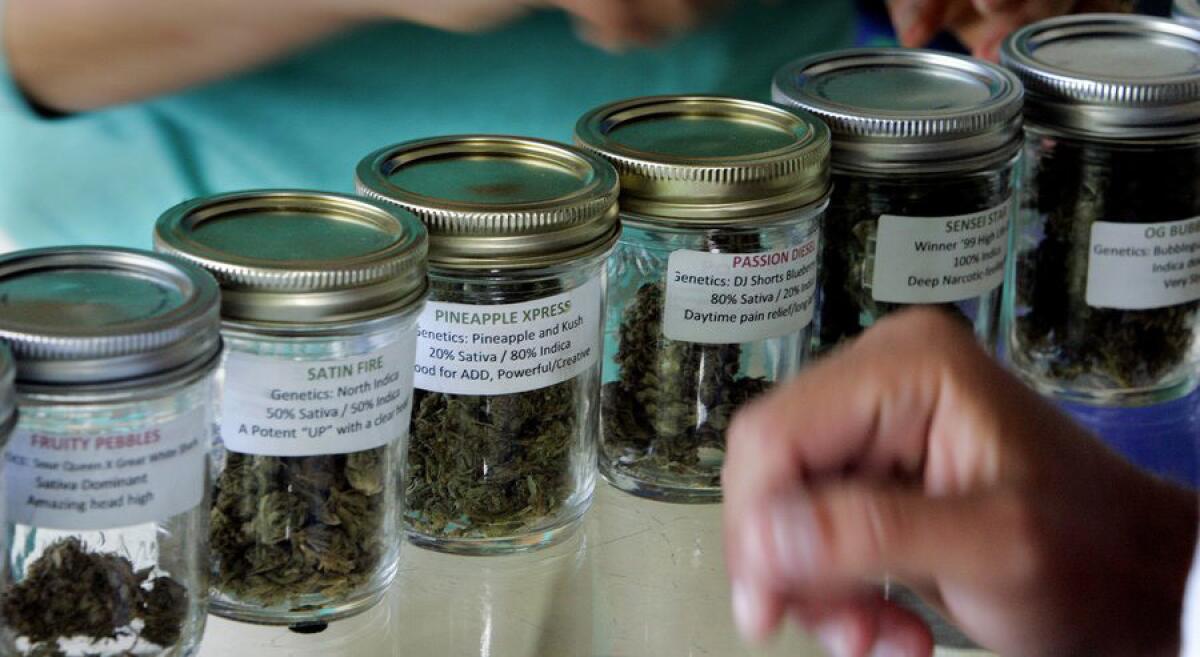
A state lawmaker has dropped a proposal that would have allowed landlords renting apartments in California to bar their tenants from smoking medical marijuana in their residences.
Assemblyman Jim Wood (D- Healdsburg) could not work out an agreement with the chairwoman of a key committee on how to meet the needs of people relying on medical cannabis, an aide said.
Wood had said AB 2300 is needed because secondhand smoke can easily travel through windows, doors and shared ventilation system in multiunit apartments and condos.
“This is about protecting families that live in close proximity to others,” Wood said in a recent statement, adding that there are cannabis products that can be ingested without smoking them.
However, Sen. Hannah-Beth Jackson (D-Santa Barbara), who chairs the Senate Judiciary Committee, thought the bill was too limiting on medical cannabis patients.
“They had a difference of opinion regarding the effectiveness of cannabis delivery mechanisms other than smoking,” said Liz Snow, a spokeswoman for Wood, who said the assemblyman agreed to drop the bill in lieu of Jackson’s continuing concerns.
In the wake of allegations against Bill Cosby, California may end statute of limitations for prosecuting rape
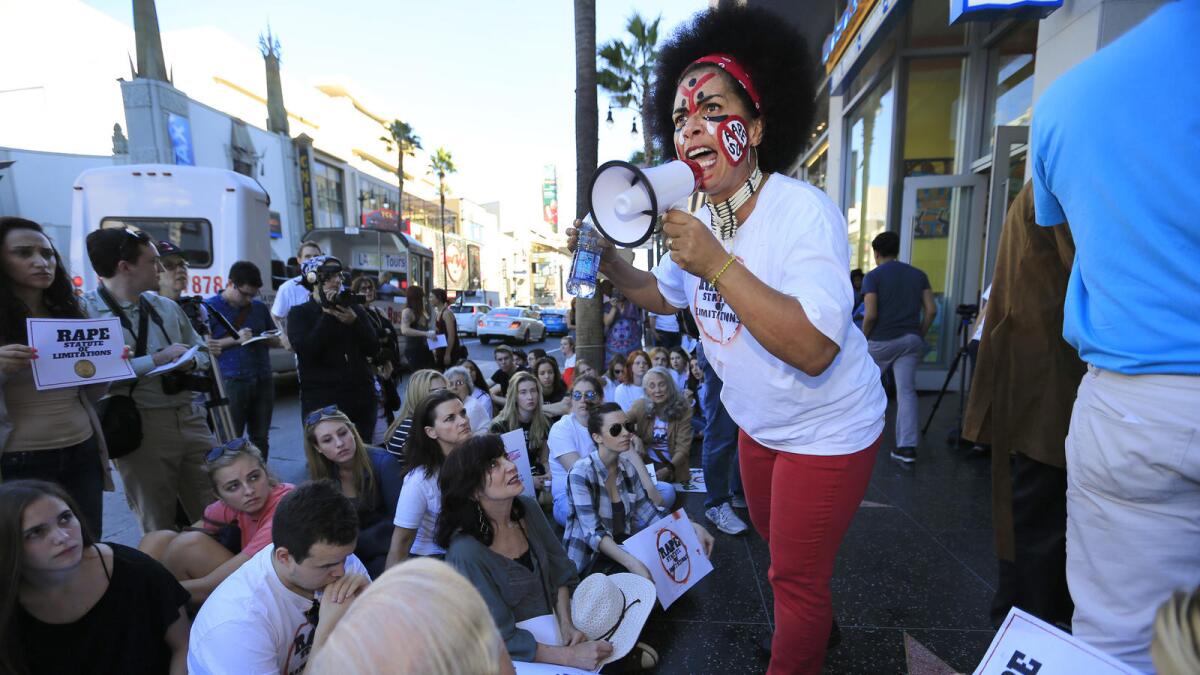
California lawmakers on Tuesday sent the governor a bill to end the statute of limitations for prosecuting rape and other felony sex crimes.
If the governor signs the bill, crimes including rape and child sexual abuse could be prosecuted at any time.
Sen. Connie Leyva (D-Chino) introduced the bill in the wake of news that dozens of women have said comedian Bill Cosby raped them. Most of their cases cannot be prosecuted because the statutes of limitations for those crimes have expired.
“It’s called the Justice for Victims Act for one clear and specific reason: Victims should always have the opportunity to seek justice in a court of law after such a violent act,” Leyva said.
An effort to fix California’s outdated campaign cash database approved by the Legislature
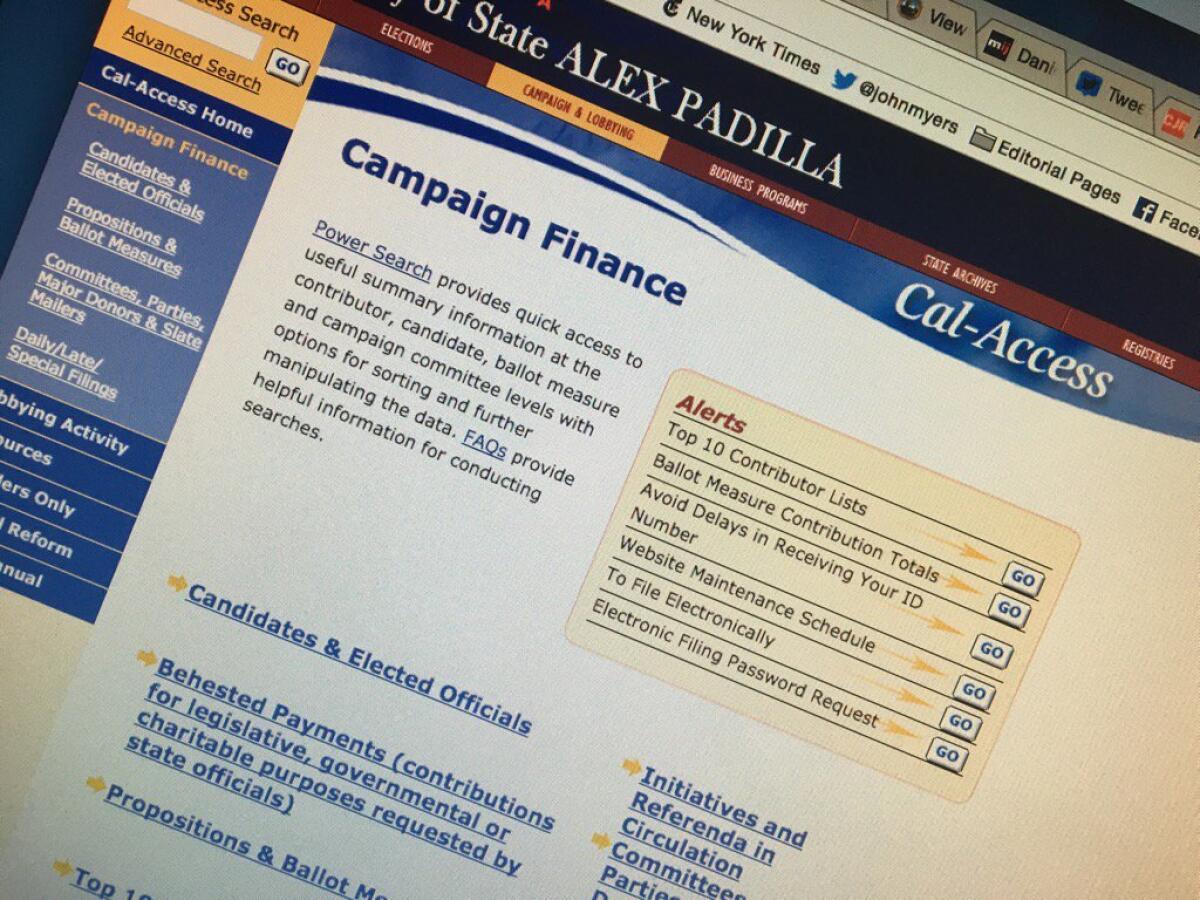
California election officials would have until 2019 to repair or replace the state’s antiquated campaign finance database under a bill sent to Gov. Jerry Brown on Tuesday.
Senate Bill 1349 would require the changes to Cal-Access, the online campaign contribution and lobbying database first created in the late 1990s.
“The last time the Cal-Access program was redone, your mobile phone weighed 10 pounds,” said state Sen. Bob Hertzberg (D-Van Nuys), the author of SB 1349.
The bill does not, however, provide funding for the system overhaul. That cost is estimated at $11.6 million for the actual project, with ongoing costs of about $2.8 million a year to maintain a new system.
New campaign donation disclosure rules rejected by the state Senate
Lawmakers on Tuesday narrowly rejected an effort to create new disclosure rules for California political mailers and money gathered from several donors into a single contribution.
Assembly Bill 700 failed by a single vote in the state Senate, needing a supermajority of 27 senators to pass.
The complex campaign finance bill became ensnared in a disagreement this month over whether it represented more or less donor disclosure. The state’s Fair Political Practices Commission voted to oppose late amendments to AB 700 regarding the disclosure rules for “earmarked” contributions.
The bill sought to address instances in which a political contribution is cash collected from a series of donors who ask the identified donor to then “earmark” the money for a particular campaign.
Jodi Remke, the FPPC chairwoman, wrote in a letter last week that the changes to AB 700 would create a “loophole” for some organizations to bypass the contribution limits.
Supporter of the bill disagreed with the FPPC’s interpretation, but the disagreement may have proved a distraction in the bill’s final days.
Officially not happening
U.S. Labor Secretary Tom Perez tweets support for expanding overtime pay for California farmworkers
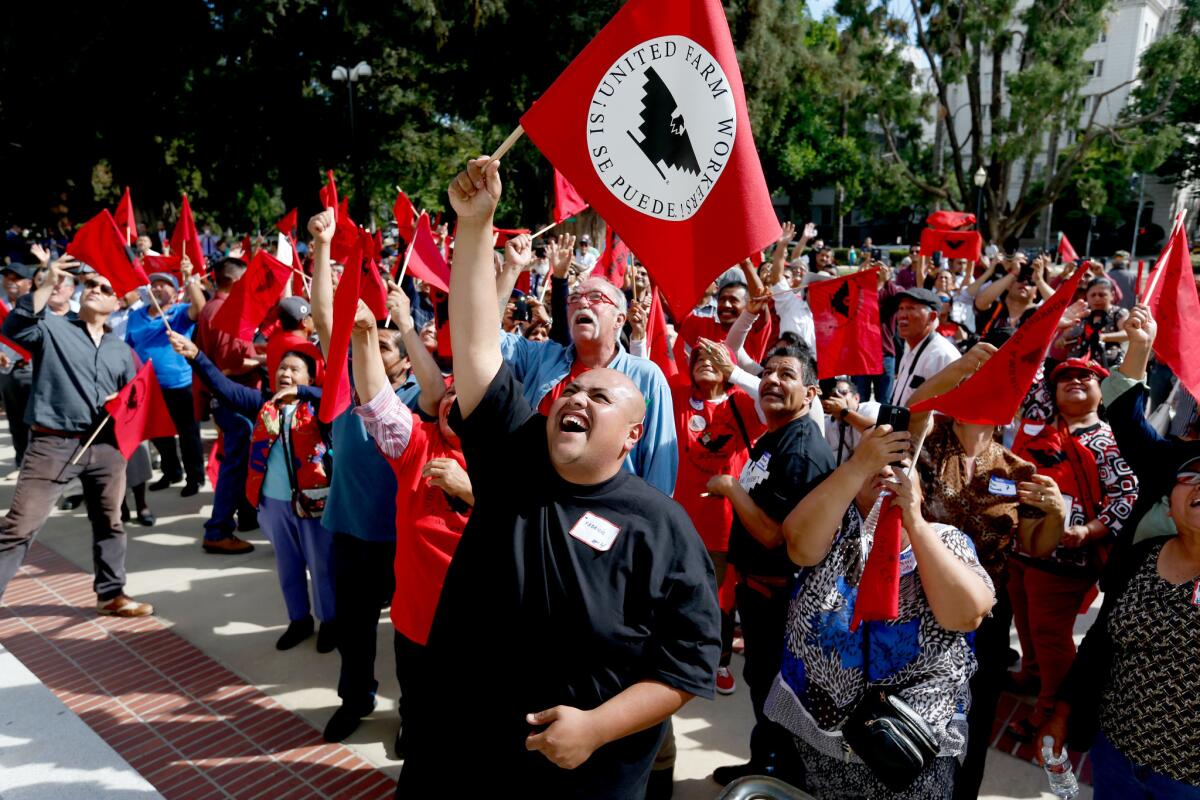
U.S. Secretary of Labor Thomas Perez on Tuesday took to Twitter to voice his support for a California bill that would expand overtime pay for thousands of farmworkers across the state.
Assembly Bill 1066, authored by Assemblywoman Lorena Gonzalez (D-San Diego), is headed to Gov. Jerry Brown after it was approved Monday in a historic vote on the state Assembly floor. Brown has made no indication as to whether he will sign the legislation, and his office said Tuesday he generally does not comment on pending proposals. A spokesman also said he would not comment on Perez’s support for the bill.
The proposal would roll out new rules for farmworker overtime in 2019, lowering the current 10-hour-day threshold for overtime by half an hour each year until it reaches the standard eight-hour day by 2022. It also would phase in a 40-hour standard workweek for the first time. The governor would be able to suspend any part of the process for a year depending on economic conditions.
The United Farm Workers association, which sponsored the bill, said it addressed an injustice inflicted on farmworkers nearly eight decades ago, when they were first exempted from federal minimum wage and overtime standards. The bill has drawn wide and diverse support, including from Democratic presidential nominee Hillary Clinton.
But prominent business groups, led by the California Farm Bureau Federation and a coalition of agricultural producers, have thrown their political weight against it, saying the legislation would devastate the agricultural community and backfire on the workers it seeks to help.
Kamala Harris calls for measures to end the ‘crisis of confidence’ between police and the public
U.S. Senate candidate Kamala Harris on Tuesday called for new national policies to reduce recidivism by felons released from prison and to make data on crime and police actions more accessible to the public.
Harris, California’s attorney general, made the comments during a roundtable discussion on criminal justice at Community Coalition in South Los Angeles.
Harris said there is a “crisis of confidence” between law enforcement and communities that must be addressed. She spoke about how the fatal police shooting of Philando Castile in Minnesota in July and the ambush that killed five Dallas police officers shortly afterward broke “our collective hearts.”
Harris also called for more diversity in law enforcement agencies and additional training to eliminate police bias.
In 2015, Harris launched her agency’s “Open Justice” website, which provides public access to data on arrest rates, in-custody and arrest-related deaths and law enforcement officers killed or assaulted — breaking the numbers down by race and ethnicity, cause of death and other factors.
That is a model of how criminal justice data should be made more transparent nationwide, she said.
“We need to have mandatory data collection. Publication of data,” Harris said. “Which means, those who have the information have to report it. ... And the place where’s its being reported should make it transparent.”
Harris added that “transparency includes universal protocols around body cameras” for law enforcement officers.
Last year, Harris stopped short of supporting statewide requirements for officers to wear the body cameras, including legislation by Assemblywoman Shirley Weber (D-San Diego) to develop statewide standards on how the cameras would be operated and when the footage could be viewed.
Harris, who launched a pilot program on body cameras at the state Department of Justice, had cautioned against using a “one-size-fits-all” approach to regulate their use.
Harris campaign spokesman Nathan Click said there’s been no change in Harris’ position. He said her comment Tuesday was in reference to the findings from the pilot program at the Department of Justice.
Harris is running to succeed retiring Sen. Barbara Boxer and is being challenged by a fellow Democrat, Orange County Rep. Loretta Sanchez.
Cal State students could get help graduating on time under bill sent to governor
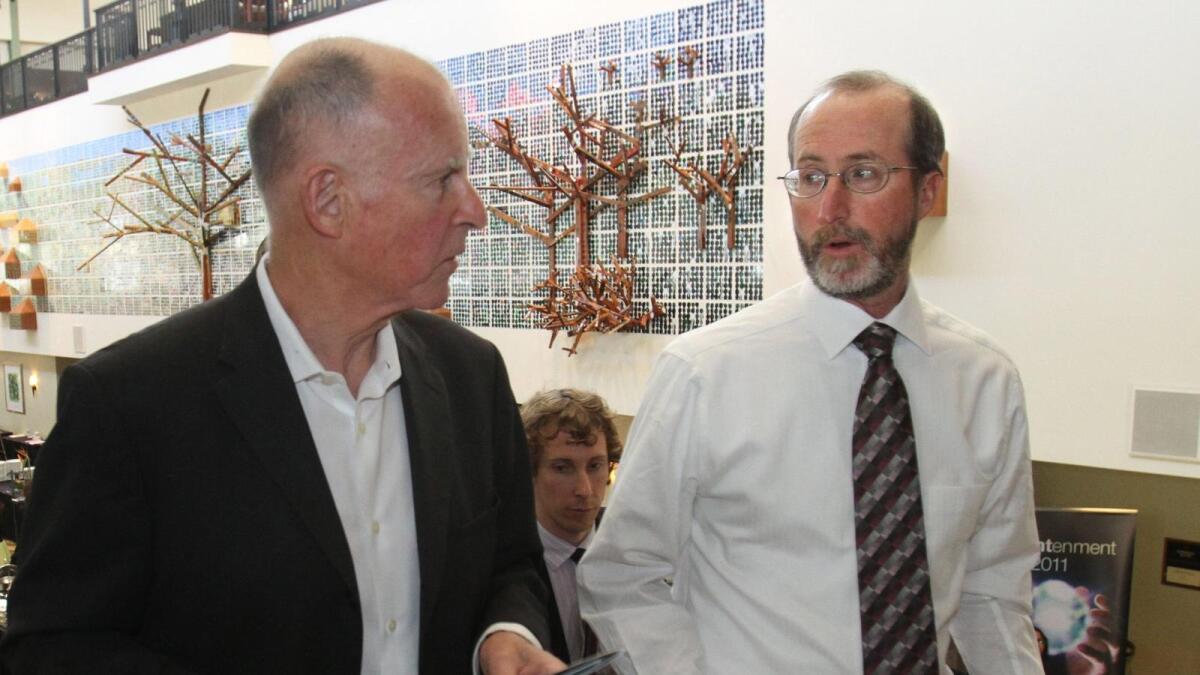
California lawmakers on Tuesday sent the governor a bill that could help students graduate in four years from California State University schools.
Only 19% of students at Cal State campuses graduate in four years, state Sen. Steve Glazer (D-Orinda) said, citing statistics from 2011. Glazer’s bill would create programs at Cal State campuses to help students graduate on time. Students in the programs would receive extra support from academic advisors and priority registration in classes. They would be required to take a minimum number of credits and maintain a qualifying GPA.
Low-income and first-generation students, as well as community college graduates and students from communities with low college attendance rates, would be given priority to participate in the programs. They would also have to be eligible for in-state tuition.
State Sen. Ed Hernandez (D-West Covina) lauded the bill and said it would have helped him when he was in college. He said it took him six years to graduate with a bachelor’s degree from a California State University.
“If I had something like this when I was in college, it would have given me the tools to perhaps graduate in four years,” he said.
State Sens. Robert Huff (R-Diamond Bar) and Pat Bates (R-Laguna Niguel) both praised the legislation, but questioned whether it should be made available to more students. Huff said he wished the program were available to every Cal State student, not just a “limited subset.”
Glazer defended the legislation, saying better graduation rates for a subset of students would save the state money and open spots for other students.
“I’m convinced that everyone will benefit from a more efficient university system,” Glazer said. “This legislation will open up more pathways to student success and four-year degrees.”
Smoking would be banned in California state parks and beaches in bill sent to governor
Amid concerns over health impacts and wildfires, smoking and using electronic cigarettes would be outlawed at California’s 270 state parks and beaches under a bill sent by state lawmakers to the governor on Tuesday.
The measure creates a fine of up to $250 for those caught vaping or smoking a cigar or cigarette, or disposing of the remains of a cigarette on a state beach or park.
“SB 1333 will make our state parks and beaches cleaner and safer by reducing cigarette and tobacco litter, curtailing exposure to second-hand smoke and limiting the threat of park fires,” Sen. Marty Block (D-San Diego) told his Senate colleagues Tuesday before they voted 26-10 to approve the bill. He also said cigarette trash can hurt wildlife and fish.
The bill is backed by the California State Firefighters Assn., the American Cancer Society Cancer Action Network, Sierra Club Sacramento and the Surfrider Foundation.
It has been amended from Block’s original proposal to include a provision allowing the director of the state Department of Parks and Recreation to designate small areas in parks where smoking would be allowed.
Sentencing laws in California could be changed to add language about rehabilitation
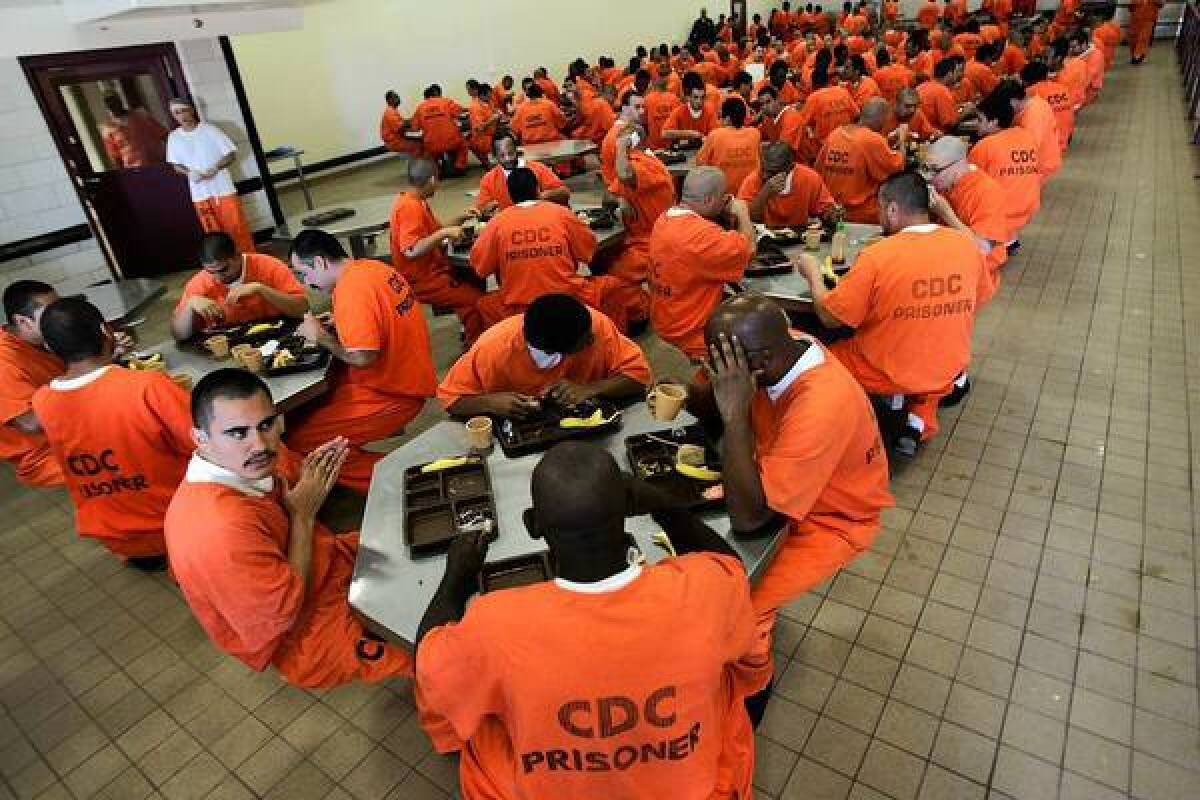
California lawmakers voted Tuesday to add language to sentencing laws that would promote so-called restorative justice.
State law says the purpose of imprisonment is “punishment.” The bill the California Assembly voted to send to the governor Tuesday, AB 2590, would amend the law to state that the “purpose of sentencing is public safety achieved through punishment, rehabilitation, and restorative justice.”
The California Department of Corrections and Rehabilitation would have to update its policies to promote inmate rehabilitation under the bill.
AB 2590 now goes to the governor.
California could see new rules on flying drones in state parks

California soon could have new rules on flying drones in state parks, where regulations on the use of unmanned aircrafts have been vague and vary widely.
This bill, authored by Assemblyman Chris Holden (D-Pasadena), makes it unlawful to launch, land or operate a drone without a permit on lands managed by the California Department of Parks and Recreation and the California Department of Fish and Wildlife. It also prohibits the use of drones in the taking of fish or animals.
AB 2148 moved out of the state Assembly with a 45-15 vote.
Under federal law, unmanned aircraft are prohibited in national parks without a permit, a ban that covers 59 locations and about 350 national monuments, seashores and other sites — about 84 million acres in all.
But there are no blanket rules for California’s state parks, and the state park system has no systemwide drone policy in place.
With such few regulations for drones, Holden said, “it’s like the wild, wild West out there.” He said his bill would create a safer environment at state parks, while allowing some exemptions for drone use, such as for conservation or scientific research and for legitimate newsgathering purposes.
The National Park Service reported at least 10 drone incidents in areas of Washington, D.C., in 2015, including a Dec. 16 citation of a man operating a drone near the Washington Monument.
A drone also was said to be the cause of a big horn sheep stampede in Utah’s Zion National Park, and studies suggest that such aircraft can distress bears, sea lions and gulls.
But critics have called the bill one of several piecemeal solutions that remained after major drone lobbying efforts killed wider statewide drone regulations this legislative session.
California lawmakers approve bill to deny state contracts to companies that boycott Israel
Lawmakers took action Tuesday to prevent California state government agencies from awarding contracts to companies that participate in a boycott of Israel.
AB 2844 requires any company that accepts a state government contract of $100,000 or more to certify that it’s not in violation of California civil rights law -- which, said the Assembly members who wrote the bill, would include companies involved in an international Israeli boycott.
That global campaign -- the Boycott, Divestments and Sanctions movement -- is intended to put pressure on Israel to change its policies until the country ends its occupation of “all Arab lands” and recognizes an independent Palestine.
Other states have taken similar action, and the bill was the subject of eight separate amendments during the 2016 legislative session in Sacramento.
“The bottom line is that the state should not subsidize discrimination in any form,” said the bill’s author, Assemblyman Richard Bloom (D-Santa Monica).
AB 2844 now heads to Gov. Jerry Brown for a signature or veto by the end of September.
Compromise struck on Planned Parenthood-backed bill on secret recordings
A deal has been struck on a controversial bill sponsored by Planned Parenthood to create new penalties for distributing illegal recordings in the wake of high-profile secret videos circulated by anti-abortion activists.
The bill, by Assemblyman Jimmy Gomez (D-Echo Park), had sought to create a new crime for distributing video or audio recordings involving a healthcare professional that were taken without a person’s consent. In California, it is already illegal to make such recordings without all parties’ authorization.
Planned Parenthood argued that adding additional punishment for circulating those recordings was necessary following the controversial videos taped by David Daleiden and other anti-abortion activists that purported to show Planned Parenthood employees illegally trafficking in fetal tissue. The healthcare provider, which has not been found guilty of any wrongdoing, says the videos were manipulated.
“After the video smear campaign last summer, we experienced a ninefold increase in violence against our providers and our health centers,” said Beth Parker, chief legal counsel of Planned Parenthood Affiliates of California.
“With the Internet and the tremendous wildfire nature in which news can be spread now through social media, we need to have a crime against distribution by those in particular who did the illegal recording,” Parker said. “A slap on the hand of a $2,500 fine isn’t sufficient.”
But the proposal immediately raised alarm among civil liberties activists and press organizations, which argued such a penalty could ensnare journalists who are reporting on secret videos.
After multiple rounds of amendments, the two sides appear to have reached a compromise: The bill will now make clear that members of the media cannot be held liable if they did not participate in the initial illegal recording.
“We took precautions to make sure the press could still do their jobs,” Gomez said on Tuesday.
Nikki Moore, legal counsel to the California Newspaper Publishers Assn., said with the anticipated changes — set to be put into the bill Tuesday — her group will move from opposed to neutral on the measure.
“While we find it troubling that this bill potentially criminalizes speech, we realize this bill had political momentum and our immediate concern is to protect newspapers and journalists,” Moore said.
Another opponent of the bill, the American Civil Liberties Union, did not immediately respond to a request for comment on the changes.
Gomez said he wasn’t surprised by the heated back-and-forth surrounding his bill, AB 1671.
“I always knew it’d be difficult to balance the right of privacy and the right of free speech,” Gomez said. “I think that is a tension that we’ve seen in court case after court case and law after law. And we always strive to find that right balance.”
Police agencies could soon charge more for concealed-weapon permits under bill headed to governor

The state Assembly on Tuesday sent the governor a bill that would allow local police and sheriff agencies to increase the fee for issuing concealed weapon permits, removing the current $100 cap and allowing charges that fully recover costs for enforcement.
Assemblyman Kevin McCarty (D-Sacramento) introduced the measure, saying the cap has resulted in Sacramento County facing a budget shortfall of about $250,000.
“Unfortunately, the current fee structure is rigid, leaving a strain on some local budgets,” McCarty said.
McCarty said the bill does not change the requirements for Californians to get a license to carry a concealed weapon.
But Republican Assemblywoman Melissa Melendez of Lake Elsinore said the bill will not prevent gun violence but could result in “pricing people out of their constitutional right” to carry guns.
“It is not going to increase anybody’s safety,” she added.
McCarty countered that the bill will provide cities and counties with “ample resources to do proper vetting to keep [concealed-weapon permits] out of the hands of people who should not have them.”
If you can’t vote in person, this bill would allow anyone you choose to turn in your ballot
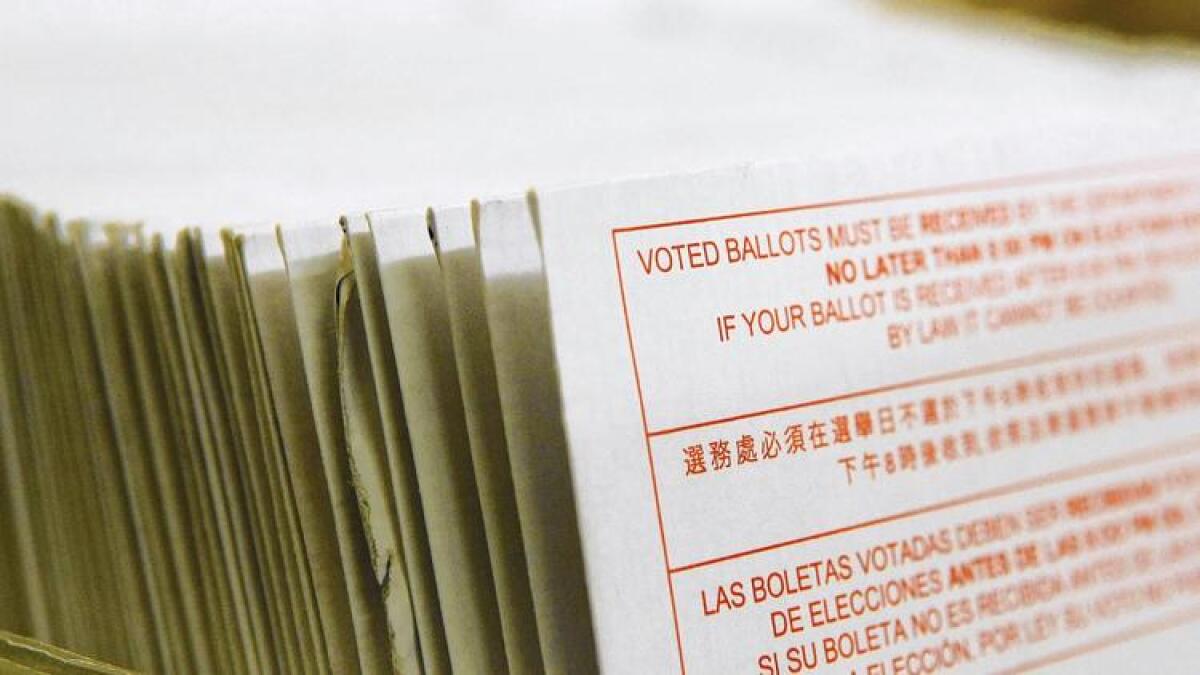
Ballots cast by California voters could be turned in at elections offices by anyone, including campaign workers or political party officials, under a bill sent to Gov. Jerry Brown on Tuesday.
Assembly Bill 1921 removes the language in existing state law that limits help in submitting a vote by mail ballot to close family members. The bill’s author, Assemblywoman Lorena S. Gonzalez (D-San Diego), has said those limitations are an obstacle to getting ballots back in a timely fashion for voters in need of help.
In a legislative committee hearing in June, opponents noted that AB 1921 has no maximum number of ballots a single person can turn in and could therefore open the door to vote tampering during large-scale ballot gathering efforts.
Most other states that allow someone to turn in multiple ballots generally limit it to as many as 10 ballots. AB 1921, however, places no maximum number on those that could be submitted to California elections officials by a single person.
The bill passed with no floor debate on Tuesday in the Assembly. Brown has until Sept. 30 to sign it into law or veto it.
Smoking would be banned on California college campuses under bill sent to governor
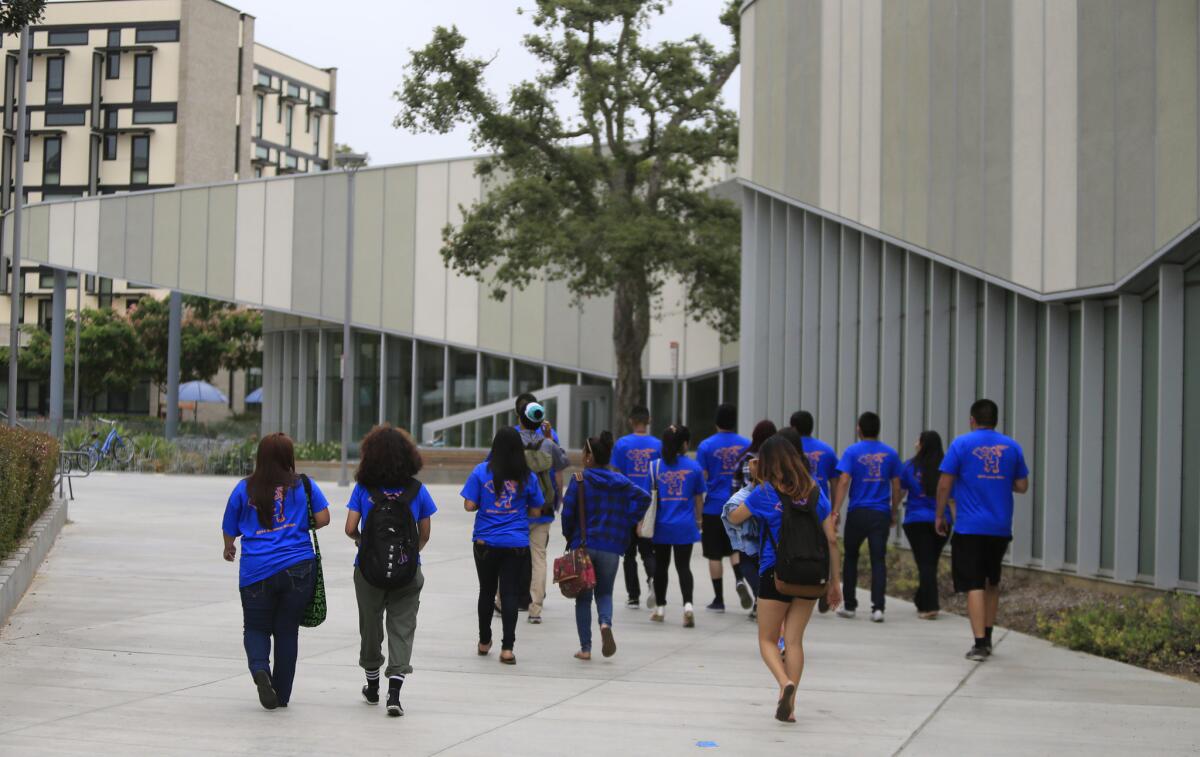
Smoking and the use of electronic cigarettes would be banned on campuses of the California State University and California Community Colleges systems beginning in 2018 under legislation approved Tuesday by the state Assembly.
“We need to promote a safe and healthy environment for the campus staff, students and faculty,” said Assemblyman Kevin McCarty (D-Sacramento), who introduced the measure. “This bill helps address the harmful health effects that come with smoking and secondhand smoke on our college campuses.”
The bill is one of many anti-tobacco measures the governor is considering this year.
It follows the model set by the semi-autonomous University of California system, which adopted a tobacco-free policy that took effect in 2014. The Cal State system is nearing completion of a smoking policy, but the practice is already banned at Cal State Fullerton.
The community college chancellor’s office says 18 of the 72 community college districts, comprising 37 campuses, already have smoke-free policies.
The bill calls for fining violators $25 for the first offense, up to $100 for the third and additional offenses, with the money going to anti-smoking education and cessation programs.
California soon could enhance penalties for sex buyers
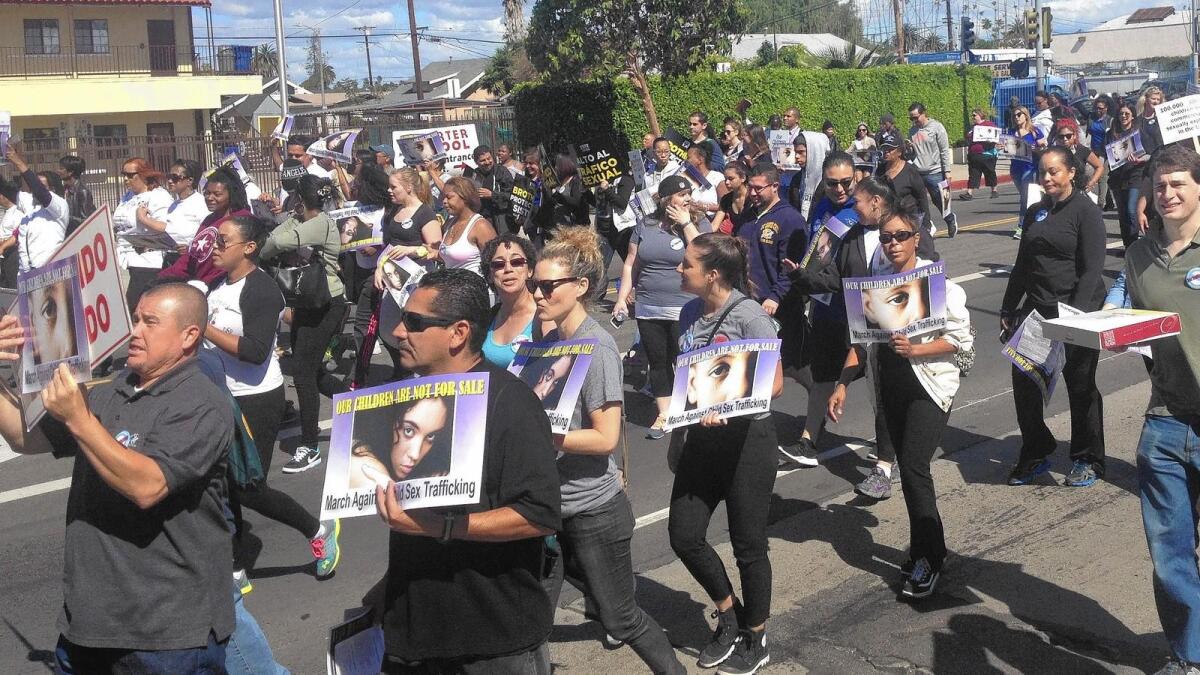
The state Assembly on Tuesday sent a bill to Gov. Jerry Brown that would enhance penalties for sex buyers, one of at least two dozen bills this legislative session that have sought to curb the trade of forced sex and labor.
AB 1708, authored by Assemblywoman Lorena Gonzalez (D-San Diego), would enhance penalties for sex trafficking near schools and impose minimum fines and mandatory minimum county jail terms for people convicted of purchasing commercial sex.
It also would recast the crime of prostitution so that the statute differentiates between people receiving compensation for sex from sellers and buyers of sex.
By redefining the statute, Gonzalez said, law enforcement officials will be able to decriminalize prostitution for victims and increase the punishment for those who fuel the trade. But the bill might be a tough sale to Brown, who has tended to oppose tough-on-crime policies in the past.
California may start giving vouchers for diapers to families on welfare

California families on welfare would receive a $50 monthly diaper voucher for young children under a bill sent to the governor Tuesday.
The bill would provide a benefit to families in CalWORKs, the state’s welfare program, that could be used only to purchase diapers. Starting in 2020, families in the program would receive the diaper benefit each month for each child younger than 2.
The California Assembly passed the bill 54-12. It requires the governor’s approval to become law.
Diapers may soon become cheaper for all families under a separate bill sent to the governor this month. That bill would exempt diapers from California sales taxes.
This post has been updated to reflect an updated vote total.
Assembly members say goodbye to those who are leaving in 2016
Will the Legislature actually wrap up its work early?
State senator introduces resolution to condemn EpiPen price hikes

State Sen. Ed Hernandez’s attempt to push through a drug pricing transparency bill sputtered this year, but the West Covina Democrat still wants his colleagues to weigh in on the latest controversy in the cost of prescription drugs: the surging price of EpiPens.
Hernandez is introducing a resolution that excoriates the anti-allergy device’s manufacturer, Mylan, joining a chorus of federal lawmakers who have accused the company of price-gouging.
The price of the emergency injection devices meant to treat severe allergic reactions climbed to more than $600 for a two-pack — a more than 500% increase since the drug was acquired by Mylan. Following a firestorm about the price hike, the company has since announced will offer coupons to offset the high cost and that it will sell a cheaper, generic version of the drug.
Hernandez’s resolution would urge Congress to investigate Mylan’s near-monopoly on the EpiPen and would urge the federal Food and Drug Administration to reconsider denying approval of generic alternatives.
“The federal administration and Congress have the power to limit the unrestrained ability of Mylan to gouge our health care system, and they should use it,” Hernandez said in a statement.
The measure is the latest sign that Hernandez will continue to hammer pharmaceutical companies on prescription drug prices, even though he opted to pull his measure SB 1010 after it was significantly scaled back earlier this month.
Hernandez, the chair of the state Senate health committee, intends to hold a series of informational hearings about drug prices in the fall, and he plans to invite Mylan’s chief executive to participate in one.
“My experience with Senate Bill 1010 has made me more resolved than ever to bring transparency to these arbitrary and harmful drug price increases,” he said. “In addition to the series of informational hearings on rising drug prices, I will reintroduce SB 1010 in December. However, something must be done now to correct the market for this particular drug.”
The joint resolution will come up for a vote on the Senate floor Tuesday afternoon and will then head to the Assembly. It must clear both houses by the close of the legislative session on Wednesday.
Four human trafficking bills to help victims swept into the legal system head to Gov. Jerry Brown
The state Assembly on Monday sent four bills to Gov. Jerry Brown that aim to provide services to human trafficking victims swept into the legal system.
Measures to curb the forced trade of sex and labor have been highly debated this legislative session. But the following bills passed with little opposition.
Bullhooks to control elephants banned in California
Gov. Jerry Brown on Monday signed legislation outlawing the use of bullhooks to handle and control elephants in California even as many animal handlers have stopped using the devices.
The measure by Sen. Ricardo Lara (D-Bell Gardens) got a boost after similar measures were adopted in the cities of Los Angeles and Oakland, and after Feld Entertainment announced an end to traveling elephants in the Ringling Bros. Barnum & Bailey circuses.
More than 70 Hollywood celebrities including Woody Harrelson, Kim Basinger and Hilary Swank sent Brown a letter urging him to end what they called inhumane treatment of animals.
“California’s commitment to the humane treatment of elephants is strengthened today,” Lara said. “Banning bullhooks removes cruel and horrific treatment against these kind, gentle animals.”
Last year, Brown vetoed a similar measure saying he was concerned it was part of a flurry of bills that was creating more crimes without considering alternatives. Brown declined to comment Monday on why he signed the new bill.
Ed Stewart, president and co-founder of the Performing Animal Welfare Society, which cares for eight elephants at its California sanctuary, said: “By its very design, the bullhook is meant to inflict pain and instill fear. The use of this archaic and inhumane weapon on elephants -- a species that is self-aware, intelligent and emotional -- is abhorrent.”
Was your ballot counted? You’ll be able to find out if Gov. Jerry Brown signs this bill
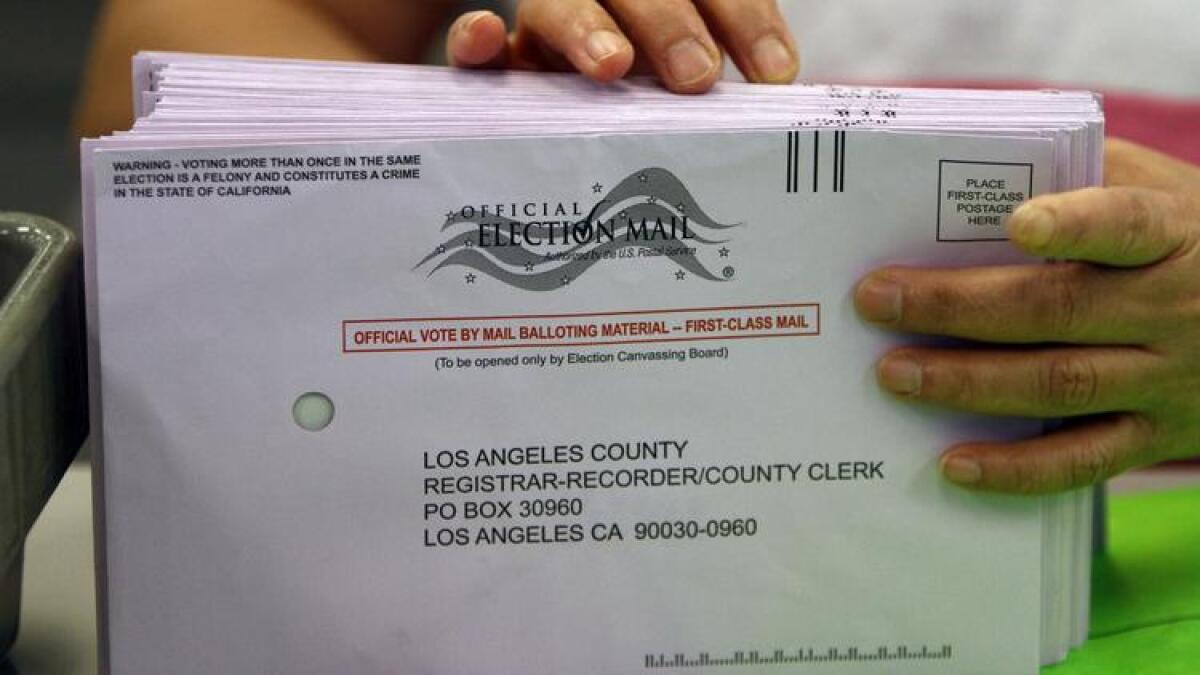
Californians would have a new legal right to be told whether their ballot was counted under a bill that won final approval in the Legislature on Monday.
AB 2089 won bipartisan support in the Assembly and now heads to Gov. Jerry Brown.
The bill’s author, Assemblyman Bill Quirk (D-Hayward), tweeted the news just after the final vote.
In every election, a small number of marked ballots aren’t counted for a variety of reasons -- from arriving too late to being damaged or illegible and beyond.
AB 2089 would require county registrars of elections to set up a free system enabling voters to check what the ultimate outcome was of their own ballot and, if it wasn’t counted, why.
“Many of our constituents whose votes aren’t counted at a registrar’s office never know,” said Assemblywoman Catherine Baker (R-San Ramon).
An effort to impose campaign donation limits on local races is killed by the state Senate
State lawmakers rejected a plan on Monday to place limits on individual campaign donations for city and county offices, races where in some California communities there are no restrictions on the size of a legal donation.
Assembly Bill 2523 was supported by a simple majority of senators, but had been recently amended to require a supermajority vote to actually pass.
The bill would have set the maximum campaign donation in a local campaign at a level equal to those for Assembly and Senate races, currently $4,200. It would have allowed local communities to set lower limits if desired.
Democrats and Republicans disagreed during the Senate floor debate as to whether setting contribution limits would effectively limit the influence of money on local politics.
Floor debate over the bill had just begun when Senate Republicans halted the proceedings and asked for a private caucus meeting of their members.
The bill would have required only a single GOP senator’s support to pass.
Ratepayers will remain on the hook for gas leaks after Assembly rejects new legislation

Though it was approved by the state Senate earlier this year, legislation that would have prevented ratepayers from being charged for natural gas lost during leaks fell far short and stalled in the Assembly on Monday.
The issue gained new attention in the wake of the Aliso Canyon natural gas leak, which lasted four months and forced thousands of people to relocate because of foul air. Although an executive order from Gov. Jerry Brown helped protect ratepayers from covering the cost, there are other, smaller leaks for which they’re still charged.
“If your gas bill is $50 a month, some small part of that is paying for gas you never got,” said Timothy O’Connor, an attorney at the Environmental Defense Fund.
Sen. Mark Leno (D-San Francisco), the bill’s author, said utilities would be more likely to fix problems with their equipment and prevent methane pollution if they couldn’t charge ratepayers for gas that is lost due to leaks or venting.
“Why we should we be paying for the faults in their system?” he said. “We’re paying to work against our own climate goals.”
Advocates said utilities ramped up their lobbying in their effort to kill the measure, which they view as unnecessarily punitive. The bill would “penalize utilities for the value of natural gas lost due to factors outside of the utilities’ control,” said Chris Gilbride, a Southern California Gas Co. spokesman. “This includes venting for safety and reliability, and damage to pipelines caused by third parties.”
Other business organizations, including the California Chamber of Commerce, have also opposed the bill, calling it “yet another burden put onto already heavily regulated industries.”
Measure that would ease building additional housing units goes to the governor
Gender pay equity could be expanded under this measure
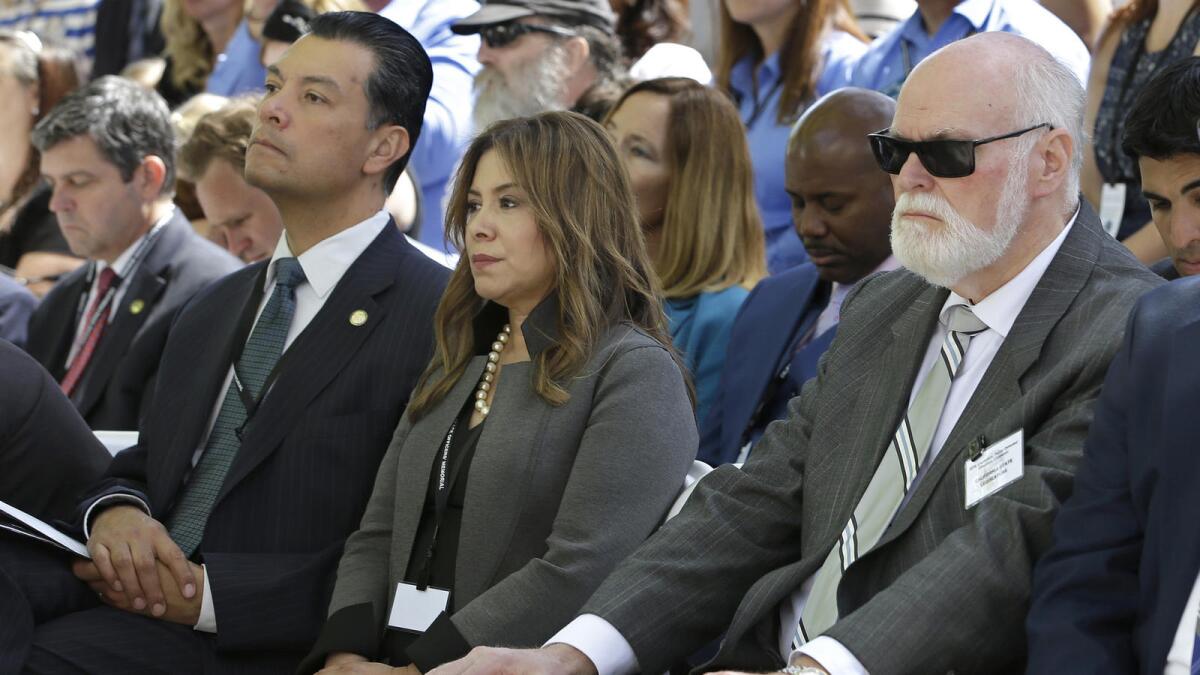
A bill sent to the governor Monday would prevent California employers from paying women less than male colleagues based on prior salary.
The state strengthened its protections against gender-based wage discrimination last year. The bill the state Assembly sent the governor Monday, AB 1676, would add prior salary to the list of reasons women can’t be paid less than men.
Nationally, a woman on average makes roughly 79 cents for every dollar a man makes, according to U.S. Census Bureau data from 2014.
AB 1676, authored by Assemblywoman Nora Campos (D-San Jose), joins another pay equality bill sent to the governor last week that would strengthen protections against wage discrimination based on race or ethnicity.
An earlier version of AB 1676 would have barred employers from asking job applicants about prior salary, but amendments cut that provision from the bill.
The governor vetoed a similar bill last year and said in his explanation that the legislation was flawed because it hindered employers from seeking “relevant information” when determining a worker’s salary.
Major changes in California elections are on the way if Gov. Jerry Brown signs this bill
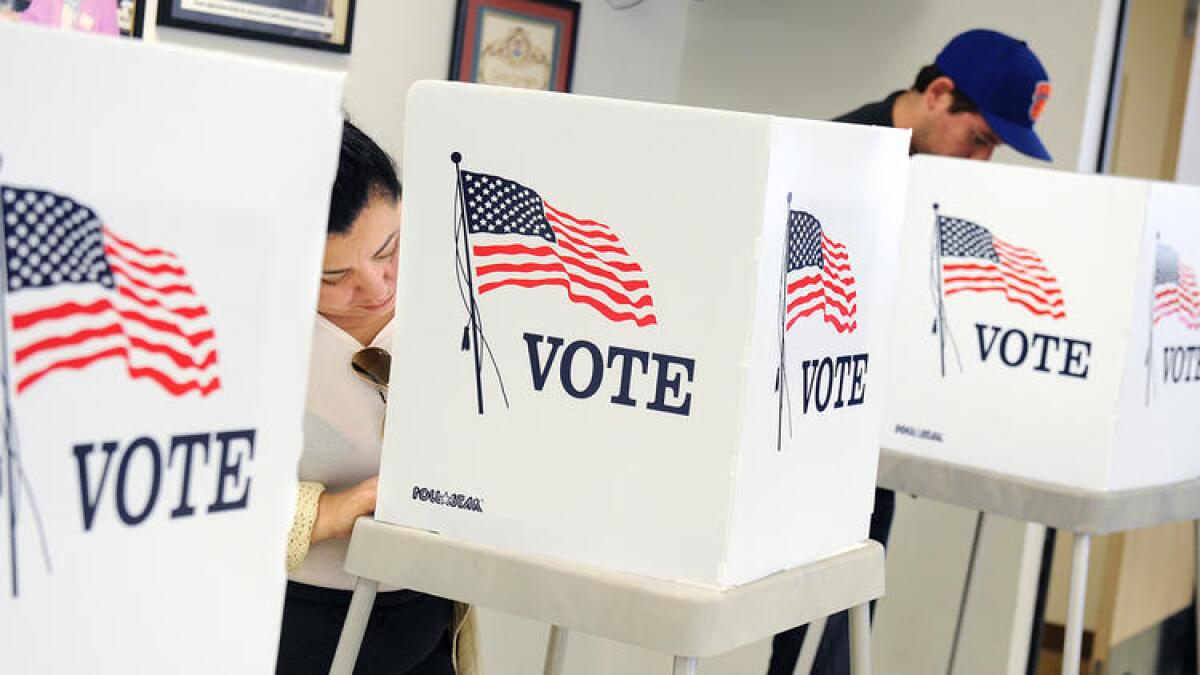
A broad push for millions more California ballots to be cast somewhere other than polling places is now in the hands of Gov. Jerry Brown, after lawmakers on Monday gave final approval to a plan that would allow thousands of neighborhood polling places to be closed.
Senate Bill 450 would focus the work of local elections officials on newly created “vote centers,” one-stop election offices spread out in communities to allow early voting and late voter registration.
Supporters have consistently pointed to low voter turnout in recent elections as the impetus for a substantial revamping of the system.
“We’ve got to figure out a way to implement a new voting model,” said state Sen. Ben Allen (D-Santa Monica), the bill’s author, during Monday’s floor debate.
SB 450 would allow a handful of counties, if they agree to use the new system, to open fewer “vote centers” than polling places in 2018. The rest of California’s counties could follow suit in 2020.
And with the exception of Los Angeles County, those counties would have to mail each voter a ballot. Those ballots could be dropped off at new, secure drop boxes in various places around the county.
(Los Angeles County would have an additional two years to comply with the mailed ballot mandate.)
Sen. Joel Anderson (R-Alpine) voted against SB 450, and said he didn’t believe the bill does enough to address the needs of the disabled when moving away from in-person voting.
Anderson also took issue with suggestions that the system is based on a similarly conceived voting system in Colorado, arguing that Colorado has more strict voter fraud rules than does California.
“We’re not doing the Colorado model,” Anderson said.
New mandatory prison sentence bill inspired by Stanford sexual assault heads to governor’s desk
State lawmakers passed a bill Monday to add mandatory prison sentences for certain sexual assaults – a measure inspired by a Santa Clara County Superior Court judge’s decision not to sentence a Stanford University student to prison in a high-profile case this year.
The June decision by Judge Aaron Persky to sentence Stanford student Brock Turner to six months in jail after sexually assaulting an unconscious woman sparked significant criticism that the punishment was too lenient.
Under current California law, those convicted of rape using additional physical force must serve time in prison. This measure would require the same punishment for sexual assaults of those unconscious or incapable of giving consent due to intoxication.
“If we let a rapist off with probation and little jail time, we re-victimize the victim, we dissuade other victims from coming forward and we send a message that sexual assault of an incapacitated victim is just no big deal,” Assemblyman Bill Dodd (D-Napa), a coauthor of the measure, said during floor debate in the Assembly.
The bill, AB 2888, passed unanimously in the Assembly and now heads to Gov. Jerry Brown’s desk.
Opponents of the measure have argued the state’s history of mandatory sentencing has disproportionately affected people of color and led to the state’s large prison population.
California farmworkers could see overtime expanded in the next decade after historic Assembly vote
In a historic win for farmworkers, California lawmakers on Monday passed legislation that would expand overtime pay for more than 825,000 laborers who bring produce to stores and tables across the state.
AB 1066, authored by Assemblywoman Lorena Gonzalez (D-San Diego), calls for a four year phase-in of new overtime rules beginning in 2019, ultimately resulting in overtime pay for more than eight hours of work in the fields in 2022. It is headed to Gov. Jerry Brown after it was approved 44-32.
The decision followed another intense showdown on the floor of the state Assembly, where a similar proposal died in June four votes short of the majority it needed to pass.
As the vote was tallied, applause broke out inside the Assembly chamber and in an overflow room, where more than 100 farmworkers watched the debate on a livestream feed.
Outside the Assembly floor, Gonzalez exchanged warm embraces with workers and labor union leaders. “These workers have been the face of this bill,” she said. “They’re the ones who pushed it, not just today but for decades in California.”
Arturo Rodriguez, president of the United Farm Workers of America, which sponsored the measure, lauded the workers who came to the Capitol, losing a day of work, to, as he put it, “be able to witness history.”
“These are the men and women who every day ensure that we have fruit, vegetables and wine on our tables,” he said.
During what was an emotional debate, supporters of the bill framed the legislation as a matter of human rights and dignity of work, saying farm laborers deserved the same protections as the vast majority of workers.
Assemblyman Jose Medina (D-Riverside) called the vote an opportunity to correct a wrong against a subset of workers that would do more to honor Cesar Chavez than any ceremony, walk or statue.
Assemblyman Tony Thurmond (D-Richmond) said it was about a simple equation: “A fair day’s pay for a fair day’s work.”
“This is not an attack on those who employ farmworkers,” Thurmond said. “But this is in fact what farmworkers have asked us to do. They have asked us to give them dignity, and we have the opportunity to make history today—history that has been 80 years in the making.”
Opponents said they were frustrated with rhetoric that implied farmers did not care about their workers, calling the bill purely symbolic. In a critique similar to those used by opponents of increasing the minimum wage, they argued it could backfire on farmworkers, as it saddled farmers and growers with higher costs and could force them to limit work hours and hire more employees.
“We are asking our farmers to compete in a global market with a higher cost than any other industry,” said Assemblywoman Shannon Grove (R-Bakersfield).
Assemblyman James Gallagher (R-Nicolaus) argued the bill ignored the will of “people with their hands in the dirt.”
“This bill means they will get less hours, that they will have less money in their pockets,” he said.
The Western Growers Association called the Assembly decision a major disappointment, calling it “short-sighted policy.”
“The members who voted for this bill have placed California farms at an even further competitive disadvantage internationally and with other states,” Western Growers President and CEO Tom Nassif said in a statement.
The issue of farmworker overtime festered in recent weeks into one of the most contentious at the end of a two-year session that has been marked by major internal Democratic strife, with rifts growing between those members aligned with business interests and those allied with labor.
Gonzalez quietly revived her proposal against this backdrop, pushing past the normal procedures used to introduce legislation by replacing the language of an unrelated bill.
United Farm Workers argued it corrected an injustice farmworkers have lived with since they were first exempted from federal minimum wage and overtime standards nearly eight decades ago.
But prominent business groups, led by the California Farm Bureau Federation and a coalition of agricultural producers, countered its provisions further burdened farmworkers already dealing with increased regulations and an ongoing water crisis.
Emotions flared Thursday when hundreds of farmworkers arrived at the Capitol as the state Assembly had been primed to take its final vote. For reasons that are in dispute, the lower house abruptly adjourned without ever taking up the issue, and although Gonzalez contended she had the 41 votes she needed to get the bill passed, the lack of action suggested she did not have the support.
California Assembly Speaker Anthony Rendon (D-Paramount), who rose to the floor in support of the bill and last week promised to do everything in his power to get it passed, said he spent the weekend having conversations and going over wage data with lawmakers who held concerns.
Of the final vote, he said he felt “a tremendous sense of history, a tremendous sense of us doing something right.”
Rendon said Gov. Jerry Brown has not given him an answer when asked if he will support but the legislation, but Rendon said he felt the governor would be thoughtful.
“When you look at farmworkers they are some of the most vulnerable employees in our state,” he said.
At the Capitol, Zulma Priego, 40, said she and her three children would benefit from the decision. “I’m very emotionally moved,” she said. “We have been struggling for this for many years... Today we took a step forward.”
Expansion of farmworker overtime goes to Gov. Jerry Brown
Inmates in county jails can’t be denied visits from family, under bill now on its way to Gov. Jerry Brown
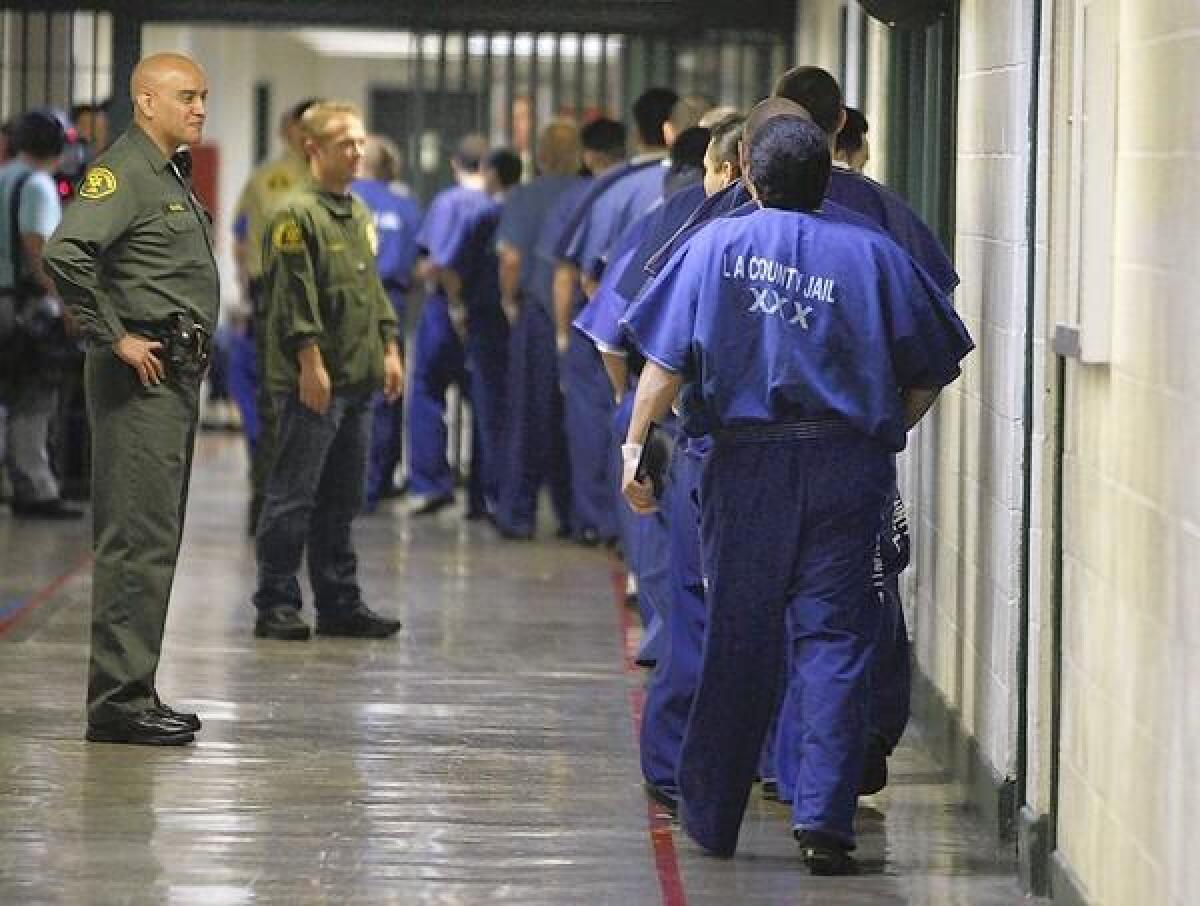
All of California’s county jails would be required to provide visits from inmate family members under legislation approved on Monday by the state Senate.
Senate Bill 1157 would force a change in as many 11 counties that have either fully switched to video conferencing or are in the process of eliminating in-person visitation.
“Without this, it means we will have incarcerated people in our jails who are not able to bond with children or family members for years,” said state Sen. Holly Mitchell (D-Los Angeles), the bill’s author.
Critics have said that existing law has allowed counties to save money by shifting to video-only visitation for inmates. During debate on the Senate floor, Mitchell said that some counties are making money by charging family members to connect long distance via closed video systems.
Republican opponents largely focused on the potential cost for counties that don’t have any in-person visitation space. But some GOP senators lashed out that SB 1157 would allow more illegal items smuggled into jails, and that jail inmates must accept the consequences of their crimes.
”That is the penalty for continuing to victimize their fellow citizens,” said state Sen. Jim Nielsen (R-Gerber).
Counties that don’t offer in-person visits and are instead moving toward video systems would have until 2022 to change their operations.
California on guard after cyber attacks on elections databases in two states
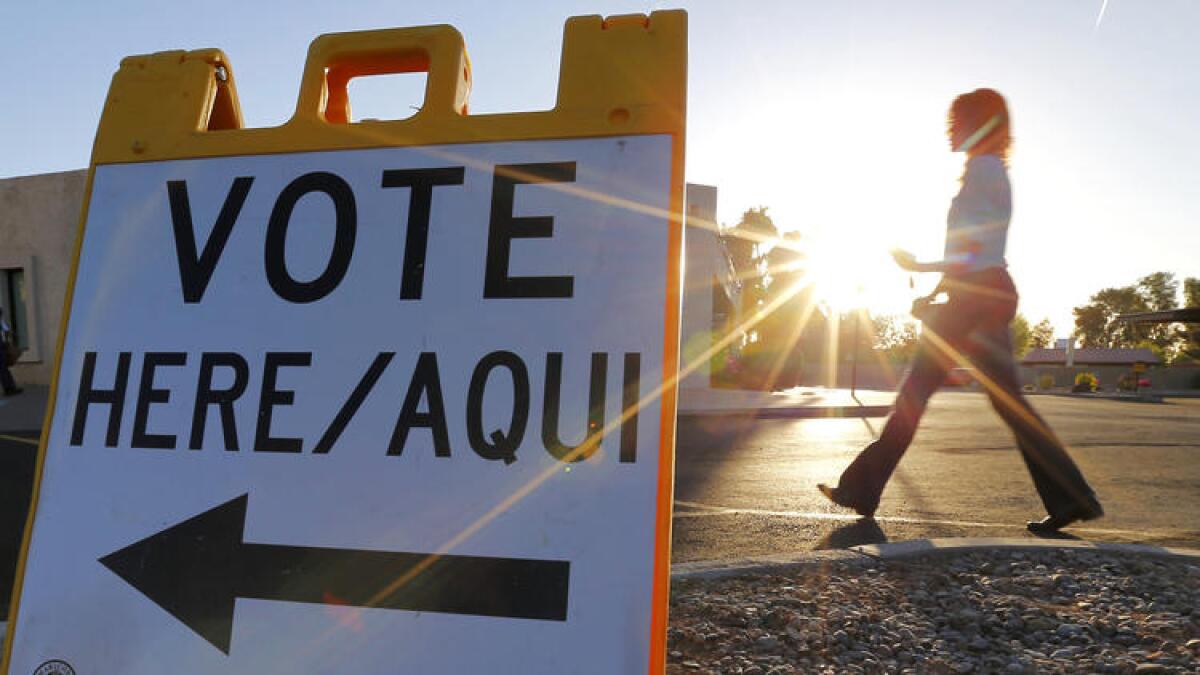
California’s elections agency announced that there is no evidence that the state’s voter registration databases had been targeted by the foreign hackers who reportedly infiltrated elections systems in Arizona and Illinois.
Yahoo News reported Monday that personal voter registration information for up to 200,000 people at the Illinois Board of Elections had been downloaded by foreign hackers.
The FBI issued an alert early this month warning state elections officials about the data breach, according to the Yahoo report.
A spokesman for California secretary of state said the agency, which oversees elections statewide, was aware of the cyber attack reports.
“We have no evidence of any breaches or hacks of our system,” agency spokesman Sam Mahood said.
Mahood declined to say whether any extra precautions are being taken, saying the agency does not disclose its security protocols.
The secretary of state’s website has been down most of Monday but Mahood said that was not caused by a hack or breach.
Unlike some other states, California counties have maintained their own databases of registered voters. However, the secretary of state’s office is in the process of centralizing voter registration information in a statewide VoteCal database, which is expected to be operational in September.
Dean Logan, registrar of voters in Los Angeles County, said the county has a cyber-security unit and outside contractors that constantly monitor all potential threats to the agency’s systems.
“I think that we just live in a time where we have to be really vigilant on this,” Logan said.
Logan emphasized the computer system that scans and counts votes is separate from the voter registration database and is not connected to the Internet or any other outside computers, insulating the system from hackers. That computer system also is housed in a secure facility, he said.
However, Logan said Los Angeles County’s voter registration database is connected to the secretary of state’s computer system, which is why the reports in Illinois and Arizona are so concerning, he said.
“We have been looking at this in conjunction with the larger political dialog about the security of elections system and with the presidential election,” Logan said.
Federal authorities already are investigating cyber attacks in June against the Democratic National Committee and another on the Democratic Congressional Campaign Committee. Federal law enforcement officials have said the hack was likely carried out by Russian intelligence agents.
The release of Democratic Party emails by WikiLeaks just ahead of July’s Democratic National Convention revealed comments suggesting the party was aiding Hillary Clinton over Vermont Sen. Bernie Sanders, violating the party’s commitment of neutrality. Democratic Chairwoman Debbie Wasserman Schultz was forced to resign her post.
Your turn to ask the U.S. Senate candidates a question
It’s been more than 2-1/2 decades since California has had an open U.S. Senate seat, and the campaigns have been very quiet this summer.
As Atty. Gen. Kamala Harris and Rep. Loretta Sanchez (D-Orange) campaign to replace Sen. Barbara Boxer, what do you want to know from the candidates?
The Times’ politics team will be posing a series of questions to the two Democrats about what they would do for the Golden State if elected to the U.S. Senate, and we want your help.
Tweet your questions to @latpoliticsCA by the end of the week and we’ll select some of the best ones to include in our candidate questionnaire.
Do reforms to California’s energy regulator go far enough?
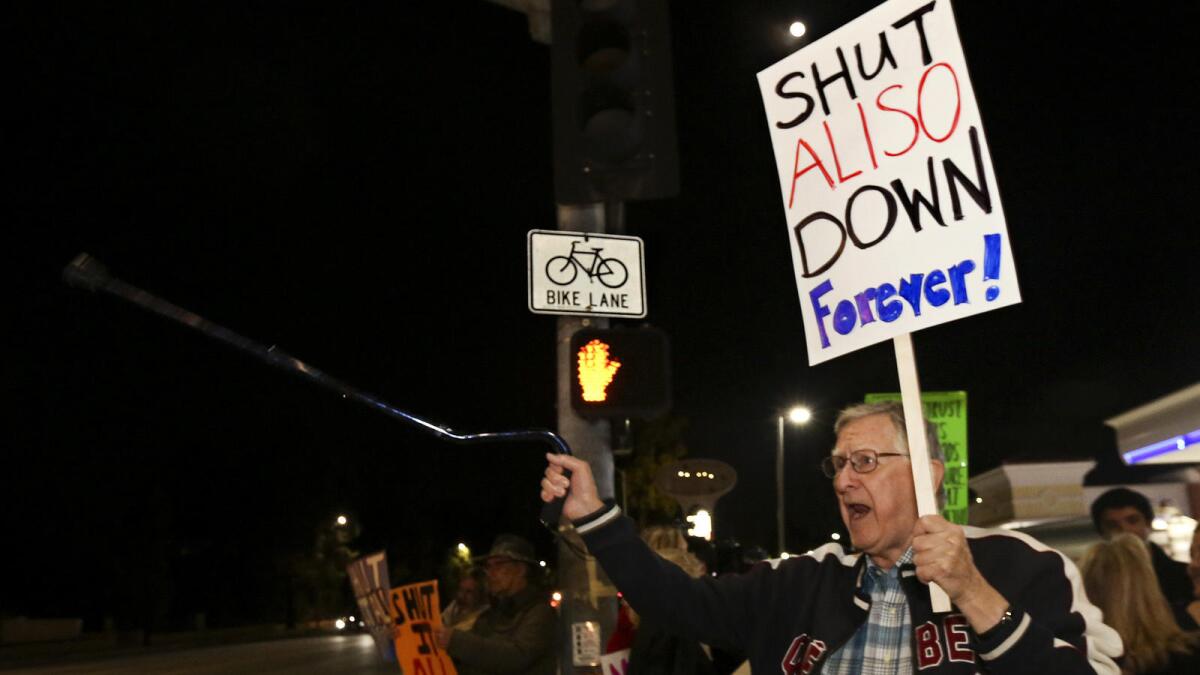
A major overhaul of California’s utility regulator is working through the Legislature with the blessing of Gov. Jerry Brown.
But some advocates and observers are worried that the efforts don’t go far enough to combat the cozy relationships between industry leaders and the California Public Utilities Commission.
Even if the new measures get implemented, energy executives will still be able to meet privately with regulators during discussions about setting electric and gas rates -- though there will be more transparency surrounding the communications.
California Politics podcast: A climate-change deal plus a look at the Legislature’s final three days
It was on, then off, then back on again. This week, the last chapters of the summer’s climate-change agreement were finally written at the state Capitol.
On this episode of the California Politics Podcast, we examine how the deal came together and the lingering impact between factions of Democrats in the Legislature.
We also look at some of the big items left for action in the Legislature’s final few days. And we discuss the impact two longtime statehouse staffers had on decades of California public policy.
I’m joined by Marisa Lagos of KQED News and Anthony York of the Grizzly Bear Project.
Smartphone cases that look like guns will be outlawed under bill signed by Gov. Brown
Cellphone cases made to look like guns are a new fashion trend but they may also put owners at risk, so their manufacture and sale will be outlawed in California under a bill signed Friday by Gov. Jerry Brown.
The legislation was introduced by Assemblyman Jim Cooper (D-Elk Grove) in response to concerns by law enforcement officials that the phone cases might be mistaken by police officers for a real firearm and lead to a violent confrontation.
Some of the cases have a handgun grip and trigger system.
“These devices are fairly new, and this bill takes a proactive approach to stop a problem before it happens,” said Cooper, a former captain with the Sacramento County Sheriff’s Department.
Brown previously has signed seven other gun-control bills, and he has others on his desk.
The latest bill would make it a misdemeanor to import, manufacture or sell smartphone cases that look like guns starting Jan. 1.
The bill is supported by groups including the Assn. of Orange County Deputy Sheriffs, the California Assn. of Highway Patrolmen, the California Police Chiefs Assn. and the California State Sheriffs’ Assn.
Gov. Brown signs bill to block state funding of coal terminals
Gov. Jerry Brown signed legislation Friday that prohibits the California Transportation Commission from providing money for any new bulk-coal terminals in the state, and he urged cities with ports to take action to reduce such shipments.
“I believe action on multiple fronts will be necessary to transition away from coal,” Brown wrote in a signing message. “In California, we’re divesting from thermal coal in our state pensions, shifting to renewable energy, and last year coal exports from California ports declined by more than one-third, from 4.65 million to 2.96 million tons. That’s a positive trend we need to build on.”
State Sen. Loni Hancock (D-Berkeley) authored the bill, which was signed even as Brown noted that the city of Oakland has documented the health, safety and climate effects of coal and banned its shipment through the city.
“Other localities should follow suit — and the state should, too — to reduce, and ultimately, eliminate the shipment of coal through all California ports,” Brown wrote. “That’s why I’m signing SB 1279 and why I will continue to work with the Legislature on further actions to curb coal and combat climate change.”
The bill is opposed by groups including the California Teamsters Public Affairs Council, the California Trade Coalition and the League of California Cities. Opponents said the measure might violate U.S. treaty obligations and commerce laws because it singles out one commodity.
Hollywood skyscrapers and other large L.A. developments could get fast-tracked under law signed Friday
Four proposed mega-projects in Los Angeles could be fast-tracked under a new law signed by Gov. Jerry Brown on Friday.
The measure aims to speed up any lawsuits under the state’s primary environmental law governing development against large projects that also pay high construction wages and meet certain greenhouse gas and renewable energy standards.
The new law, authored by state Sen. Cathleen Galgiani (D-Stockton), applies across the state. And proponents of four projects in Los Angeles have already said they plan to apply for the benefit.
The law says that environmental lawsuits against the projects shouldn’t take longer than nine months to complete, something that the Los Angeles developers believe could get their projects off the ground three years faster than they would otherwise. Here are the four projects that plan to apply:
- A $1-billion redevelopment of the Crossroads of the World complex in Hollywood
- A $200-million hotel and residential development at the corner of Yucca Street and Argyle Avenue in Hollywood
- The redevelopment of Barlow Respiratory Hospital near Dodger Stadium that would add 400 single-family homes to the property
- A $1-billion park created by capping 38 acres of U.S. Highway 101 between Hollywood and Santa Monica boulevards
Opponents of the law had questioned whether the environmental provisions were strong enough to allow for streamlined review in the courts.
It also remains to be seen how much the law will help the projects. None of the six that qualified under a previous version of the law has so far successfully used its provisions to go through court faster.
The new law takes effect immediately.
Santa Ana police officers switch to ‘dual endorsement,’ now support Loretta Sanchez and Kamala Harris for Senate
California women could soon pick up a year’s worth of birth control pills at once
California women could receive a year’s worth of birth control pills at once under a bill sent to the governor Friday.
The state currently prevents pharmacists from dispensing more than three months’ worth of oral contraceptives at one time. Most women pick up their birth control prescriptions every month or every three months.
The bill’s supporters say allowing women to pick up more pills at once will help prevent unintended pregnancy, especially in rural areas where women must travel long distances to visit a pharmacy.
No more killer whales: Legislature sends measure banning orca breeding and performances in California to governor
California theme parks would be banned from breeding orcas or featuring them in performances for entertainment purposes under a bill the state Senate sent to Gov. Jerry Brown on Friday.
SeaWorld, the park featured in the critical 2013 documentary “Blackfish,” announced in March that it would stop breeding orcas.
The legislation passed Friday would prevent theme parks and other organizations in California from starting similar breeding programs in the future. The bill needs the governor’s signature to take effect.
The orca provision is part of a budget-related bill that would be wrapped into the $171-billion state budget the governor signed in June.
Lawmakers push school bus safety bill after fatality
Nearly a year after a special needs student died in Whittier after being left in a sweltering bus parked with its windows closed, state lawmakers on Friday sent the governor a bill that would require new safety steps for school bus drivers.
Sen. Tony Mendoza (D-Artesia) named his bill after Hun Joon “Paul” Lee, 19, a student at Sierra Adult School who could not verbally communicate and needed special care.
“No parent should fear that their child will not return home safely at the end of the day,” Mendoza said. “My hope is that SB 1072 will prevent future tragedies by requiring every school bus in the state to be equipped with a child-safety alarm system.”
The measure requires school buses, youth buses and child care motor vehicles to be equipped by the 2018-19 school year with alert systems that force drivers to manually disarm or scan an alarm at the rear of the bus before exiting the bus.
The bill also requires school districts to improve the training of drivers to avoid students being left on buses alone and requires notification of the Department of Motor Vehicles of some incidents involving students being left behind.
House Democrats join Clinton’s ‘alt-right’ message targeting GOP
For months House Democrats have been attempting to tie down-ballot Republican opponents to the controversial statements of Donald Trump.
Now Democrats have a new campaign bogeyman around which to build their attacks after Democratic presidential nominee Hillary Clinton opened a sharp line of attack in a speech Thursday: the so-called “alternative right” or “alt-right.”
In her remarks, Clinton accused Trump of “taking hate groups mainstream” and referred to the alt-right as a “racist ideology.”
So what is the alt-right? Different things to different people, or as The Times’ Evan Halper puts it: “a loosely organized network of anti-establishment activists on the right that helped fuel the GOP nominee’s rise.”
Regardless, it did not take long for Democrats on Thursday to pick up on the new line of attack.
The Democratic Congressional Campaign Committee pounced on an op-ed whose author said he is a volunteer for first-term Republican Rep. Steve Knight, who is in a tight reelection fight against Democrat Bryan Caforio in California’s 25th District.
“I have seen the power of the new ‘alternative right’ movement, and this is the future I want to see for our country,” the op-ed says.
While the Democratic campaign committee criticized what it called “Knight’s acceptance of alt-right members as part of his campaign,” Knight’s campaign manager, Katie Varner, said the author of the op-ed “is not and has never been a member of Knight for Congress Campaign Staff.”
Knight, she said, “speaks for himself.”
Here is a sampling of reporting and commentary on the alt-right from The Times’ David Horsey, the Washington Post, Buzzfeed and Breitbart.
California would build database of violent deaths under bill sent to governor
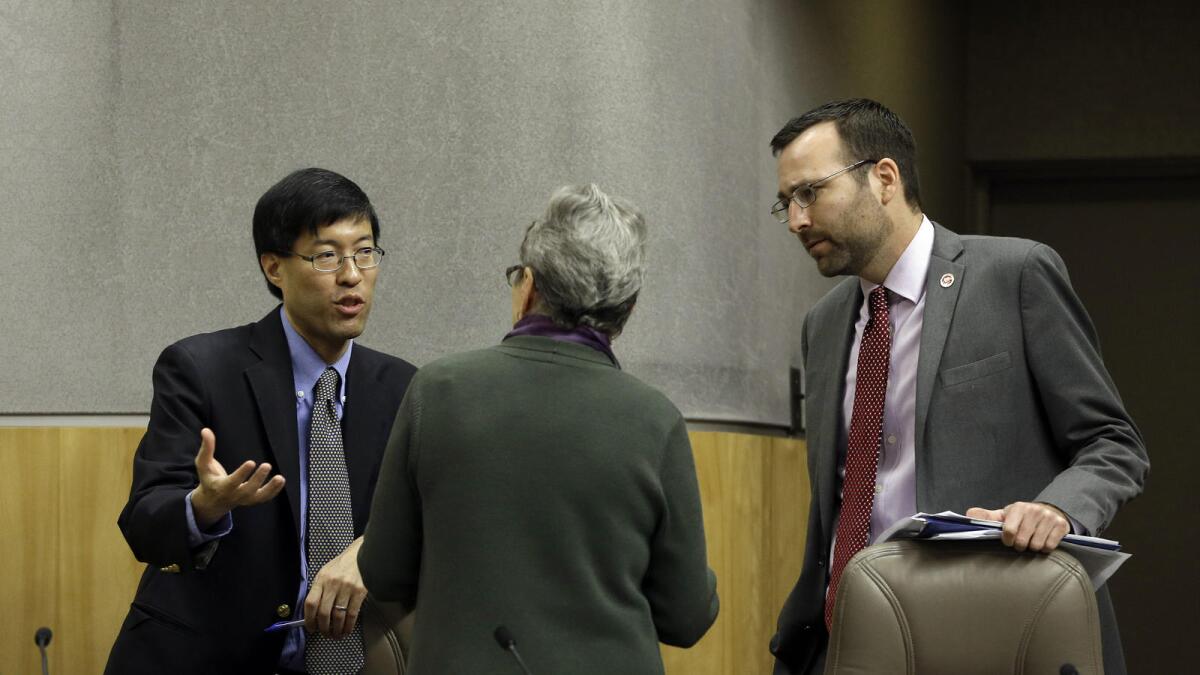
Californians might soon be able to look up data on violent deaths in the state if the governor signs a bill the state Senate sent him Thursday.
SB 877, authored by state Sen. Richard Pan (D-Sacramento), would require the Department of Public Health to collect data on violent deaths in the state, including shooting deaths, homicides and suicides.
The department would have to publish a summary and analysis of the data online.
The aggregate data would be public, but individual identifying information about the people involved in such deaths would be confidential.
From 2005 to 2010, California was part of a national violent death reporting project by the Centers for Disease Control and Prevention. The CDC has since stopped funding the project in California.
SB 877 would allow California to apply for CDC grants to help fund the statewide project.
Protections against race-based wage discrimination could grow stronger under bill sent to governor
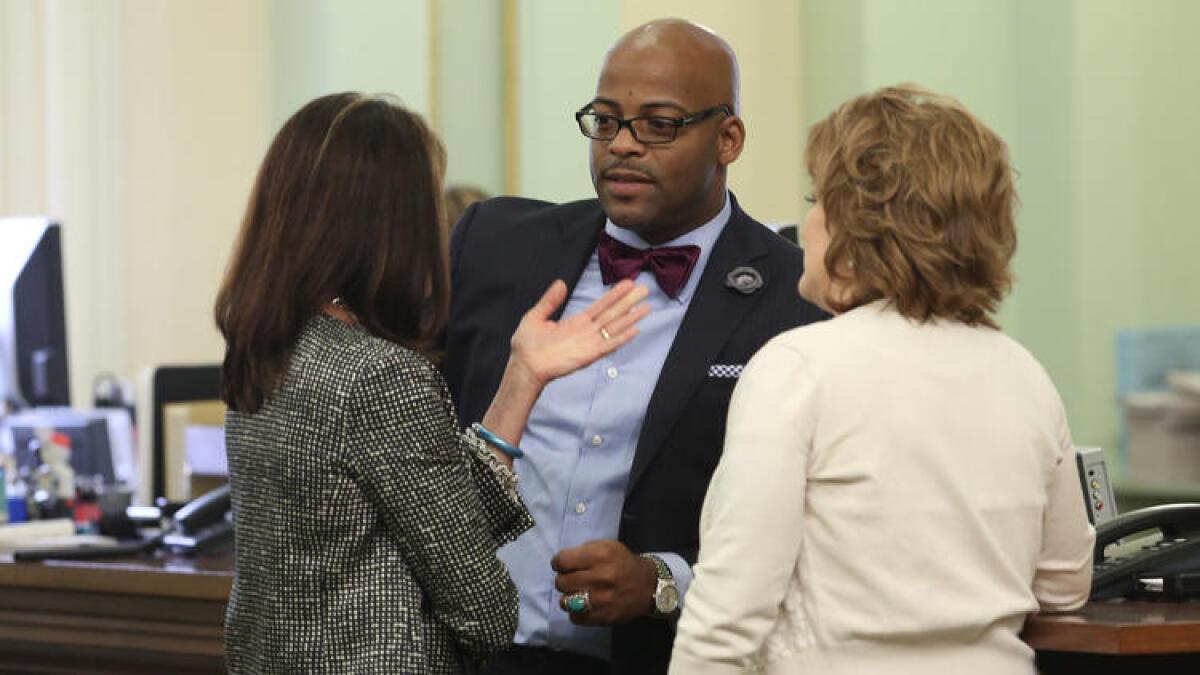
Employers in California would be prohibited from paying lower wages for similar work because of an employee’s race or ethnicity under a bill sent to the governor Thursday.
The bill, SB 1063, would strengthen existing protections against race-based wage discrimination.
It would amend the state’s Equal Pay Act to prevent employers from paying workers doing “substantially similar work” different wages based on their race or ethnicity even if they have different titles or work at different sites.
Studies have shown people of color on average make less than their white counterparts, said the bill’s author, state Sen. Isadore Hall III (D-Compton), adding the legislation “will put California at the forefront of fighting wage equality.”
California enacted a similar bill last year strengthening laws banning gender-based wage discrimination.
GOP wants seat at the table to oversee state air board
The California Air Resources Board has been the target of stinging criticism from Democratic legislators — in increasingly pointed rhetoric of race and class — but Assembly GOP leader Chad Mayes wants to make sure the minority party also has a role in keeping tabs on the agency.
Mayes, who represents Yucca Valley, wrote a letter to Assembly Speaker Anthony Rendon (D-Paramount) on Thursday requesting that at least one Republican be appointed to a joint legislative committee that would review California’s climate policies, which is meant to serve as a check on the powerful executive agency.
Earlier this week, lawmakers approved a bill that would include impose various oversight measures on the agency, including creating the legislative panel, adding two members of the Legislature as non-voting members to the board, and requiring board members to be reappointed after six years. Gov. Jerry Brown indicated he plans to sign the bill, AB 197, along with a companion climate measure, SB 32.
Mayes did not vote for the oversight measure, nor did most Republicans. Only two GOP members — Assemblymembers David Hadley of Manhattan Beach and Brian Dahle of Bieber — backed the bill.
“While I believe that AB 197 does not go far enough to reign in the unelected bureaucrats at CARB, it is a step towards imposing accountability,” Mayes wrote. “That is a good thing. For the new committee’s oversight role to have any legitimacy, however, it needs to be more than a one-party rubber stamp for the Board’s edicts.”
The legislative committee would consist of at least three assembly members and three senators. The bill makes no reference to the political party make-up of the panel.
Governor to consider banning smoking near youth sports events
Having already signed several anti-tobacco bills this year, Gov. Jerry Brown will also get to decide whether to ban smoking within 250 feet of Little League baseball games and other youth sports events.
The latest bill was approved Thursday by the state Senate and sent to Brown, who previously raised the smoking age to 21 and designated electronic cigarettes as tobacco products subject to bans on use in restaurants and other public places where smoking is banned.
The new proposal is by Sen. Richard Pan (D-Sacramento), a pediatrician, who said youth sports events are meant to promote healthy living, which is undermined by smoking. He also said secondhand smoke is a health risk.
“This is a measure to protect our public health,” said Pan, whose SB 977 also applies to electronic cigarettes.
Bill requiring ignition-lock devices for DUI offenders sent to governor
Californians convicted of driving under the influence may have to install a device in their cars that would ensure they are sober before they can start the ignition.
Under a bill the California Senate sent to the governor Thursday, DUI offenders would have to equip their vehicles with ignition interlock devices to have their licenses reinstated or to obtain a restricted license.
The devices, which can detect alcohol on a person’s breath, require drivers to breathe into them to prove they are sober before they can start their vehicle.
If the governor signs the bill, SB 1046, it would take effect in 2019.
Los Angeles County already requires DUI offenders to install ignition interlock devices in their cars as part of a pilot program also in place in Sacramento, Alameda and Tulare counties.
In those counties, first-time DUI offenders must use the device for five months. Subsequent offenses require drivers to use the devices for longer periods of time.
California law already allows people convicted of DUIs to apply for restricted licenses or to have their licenses reinstated.
Assemblywoman Cheryl Brown gets warning letter for not reporting asset transfer
The state’s ethics watchdog agency has issued a warning letter to state Assemblywoman Cheryl Brown (D-San Bernardino) for violating a requirement to report the disposal of a personal asset, officials said Thursday.
The Enforcement Division of the Fair Political Practices Commission launched an investigation after receiving a complaint that alleged Brown reported a business entity that raised concern about a potential conflict of interest.
“Specifically, we found that in 2012, you transferred ownership of your business Brown Publishing LLC to an adult child but erroneously continued to report that economic interest” on an annual statement of economic interests, write Galena West, chief of the Enforcement Division of the FPPC, in the letter.
Elected officials are required to report when they dispose of an asset, according to the Political Reform Act.
“Your actions violated the Act because you continued to report an interest in Brown Publishing on a subsequent annual statement,” West wrote. Because Brown later corrected her public documents “we are closing this matter,” West wrote.
Brown is locked into a tough reelection contest.
Emotions flare over legislation to expand overtime pay for California farmworkers
Tensions flared at the state Capitol on Thursday after the state Assembly abruptly adjourned without taking up its most anticipated piece of legislation of the day: a bill that would expand overtime pay for thousands of California farmworkers.
Another showdown over AB 1066, a bill authored by Assemblywoman Lorena Gonzalez (D-San Diego), had been expected in the lower house after a similar proposal died in June four votes short of the majority it needed to pass.
But lawmakers said they would wait until Monday to keep working with members to garner the support. The lack of action on Thursday suggested they were having trouble mustering up the votes needed for it to pass.
Leaders with the United Farm Workers of America initially exchanged terse words with Assemblyman Eduardo Garcia (D-Coachella) outside the chambers over the decision to wait.
“We are on the same team,” Garcia assured them, as labor leaders said dozens of farmworkers had given up their time and wages to be at the Capitol for the vote. “At the end of the day we are all trying to make sure this happens. We are going to get the 41 votes.”
Gonzalez later met privately with more than 10 members of the labor union, as dozens of farmworkers waited outside, singing songs and chanting for about an hour, “Sí Se Puede” and “Overtime.”
Assembly Speaker Anthony Rendon then addressed the crowd, assuring farmworkers that legislators would take up the issue next week.
“I will do everything in my power to make sure this passes next week,” Rendon said. “In this building we talk about how California is ahead of the game. We talk about how California is ahead of the world. But we are not as long as we are not paying farmworkers overtime.”
On their respective house floors, Rendon and Senate President Pro Tem Kevin de León have given passionate speeches, urging lawmakers to support the legislation.
The United Farm Workers association, which sponsored it, argues the legislation addresses an injustice farmworkers have lived with since they were first exempted from federal minimum wage and overtime standards nearly eight decades ago.
But prominent business groups, led by the California Farm Bureau Federation and a coalition of agricultural producers, have thrown their political weight against it, saying the legislation saddles farmers and growers with higher costs.
“If overtime rules change, farmers would likely adjust work schedules to avoid overtime or take other actions, such as reducing acreage, switching crops or looking for machines that can replace people,” said Dave Kranz, a spokesman from the California Farm Bureau Federation. “In any of those scenarios, unfortunately, employees would lose work hours.”
The proposal would roll out new rules for overtime in 2019, lowering the current 10-hour-day threshold for overtime by half an hour each year until it reaches the standard eight-hour day by 2022. It also would phase in a 40-hour standard workweek for the first time.
Before the vote, nearly 250 farmworkers gathered on the south steps of Capitol. They came from the Central Valley and Napa and Sonoma counties, where they harvest grapes and tree fruit, to the Central Coast, where they fill baskets of strawberries, vegetables and mushrooms.
UFW president Arturo Rodríguez said the workers had sacrificed a day’s wages to lobby in support of the bill.
Sylvia Huerta, 70, said she and her two friends woke up at 3 a.m. to feed their children and board the bus to Sacramento at the crack of dawn. They have worked in the fields for more than 20 years, picking lettuce and broccoli, she said, and rarely if ever receive any overtime under the state’s limited laws.
“It is hard on women like us, mothers and workers,” she said.
California agency drops probe of former state Sen. Ron Calderon
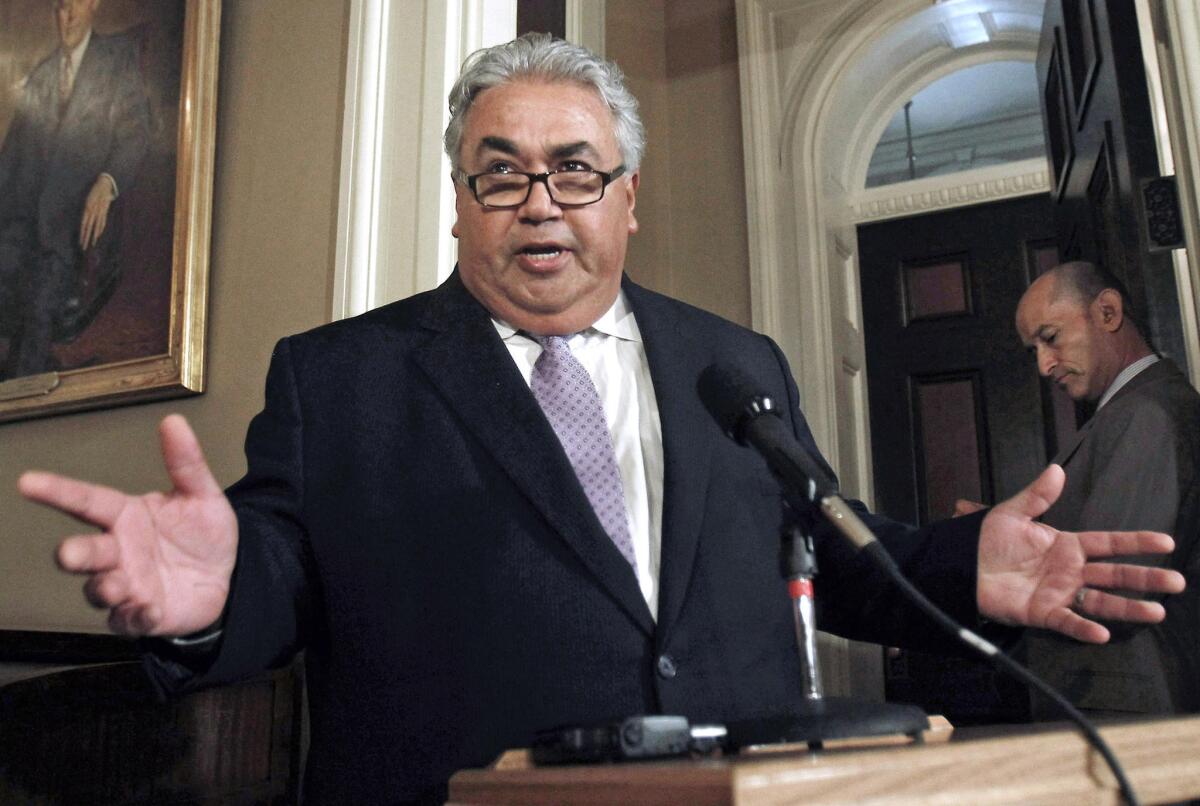
With former state Sen. Ronald Calderon having pleaded guilty to federal corruption charges in June, the state’s campaign finance watchdog agency said Thursday that it is dropping its investigation into whether he violated political finance rules.
The state Fair Political Practices Commission had been involved in an administrative investigation into whether Calderon had improperly requested a donation to a charity in addition to campaign finance violations, according to Dave Bainbridge, an assistant chief of the agency’s enforcement division.
“In light of Mr. Calderon’s recent guilty plea to federal criminal charges, the commission is closing this matter without further action,” Bainbridge wrote to Calderon’s attorney, Mark Geragos.
Calderon pleaded guilty on June 13 to mail fraud, conceding he accepted tens of thousands of dollars in bribes from undercover FBI agents and a hospital executive.
Calderon faces sentencing in the federal case on Sept. 19.
Bill to increase transparency of contacts between state energy regulators and utilities heads to Gov. Jerry Brown
Developer incentive to build low-income housing passes state Senate
A measure to expand incentives for developers who agree to build low-income housing cleared the state Senate on Thursday.
The bill from Assemblyman Richard Bloom (D-Santa Monica) strengthens the state’s rules requiring local governments to approve housing projects that allow developers to build at higher densities, have lower parking requirements or receive other concessions if they reserve a portion of their projects for low-income residents. Bloom contends that local governments use ambiguities in the law to stall projects that otherwise should be approved.
The measure sparked some debate, with Democratic Sen. Mark Leno noting that community groups in his hometown of San Francisco had opposed the effort, arguing it undermined local policies.
“Beware of one-sized-fits-all land-use proposals,” Leno said.
Sen. Ben Allen (D-Santa Monica) who presented the bill on Bloom’s behalf, countered that it would help the state’s problems with rising housing prices.
“This is a bill that does merit support, given the serious housing crisis we have statewide,” Allen said.
The measure now returns to the Assembly for a vote on changes made in the Senate. It’s one of three bills Gov. Jerry Brown endorsed in May as part of a legislative package to increase housing supply as a way to reduce costs.
Brown’s own plan to streamline approval for housing projects, which would have made larger changes to local rules governing housing, failed to get support in the Legislature and is no longer under consideration this year.
Waste, ethics violations by state workers uncovered by auditor
The state auditor on Thursday blasted various California agencies for ethics violations and wasteful practices, including the failure to collect nearly $315,000 in rent and utilities over five years from tenants of a mobile home park owned by Caltrans.
Auditor Elaine Howle issues reports twice a year on improper activity found by investigations her office conducts.
“Through our investigations, we found conflict of interest, violation of post‑employment ethics restrictions, waste of state funds, misuse of state resources, and activities incompatible with state employment,” Howle wrote to Gov. Jerry Brown. “In total, we identified $397,000 in gifts not disclosed and in wasted funds related to improper travel expenses and mismanagement.”
The report found that the California Department of Transportation failed to properly manage a San Joaquin Valley mobile home park that it purchased in late 2010.
Caltrans Director Malcolm Dougherty has assigned a new agent to the project and reminded employees of proper procedures.
“The information brought to light by the State Auditor does not reflect the mission, vision and goals of the Department of Transportation, and as a department I have taken immediate and decisive corrective actions to improve our performance,” he said in a statement
Auditors also found:
— A district engineer for the State Water Resources Control Board violated conflict-of-interest law by repeatedly recommending that the state’s drinking water program enter into funding agreements with an engineering firm that employed the district engineer’s spouse, and by approving the engineering firm’s claims for payment. The firm received $3.9 million.
— A peace officer supervisor working for the Department of Parks and Recreation improperly accepted a gift of 24 pairs of designer sunglasses valued at $4,800 from a vendor that did business with the state.
— The Department of Public Health wasted $74,200 in state funds by inappropriately reimbursing the commuting expenses of an official from the official’s home in Sonoma County to headquarters in Sacramento.
After opposition from Mayor Eric Garcetti and others, bill to restructure L.A. County MTA is shelved for year
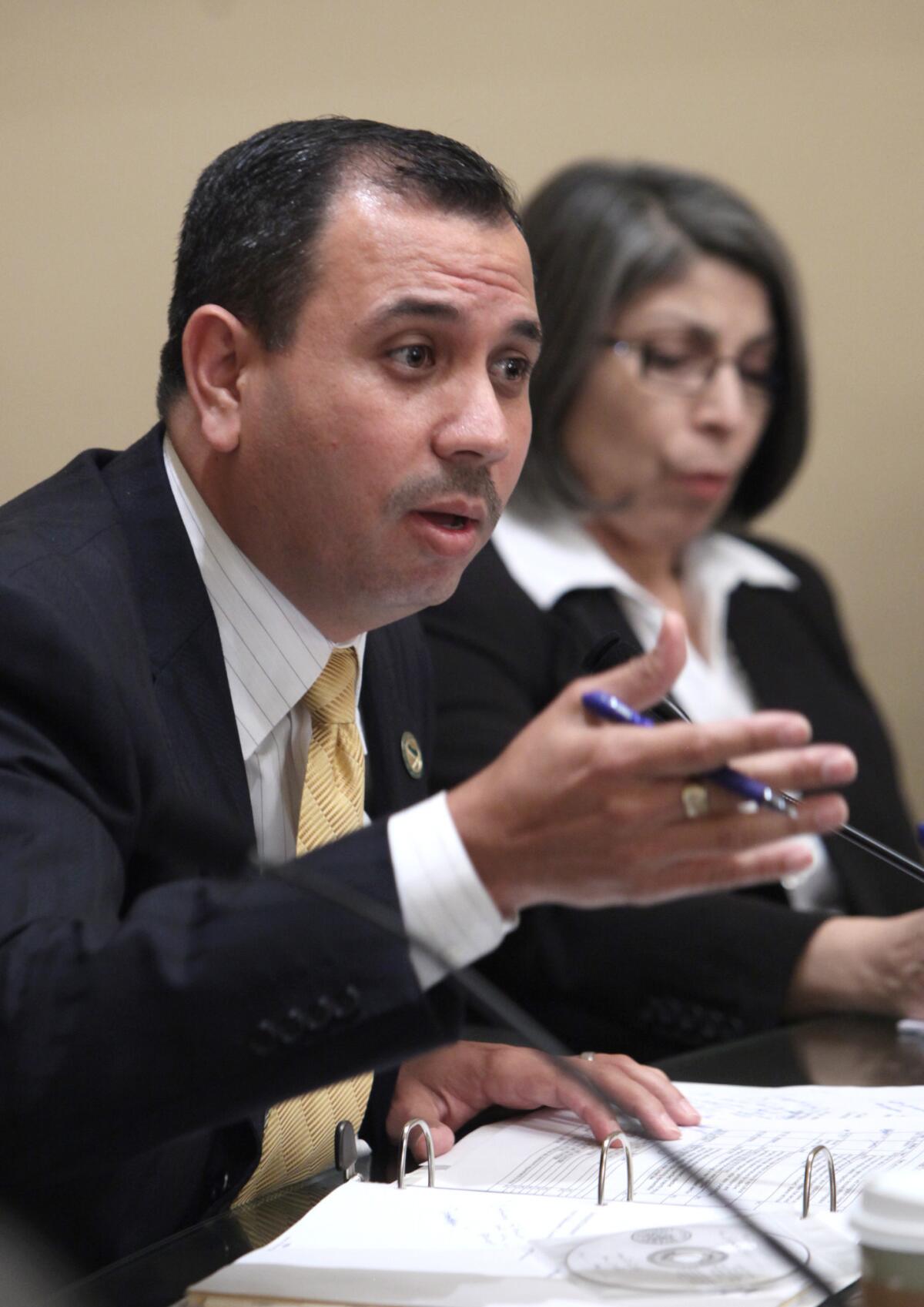
Facing growing opposition from the political establishment, a state lawmaker has dropped a bill for the year that would have reorganized the Los Angeles County Metropolitan Transportation Authority Board to give more voice to the dozens of small cities in the county.
Sen. Tony Mendoza (D-Artesia) had complained that 87 cities other than Los Angels have 52% of the county’s population but only 31% of the MTA’s board members, which he says means they are not getting their fair share of projects.
His bill would have reconfigured the board by reducing from five to two the number of members appointed by the county Board of Supervisors and reducing from two to one the number of public members appointed by the mayor of Los Angeles.
Mendoza proposed to add the mayor of Long Beach to the board as well as one mayor or city council member appointed by the Assembly speaker and additional city officials selected by a committee representing smaller cities.
The bill’s opponents included the Central City Assn., the county of Los Angeles, Los Angeles Mayor Eric Garcetti, the State Building and Construction Trades Council and the Metro board of directors.
“Even though my bill has broad support of elected officials from cities throughout Los Angeles County, I believe it is in the best interest of all stakeholders that we continue to work toward a bipartisan effort that will benefit every resident in our region,” Mendoza said in a statement
“My goal continues to be to improve the governance of the Los Angeles County Metropolitan Transportation Authority by restructuring its membership so that it represents all of Los Angeles’ diverse citizens and interests,” he added. “Today this is not the case, but I remain committed to accomplishing this goal.”
Gregory Schmidt, longtime secretary of the California Senate, dies at 69
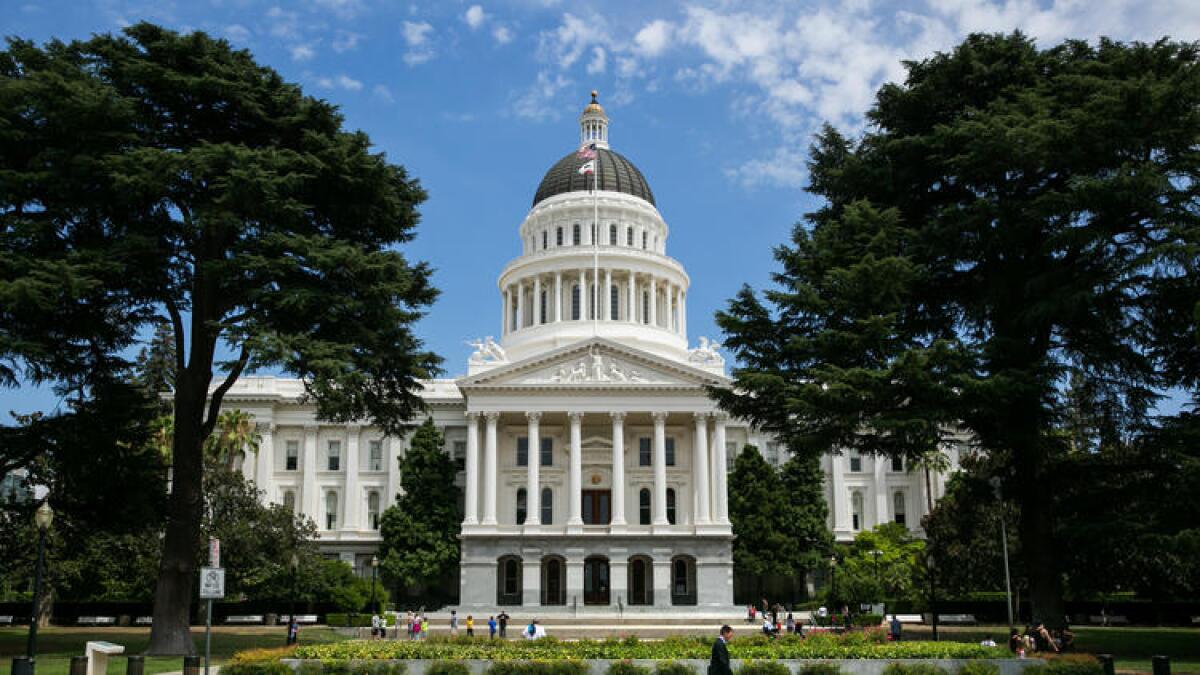
Gregory Schmidt, who served for 18 years as the secretary of the California state Senate before retiring two years ago, died Wednesday.
He was 69.
“For over a decade, Greg was the highest ranking staffer in the Senate, but he was always humble,” said Senate President Pro Tem Kevin de León (D-Los Angeles). “He never forgot that all of us were just regular people who worked for all the people of California.”
De León’s office said Schmidt died after a brief battle with cancer.
Schmidt was a veteran legislative staffer, and as Senate secretary served as the upper house’s chief parliamentarian. A top aide who stayed out of the public eye, he served under four different Democrats who led the Senate. Before that, he was a chief consultant to the Senate Judiciary Committee and the Assembly’s Human Services Committee. He began his political career as a volunteer in Democratic politics, having also spent a year in seminary school.
Schmidt’s 2014 retirement came after a series of high-profile controversies involving both the conduct of three senators and accusations of nepotism in the hiring of Senate staff. He was replaced by the current Senate secretary, Daniel Alvarez.
The Senate is expected to honor Schmidt on Thursday morning in its regular floor session.
Sex offenders would have to disclose email addresses and usernames under bill sent to governor

Sex offenders would be required to report their email addresses, usernames and other Internet identifiers to law enforcement under a bill California state senators sent to the governor Wednesday.
The bill, SB 448, would amend parts of California law enacted when voters passed anti sex-trafficking law Proposition 35 that have since been challenged in court. The bill now goes to the governor.
SB 448 would apply to offenders convicted on or after Jan. 1, 2017 who used the Internet to carry out sex crimes.
Proposition 35 passed by statewide ballot in 2012 with more than 80 percent of the vote. It increased punishments for human traffickers and expanded the definition of human trafficking to include the creation and distribution of child pornography.
In 2014, a federal court sided with the American Civil Liberties Union and the Electronic Frontier Foundation, which had challenged that parts of Prop. 35 violated sex offenders’ constitutional rights. The judge in the case gave California until the end of this year to fix flaws the court found in the law.
California could decriminalize prostitution if Gov. Jerry Brown signs these two bills
The state Assembly on Wednesday took bold steps to decriminalize prostitution, sending two controversial bills to Gov. Jerry Brown that supporters say would protect victims trafficked in the sex industry.
SB 1322 and SB 1129 drew the support of a large coalition of advocates who said the bills diverted victims away from the criminal justice system and provided a better path to social services for children and teens forced into prostitution.
But opponents argued the bills made it difficult for authorities to go after buyers and sellers in the sex trade. Vulnerable children, they said, often don’t see themselves as victims, run away from unsecured shelters and remain tied to their traffickers through complicated psychological and emotional bonds.
Legislation to curb human trafficking has been a prominent issue at the state Capitol this session, as prosecutors and advocates have pushed the issue to the political forefront. Most of the proposals have focused on the trade of forced sex and reflect a cultural shift in the approach to prostitution that aims to treat people forced into the business like victims, not criminals.
Gov. Jerry Brown hails sweeping climate legislation, plans to sign both measures into law
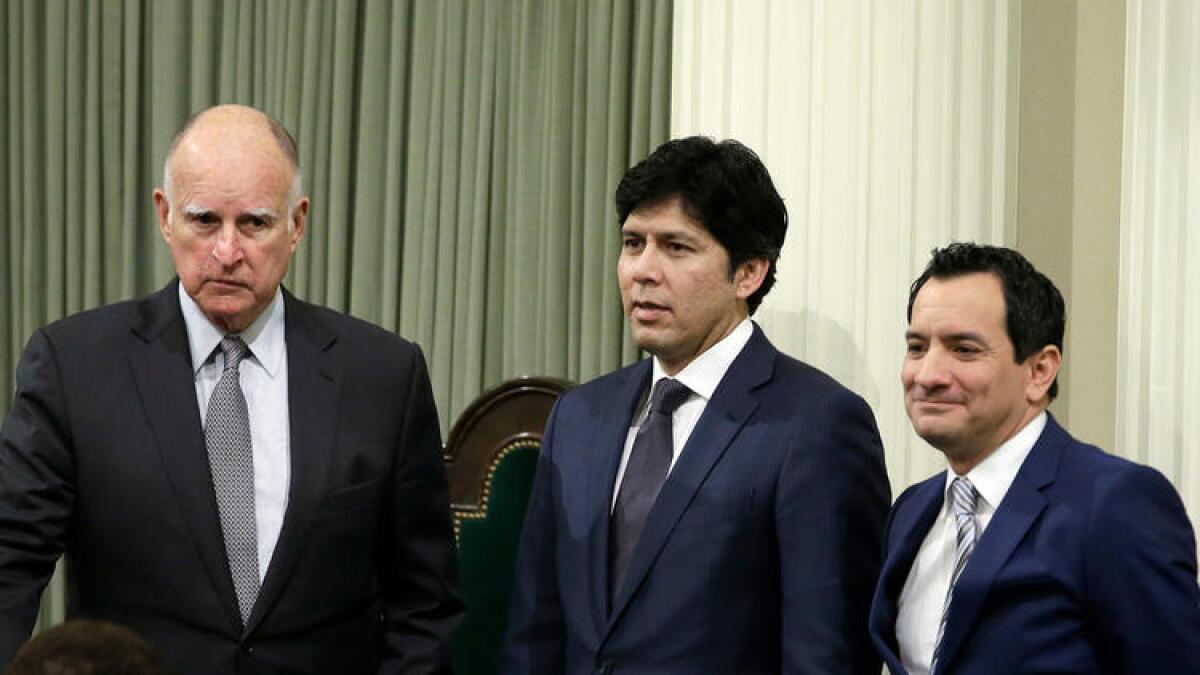
Flanked by legislative leaders, Gov. Jerry Brown said new measures approved on Wednesday would be a milestone for the state’s climate change policies.
“This is a real commitment backed up by real power,” he said during a Capitol news conference.
Brown and top lawmakers spoke with reporters shortly after the Legislature gave their final stamp of approval to the two bills, a stark change in fortune after they appeared to lack the necessary support earlier this month. The governor has said he plans to sign the bills.
Senate Bill 32, sponsored by Sen. Fran Pavley (D-Agoura Hills), would extend and expand California’s target for reducing greenhouse gas emissions. The current goal is to hit 1990 levels by 2020; the new proposal would require the state to reduce emissions by an additional 40% by 2030.
Pavley, who is retiring this year because of term limits, said, “This is a great way for me to spend my last week in the Legislature.”
The second measure, Assembly Bill 197, sponsored by Assemblyman Eduardo Garcia (D-Coachella), includes a mix of proposals to increase legislative oversight of state regulators and focus their attention on disadvantaged communities.
Those issues have been emotionally charged for lawmakers, and assuaging their concerns was key to piecing together enough votes for the legislation this year.
Garcia said it was important to “make sure all communities of California are benefiting from our climate change policy.”
The legislation does not resolve all of the issues facing California’s climate programs. In particular, the measures do not address the cap-and-trade program, which is facing a lawsuit claiming the program is an unconstitutional tax.
Brown has signaled that he plans to pursue new steps to safeguard from ongoing legal uncertainty the cap-and-trade effort, which requires companies to purchase permits in order to release greenhouse gas emissions.
Some California felons would get more time to ask for lighter punishment under bill headed to the governor’s desk
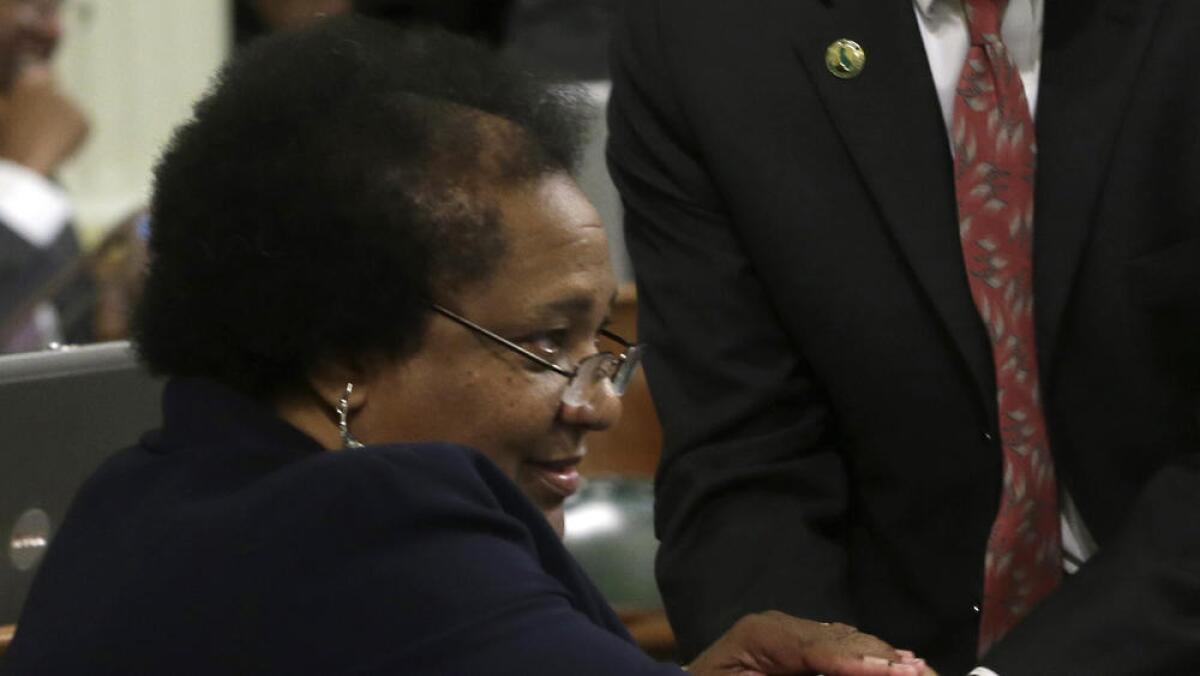
Felons eligible to reduce their punishments under a 2014 statewide ballot measure would get extra time to make that request under a bill sent to Gov. Jerry Brown on Wednesday.
The ballot measure, Proposition 47, changed some nonviolent property and drug crimes from felonies to misdemeanors, and allowed those sentenced under prior rules to ask for a shorter sentence.
But that provision ends next year, and the bill from Assemblywoman Shirley Weber (D-San Diego) would give those eligible another five years to request relief.
Prosecutors and public defenders were worried about a flood of petitions had the Legislature not acted, said Sen. Holly J. Mitchell (D-Los Angeles), who presented the bill on the Senate floor Wednesday.
“We can prevent that sort of mass filing situation from blocking our courts,” Mitchell said.
Prop. 47 remains a contentious issue, with many law enforcement groups blaming it for an increase in property crimes.
Because it changed a voter-approved ballot measure, the bill required a supermajority vote, which it cleared in the Senate Wednesday. The legislation passed the Assembly in May.
California could soon expand the definition of rape as a result of the Stanford sexual assault case
California lawmakers have sent a bill to the governor’s desk that would expand the legal definition of rape so it includes all forms of nonconsensual sexual assault.
Assemblywomen Cristina Garcia (D-Bell Gardens) and Susan Talamantes Eggman (D-Stockton) introduced the bill to toughen consequences for sexual offenders after a Stanford University swimmer was sentenced to six months in jail for sexually assaulting an unconscious woman, sparking an outcry.
The law would allow a judge to consider the definition of rape in the sentencing phase of a case. The expanded definition also allows victims more access to to social services.
It cleared the state Assembly with a vote of 73-0.
Rape is currently defined under California law as “an act of sexual intercourse,” or penile penetration. Other types of sexual assault— including sexual penetration by a foreign object and sodomy — are categorized as separate offenses.
Supporters of the bill said it addressed a bias against lesbian, gay, bisexual, transgender and queer victims, who are not afforded the same protections as heterosexuals, though statistics show they are more likely to be victims of sexual violence. According to the Human Rights Campaign, 40% of gay men and 47% of bisexual men have experienced sexual violence other than rape as defined by California law, compared with 21% of heterosexual men.
On the Assembly floor Wednesday, lawmakers said the first step to ending rape is calling sexual assault what it is.
“California’s restrictive definition of rape means a man cannot be raped,” Garcia said. “It means a victim forced to engage in oral sex cannot be raped.”
It means that despite being sexually penetrated with an object, she has said, according to state law, the victim of the Stanford student was not raped.
Legislation setting new target for greenhouse gas emissions sent to Gov. Jerry Brown
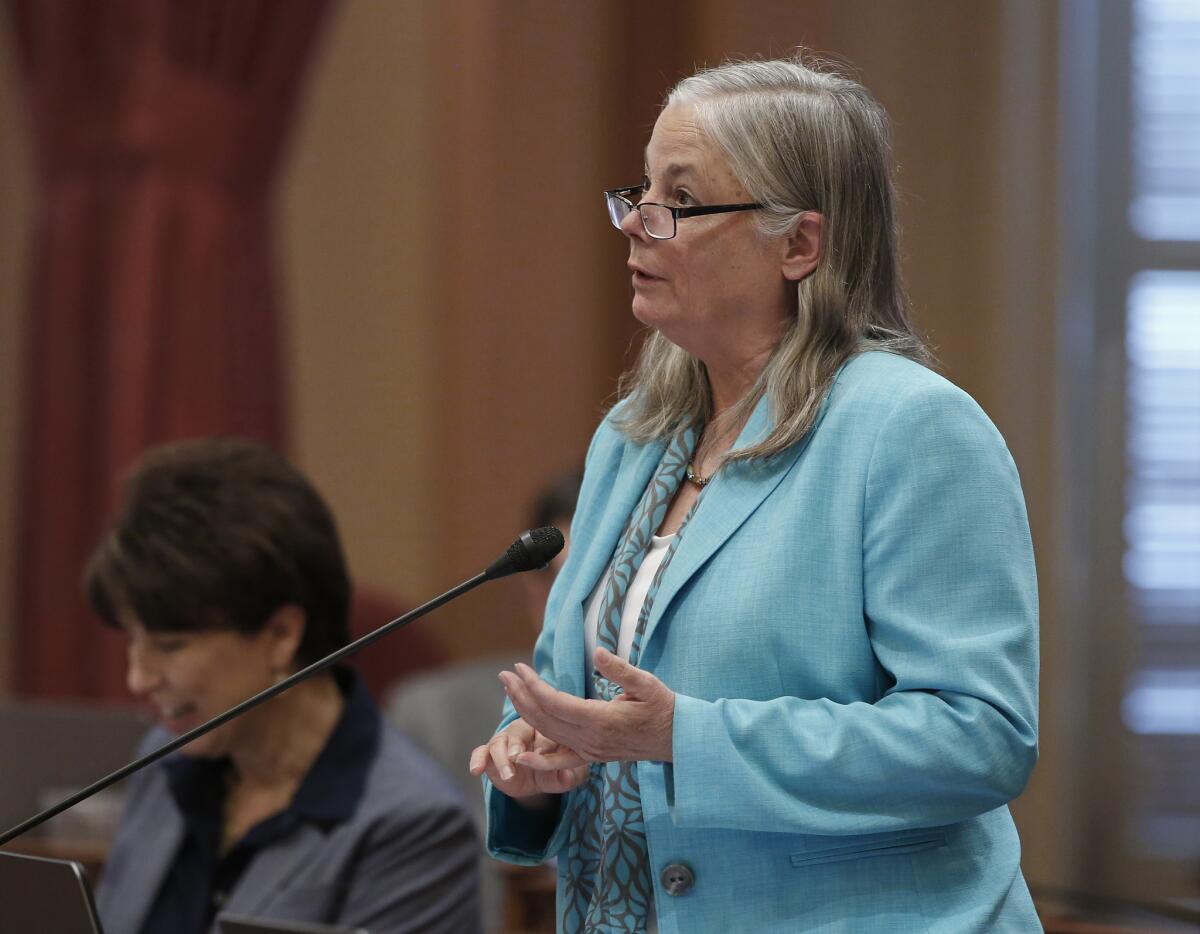
Legislation setting a more aggressive target for reducing greenhouse gas emissions was approved by the state Senate on Wednesday.
The measure, Senate Bill 32, joins Assembly Bill 197 on Gov. Jerry Brown’s desk, where they will await his signature. Brown and top lawmakers are scheduled to hold a news conference on the climate legislation on Wednesday afternoon.
Senate Bill 32 requires the state to slash emissions to 40% below 1990 levels by 2030. The current target is hitting 1990 levels by 2020, a goal the state is on track to meet.
Sen. Fran Pavley (D-Agoura Hills), who authored the legislation, said continuing California’s efforts would set an example for the rest of the world and benefit state residents.
“It has brought business, jobs and reduced greenhouse gases,” she said.
Republicans complained that the legislation would raise costs for businesses and residents.
“We won’t build anything here anymore,” Sen. Ted Gaines (R-Roseville) said. “It will just be too expensive.”
He described the measure as “a massive energy tax.”
Sens. Dianne Feinstein and Barbara Boxer heading to Lake Tahoe with President Obama, Gov. Jerry Brown and The Killers

Next Wednesday, Sens. Dianne Feinstein and Barbara Boxer (D-Calif.) will join California Gov. Jerry Brown, President Obama and other lawmakers at the 20th Annual Lake Tahoe Summit.
The summit, which senators from Nevada and California host on a rotating basis, is hosted this year by Sen. Harry Reid (D-Nev.) in Lake Tahoe.
Reid retires in January, as does Boxer, and this year’s summit will include a performance by indie rock band The Killers and a speech from President Obama.
The summit brings local, state and federal officials together to talk about restoring and protecting Lake Tahoe.
The summit is open to the public. Tickets to The Killers’ 1:30 p.m. concert are available for $25.23 at Ticketmaster.
------------
FOR THE RECORD
Aug. 25, 3:15 p.m.: An earlier version of this post said the Tahoe Fund is a host of the event. It is a sponsor, but not a host.
------------
Public schools could expel students for sexting and video cyberbullying under bills sent to governor

Public schools soon could expel students for bullying through video or sexting if Gov. Jerry Brown signs two bills sent to him Wednesday.
Assemblyman Ed Chau (D-Monterey Park) said he drafted AB 2536 to address increasing instances of teen sexting, in which a person sends a nude or sexually explicit photo of him or herself electronically.
It would require the California Department of Education to publish information on sexual cyberbullying online and encourage schools to teach students about sexting. It also would define “cyber sexual bullying” as sharing nude photos or videos of others “with the purpose or effect of humiliating or harassing” a student.
“The act of sexting, which some view as a normal adolescent activity, exposes teens to bullying or harassment,” Chau said in a statement. “This type of bullying has unfortunately resulted in some teenagers committing suicide, and has left schools at a loss on how to address the complex challenges it presents.”
A related bill, AB 2212 by Assemblyman Matthew Harper (R-Huntington Beach), would give public schools authority to expel students who post harassing videos.
The current definition of “bullying via an electronic act” specifically covers text messages, Internet postings, audio and photos, but does not explicitly include video.
The California Assembly passed both bills unanimously Wednesday. They now move to the governor’s desk.
Overhaul of controversial L.A. County water board to be considered by governor

Moving to shake up a troubled agency, state lawmakers on Wednesday sent the governor a bill that would expand the board of the Central Basin Municipal Water District and change how the board’s seats are filled.
The Assembly unanimously approved a bill introduced by Assemblywoman Cristina Garcia (D-Bell Gardens) after news reports and lawsuits indicated there had been misuse of district funds and inappropriate contracting and employment practices.
District lawyers found the agency violated state law by secretly creating a $2.7-million fund for a groundwater storage project. The district also has been accused of doing favors for family members of politicians.
“It’s a district that has had a tremendous amount of public distrust,” Assembly Speaker Anthony Rendon (D-Paramount) told his colleagues Wednesday. “This will get them back on the road they need to be on.”
Garcia cited a state audit from last year that she said raised “serious ethical concerns” about district operations. The audit also found the district’s five-person board had failed to provide the leadership necessary for the district to fulfill its responsibilities to provide water to 2 million people in 24 cities and six unincorporated areas throughout southeast Los Angeles County.
“While the District has made strides to address the questions raised by the auditor report, it is important to have a governance structure that will protect consumers moving forward,” Garcia told fellow lawmakers in arguing for Assembly Bill 1794.
The measure would change the board from one of five elected members to four members elected by residents and three with technical expertise who would be appointed by water purveyors in the district beginning in 2022.
The board also would be subject to state campaign finance limits and ethics rules, and appointed directors would not be eligible to receive communication or car allowances.
The bill, Garcia said, increases accountability by balancing the input of water purveyors who are district customers with input from voters.
------------
FOR THE RECORD
Aug. 25, 12:30 a.m.: A photo previously with this post showed the former headquarters of the Central Basin Municipal Water District.
After intense debate, Assembly approves climate legislation aimed at pollution reduction, increasing oversight
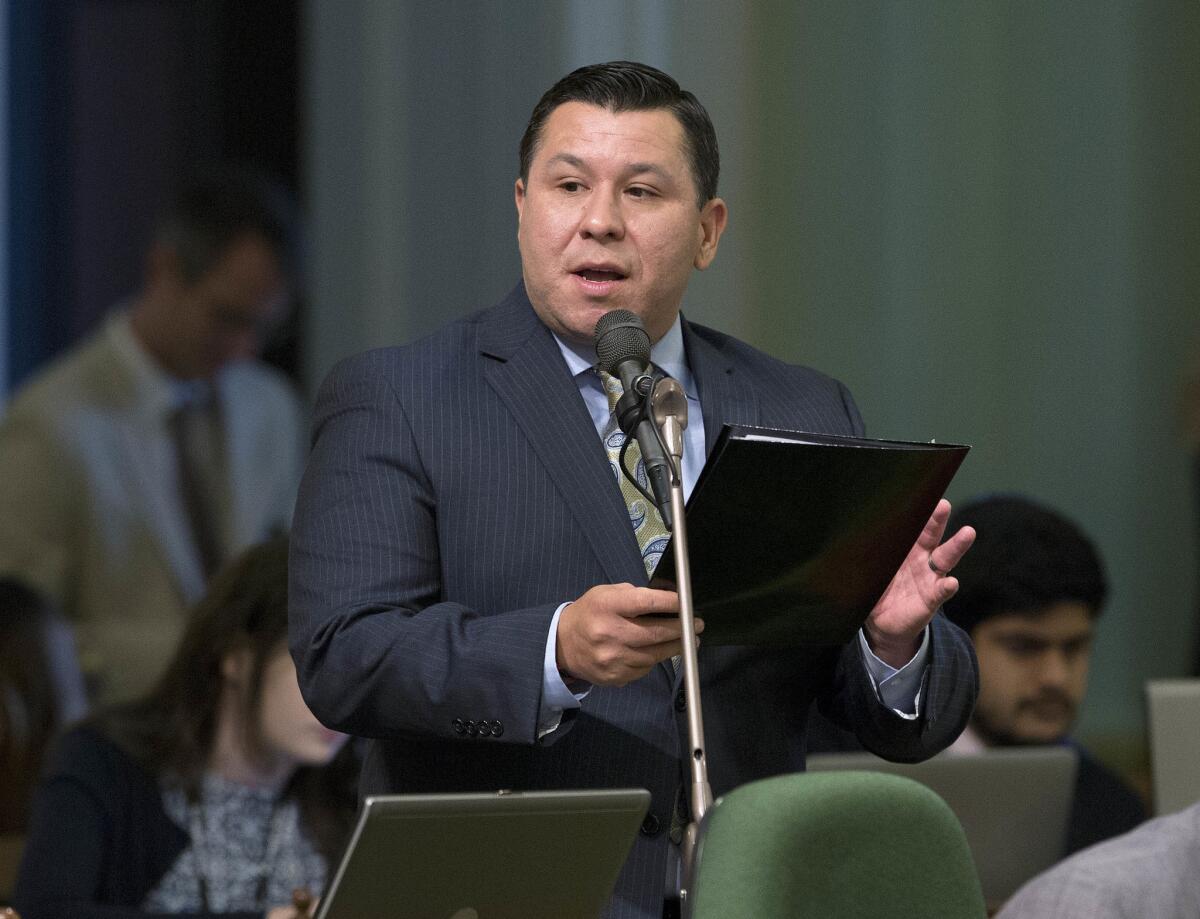
The Assembly approved a second measure on climate change Wednesday after a contentious debate about the benefits of environmental regulations and whether the provisions go far enough to increase legislative oversight of state regulators.
Assembly Bill 197 now goes to Gov. Jerry Brown for his signature. A related measure that would extend the state’s target for reducing greenhouse gas emissions, Senate Bill 32, is awaiting another vote in the Senate after being approved by the Assembly on Tuesday.
Assembly Bill 197 reached the floor after being approved earlier in the day by a committee. Because it would direct regulators to prioritize direct emission reductions from sources such as refineries, some business groups are concerned it would undermine the cap-and-trade program, a charge rejected by supporters.
The discussion on the floor reflected questions about whether the benefits of environmental regulations were being felt equally around the state.
“How many Teslas are in your district? Not many of them in mine,” Assemblywoman Shannon Grove (R-Bakersfield) said.
Some Democrats spoke out against the legislation, including Assemblywoman Cheryl R. Brown (D-San Bernardino). She said the proposal does not include adequate oversight of state regulators, an ongoing issue for climate legislation.
“I do not see equity, transparency and accountability,” Brown said.
Assemblyman Ken Cooley (D-Rancho Cordova) disagreed, saying he thought there would be significant progress.
“This is a very consequential bill, enlarging the footprint of the Legislature in this area,” he said.
Assemblyman Eduardo Garcia (D-Coachella), the author of the bill, described it as an important step forward for lawmakers.
“Doing nothing keeps us in the same position, with our hands tied behind our back,” he said.
A bill targeting drone use during unlawful activities is headed to Gov. Brown

California lawmakers have passed a bill making the use of drones unlawful during illegal activities such as violating a protective order, interfering with emergency response personnel or facilitating the delivery of contraband to jails.
The measure would close a loophole under California law in the absence of a complete federal regulatory framework for using unmanned aerial vehicles, lawmakers said.
AB 2320, authored by Ian Calderon (D-Whittier) and Assemblyman Evan Low (D-Silicon Valley), would expand the definition of various misdemeanor and felony offenses, such as stalking and violation of a restraining order, to apply to people flying drones.
The bill passed with a 69-0 vote. It is now headed to Gov. Jerry Brown’s desk for a signature.
Brown has vetoed legislation to regulate drones in the past, saying he does not want to create new crimes to enforce bans on the use of such devices.
This legislative session, drone manufacturers and associations boosted their politicking, successfully beating back several bills they said would create a patchwork of laws that vary by state and hinder innovation.
Critics have called AB 2320 one of several piecemeal solutions that remained, as debate rages over how much control states and cities should take in regulating drones.
California cops would need to lock up guns in cars under this measure
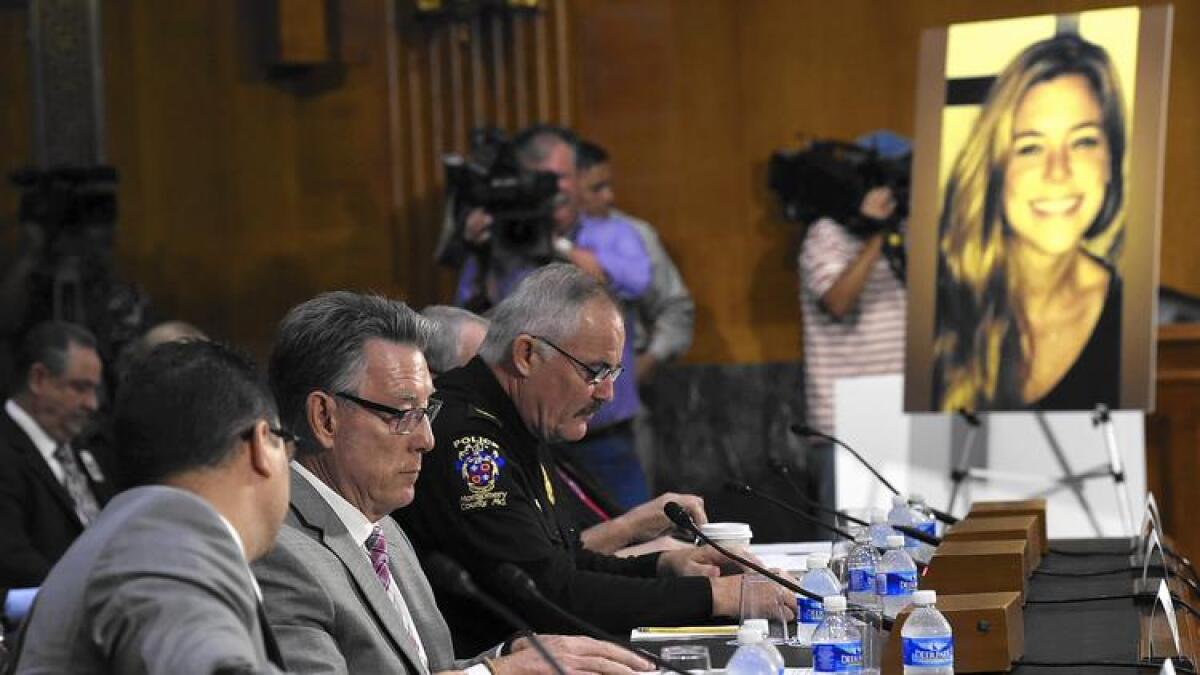
Seeking to stem the tide of gun thefts, state lawmakers on Wednesday sent the governor a bill that would require law enforcement officers and holders of concealed weapon permits to lock them up.
Specifically, anyone who leaves a firearm in a car would need to put it in the trunk or in a locked container out of plain view.
Violations would be an infraction subject to a fine of up to $1,000.
The security measure is currently required for most civilians but excludes police officers and those licensed to carry a concealed weapon.
Sen. Jerry Hill (D-San Mateo) said his bill expands those covered by the law because “several handguns have been stolen out of police vehicles and used in deadly crimes.”
He cited an incident in which a handgun was stolen from the car of a Bureau of Land Management agent and used to kill Kate Steinle on Pier 14 in San Francisco last year.
In that city, more than 57 guns were stolen from cars in 2015.
Hill also noted that the California Supreme Court this year affirmed the death sentence for a man who murdered four people using a handgun stolen out of the vehicle of an off-duty deputy sheriff.
Another climate measure clears hearing, heads to Assembly floor for final vote
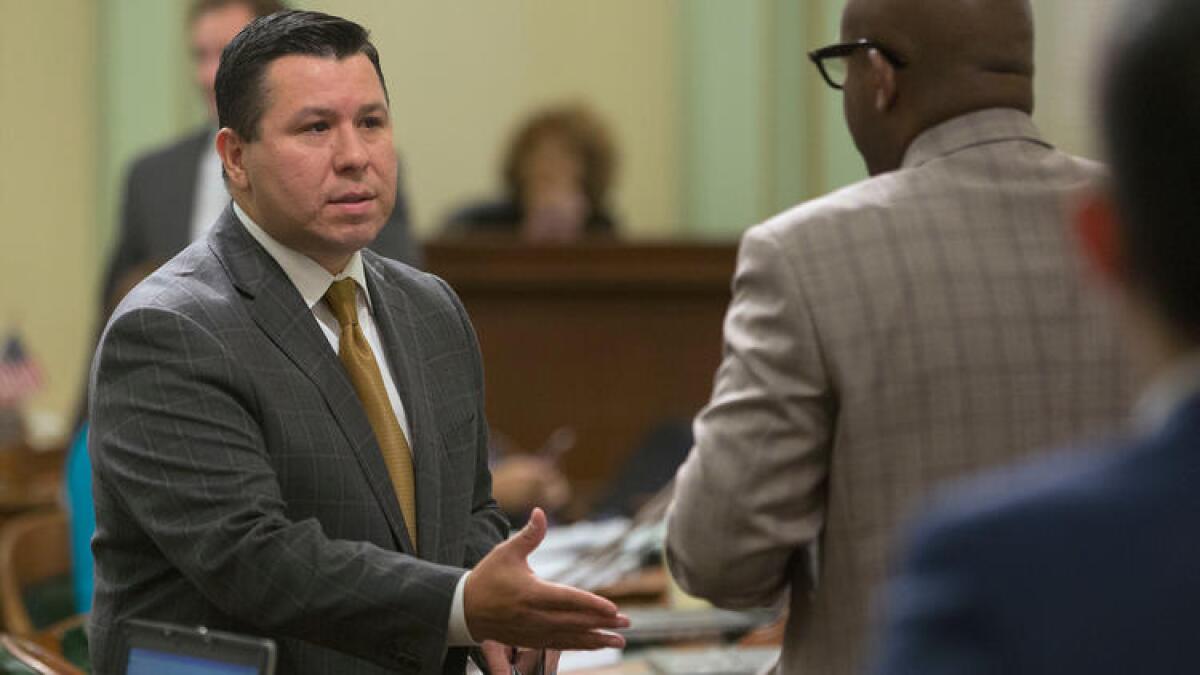
A measure to enhance oversight of state regulators and focus their attention on direct emission reductions was approved by an Assembly committee on Wednesday.
The committee members advanced the legislation, AB 197, despite concerns from some business groups that it would undermine California’s cap-and-trade program.
The measure, which could receive a vote on the Assembly floor later in the day, asks regulators at the California Air Resources Board to prioritize steps to limit emissions from “stationary sources,” such as refineries.
That’s a more direct approach than the cap-and-trade program, which allows companies to pollute up to a certain level as long as they buy permits, a system intended to provide a financial incentive for cleaning up their operations.
Eloy Garcia, a lobbyist for the Western States Petroleum Assn., said the legislation would mark a shift away from cap-and-trade, potentially jeopardizing state revenue from the sale of pollution permits.
“You need to figure this out,” he said. “It will call into question the availability of cap-and-trade as a tool going forward.”
Garcia added: “There will be litigation. There is no question. There is too much ambiguity.”
Supporters of the legislation rejected Garcia’s concerns, noting that nothing in the measure bars regulators from continuing the program.
“The intention by no means is to tamper with the cap-and-trade program,” said Assemblyman Eduardo Garcia (D-Coachella), the author of the bill.
Cesar Diaz, legislative director for the State Building and Construction Trades Council of California, said his organization values cap-and-trade revenue — some of which is being used to build the bullet train — and would raise concerns if they thought it was being jeopardized.
Instead, Diaz said, “what we see here is a huge opportunity not only for this program to continue, but for the Legislature to have accountability.”
The measure is packaged with SB 32, a proposal to extend the state’s target for reducing greenhouse gas emissions. The Assembly approved that bill on Tuesday, and it is now awaiting another vote in the Senate.
Democrats beat Republicans in Sacramento’s annual legislative softball game

Democrats in the Legislature won the annual legislative softball game, 17-7, on Tuesday night, the second year in a row they’ve beaten Republicans.
The game at Raley Field, the home of the Sacramento Rivercats minor league team, raised more than $51,000 for PRO Youth and Families, a Sacramento-based group that works with young people in under-resourced communities.

After falling during the game, Assemblyman Jimmy Gomez (D-Echo Park) left the field in a wheelchair before he could see his team win. He broadcast his experience in the emergency room on Facebook live.
Assemblyman Jim Frazier (D-Oakley) coached the Democrats this year and said he had the team practice twice a week for the last few months to ensure last year’s victory was not just a “fluke.” He said he anticipates there will be lots of joking about the game on the Assembly floor on Wednesday.
“It was just a good time,” said Assembly GOP leader Chad Mayes (R-Yucca Valley). “I think it was great to have the Republicans and Democrats come together.”
More than a dozen assembly members flipped their votes from last year to support climate change bill
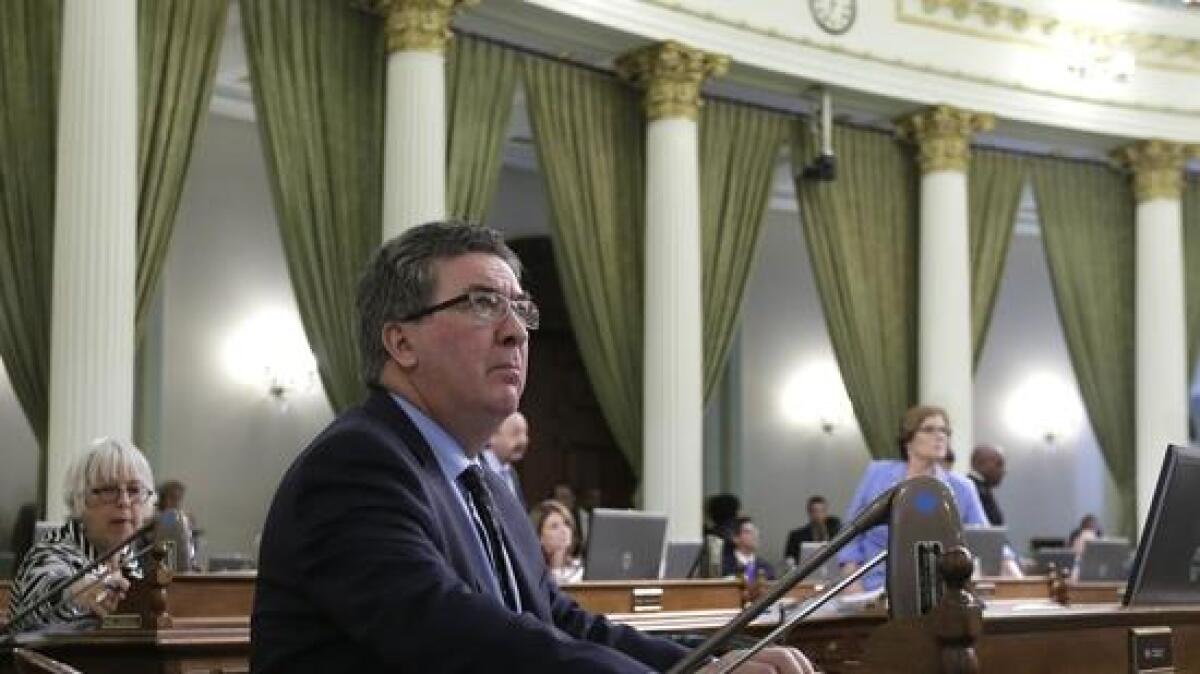
Seventeen California assembly members on Tuesday flipped their votes from last year to back a major bill to extend the state’s greenhouse gas reduction targets, including some members of a business-aligned bloc of Democrats and one Republican.
The lawmakers told their colleagues on the Assembly floor that they had listened to criticism from last year when the bill, SB 32, had fallen short. SB 32 now is tied to a companion bill, AB 197, that gives the Legislature greater authority over the California Air Resources Board, which is overseen by Gov. Jerry Brown and administers much of the state’s climate program. Neither bill will take effect unless both pass.
That change convinced Assemblyman Ken Cooley (D-Rancho Cordova) who voted against SB 32 last year to support the bill when it came to the floor Tuesday.
“We have done something dramatic and groundbreaking for the Legislature’s ability to hold the executive branch accountable,” Cooley said in an interview after the decision.
The lone Republican to support the bill, Assemblywoman Catharine Baker of San Ramon, cited similar reasons for her switch.
“We must continue to prioritize improving air quality and reducing greenhouse gas emissions for the good of our future, and that is why I supported SB 32,” Baker said in a statement. “But there is much more work to do to make sure the California Air Resources Board is accountable, and to ensure California meets the goals of SB 32 in a way that is strictly the best allocation of our resources for our economy. I am committed to doing that, and that should be our next intense focus for the environment.”
Of the 17 lawmakers who flipped their decision from last year, four – Assemblywoman Cheryl Brown (D-San Bernardino), Assemblywoman Autumn Burke (D-Marina del Rey), Assemblywoman Nora Campos (D-San Jose) and Assemblyman Roger Hernández (D-West Covina) — voted only after it was clear the measure had enough support to pass. Assemblyman Joaquin Arambula (D-Fresno), who took office this year after a special election, voted in favor of the bill.
SB 32 and AB 197 need votes in their respective houses before they reach Brown’s desk. The Senate is expected to pass SB 32, but the Assembly’s vote on AB 197 is less certain.
In addition to Baker, Brown, Burke, Campos, Cooley and Hernández, the following Assembly members, all Democrats, also changed their votes: Luis Alejo of Salinas, Ian Charles Calderon of Whittier, Bill Dodd of Napa, Eduardo Garcia of Coachella, Mike A. Gipson of Carson, Rich Gordon of Menlo Park, Jacqui Irwin of Thousand Oaks, Evan Low of Campbell, Jose Medina of Riverside, Patrick O’Donnell of Long Beach and Freddie Rodriguez of Pomona.
UPDATES:
4:53 p.m. This post has been updated to add a statement from Assemblywoman Catharine Baker (R-San Ramon).
6:41 p.m. This post has been updated with legislators who added or switched their votes after the measure passed. Assemblywoman Nora Campos (D-San Jose) voted in favor. Assemblyman Jim Cooper (D-Elk Grove) has been removed from the post because he switched his vote from yes to no.
11:46 a.m., Aug. 24, 2016. This post has corrected the spelling of Assemblywoman Catharine Baker (R-San Ramon).
This post was originally published at 3:17 p.m., Aug. 23, 2016.
Bills to help human trafficking victims in court head to Assembly for final vote
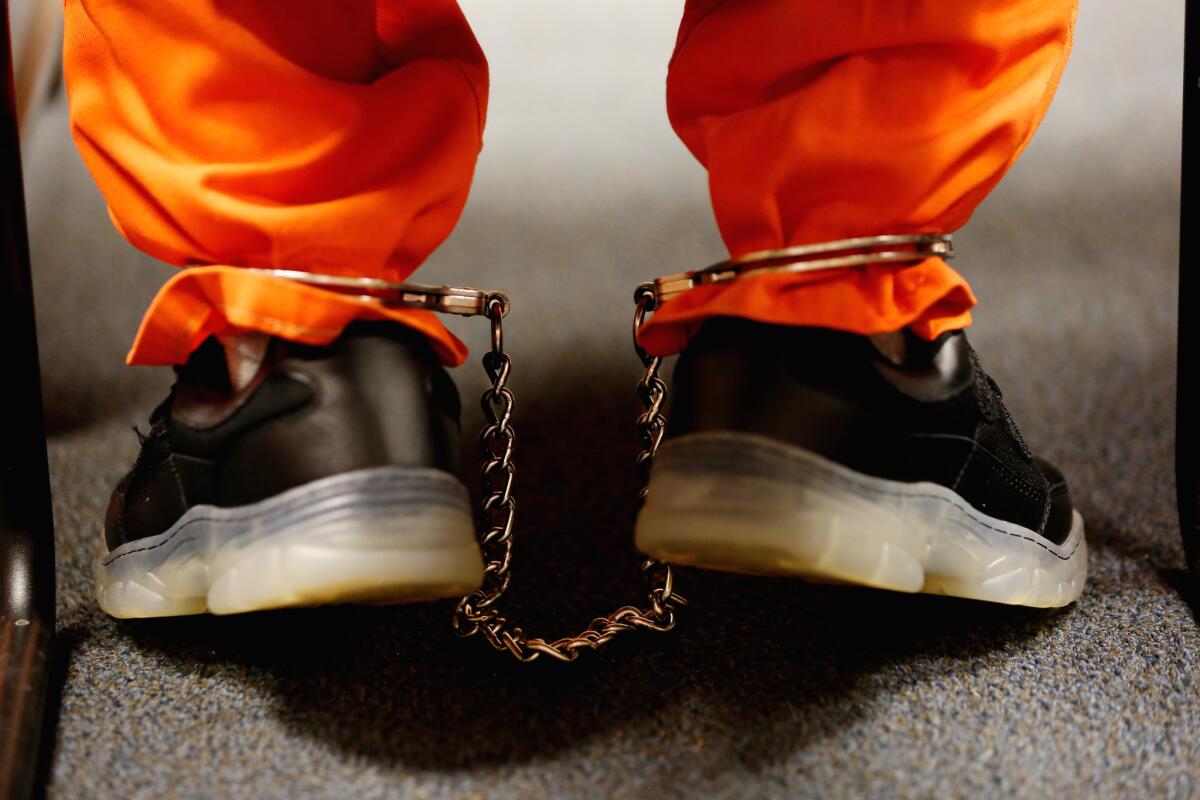
Five bills that aim to help human trafficking victims caught in the criminal justice system moved out of the Senate on Tuesday and are headed back to the Assembly for a final vote.
Measures to curb the forced trade of sex and labor have been highly debated this legislative session. But most of the Assembly proposals taken up by the upper house Tuesday faced little to no opposition.
Bills by Assemblywoman Cristina Garcia (D-Bell Gardens) and Assemblymember Rob Bonta (D-Oakland) were unanimously approved.
Garcia’s proposal would require counties to connect human trafficking witnesses with victims services in court. Bonta’s bill would prohibit authorities from disclosing the personal information of victims and their immediate family members, and it would allow judges to give human trafficking cases preference on going to trial.
A bill by Assemblywoman Shirley Weber (D-San Diego) faced some debate as it would create a new human trafficking defense for victims charged in nonviolent and non-trafficking crimes.
Human trafficking victims can currently raise the defense of duress against such offenses. But sponsors of the legislation said it is inadequate for those who often cannot show their lives were in immediate danger.
On the Senate floor, supporters of the bill said it would aid victims who have been forced by their traffickers to break the law. But opponents called it unnecessary, poorly written legislation that would help traffickers, not victims.
Another bill by Assemblywoman Nora Campos (D-San Jose), would allow human trafficking victims to vacate their convictions for nonviolent crimes. It is one of two bills that differ in approach as to how victims would be able to erase their criminal records.
AB 1762 would allow victims to apply to vacate their convictions at any time, while SB 823, authored by Sen. Marty Block (D-San Diego), says victims must first follow a specific procedure. The Senate bill also cleared the Assembly Tuesday and is headed back to the upper house for a final vote.
Both have generated wide support from advocates who say they would remove obstacles to opportunities for victims. But law enforcement officials say the erasure of criminal records would have unintended negative consequences for prosecutors and police officials building cases against traffickers.
The last bill approved by the Senate, authored by Assemblywoman Lorena Gonzalez (D-San Diego), would impose minimum fines and mandatory minimum county jail terms for people convicted of buying commercial sex.
It also would recast the crime of prostitution so that the statute differentiates between people receiving compensation for sex from sellers and buyers of sex.
By redefining the statute, Gonzalez said, law enforcement officials will be able to decriminalize prostitution for victims and increase the punishment for sex buyers. But the bill might be a tough sale to Gov. Jerry Brown, who has tended to oppose tough-on-crime policies in the past.
Effort to eliminate Daylight Saving Time fizzles in Senate: ‘I just like it,’ says a state senator

The state Senate on Tuesday failed to muster the votes on a bill that could have led to the elimination of Daylight Saving Time after members said they like the change each spring.
Sen. Ted Gaines (R-Rocklin) sought to put a measure on the November 2018 ballot that would allow California voters to eliminate the annual resetting of the clock.
Gaines was granted the ability to bring the matter back up for another vote during the next week, but it is unclear if it can get the 21 votes needed to pass. The vote Tuesday was 17-17.
Gaines said the annual change has not resulted in promised significant energy changes, but has led to more workplace injuries.
“The incidents of accidents have gone up,” Gaines told his colleagues, adding “It’s about time we let Californians re-evalutate this longstanding practice.”
In 1947, California voters approved going to Daylight Saving Time in the spring and summer months after it was promoted as a way to reduce fuel consumption because residents would need less energy in the evening if it got darker later in the summer.
Under Daylight Saving Time, the law requires that the clock be advanced one hour from 2 a.m. on the second Sunday of March to 2 a.m. on the first Sunday of November.
But both Republican and Democratic lawmakers noted Congress would ultimately have to approve the change and they saw no reason to put the matter to voters.
Sen. Mark Leno (D-San Francisco) said it would complicate trade, noting there is currently a three-hour difference between the West and East coasts.
“Should the East Coast spring forward and we don’t, now there’s a four-hour gap,” Leno said.
Republican Sen. Jim Nielsen of Gerber said Daylight Saving Time gives farmers more time to tend their fields. Others said they just look forward to the annual shift.
“I like daylight savings. I just like it,” Sen. Anthony Cannella (R-Ceres) said.
Meanwhile, the Assembly approved a resolution that asks Congress to allow California to eliminate Daylight Saving Time if voters decide to do so.
California lawmakers facing off in annual softball game
California lawmakers from both sides of the aisle will take a break from arguing over legislation to compete in the annual charity softball game tonight in Sacramento.
The Democrats are looking to defend the title after last year’s win, ending a long streak of Republican victories.
The game will benefit PRO Youth and Families, a Sacramento-based group that works with young people in under-resourced communities.
The first pitch will be thrown out at 7:05 p.m. at Raley Field.
Improved data on Latinos in the juvenile justice system could soon be available under bill sent to governor
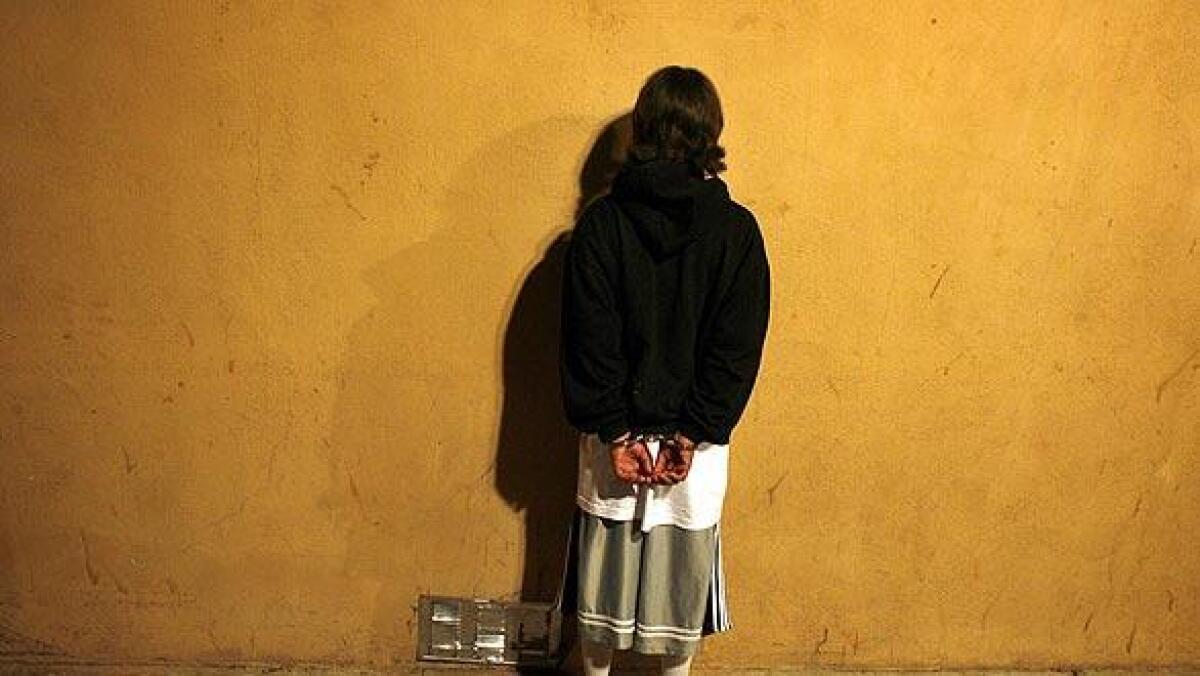
The state Assembly on Tuesday sent a bill to Gov. Jerry Brown that seeks to capture a broader picture of young Latinos in the juvenile justice system.
AB 1998, authored by Assemblywoman Nora Campos (D-San Jose), would require the Board of State and Community Corrections to prepare guidelines for counties on how to separate data by race and ethnicity on juvenile cases, performance and outcomes.
The bill sailed out of the Assembly with a 73-0 vote.
California lawmakers have long grappled with the collection of juvenile justice data. Reports in 1994 and 1999 found gaps in statistics made it difficult to make informed policy decisions.
Those concerns were again echoed in January 2016, when a working group under the state Board of Corrections — ordered by 2014 legislation — produced a plan for improving juvenile justice reporting requirements.
AB 1998 would implement that plan and require counties and the Board of Corrections to produce data in a single and consolidated annual format. It would impact two major state-local juvenile justice grant programs: the Juvenile Justice Crime Prevention Act and the Youthful Offender Block Grant.
Campos said Latinos are “increasingly singled out by the criminal justice system.” But young Latino offenders are classified as white or African American, she said, making it impossible to determine the full scope of their unequal treatment at key points in the juvenile justice system.
“Racial disparity is perhaps the most important issue facing our juvenile justice system, and we need good data to guide our restorative efforts,” Campos said in a statement.
Children seeking U.S. asylum should be given a lawyer, state senator urges

Children who are in the United States without legal residency and facing complex legal problems should not be forced to represent themselves in court, a state senator said Tuesday in asking for federal intervention.
“Thousands of unaccompanied minors are being forced to act as their own attorneys while navigating a complex legal system that even adults struggle to understand,” said state Sen. Ricardo Lara (D-Bell Gardens).
Lara introduced a legislative resolution Tuesday urging federal officials to provide attorneys for children during asylum or deportation hearings.
“It is our moral obligation to ensure that these kids have the legal assistance necessary to plead their case,” said Lara.
Many of the children in question arrived in the country during an exodus from Central American countries in 2014. Lara’s effort, Senate Joint Resolution 28, doesn’t carry the force of law but rather offers state legislators a chance to draw attention to the issue.
Lara, who has championed efforts to expanding California’s health insurance coverage regardless of immigration status, said federal law allows legal representation for those who can’t afford it, and that these unaccompanied minors shouldn’t be treated any differently.
All police body camera bills have failed this year in California
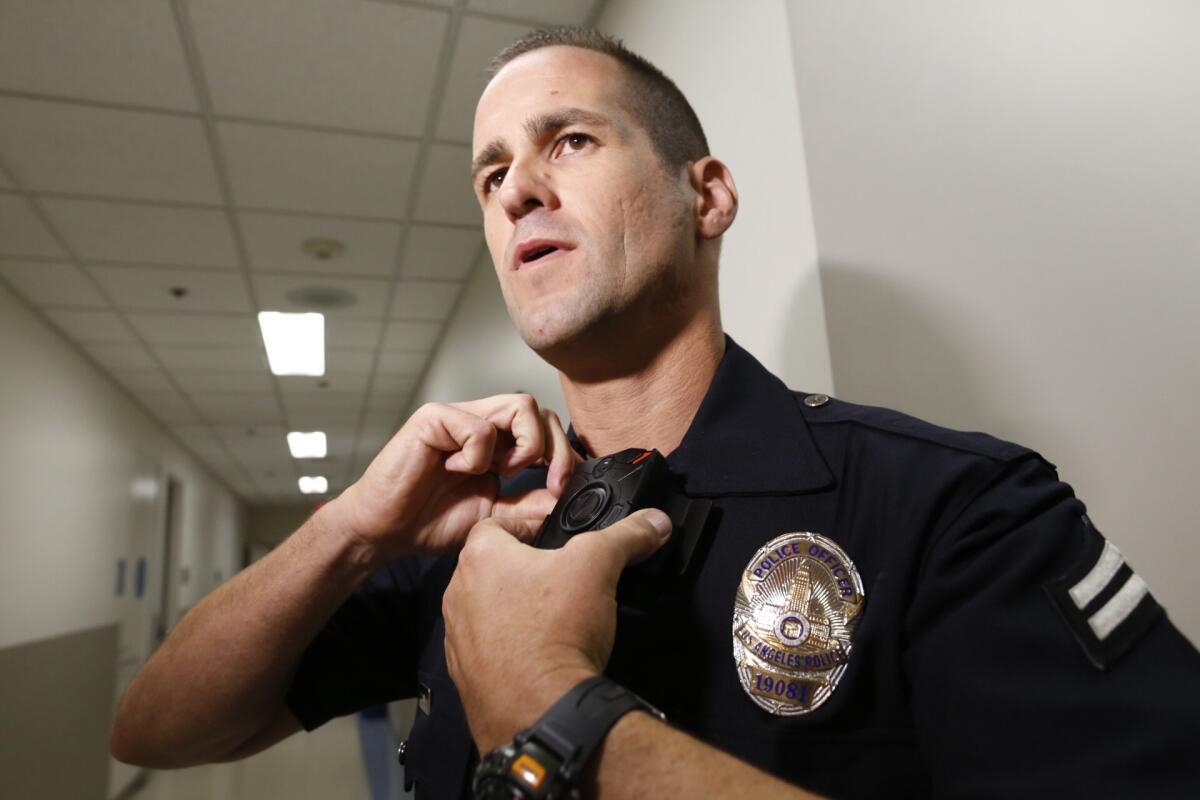
For the second straight year, California lawmakers have failed to pass any major legislation regulating police body cameras after a bill that would have allowed families of fallen police officers to block the release of body camera footage showing the officers’ deaths stalled in a legislative committee Tuesday.
Multiple measures to boost transparency or restrict access to the footage this year did not garner enough support from lawmakers, who have struggled to deal with the complicated privacy and accountability questions raised by the technology — even as police departments statewide have rapidly adopted body cameras as a way to increase community trust in law enforcement.
A bill from Assemblyman Evan Low (D-Campbell) to put surviving relatives in charge of deciding whether videos of officer deaths should be public made it the furthest. Low’s bill narrowly passed the state Senate last week after a lengthy debate between those who believed officer families deserved special protection and opponents who said the bill could block release even when there might be overriding public interest in a video.
But Low pulled the bill from a state Assembly committee hearing Tuesday after he became convinced the measure wouldn’t have enough support to become law this year.
“It’s disappointing that a very modest bill that would simply deal with the video or audio of a peace officer being murdered wasn’t able to pass this year,” Low said in a statement. “Those that claim they are committed to transparency, but stood in its way in this case, should join with us because I plan on bringing this bill back next year and the year after that until it gets passed.”
Few police departments in California — including the Los Angeles Police Department — currently release body camera footage outside of a courtroom because of the state’s already strict laws blocking most law enforcement information from becoming public through open records requests.
Prosecutors in San Diego do regularly release selected footage from officer-involved shootings to explain why they haven’t charged officers with a crime. Should they prosecute an officer, officials there have said, they would make the footage public as part of the trial.
Sen. Dianne Feinstein endorses Rep. Mike Honda for Congress
Legislature names part of Interstate 210 for baseball legend Jackie Robinson

A four-mile stretch of Interstate 210 through the heart of Pasadena will be named the Jackie Robinson Memorial Highway under a plan approved by the Legislature on Tuesday.
Robinson broke through racial barriers of professional baseball as a star player for the Brooklyn Dodgers, the team that relocated to Los Angeles in 1958. But the Hall of Famer grew up in Pasadena, attending John Muir High School and then UCLA.
“Jackie Robinson is not only an inspiring figure to us for his accomplishments in athletics, but also as a civil-rights-era trailblazer who advocated for social change,” said Assemblyman Mike Gatto (D-Glendale), the author of the freeway naming plan, Assembly Concurrent Resolution 197.
The I-210 corridor, said Gatto, is a favorite of Dodgers fans coming from eastern Los Angeles County.
Bill would ban ‘Pokemon Go’ while driving
The state Assembly on Tuesday sent Gov. Jerry Brown a measure that would expand the ban on texting while driving to include other distracting operations of smartphones, including searching for “Pokemon Go” characters.
Assemblyman Bill Quirk (D-Hayward) said smartphone technology and applications have increased since the state outlawed texting on handheld devices.
The bill, which prohibits using a handheld device in a way that distracts from driving, is “an important step in reducing distracted-driving accidents, injuries and deaths,” Quirk told his colleagues.
The bill also plugs a loophole that has made it difficult for law enforcement to enforce existing laws. In 2014, the California Court of Appeal ruled that the existing ban only prohibits a driver from holding a wireless telephone while talking on it, Quirk said.
Other assembly members said more needs to be done.
“This bill will prevent tragedy,” said Assemblyman Tom Lackey (R-Palmdale), a former California Highway Patrol sergeant.

Gov. Jerry Brown to again weigh access to experimental drugs for the terminally ill
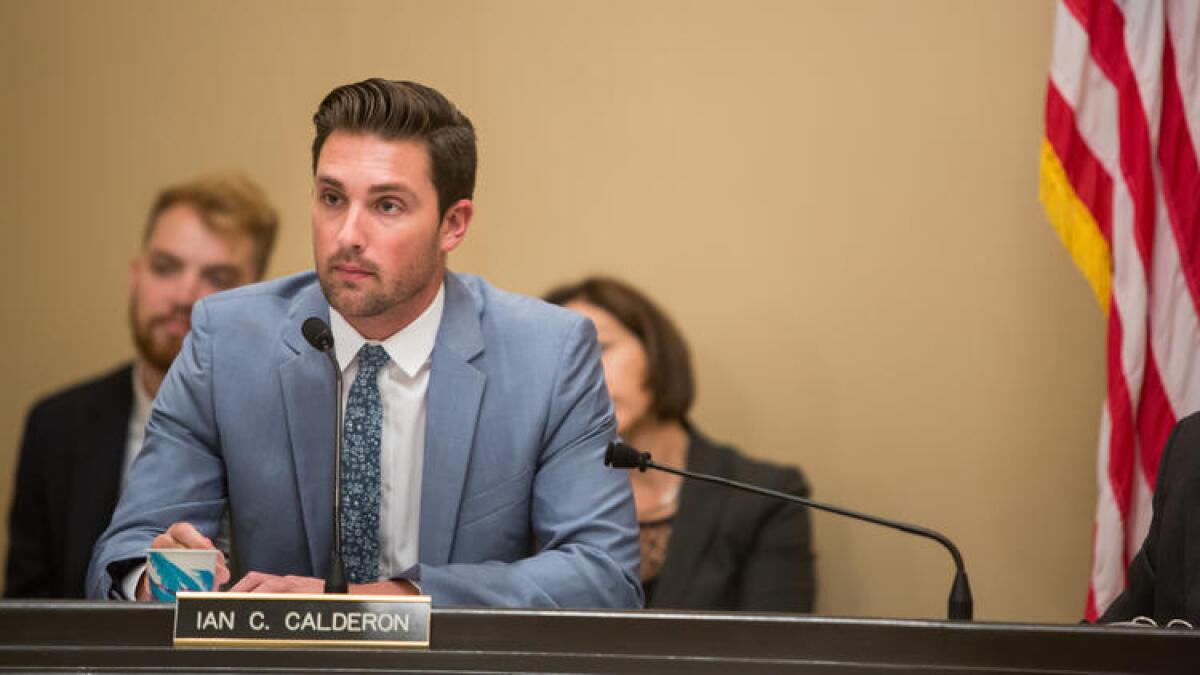
For the second consecutive year, Gov. Jerry Brown will have to decide on a measure that would allow gravely ill patient access to experimental drugs.
The Assembly on Tuesday gave final legislative approval to Assemblyman Ian Charles Calderon’s so-called “right-to-try” legislation, which authorizes drug and medical device manufacturers to make their products available to terminally ill patients, even if the products have not yet been cleared by the federal Food and Drug Administration.
Last year, Brown vetoed a similar proposal by Calderon, a Democrat from Whittier, saying the Food and Drug Administration had recently streamlined a program that allows the very sick to apply for access to drugs still pending approval.
“Before authorizing an alternative state pathway, we should give this federal expedited process a chance to work,” Brown wrote last year.
But advocates of the bill, who have sought new laws throughout the country, say the process is still too slow for those who most need it.
In an interview, Calderon said this year’s bill, AB 1668, is virtually identical to last year’s measure, but that now Brown has had a year to see how the expedited federal process falls short for some patients.
“That’s going to be the conversation with the governor: ‘Look, we’ve done it your way,’” he said. “Over 30 other states now have this on the books. It’s a better way of doing things.”
Tax-free tampons plan goes to Gov. Jerry Brown with bipartisan support

Gov. Jerry Brown must now decide whether to eliminate the sales tax charged on tampons, after a bipartisan vote by the Assembly on Tuesday sent the proposal to his desk.
Assembly Bill 1561 would create a five-year tax break on the purchase of menstrual products. A legislative bill analysis estimated the lost revenue at $20 million a year, split evenly between local and state governments.
But Democratic and Republican legislators agreed that the tax was unfair, imposed on women simply because of their gender and a financial burden on low-income women. They argued other life necessities, including medicine, are also exempted from sales taxes.
“Fundamentally this is about gender equity and leveling the field,” said Assemblywoman Cristina Garcia (D-Bell Gardens), the bill’s author.
Republicans, generally eager to roll back taxes, agreed.
”By scrapping this tax, we’re putting money back in the pockets of California women,” said Assemblywoman Ling-Ling Chang (R-Diamond Bar).
Update Aug. 25: This story was updated at 1:43 p.m. to reflect that the bill number is AB 1561 and not AB 1651.
Uber and Lyft drivers could use rental cars under bill heading to the governor’s desk
The state Legislature on Tuesday cleared the way for potential drivers to lease cars to work for Uber, Lyft and other ride-hailing companies.
The measure, authored by Assemblyman Mike Gatto (D-Glendale), passed by unanimous vote in the Assembly and now heads to Gov. Jerry Brown’s desk.
Recently, Uber and Lyft have stepped up partnerships with carmakers and rental companies allowing people to sign short-term car leases to drive for the companies. But regulators at the California Public Utilities Commission have raised concerns that ride-hailing rental cars could lead to looser driver training and vehicle inspections.
The PUC was set to limit the practice in the spring, but punted after Uber encouraged drivers to flood the agency with opposition. The agency is expected to decide on the matter by the end of the year, but if Brown signs Gatto’s bill, the issue would be resolved in the ride-hailing companies’ favor.
Last week, the Legislature approved a measure that would create stricter driving-under-the-influence standards for ride-hailing drivers. Under the bill from Assemblyman Katcho Achadjian (R- San Luis Obispo), drivers would be prohibited from having a blood-alcohol level of 0.04 or higher compared to the current level of 0.08 for non-commercial drivers. That bill also awaits Brown’s signature.
Still pending in the Legislature this month is a bill to create a statewide taxi commission in an effort to better balance regulations between taxi and ride-hailing companies and a measure to stiffen background checks on ride-hailing drivers.
Government travel to states believed to discriminate against LGBT people soon could be banned in California

California lawmakers voted Tuesday to ban government travel to states believed to discriminate against LGBT people.
AB 1887 aims to prevent the government from sending its employees to states that have passed laws after June 26, 2015, that allow “discrimination against same-sex couples or their families or on the basis of sexual orientation, gender identity, or gender expression.” It also would prohibit California from funding travel to those states.
The California attorney general would be responsible for creating and publishing a list of those states.
The bill now goes to the governor after the California Assembly passed the legislation, 45-18.
Tom Steyer on climate bill clearing hurdle: ‘This is a huge step forward’
Among the throngs of lobbyists, business interests and advocates anxiously watching Tuesday’s climate debate in the Assembly, only one was a potential gubernatorial contender: hedge fund billionaire and Democratic mega-donor Tom Steyer.
In an interview Tuesday afternoon, Steyer said the vote on a measure to extend the state’s greenhouse gas reduction goals marked a continuation of California’s ambitious climate policies.
“We’ve done this since 1970,” he said. “We look back at the stuff we did in 1970 and think, ‘aren’t we proud of ourselves.’ Hopefully we’ll look back at today and say ‘aren’t we proud of ourselves.’”
Steyer said it was a coincidence he was in the Capitol to watch SB 32 pass the Assembly. He had been scheduled to meet with a legislator in a room adjacent to the chamber when the vote began, giving him an unusually close view of the action that was pointedly noted by a Republican strategist on Twitter.
Steyer’s name was dropped in even harsher terms on the Assembly floor, when Republican Assemblyman James Gallagher of Plumas Lake chided Democrats: “You’re dancing to the flute of a rich hedge fund billionaire who’s running for governor.”
Steyer brushed off the remark as an ad hominem insult.
“Normally when I hear something like that, I think, wow those guys have run out of actual arguments and now they’re trying to sling dirt,” he said. “And I try to ignore it.”
Steyer, who has made climate change a centerpiece of his growing political profile, said Tuesday’s action was a “huge step forward” in shoring up the state’s cap-and-trade system, explaining that businesses need stability in the program for long-term planning.
But he also endorsed regulations on direct sources of emissions, a component of a key companion climate bill that still awaits an Assembly vote.
He recalled a conversation with Assemblyman Eduardo Garcia (D-Coachella), the author of that bill, who told him that six out of 10 children in Coachella Valley have asthma. Environmental advocates say that’s due to poor air quality in the region.
“So, if you ask me is it fair to put in rules about emissions next to where people live — six out of 10,” Steyer said, calling back to that statistic. “That’s why we have rules.”
Confederate flags will be a much rarer sight at federal cemeteries after urging from California congressman
The Department of Veterans Affairs is changing its policy on displaying the Confederate flag at the urging of Rep. Jared Huffman (D-San Rafael) and other House Democrats.
In a letter to Huffman, the interim undersecretary for memorial affairs, Ronald Walters, wrote that the new policy will prohibit the flying of the Confederate flag from any permanent flagpole at a national cemetery.
“We are aware of the concerns of those who wish to see Confederate flags removed from public venues because they are perceived by many as a symbol of racial intolerance,” the letter states. “We are also aware that the national cemeteries originated during the Civil War and that they are the final resting places of those who serves on both sides of that conflict and as such flags of the Confederacy are also viewed by some merely as historical symbols.”
The policy will continue to allow private organizations to display the Confederate flag on individual Confederate soldiers’ graves on certain days. The flag can also still be displayed at certain ceremonies and at private burials taking place at national cemeteries.
Earlier this year, the House voted, 265-159, to approve an amendment with the new policy to the 2017 National Defense Authorization Act, but the amendment was not included in the final version. At that point Huffman, who led the amendment with Reps. Ruben Gallego (D-Ariz.) and Keith Ellison (D-Minn.), asked the Department of Veterans Affairs to make the policy change itself.
“While racist individuals and groups continue to embrace the Confederate battle flag, it has never been more clear that this anachronistic symbol of hatred, slavery, and insurrection should not be promoted or gratuitously displayed on federal property,” Huffman said in a statement. “That’s why I am so grateful that the Department of Veterans Affairs responded to our letter and to public concerns and decided to prohibit the large-scale display of Confederate flags on our national veterans cemeteries.”
Rep. Loretta Sanchez appears to shun invitation for Sacramento Senate debate
Orange County Rep. Loretta Sanchez’s campaign appears to have shunned a U.S. Senate debate in September that was proposed by the Sacramento Bee and other media outlets.
The proposed Sept. 20 debate was one of two in which her rival, California Atty. Gen. Kamala Harris, had agreed to participate.
According to the Sacramento Bee, the Sanchez campaign has not responded to the formal debate invitation issued by the newspaper and other sponsors, KUVS-TV Univision 19, KVIE-TV, Capital Public Radio and Sacramento State.
Sanchez political consultant Bill Carrick said he told the debate sponsors that the campaign was going to explore “all of its options” on which invitations to accept. Those decisions are not going to be dictated by a deadline set by those hoping to host the Sacramento debate, he said.
Carrick also noted that one of the Senate debates in the primary was held in Stockton, the same media market as Sacramento, and that it would be better to hold the event in a different region of the state – including the Bay Area.
Carrick criticized the Harris campaign earlier this month for “arrogantly announcing” that she would participate in only two debates. Carrick said the Senate race should have at least three debates, the same number scheduled for the presidential race.
He said Sanchez campaign has received several debate invitations, including one in the Central Valley sponsored by television stations in Bakersfield and Fresno. Carrick said Sanchez was willing to participate in that debate and he questioned why Harris was not.
Carrick said Sanchez will likely participate in a debate sponsored by the Pat Brown Institute for Public Affairs at Cal State Los Angeles on Oct. 5. Harris has agreed to that debate.
Harris political consultant Sean Clegg said the campaign received approximately 10 debate invitations and accepted two with high quality sponsors and access to large audiences. They also wanted one debate to be in Northern California and one in Southern California.
“The Sanchez campaign has killed one of those debates,” Clegg said.
State receives only a trickle of cash from cap-and-trade program
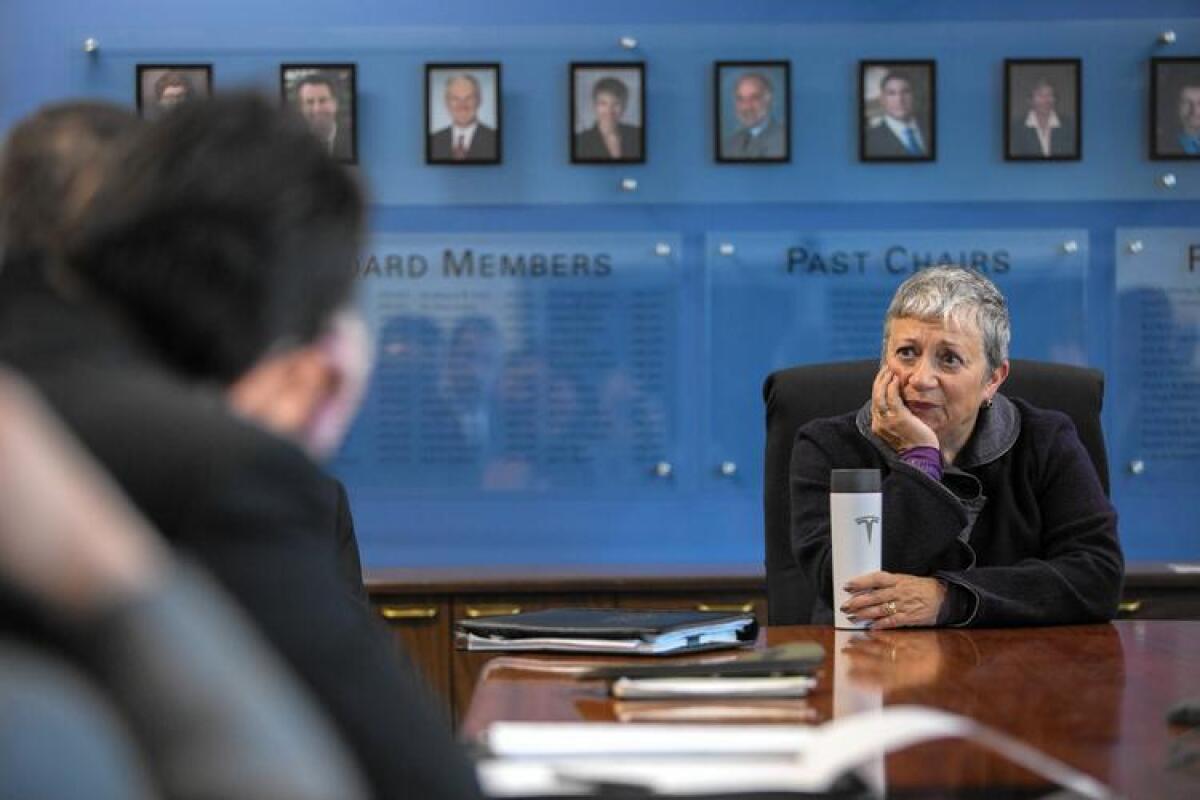
Cap-and-trade produced little revenue this month as demand for greenhouse gas permits remained lower than in the past, according to new figures from the California Air Resources Board, which runs the program.
The results of the auction have been hotly anticipated in Sacramento, where lawmakers are debating the future of the state’s climate policies.
Although final details won’t be available until next month, it’s expected that revenue from the sale will be roughly $8 million, even weaker than the previous round in May.
Supporters of California’s climate policies emphasize that revenue is not the only way to measure the success of cap-and-trade market for greenhouse gases. In addition, the overall demand for permits ticked upward from May to August.
But the money has become an important factor in the Capitol. Gov. Jerry Brown is relying on some of the cash to help fund the state’s bullet train, and lawmakers have been angling to get a cut for projects in their districts.
At the same time, the cap-and-trade program is facing significant legal and political hurdles. Without new measures to extend the state’s targets for reducing greenhouse gas emissions — something that would be accomplished by passing Senate Bill 32 before the legislative session ends next week — it’s unclear whether regulators have the authority to keep operating the program past 2020.
There’s also a lawsuit pending over whether cap-and-trade is an unconstitutional tax. None of the measures under consideration this month in the Capitol would address that issue, meaning legal uncertainty could continue to linger until the case is resolved by the courts.
The program functions by requiring companies to buy permits in order to emit greenhouse gases into the atmosphere, creating a financial incentive to clean up their operations. The permits can be bought during regularly scheduled auctions or traded on a market.
This post has been updated with more details and context about the auction.
Climate plan’s advocates win a victory on Tuesday, but the Capitol fight isn’t over
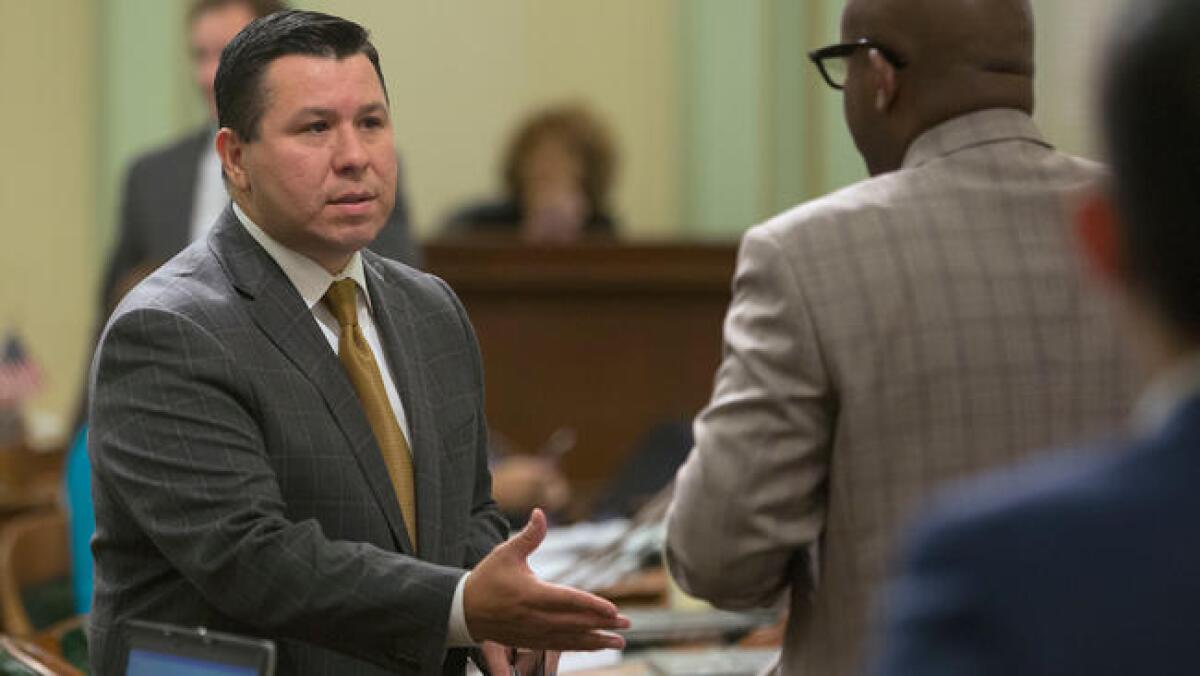
Advocates for California’s sweeping climate change law scored a major victory Tuesday when the Assembly approved a measure to extend the state’s goals to reduce greenhouse gas emissions. But they’re not breathing easy just yet.
Deep in the bill language of SB 32 by Sen. Fran Pavley (D-Agoura Hills) is a sentence that links its fate to another climate bill yet to be approved by the Assembly:
“This act shall become operative only if Assembly Bill 197 of the 2015–16 Regular Session is enacted and becomes effective on or before January 1, 2017.”
That bill, by Assemblyman Eduardo Garcia (D-Coachella), would increase legislative oversight of the California Air Resources Board, which implements much of the state’s climate policy. It also has language that makes it contingent on Pavley’s bill. In legislative parlance, the two are “double-joined” and must both be signed into law to take effect.
Oil companies have been increasingly focused on Garcia’s bill, which includes a provision requiring the agency to focus more on slashing emissions from local refineries and manufacturers. One industry lobbyist said such a shift in focus would undermine the state’s cap-and-trade system, in which businesses purchase permits in order to pollute.
Backers of Garcia’s bill say nothing in the measure rules out the cap-and-trade system. But the oil industry’s focus on AB 197 signals a two-for-one strategy: If they can prevent the bill from passing, they effectively can sink both measures.
Assembly Speaker Anthony Rendon (D-Paramount) made a point to tout Garcia’s bill as a crucial companion to the bill approved today.
“Certainly our caucus understands that AB 197 is really about reform,” Rendons said. “It’s really about oversight, it’s really about accountability. These are the types of things that we’ve been talking about as a caucus, as a Legislature, for some time.”
In the waning days of the legislative session, when parliamentary maneuvers are at their most creative, there may be ways to de-couple the two bills. Nevertheless, as SB 32 heads back to the friendlier Senate for final approval, keep an eye on Garcia’s bill as the key climate focal point in the Assembly.
This post was updated at 2:48 p.m. to include comments from Assembly Speaker Anthony Rendon.
Bill to extend California climate change law passes Assembly, on to state Senate
Big climate change debate begins; lots of behind-the-scenes lobbying
Climate change vote expected on Assembly floor
One of the most controversial bills of the year, a measure to extend California’s target for reducing greenhouse gas emissions, is being debated on the Assembly floor on Tuesday morning.
The legislation, Senate Bill 32, would require slashing emissions to 40% below 1990 levels by 2030. The current target is hitting 1990 levels by 2020, a goal the state is on track to meet.
“When it’s all said and done, this is a simple bill, but an extremely significant one,” said Assemblyman Eduardo Garcia (D-Coachella), who introduced the bill on the floor. “It represents a new chapter of the state’s climate policy.”
Oil companies and some manufacturers have lined up in opposition to the measure, but supporters are hopeful that they’ve been able to persuade enough Democrats to approve it.
“I’m smiling,” said Assemblyman Das Williams (D-Santa Barbara). “I think we’re going to get there.”
Legislation to move more Californians to vote by mail awaits vote in Assembly
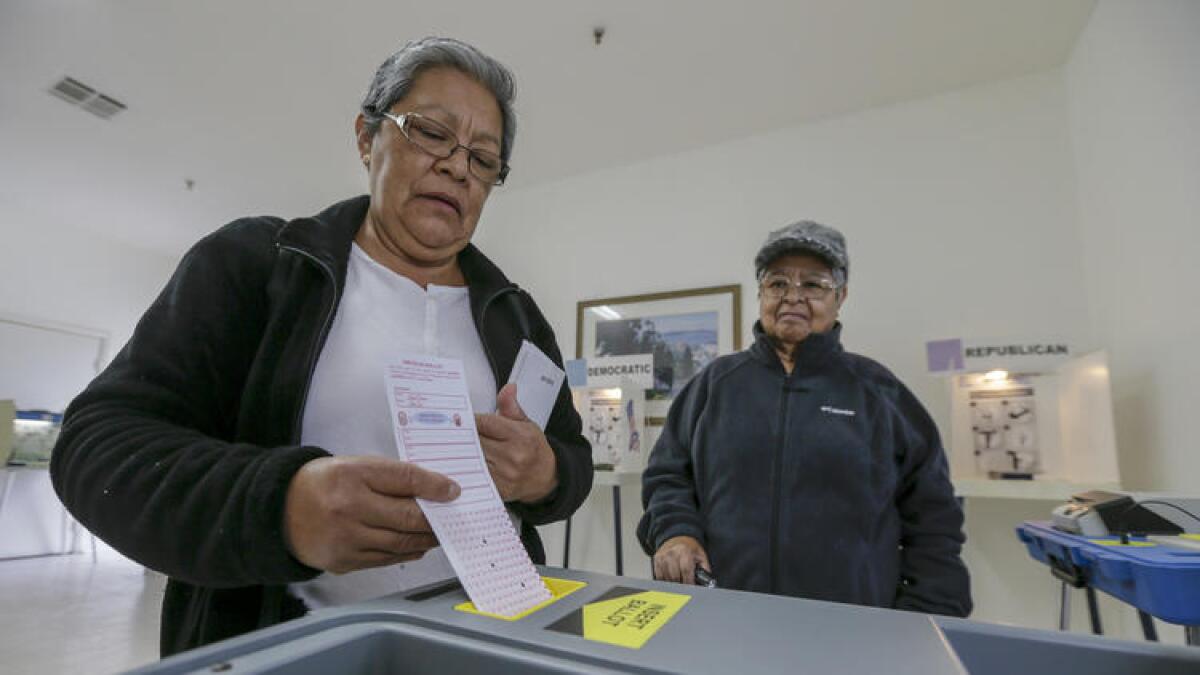
The voting experience in California could change dramatically under legislation awaiting a vote in the Assembly as soon as Tuesday.
SB 450, already approved by the Senate, seeks to move millions more Californians to casting a ballot by mail, and subsequently would allow counties to eliminate neighborhood polling places.
In their place would be a smaller number of “vote centers,” one-stop shopping for everything from late voter registration to some in-person voting booths. Unlike neighborhood polling places, a county resident could choose whichever of these election offices is most convenient.
While the bill by state Sen. Ben Allen (D-Santa Monica) was inspired by a similar system in Colorado, it is a major shift in California’s election operations. And experts say key to its success, if signed into law by Gov. Jerry Brown, is an intense voter education effort.
Bill barring employers from asking about juvenile crimes moves out of the Senate
A California bill that would bar employers from asking job candidates to disclose juvenile crimes has cleared the Senate floor and is headed back to the Assembly for a final vote.
AB 1843, authored by Mark Stone (D-Scotts Valley), would prohibit companies from requiring job candidates to reveal any information about involvement in the juvenile justice system that did not result in a conviction. It also would bar employers from using the information as a condition of employment.
The bill narrowly moved out of the Senate with a 21-14 vote.
Stone says the bill would give young people the same protections as adults and reduce the chances of young people falling back into the justice system, as studies show criminal history can prevent candidates from getting hired or called back after an interview.
On the Senate floor Monday, Sen. Joel Anderson (R-San Diego) argued the legislation forced employers to blindly hire a candidate without excusing them from liability should something go wrong. But Sen. Mark Leno (D-San Francisco) contended it would give young people with criminal records, often in communities of color, a fighting chance.
‘A new level of transparency and accountability’: Climate bill is approved by Senate, heads to Assembly
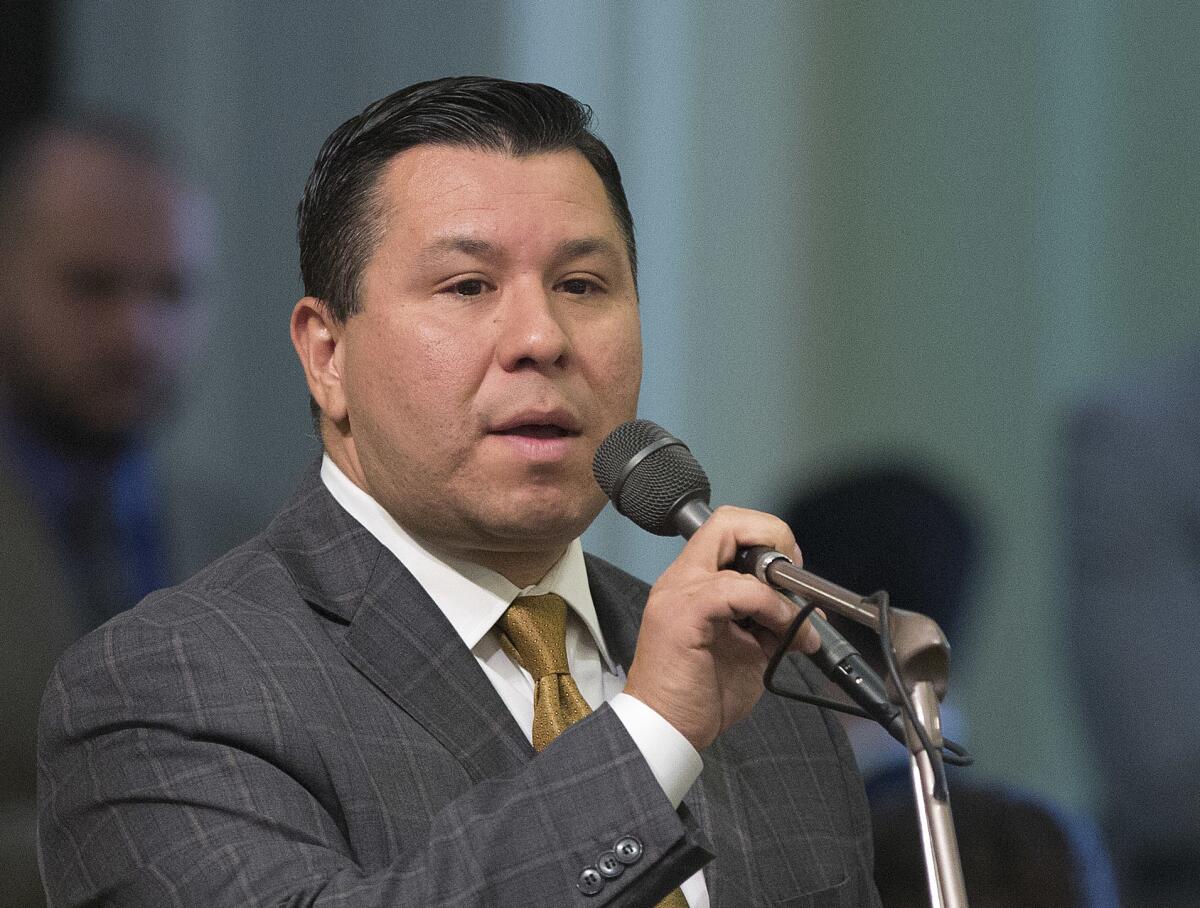
One of two major measures on climate change was approved by the state Senate on Monday.
The legislation, AB 197 from Assemblyman Eduardo Garcia (D-Coachella), would crack down on pollution and give lawmakers greater say over how regulators do their jobs.
It was passed 23-13.
Sen. Fran Pavley (D-Agoura Hills) said the bill “creates a new level of transparency and accountability.” Sen. Ricardo Lara (D-Bell Gardens) said it would ensure “benefits of our policies are actually felt in our most disadvantaged communities.”
Republicans were unsatisfied, and they accused Democrats of rushing the legislation through even though it had received a previous hearing.
“This is too important to be dealt with in the dying hours of session,” said Sen. Jim Nielsen (R-Gerber).
AB 197 now goes to the Assembly for another vote. A related bill, SB 32 from Pavley, would extend the state’s target for reducing greenhouse gas emissions. It’s been approved by the Senate, but not the Assembly.
Legislation to expand farmworker overtime pay clears the Senate
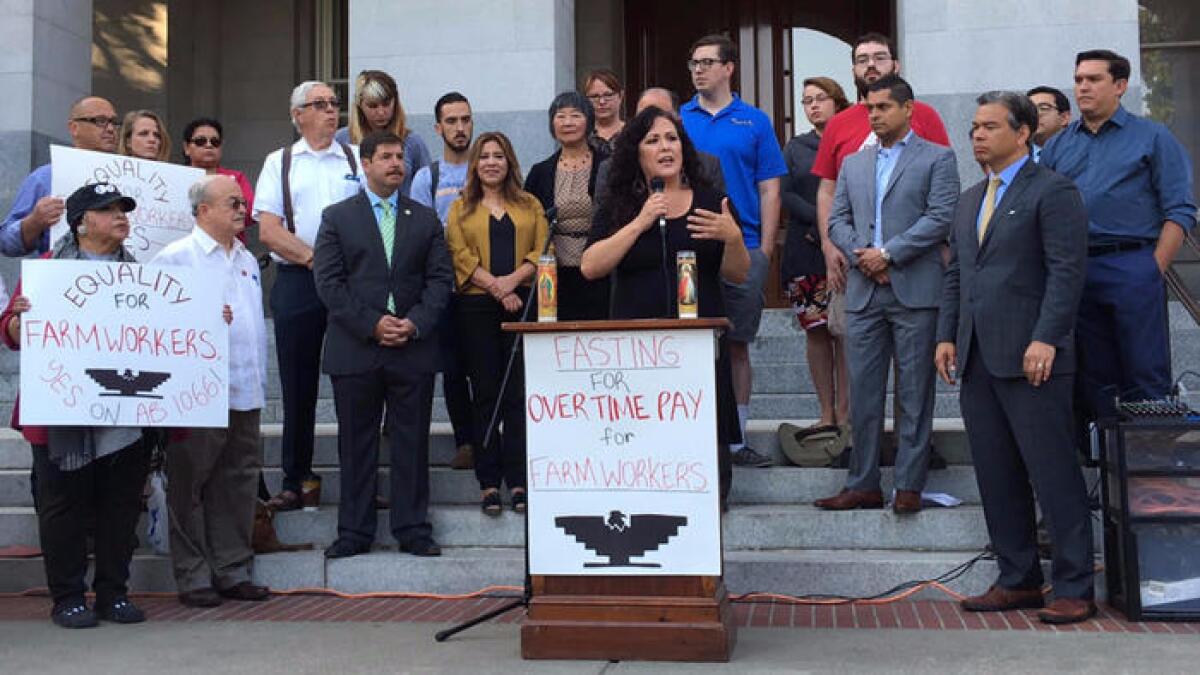
After an hour of debate, including emotional words from Senate leader Kevin de León, the California Senate on Monday passed a bill that would expand overtime pay for farmworkers.
AB 1066, introduced by Assemblywoman Lorena Gonzalez (D-San Diego), squeezed out of the Senate floor with a 21-14 vote. It is now headed back to the Assembly, where it faces its most passionate opposition, for a final vote.
The proposal would roll out new rules for overtime in 2019, lowering the current 10-hour-day threshold for overtime by half an hour each year until it reaches the standard eight-hour day by 2022. It also would phase in a 40-hour standard workweek for the first time.
The United Farm Workers association, which sponsored the bill, says it addresses an injustice inflicted on farmworkers nearly eight decades ago, when they were first exempted from federal minimum wage and overtime standards. The bill has drawn wide and diverse support, including from Democratic presidential nominee Hillary Clinton.
But prominent business groups, led by the California Farm Bureau Federation and a coalition of agricultural producers, have thrown their political weight against it, saying the legislation saddles farmers and growers with higher costs.
On the Senate floor Monday, discussion echoed the passionate debate in the Assembly, where the bill initially died before Gonzalez revived it two weeks later.
De León framed the issue as a matter of equity, saying it was naked racism that excluded agricultural workers from equal standards decades ago. He urged his colleagues to make right by the men and women who toil under the relentless sun to bring produce to stores and tables across California.
“Their calloused hands feed this nation,” he said. “Their strength, their sweat and their determination for a better life have driven our state’s $54-billion annual agricultural economy.”
Lawmakers in agreement pointed to reports that show most farmworkers are not paid minimum wage, endure abysmal work conditions and have limited healthcare and housing options.
Sen. Bill Monning (D-Carmel) said it took legislative action to protect farmworkers in the fields, such as ensuring they had rest breaks and access to potable water.
“Every one of those reforms, that my colleagues point to with pride, they were opposed” by agricultural leaders, Monning said.
But lawmakers opposed to the bill argued that California farmers are already struggling with burdensome regulations and the ongoing water crisis. The bill would backfire on hundreds of thousands of workers, they said, as farmers and growers would probably have to limit their hours and hire more employees to avoid overtime costs.
The state, Sen. Jim Nielsen (R-Gerber) said, already has the strongest laws and regulations to protect farmworkers, who are “aspiring” and “upwardly mobile.” New overtime rules would only hinder the state’s competitive agriculture industry, he said.
“There is no question that, just as with the minimum wage that passed a few months ago, jobs will be gone or hours will be decreased,” Nielsen said. “You are not doing a favor, you are doing harm.”
City and county managers’ salary changes, fringe benefits must be announced before they’re approved

In the continuing fallout from the city of Bell’s financial scandal, Gov. Jerry Brown on Monday signed a bill requiring city councils and county boards of supervisors to publicly announce pay and benefit increases for government executives before they are approved by a vote.
Sen. Patricia Bates (R-Laguna Niguel) introduced the bill as a follow-up to other reform measures taken after criminal charges were filed against council members and others for improperly enriching themselves with money in Bell.
“There is a public interest in ensuring that decisions made by legislative bodies of local agencies regarding local agency executive compensation are open and transparent,” Bates said in a letter to colleagues. “Local agency executives, such as agency CEOs and city managers, are offered fringe benefits including health care coverage and pensions in amounts that can have a significant long-term impact on the budget and that deserve particular scrutiny by the public.”
The bill requires, prior to final action, that the city council or county board orally summarize the recommendations for salaries and fringe benefits at a public meeting.
The overhaul of California’s energy regulator begins to move forward

The first of three bills designed to overhaul the state’s energy and gas regulator cleared a major hurdle Monday with the state Assembly unanimously giving the go-ahead to a measure from Sen. Mark Leno (D-San Francisco) to tighten up rules governing communications between the California Public Utilities Commission and the industries it oversees.
The two other measures, one from Assemblyman Mike Gatto (D-Glendale) and the other from Sen. Jerry Hill (D-San Mateo), would move many transportation regulations, including those governing Uber, Lyft and other ride-hailing companies, to a different state agency and boost transparency of PUC decisions.
Leno’s bill needs approval in the Senate before it reaches Gov. Jerry Brown’s desk, and the other two need approval in both houses. In June, Brown agreed to support the three bills.
‘All gender’ bathroom bill meant to accommodate transgender people heads to Gov. Jerry Brown
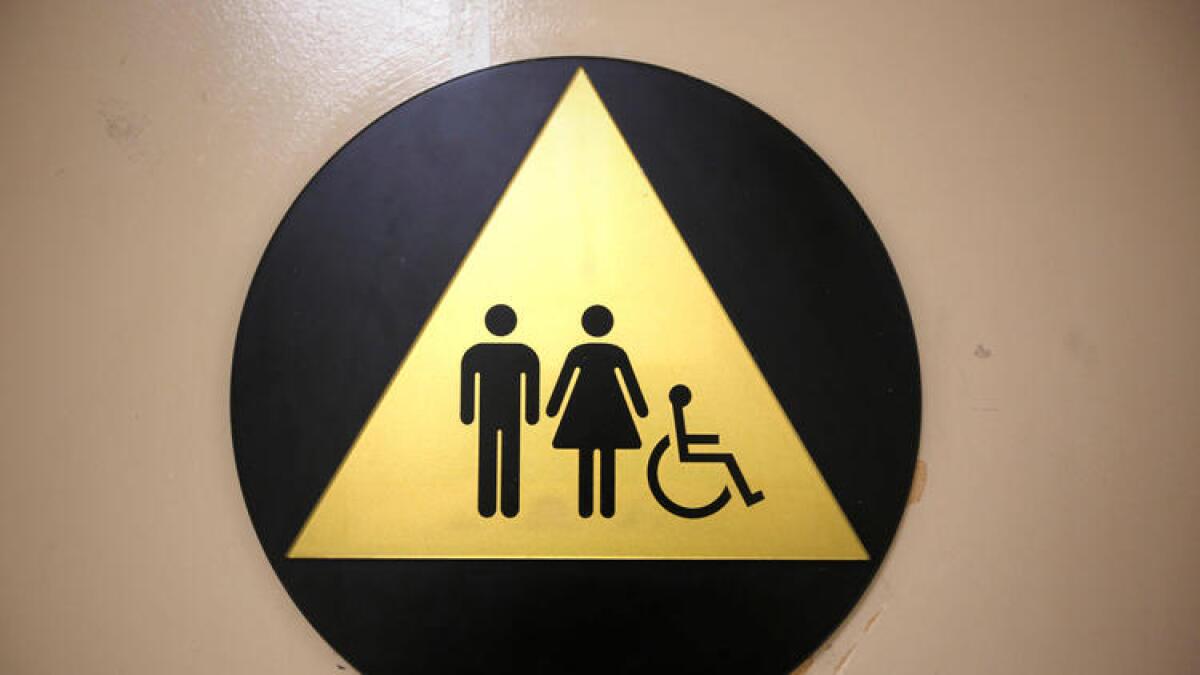
A bill that would do away with “men’s room” and “ladies’ room” designations on single-occupancy bathrooms is now heading to Gov. Jerry Brown.
The measure would require businesses and public buildings to designate single-occupancy restrooms as “all gender,” as opposed to specifically for men or women.
The bill’s author, Assemblyman Phil Ting (D-San Francisco), said such a change is more accommodating to transgender people, but also for parents needing to attend to their children or other family members.
“This simple bill allows single-room occupancy bathrooms to be convenient, to be fair and to really be equal for everybody,” Ting said Monday afternoon on the Assembly floor.
The measure, AB 1732, builds on a 2013 California law that requires that students be allowed to use facilities and participate in activities such as sports teams based on their gender identity, instead of their biological sex.
“California is about to move our state forward, at a time where states like Kansas, North Carolina and even a judge in Texas are politicizing bathrooms,” Ting said.
The issue of bathroom access for transgender people has become a flash point in recent years. In North Carolina, a controversial law requires people to use government-owned bathrooms and other facilities designated for their biological sex, even if that does not match their gender identity.
And on Monday, a Texas judge put a temporary halt to an executive order by President Obama that sought to expand bathroom access for transgender students.
California may soon ease restrictions on selfies at the ballot box
Taking a selfie with your completed ballot may soon be legal in California if Gov. Jerry Brown signs a bill passed by the Legislature on Monday.
The so-called ballot-selfie bill would allow Californians to take photos with their completed ballots.
The California Assembly voted 57-11 to send the legislation to the governor for approval.
Californians are prohibited from showing others their ballots after they have marked them, although the bill’s author, Marc Levine (D-San Rafael), told the Los Angeles Times in January that no Californian has ever been prosecuted for taking a ballot selfie.
The bill aims to protect Californians’ rights to engage in political speech, Levine said on the Assembly floor before the vote.
“I see this as a 1st Amendment issue,” said Assemblyman James Gallagher (R-Yuba City), who appeared to take a selfie while voting in support of the bill. “All this does is say those who want to share how they voted have the right to do so, and many people already do over social media.”
Two Californians — a neurosurgeon and an astrophysicist — picked for White House Fellows program
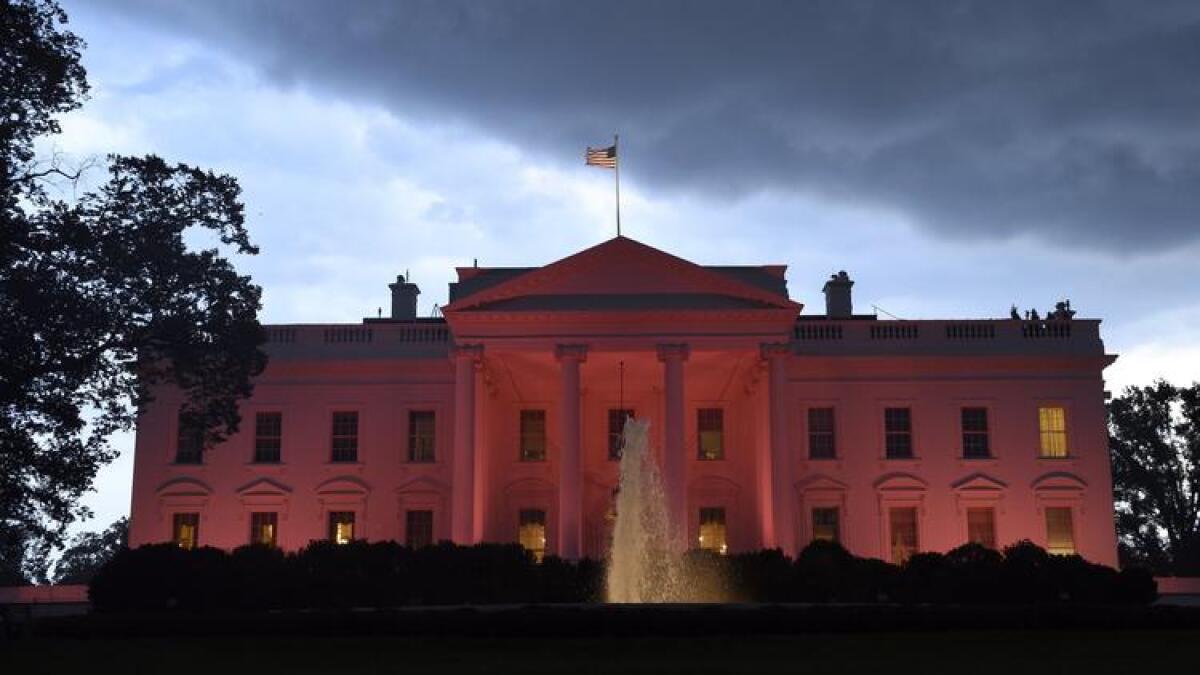
A neurosurgical resident from Los Angeles and an astrophysicist from Woodland Hills will participate in the 2016-2017 White House Fellows program.
Created in 1964 by President Lyndon B. Johnson, the program aims to introduce young skilled professionals to public service. The nonpartisan selection is based on leadership potential, education and prior involvement in public service.
The Californians and 14 other fellows from across the country will spend a year in Washington working with senior White House staff and cabinet secretaries. They will participate in service projects, meet with public and private sector leaders, and travel internationally and domestically.
Lindsey B. Ross of Los Angeles is a a senior neurosurgical resident physician at Cedars-Sinai Medical Center studying neurological disease.
Anjali Tripathi of Woodland Hills is an astrophysicist who was most recently at Harvard University. Her research focuses on the formation and evolution of planets.
Several people with California ties were chosen for last year’s class and were stationed at the Energy, Homeland Security, and Housing and Urban Development departments, as well as the National Economic Council.
Assemblywoman makes her point with a little help from Siri
Assemblywoman Kristin Olsen (R-Modesto) trotted out a high-tech prop to speak against a bill on Monday: Siri, the electronic personal assistant on Apple iPhones.
Speaking against a measure by Assemblyman Ian Calderon (D-Whittier) that requires online entertainment subscription services to remove actors’ ages and birth dates upon request, Olsen used her iPhone to demonstrate such information was readily available.
When prompted, Siri served up the ages of Clint Eastwood and Meryl Streep.
The gambit didn’t slow down the bill, however. AB 1687 passed on an 55-13 vote and now heads to the governor.
Legislative historian Alex Vassar said the electronic assist was a first.
Billionaire political activist Tom Steyer backs upholding the state’s plastic bag ban

Billionaire Democratic political activist Tom Steyer on Monday announced his support for Proposition 67, a ballot measure that will let voters decide whether to uphold or overturn a 2014 law imposing a statewide ban on plastic bags.
The ban on single-use plastic bags in grocery stores was signed by Gov. Jerry Brown, but a trade group opposing the ban was able to qualify a referendum in early 2015, putting the law before voters this November. Voters who choose “yes” will be ratifying that law.
Steyer is a politically powerful environmentalist and former hedge fund manager who has spent millions to elect Democrats. He joins a slew of environmental groups, like the Surfrider Foundation, that support the ban.
The plastic industry has poured more than $5 million into a political committee called the American Progressive Bag Alliance set to oppose the plastic ban and back another plastic bag-related initiative called Proposition 65. That proposal will redirect fees for paper or reusable bags from retailers to a special fund administered by the Wildlife Conservation Board.
“In an attempt to protect their profits, out-of-state plastic bag companies and chemical corporations have already spent millions to roll back California’s ban on their environmentally destructive products,” Steyer said in a statement. “As Californians, we can’t allow these corporations to continue to trash our beaches.”
Read more about the 17 measures on the November statewide ballot.
Two years after deadly crash, Assembly advances new safety standards for charter buses

The state Assembly on Monday approved new safety standards for charter buses in reaction to a 2014 accident that killed eight Los Angeles-area high school students on a trip to visit Northern California colleges.
The 2014 accident occurred when a tractor trailer drifted across the median of Interstate 5 near Orland and hit the charter school bus, disabling the bus door and causing diesel fuel from the truck to spray into the bus and ignite.
The bill by Sen. Ricardo Lara (D-Bell Gardens) would require that charter bus vehicles designed to carry 39 or more passengers and made after July 1, 2020 be equipped with emergency lighting that will turn on in the event of a collision.
In addition, drivers would be required to provide written or video instruction to all passengers on the vehicle’s safety equipment and emergency exits prior to any trip. The measure was previously approved by the Senate but goes back there for a vote on amendments.
The bill originally also would have required buses to be equipped with a secondary door, but that provision was dropped after the industry objected it would be prohibitively expensive.
The man who may know more about California schools policy than anyone else calls it a career in Sacramento
Relatively no part of California state government is more complex than the way public schools are funded, so much so that it used to be said only two people knew how the complex funding formulas worked.
One of those people, Rick Simpson, is retiring as a top staffer in the Legislature after 38 years.
Simpson announced his retirement on Monday, to take effect when the Legislature adjourns at the end of the month.
“Rick Simpson has played a leading role in every education issue,” said Assembly Speaker Anthony Rendon (D-Paramount) in a special recognition during Monday’s floor session.
Simpson, who became a legislative staffer in 1978, has played a leading role in the implementation of Proposition 98, the voter-approved ballot measure that establishes a minimum guaranteed funding for K-12 schools and community colleges. Proposition 98 includes a series of formulas that dictate how many tax dollars are given to schools, based on economic conditions and previous funding levels.
The proposition’s author, John Mockler, died in 2015. He and Simpson, the Capitol joke has always gone, were the only two who actually knew how the law worked.
“Don’t go away, please,” joked Assemblyman Patrick O’Donnell (D-Long Beach), chair of the Assembly’s education committee, in praising Simpson on Monday.
Simpson, a former college fencer, often injected swordsmanship humor into the most tedious of legislative days and told the Capitol Morning Report he intends to resume fencing as a hobby upon his retirement.
Simpson spent most of his career as staffer in the Legislature and served nine different Assembly speakers. He also served Gov. Gray Davis as legislative affairs secretary.
As assembly members from both sides of the aisle rose Monday to praise Simpson, one small piece of political trivia came to light: Simpson, during the depths of the state’s fiscal crisis, had used his mastery of legislative rules to quietly draft a bill to impeach Gov. Arnold Schwarzenegger.
The proposal, no doubt popular with liberal Democrats furious over Schwarzenegger’s insistence on deeper spending cuts, was kept in Simpson’s office desk drawer, just in case.
John A. Pérez, a former Assembly speaker, said that it was Simpson who made the compelling case during those tough times to scrap the politically explosive idea.
Simpson said the rules “were not something to be exploited just for advantage or gain,” Pérez told assembly members on Monday. “That’s what is so special about Rick.”
Campaign to defeat a ballot measure on prescription drug spending raises $47 million this year
Pharmaceutical companies have contributed more than $16 million this month to oppose a ballot measure that aims to limit the price the state pays for prescription drugs.
The contributions were reported in campaign finance filings Friday.
Earlier last week, state Sen. Ed Hernandez (D-West Covina) announced he would pull his drug pricing transparency bill. With Hernandez’s legislation, SB 1010, out of the picture, the fight over regulating prescription drug costs has shifted to the ballot measure, Proposition 61.
Proposition 61 would ban state agencies such as Medi-Cal from paying more for prescription drugs than the lowest price paid by the U.S. Department of Veterans Affairs.
The new fundraising numbers bring the total reported this year by the campaign against the ballot measure to more than $47 million.
Campaigns to support the measure have reported more than $5 million in contributions this year.
Meet the new boss -- Arnold Schwarzenegger prepares to take over ‘Celebrity Apprentice’
Since Donald Trump left his reality television series to run for president, former California Gov. Arnold Schwarzenegger has been preparing to step into his place as host of “Celebrity Apprentice.”
He posted this video on Twitter today.
Showdown expected in Assembly over expanding overtime pay for farmworkers

The Senate on Monday will take up a bill by Assemblywoman Lorena Gonzalez (D-San Diego) that seeks to expand overtime pay for farmworkers in California.
Although the bill is likely to pass in the liberal upper house, a showdown is expected among Gonzalez’s colleagues in the Assembly, where demographics have changed, but powerful agricultural interests remain.
Supporters of the bill say it would correct a wrong inflicted on farmworkers nearly eight decades ago, when they were first excluded from a federal law implementing minimum wage and overtime standards. Opponents say it will saddle farmers with higher costs and spur growers to leave the state.
Why some lawmakers representing poor communities are pushing back on California’s climate program
With less than two weeks to go in the state’s legislative session, the big item still on the agenda for Gov. Jerry Brown and lawmakers is extending California’s climate change goals beyond 2020.
But mounting pushback is coming from a number of lawmakers, particularly Democrats in the Assembly, who are arguing that climate change programs must to do more for poor communities of color. Their criticism that has become increasingly pointed.
California Politics Podcast: Drug pricing debate fizzles, climate change talks continue in Sacramento
For months, powerful interest groups battled behind the scenes at the state Capitol over a plan to require new disclosure over the price of prescription drugs. But the bill was officially killed this week, the victim of amendments crafted in private that weakened its efforts at transparency.
On this week’s California Politics Podcast, we discuss the collapse of talks over drug price transparency and how it might impact a Nov. 8 ballot measure on the same topic.
We also take a close look at the latest negotiations on a new climate change law and some of the clashes it’s sparked between Democrats.
And in our final segment, the latest statewide voter registration data suggests continuing troubles for California’s Republican Party.
I’m joined by Marisa Lagos of KQED News and Anthony York of the Grizzly Bear Project.
Casino politics: Condit’s firm is lobbying for tribe in front of panel his son-in-law chairs
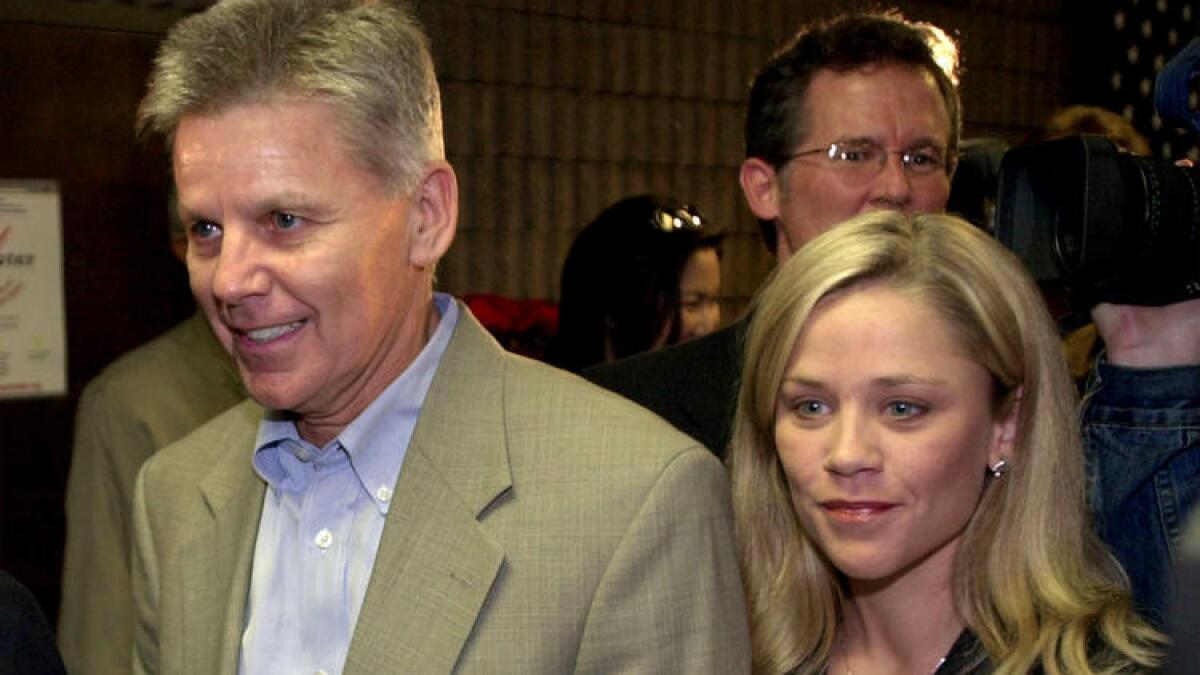
A casino operator has hired former Rep. Gary Condit’s firm to lobby the state Legislature at a time when the legislative panel overseeing gambling issues is chaired by Condit’s son-in-law.
Condit is a founder of BBC Public Affairs, which a state filing shows was hired Aug. 2 by the Pechanga Band of Luiseno Indians in Temecula to lobby in Sacramento on “utility/energy” issues. The hire came just before Condit’s son-in-law, Assemblyman Adam Gray (D-Merced), proposed changes to his bill legalizing Internet poker in California in a way that specifically addressed concerns by Pechanga.
A Pechanga representative, Jacob Mejia, said there is no relationship between the hiring of BBC and the tribe’s efforts to get Gray to change his bill. He said the tribe hired one of Condit’s partners -- Kelly Boyd -- before she joined the former congressman in starting a new lobbying firm.
However, a private document showing an April contract between Boyd and Pechanga was not provided until five days after The Times asked for details about the business relationship.
On July 29, Pechanga announced the formation of the first tribally owned and operated wholesale electric utility located in the state of California.
BBC is “monitoring utilities issues for us and have nothing to do with I-poker,” said Jacob Mejia, a representative of Pechanga.
“This is the first we have heard of this,” said Trent Hager, Gray’s chief-of-staff.
Condit’s daughter, Cadee, is married to Gray. Condit lost a reelection bid to Congress in 2002 after the scandal over the disappearance and killing of federal intern Chandra Levy.
Condit and other BBC officials did not return calls for comment.
Kathay Feng, executive director of the watchdog group California Common Cause, suggested it’s an optics problem.
“It still leaves the question, the public perception about whether a bill has been influenced by considerations other than just public policy,” Feng said.
Update Aug. 25: This story was updated at 11:45 a.m. with additional information on the business relationship between the tribe and BBC partner Kelly Boyd.
Roger Hernández’s congressional bid was rocky from the start
Assemblyman Roger Hernández’s campaign to take fellow Democrat Grace Napolitano’s U.S. House seat was quickly marred by accusations of domestic violence.
Baldwin Park City Councilwoman Susan Rubio gave graphic testimony detailing abuse she said she suffered at his hands over the course of their three-year marriage. Her comments, as well as past accusations of domestic violence, were used against him in mailers from Napolitano’s campaign.
When June primary polls closed, Hernández sat in third place in the race behind Napolitano and first-time Republican candidate Gordon Fisher.
But, on the same day a judge granted Rubio’s the request for a domestic violence restraining order, the Los Angeles County registrar-recorder released its final count of votes showing that Hernández had moved into second place by a margin of just 792 votes over Fisher.
Despite a swift political backlash after the restraining order was issued, including the loss of several endorsements as well as all of his committee assignments in the Assembly, Hernández was ostensibly still in the race until Friday when the West Covina Democrat indicated he would stop his campaign altogether.
Over the last several weeks while the assemblyman was on medical leave, his campaign remained quiet on social media. Laura Herrera, who managed his campaign during the primary, told The Times last week that she was not running his general election campaign and has not been in contact with Hernández.
Fundraising efforts crashed after the primary as well, according to the latest disclosures filed with Federal Election Commission.
Hernández reported raising just $8,849 between May 19 and June 30 and having $60,668 left in the bank for the general election. Napolitano raised just shy of $100,000 in that same period and had nearly $250,000 in cash on hand.
Hernández’s campaign headquarters on Rowland Street in Covina has been leased to new tenants, according to real estate agent Michael Wong, who represents the property.
The campaign also was a financial burden for Hernández personally: He lent himself $80,000.
Hernández launched his campaign last December at a park in West Covina with local union supporters and family by his side. He made jabs at Napolitano for not living in the 32nd Congressional District and sought to cast himself as a young “activist” lawmaker.
Napolitano suffered a stroke in February but vowed to keep campaigning for a 10th term.
Though Hernández cannot seek reelection to the Assembly because of term limits, he has an existing account to raise money for a potential run for the California’s 22nd Senate District in 2018.
Hernández’s office said “he is keeping it as an option.”
The seat is currently held by state Sen. Ed Hernandez, who cannot seek reelection in 2018 because of term limits and is running for the Lt. Governorship that year.
Embattled Assemblyman Roger Hernández drops bid for Congress: ‘I don’t have the fight in me to continue’
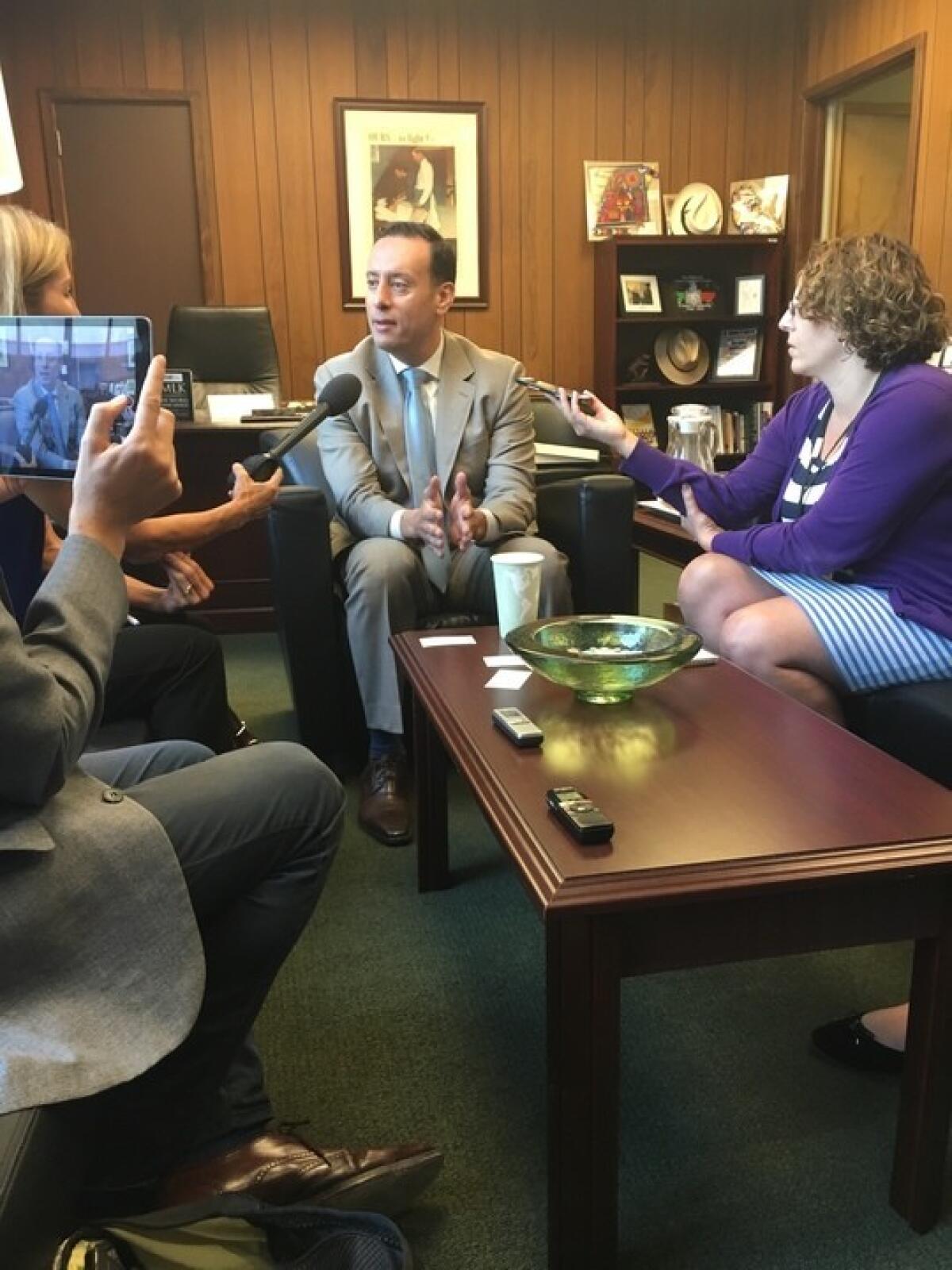
Under fire over domestic violence allegations and questions about taking a medical leave of absence from the Legislature, Assemblyman Roger Hernández (D-West Covina) indicated Friday that he was no longer actively campaigning for a U.S. House seat against Democratic Rep. Grace Napolitano.
“Because of the damage, I don’t have the fight in me to continue forward in a congressional run,” Hernández told reporters after returning to work Friday in Sacramento following more than two weeks on leave.
The assemblyman, who was stripped of his committee assignments after a judge issued a domestic violence restraining order against him, said he has been suffering from blood pressure issues but is back for the rest of the session. He went on medical leave on Aug. 1, providing a physician’s note that did not explain any conditions, and continued to take his pay.
He compared his ex-wife, Baldwin Park City Councilwoman Susan Rubio, to “Tonya Harding,” and said her accusations that he beat her during their marriage have been like “a baseball bat to my knees.”
Hernández said he has been in his district, either at home or at his doctor’s office, during his leave. Asked by reporters if he had been in a rehabilitation program, he said no and added that any rumors of a drug problem were being spread by “haters.”
“I’ve made a big mistake,” Hernández told reporters, saying he should have been more open about his situation with the public.
“I’ve been going through a traumatic experience in my life. ... I wasn’t healthy. My health was not at par to be at work,” Hernández said.
John Casey, communications director for Assembly Speaker Anthony Rendon (D-Paramount), said Hernández had previously submitted a new medical note extending his leave.
Friday was the last day to amend legislation for this year and Hernández has several bills pending a final vote.
The current legislative session ends Aug. 31 and term limits mean Hernández is not returning next year.
Rendon removed Hernández from his post as chairman of the Committee on Labor and Employment in July after a judge ordered the assemblyman to keep away from Rubio for three years.
For the record: An earlier version of this post incorrectly identified Casey as Rendon’s chief of staff.
Motorcycle lane splitting is officially legal in California

California’s motorcyclists could soon have clear rules on lane splitting after the state on Friday became the first in the nation to formally legalize the practice.
Gov. Jerry Brown has signed legislation by Assemblyman Bill Quirk (D-Hayward) that defines the practice and authorizes the California Highway Patrol to establish rules for motorcyclists on how to do it safely.
Assemblyman Tom Lackey (R-Palmdale), a retired state highway patrol sergeant who co-wrote the bill, called the new law a “groundbreaking step.”
“This is a huge win for roadway safety,” Lackey said in a statement. “We are now giving riders and motorists clear guidance on when it is safe.”
Lane splitting, in which a motorcyclist passes other vehicles by riding between them along the lane line, has long been a controversial issue.
Technically, it has not been legal or illegal, falling in a gray area where it was treated as acceptable by law enforcement agencies. But when the CHP published guidelines on the practice in 2015, a citizen complained that the agency should not be allowed to create public policy. In came AB 51.
Quirk’s original bill proposed that lane splitting could occur legally only when a motorcycle was moving no more than 15 mph faster than the traffic around it, and it prohibited the practice at speeds above 50 mph.
Several motorcyclists’ groups objected to that, saying the limit was too low. Other groups and individuals, who believe that lane splitting is dangerous regardless of speed, objected to the proposal entirely.
The revised bill, which sailed through the legislative process, provides a basic definition of “lane splitting” and leaves the rest to the CHP. Quirk has said it has many benefits, including reducing traffic congestion and promoting safety.
“I am thrilled to see that California is once again at the forefront of common-sense road safety legislation,” Quirk said. “Signing of this bill will bring legitimacy to this practice and help to keep our roads safer and our drivers – both motorcyclists and motorists – better educated.”
Assemblyman Roger Hernandez quietly returns to state Capitol after medical leave
Rep. Ami Bera’s father likely to spend 10 months in federal prison for campaign money crimes
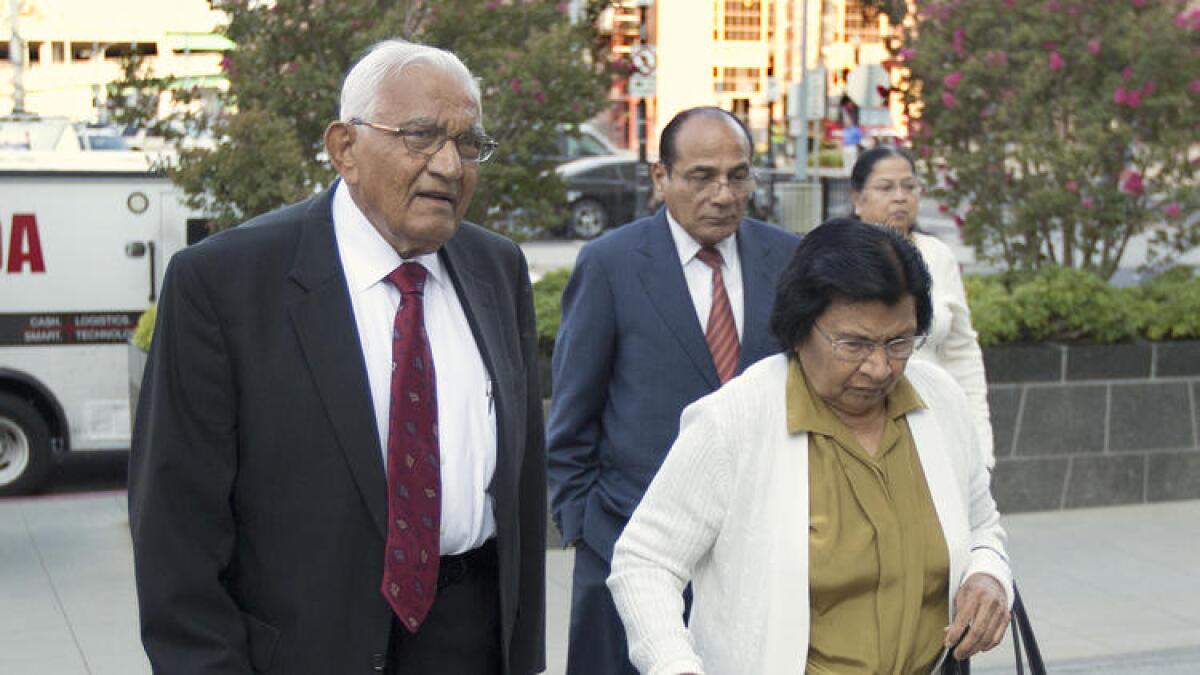
The father of Rep. Ami Bera (D-Elk Grove) was sentenced to one year and one day in prison for breaking federal campaign finance law, but will likely serve closer to 10 months behind bars.
Babulal Bera, 83, was sentenced in federal court in Sacramento on Thursday. A spokesperson for the U.S. attorney’s office said that a defendant must serve at least 85% of the sentence.
Low-income housing negotiations are done for the year, Assembly speaker says
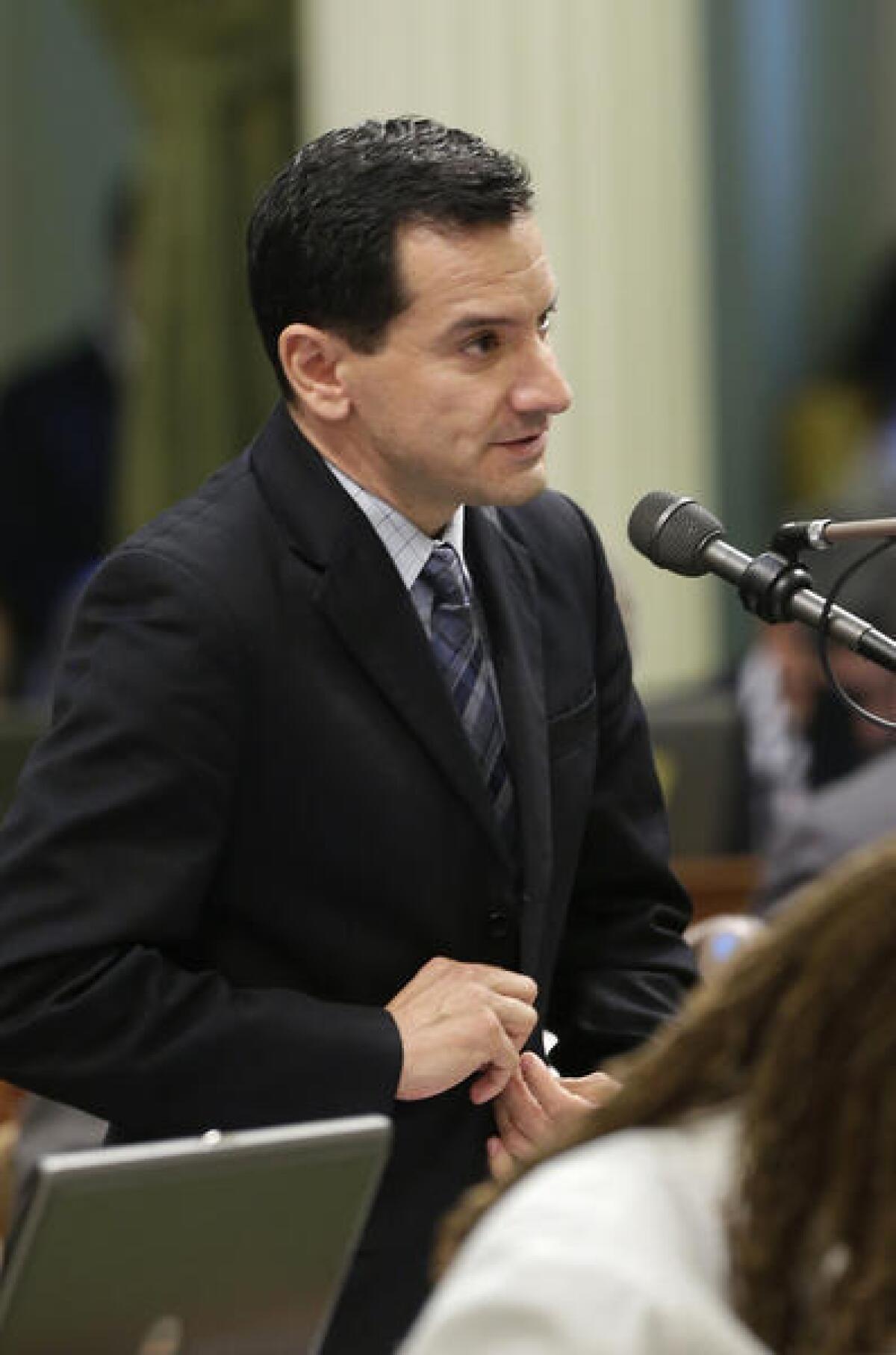
An effort led by Gov. Jerry Brown to streamline housing production for developments that include units for low-income residents appears to be finished for the year, a spokesman for Assembly Speaker Anthony Rendon (D-Paramount) said.
“Currently, there are no further negotiations on housing,” spokesman Kevin Liao said Thursday.
Rendon’s comments, which were first reported by the Sacramento Bee, likely provide the death knell to the governor’s effort to tackle the state’s spiraling housing costs by making it easier to build. Brown’s office did not immediately respond to a request for comment.
Negotiations over the plan had made little progress since June when Brown agreed to spend $400 million on low-income housing subsidies should the Legislature agree to pass a version of his housing plan.
Brown’s proposal had faced strenuous opposition from influential labor and environmental groups, which had wanted higher wages for construction workers and were upset that the plan allowed projects to bypass some review under the state’s main environmental law governing development. A coalition of 60 labor, environmental and community advocacy groups walked away from negotiations over the plan last week.
When that happened, the Brown administration said it still held out hope for a deal. But in a further sign that the plan wasn’t moving, low-income housing advocates sent a letter to the governor and legislative leaders Wednesday asking them to spend the $400 million in subsides without the streamlining plan passing.
“Please do not penalize our state’s most vulnerable residents for the failure to reach agreement on the streamlining proposal,” the letter reads.
The Brown administration has given no sign it was willing to spend the money without the housing affordability legislation passing. Last month, a Brown deputy warned that there might be little appetite for future housing subsidies or regulatory relief if lawmakers didn’t act this year.
Other housing measures, including Brown-endorsed bills to make it easier to add small additional units in backyards and a $3 billion low-income housing bond remain alive in the Legislature.
UPDATES:
5:30 p.m. This post has been updated to list other housing measures still pending this year after Rendon’s staff expressed concern that their comments could be interpreted as implying that negotiations had ceased on all housing bills.
This post was originally published at 4:18 p.m.
California lawmakers advance bill to decriminalize prostitution for minors
A controversial bill that would decriminalize prostitution for minors squeezed out of the California Assembly on Thursday and is now headed back to the Senate for a final vote.
SB 1322, authored by Sen. Holly Mitchell (D-Los Angeles), would make the crimes of solicitation and loitering with intent to commit prostitution misdemeanors inapplicable to children younger than 18. It also would allow law enforcement to take sexually exploited children into temporary custody if leaving them unattended would pose an immediate threat to their health or safety.
The measure passed Thursday with a 42-29 vote. It was one of two bills heard Thursday seeking to decriminalize prostitution.
SB 1129, authored by Bill Monning (D-Carmel), would repeal mandatory minimum sentences for specified prostitution offenses. It moved out of Assembly with a 42-26 vote and is also headed back to the Senate for a final vote.
Legislation to curb human trafficking has been a prominent issue at the state Capitol this session, as prosecutors and advocates in recent years have pushed the issue to the political forefront. Most of the proposals have focused on the trade of forced sex and reflect a cultural shift in the approach to prostitution that aims to divert victims forced into the industry away from the criminal justice system.
Gov. Jerry Brown in 2014 signed legislation placing sex trafficking victims without legal guardians under the authority of the dependency system, which centers on caring for abused and neglected children.
SB 1322 drew the support of a large coalition of advocates who said the bill was a step further in that direction, taking young victims entirely out of the juvenile justice system. But law enforcement officials oppose the move, saying the state’s child welfare system is woefully low on resources.
On the Assembly floor, lawmakers agreed the legislation was well-intentioned and promoted the idea that “there is no such thing as a child prostitute,” as children cannot legally consent to sex.
But while supporters of the bill argued that it would provide a better way to connect young victims with social services, opponents countered that it would prevent law enforcement from helping vulnerable children who often don’t see themselves as victims, run away from unsecured shelters and remain tied to their traffickers through complicated psychological and emotional bonds.
“Right now the best way to get these young women help, the best way to rescue them from this lifestyle is by keeping law enforcement involved through the ability to arrest,” Assemblywoman Kristin Olsen (R-Modesto) said. “Maybe in a few years from now, when we are doing better job at both the state and local level, we will better equipped and ready for this bill because services to young women will be readily available. But we are not there yet.”
Assembly Judiciary Committee Chairman Mark Stone (D-Scotts Valley), who co-authored the bill, said the Legislature had put $20 million in this year’s budget to address the issue. Forty of 58 counties, he said, had already applied for funding to develop social services, shelters and other programs.
“All we are doing in perpetuating current law is saying, ‘You are not the victim, you are the criminal,’” he said. “Let’s say collectively there is no such thing as a child prostitute because there is no such thing as a child prostitute.”
Other lawmakers agreed.
“This is not the end of it,” Assemblywoman Shirley Weber (D-San Diego) said. “This is the beginning of us thinking differently about the problem.”
Sen. Barbara Boxer on the ailing Salton Sea: ‘This is a crisis waiting to happen’
Sen. Barbara Boxer on Thursday visited the Salton Sea and tried to put pressure on state and federal agencies to use more of their resources on saving it.
“This is a crisis waiting to happen, and it is the time for firm leadership by every single stakeholder,” she told reporters after touring a restoration project at Red Hill Marina, according to a transcript.
The Salton Sea was created in 1905 when the Colorado River broke through a silt-laden canal and poured into a basin near Brawley known as the Salton Sink. It grew into a 360-square-mile lake straddling Riverside and Imperial counties, but it has been shrinking, causing record-high salinity levels and animal die-offs.
Boxer’s visit came a week after The Times reported on complaints from local officials that the state is years behind on efforts to protect wildlife and mitigate pesticide-laced dust that blows up from the drying basin.
Boxer praised recent state and federal moves to put more money into the project, but said it isn’t enough.
Gov. Jerry Brown signed a state budget in June that included $80.5 million for Salton Sea restoration. The funding came from a $7.5-billion water bond passed two years ago by California voters.
And earlier this year, the Obama administration announced an additional $3 million in funding for Salton Sea restoration.
But Boxer criticized the U.S. Army Corps of Engineers for not funding a restoration program that she created in 2007 even though President Obama put money for it into last year’s budget.
Boxer has said resolving Salton Sea’s funding issues is one of her priorities before she leaves office in January.
Times staff writer Louis Sahagun contributed to this report.
Smoking near youth sports events is closer to being banned in California

Cigarette smoking would be banned within 250 feet of all youth sports events in California under legislation approved Thursday by the state Assembly.
Sen. Richard Pan (D-Sacramento), who is a pediatrician, cited the health risk of secondhand smoke to young people when he introduced the bill. It was proposed by an eighth-grade class at St. Elizabeth Ann Seton Elementary School in Elk Grove.
“Youth sports is about developing good and healthy habits and smoking is the exact opposite of that,” Pan said after the vote on the bill, which is going back to the Senate for a final vote on amendments. The ban, which includes the use of electronic cigarettes, would go into effect next year.
The bill is the latest in a series of proposals to curb smoking. The governor previously signed a law this year raising the smoking age from 18 to 21.
Pan said children who are exposed to secondhand smoke are at increased risk of problems such as asthma, lung infections and ear disease.
Domestic workers could soon have extended overtime pay protections as bill heads to governor
Legislators in the Assembly approved Thursday a measure to extend overtime pay protections for domestic workers such as nannies and housekeepers.
A 2013 law first required overtime pay for domestic employees who work at least nine hours in one day and 45 hours per week. That law was set to expire at the end of the year.
SB 1015 by state Sen. Connie Levya (D-Chino) would remove that sunset date, making the overtime requirement permanent. The protections would apply to more than 300,000 people working as housekeepers, nannies and caretakers in the state.
“These hardworking women and men sometimes travel many hours to and from work and are away from their own families because they work as privately hired domestic workers in another family’s home,” Leyva said in a statement.
“Domestic workers in California assist countless individuals, families and communities across the state and deserve to continue receiving a fair wage with overtime for their day-to-day hard work.”
The measure passed the Assembly on a 44-22 vote and now heads to Gov. Jerry Brown’s desk.
California Assembly votes to remove time limits on rape cases in wake of Cosby accusations
The California Assembly on Thursday passed a bill to end the time limit for prosecuting rape and other felony sex crimes, paving the way for the legislation to reach the governor before the session ends.
The Assembly approved the bill 70-0. SB 813 now goes to the state Senate, which passed an earlier version of the legislation 33-0 in June.
If the governor signs the bill, crimes including rape and continuous sexual child abuse would no longer have a statute of limitations and could be prosecuted at any time.
“There are some crimes that are so heinous that there should never be a statute of limitations,” Assemblyman Travis Allen (R-Huntington Beach) said.
Under existing law, such crimes generally must be prosecuted within 10 years unless DNA evidence emerges later. Sex crimes against minors generally must be prosecuted before the victim’s 40th birthday.
Assemblyman Mike Gipson (D-Carson) called the bill “long overdue” and one that would “ensure that criminals be placed in jail.”
State Sen. Connie Leyva (D-Chino) introduced the bill in the wake of news that dozens of women have alleged comedian Bill Cosby raped them. Many of their cases cannot be prosecuted because the statutes of limitations have expired.
Cosby has said his relationships with his accusers were consensual.
Effort to remove statute of limitations from rape cases closes in on final vote in Sacramento
Young human trafficking victims could soon testify outside of the courtroom
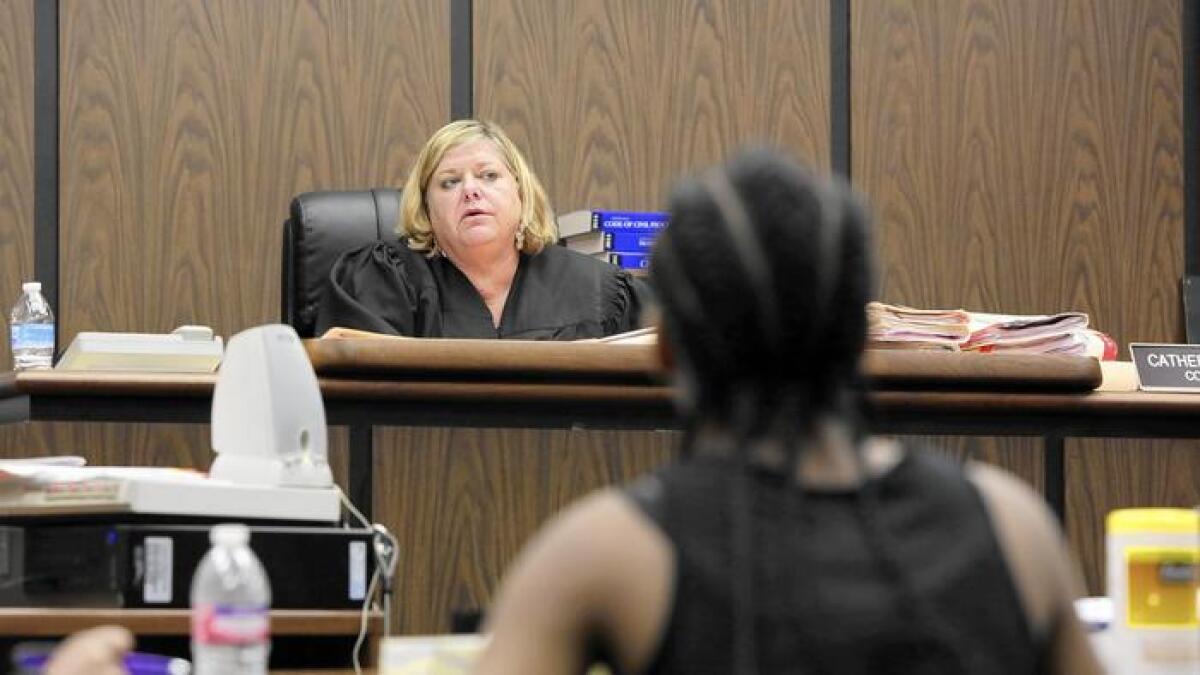
California lawmakers have passed a bill that aims to protect young, vulnerable victims at the center of human trafficking cases in court.
AB 1276 moved out of the Assembly floor on Thursday with a 59-0 vote. It is now headed to Gov. Jerry Brown’s desk.
The legislation by Assemblyman Miguel Santiago (D-Los Angeles) would allow minors ages 15 or younger to testify through closed-circuit televisions outside the courtroom, where they can share their painful and often traumatic experiences away from the presence of the jury and the defendant.
Of some two dozen human trafficking bills still pending at the state Capitol, Santiago’s has been the one to garner the most support from legislators, advocates and law enforcement. But it had one major opponent, the American Civil Liberties Union, which says the law would violate the constitutional right of defendants to confront their accusers.
Former GOP Rep. Pete McCloskey makes fundraising pitch for Democrats
Former eight-term Bay Area Rep. Paul N. “Pete” McCloskey Jr. was once a Republican.
Now he is a Democrat. The Korean War veteran — who once made a trip to Pyongyang, North Korea, with a former U.S. ambassador to South Korea to reconcile with his old adversaries — is now penning fundraising emails for Democrats trying to win the U.S. Senate.
McCloskey made his pitch to donors on a MoveOn email list Wednesday, saying that his family has been “active Republicans in California since 1860 and the election of Abraham Lincoln.”
He was in office from 1967 to 1983. Among his accomplishments: co-authoring the Endangered Species Act.
“In those years, Republicans favored balanced budgets, women’s rights, limiting presidential war power, civil rights, tax reform, and protection of the environment,” he wrote.
McCloskey said the goal is to get money to Democrats such as Maggie Hassan in New Hampshire, Russ Feingold in Wisconsin, Tammy Duckworth in Illinois, Ted Strickland in Ohio, Catherine Cortez Masto in Nevada and Katie McGinty in Pennsylvania.
“Defeating Trump is not enough,” he said. “If Republicans are allowed to continue to control the Senate, the next president will be hobbled, as President Obama has been.”
Internet poker bill undergoes last-minute changes ahead of showdown vote
A long-delayed bill that would legalize Internet poker in California is being amended to address concerns by a group of Native American casino operators who had opposed the measure, setting the stage for a possible vote in the state Assembly on Monday.
One change to the bill by Assemblyman Adam Gray would create a five-year disqualification period for those who were providing I-poker games to U.S. citizens while it was against federal law to do so.
A group of Native American tribes that operate casinos had opposed the bill when it allowed so-called “bad actors” easier access to state I-poker licenses. The amendment appears to address what those opponents had asked for.
The bill is also being amended to change the tax rate for I-poker sites from a sliding scale of 8.64% to 15% based on the annual gross gaming revenue to a flat rate of 10%.
“This deal should secure two-thirds [vote] in the Assembly,” said Trent Hager, the chief of staff for Gray, in an email. He added indications are that “it will be fairly well received in the Senate.”
New transportation funding plan calls for gas tax hike of 17 cents per gallon
Two Democratic lawmakers unveiled a $7.4-billion transportation plan late Wednesday, the latest effort to break through a yearlong logjam over the state’s funding woes.
The plan, highlighted by an increase of 17 cents per gallon in the gas tax, comes from Assemblyman Jim Frazier (D-Oakley) and Sen. Jim Beall (D-San Jose) in an attempt to unify the disparate proposals the pair had previously introduced in their respective houses.
The combined plan is more than double Gov. Jerry Brown’s $3.6-billion proposal, which calls for a 6-cent gas tax hike.
“We need to be able to have a big plan to be able to be effective and catch back up,” Frazier said.
Last summer, Brown called a special session of the Legislature to highlight the $130-billion backlog in state and local road repairs, as well as the billions more in other transportation budget deficits. But lawmakers have made little progress, especially with gas tax hikes — which would require a bipartisan supermajority vote — on the table.
Republican lawmakers have previously shown little appetite for a tax increase, instead pitching a plan that would eliminate vacant state worker positions and reallocate existing dollars — including from the state’s climate change programs — toward transportation spending.
Earlier this week, GOP assemblymembers renewed their efforts to focus on transportation funding, starting a social media campaign to highlight the hours Californians spend stuck in traffic each year.
With just two weeks left in the legislative session, Frazier said he was open to calling lawmakers back in a November lame-duck session to resolve transportation funding.
“If that’s what it takes,” he said.
Among other changes and aside from the 17-cents-per-gallon gas tax increase, which would be indexed to inflation, the Frazier-Beall plan also includes:
- A diesel tax increase of 30 cents per gallon, also indexed to inflation
- $165 annual fee for zero-emission vehicles
- The creation of an Office of Transportation inspector general to oversee state spending
- Greater environmental streamlining for repairing existing transportation infrastructure
Assembly leader weighs in on state Senate’s climate spending plan proposal
Hours after Senate Democrats released a spending plan for money generated by the state’s cap-and-trade auctions, Assembly Speaker Anthony Rendon (D-Paramount) struck a more cautious tone.
Rendon said Tuesday’s auction will be a key factor in determining how much money will be spent this year. A summary of the auction’s results will be released next week.
Effort against distracted driving advances
State senator pulls bill that would have required more transparency on drug costs

State Sen. Ed Hernández (D-West Covina) is killing his latest effort to shed light on rising pharmaceutical costs after amendments last week weakened the bill, SB 1010.
“I introduced SB 1010 with the intention of shedding light on the reasons precipitating skyrocketing drug prices,” Hernández said in a news release. “Unfortunately, recent amendments have made it more difficult for us to accomplish our fundamental goal.”
The original bill would have required health plans to report detailed information on drug costs — such as the most prescribed and most costly medicines — to state regulators. It also would have required pharmaceutical companies to notify health insurers and some other drug purchasers before raising prices on medications by more than 10 percent.
But the measure was significantly amended last week in the Assembly Appropriations committee. The changes increased the threshold under which drug companies had to give notice for price hikes, removed the requirement that companies provide justification for those price increases and delayed when the notification mandate would go into effect.
SB 1010 was one of the most lobbied bills of the session, with at least 70 groups spending money to advocate for or against the bill, according to lobbying activity filings. Health insurers, labor groups and consumer advocates were working to support the bill, while pharmaceutical companies opposed it.
Hernández and his allies vowed to continue to press the issue of high drug prices.
“We won’t be deterred in continuing the fight for this much-needed reform to keep prescription drugs affordable and accessible to Californians,” said Art Pulaski, leader of the California Labor Federation.
Californians will likely hear more on the issue in coming months. A measure on the November ballot, Proposition 61, would prevent state agencies from paying more for a drug than the price paid by the U.S. Department of Veterans Affairs.
State Senate proposes new plan to spend cap-and-trade money
With two weeks left in the legislative session, Senate leader Kevin de León is making a new effort to unsnarl a two-year budget gridlock over money generated from the state’s cap-and-trade program.
The $1.2-billion spending plan, released Wednesday, would include money for cleaner cars, energy efficient upgrades and urban parks.
“We have the opportunity to follow through on the promise of cap-and-trade, which is to use polluters’ dollars to clean up the air we breathe,” De León (D-Los Angeles) said in a statement.
“Working families in our most economically disadvantaged and polluted areas deserve to benefit from investments now so they have access to the cleanest technologies and the tools to make their communities more livable.”
California’s landmark cap-and-trade program, in which businesses purchase permits to pollute, has raised more than $4 billion -- all of which must be used to fund efforts to reduce greenhouse gas emissions. But for the last two years, Gov. Jerry Brown and top lawmakers have been unable to agree on how to spend $1.4 billion generated by the program.
The funds have been caught in limbo while the Capitol has been consumed by high-profile -- and politically fraught -- climate bills.
The Brown administration put forth its own spending proposal earlier this year, before a disappointing auction of pollution permits in May cast doubt on the program’s viability.
The most prominent change in the new Senate proposal from Brown’s plan is in subsidies offered to residents who purchase low- and zero-emission vehicles.
The Senate proposal slashes funding for the main subsidy program from $230 million to $100 million and in its place boosts a similar effort tailored to low-income residents from $30 million to $150 million. The increased funding for the latter program would allow it to expand current efforts in Los Angeles and the San Joaquin Valley to statewide.
The current funding impasse has relegated Californians interested in both subsidy programs to waiting lists.
Other elements of the proposal include:
- $100 million for energy efficiency upgrades and weatherization
- $30 million for wetlands and watershed restoration
- $100 for urban parks
The spending plan must be approved by both houses and the governor before it would go into effect.
Times staff writer Liam Dillon contributed to this report.
Attorneys for Rep. Ami Bera’s father seek probation, not prison, for campaign money scheme
Defense attorneys are asking a federal judge to rule out prison and instead order a sentence of a fine and probation for the 83-year old father of U.S. Rep. Ami Bera (D-Elk Grove), who has pleaded guilty to illegally funneling some $260,000 to his son’s congressional campaigns.
“A term of probation, a substantial fine, and the public opprobrium that comes with a federal felony prosecution is sufficient punishment, but not greater than necessary, to achieve the goals of sentencing,” wrote defense attorney Edward Loya in a court document filed on Monday.
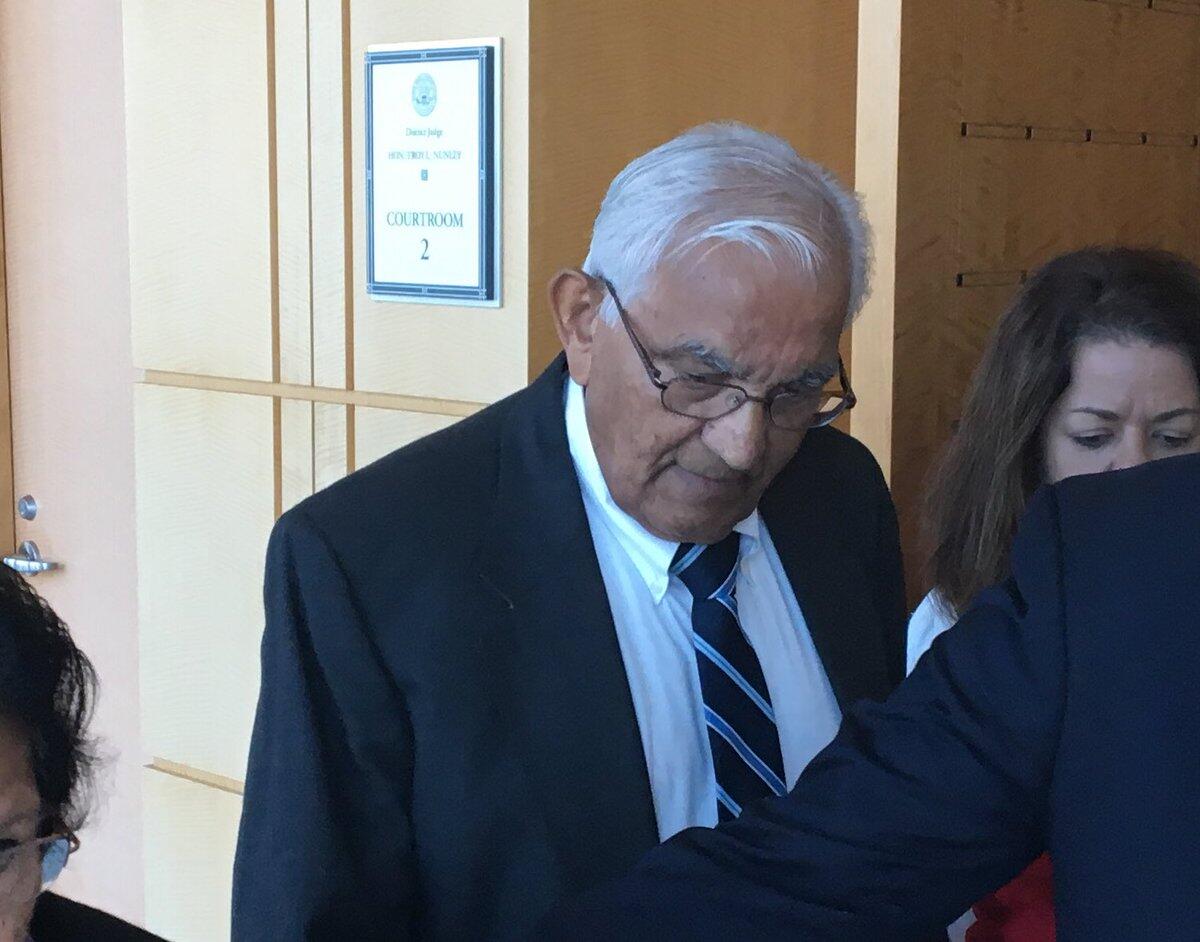
The elder Bera will be sentenced on Thursday in U.S. district court in Sacramento. Last week, prosecutors asked Judge Troy Nunley to sentence Bera to a year in prison and a fine of $130,200.
In May, Bera pleaded guilty to charges that he had solicited money from friends and relatives for the Sacramento County congressman’s 2010 and 2012 campaigns, and then repaid those donors using multiple bank accounts to conceal the true source of the cash.
Tuesday’s court filing agrees with the cash fine but argues that the age and health of Bera, who lives in La Palma, do not justify time behind bars. Attorneys also suggested that Bera’s wife, Kanta, needs her husband’s care, describing their marriage as “a deeply intertwined dependency between a married couple in their twilight years.”
Rep. Bera has called his father’s actions “a grave mistake” and denied that he knew anything about the activity.
Bera’s opponent this year, Sacramento County Sheriff Scott Jones, has sought to make an issue of the case during what’s expected to be a tight battle. On Monday, Jones suggested a series of campaign finance reforms inspired by the details of the Bera case.
Michael Bloomberg hosting New York fundraiser for Kamala Harris’ U.S. Senate bid
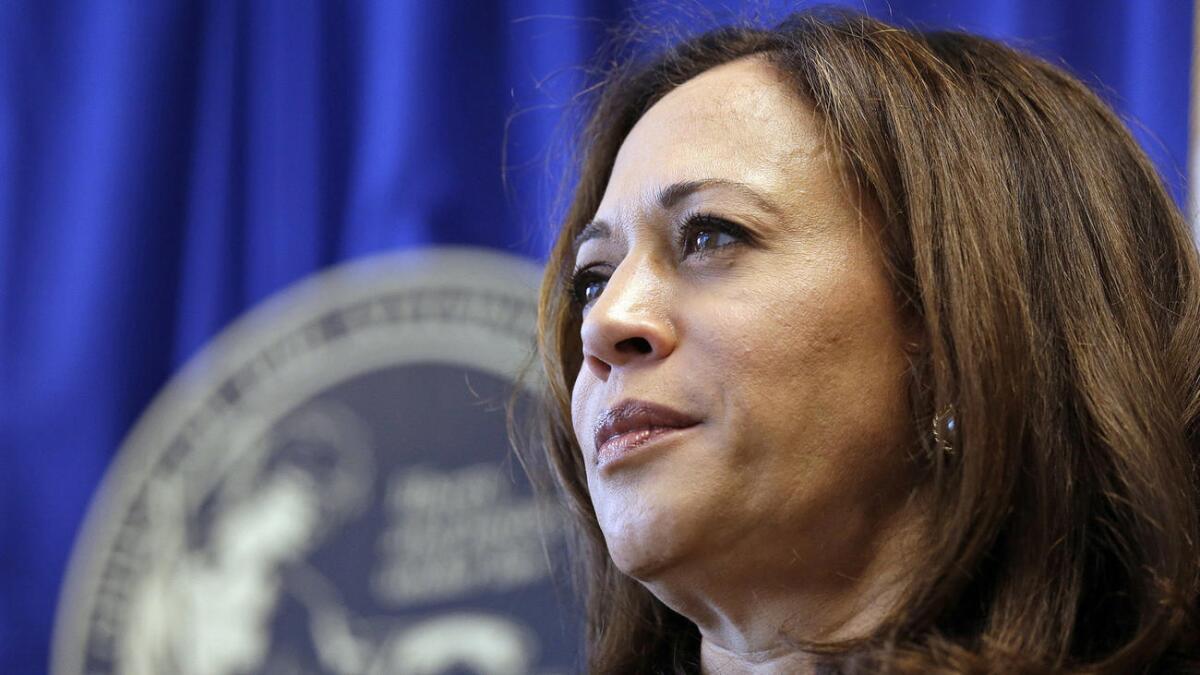
Former New York Mayor Michael R. Bloomberg is dabbling in California’s historic Democrat-vs.-Democrat U.S. Senate race.
Bloomberg is hosting a fundraiser for California Atty. Gen. Kamala Harris in New York tonight, with Sen. Charles E. Schumer (D-N.Y.) as the event’s “special guest.” Schumer this month endorsed Harris over her rival, Rep. Loretta Sanchez of Orange County.
In November, Harris and Sanchez face off in the race to succeed Barbara Boxer, who is retiring after four terms in the Senate.
Bloomberg, a billionaire business magnate who’s been a Republican, Democrat and independent, has contributed millions over the years to California ballot measures and politicians. At last month’s Democratic National Convention in Philadelphia, he also took the stage to criticize Republican presidential nominee Donald Trump as a failed businessman.
An oil industry lobbyist wrote the request to audit the state’s main climate change agency
When Assemblyman Adam Gray (D-Merced) renewed his request this month to audit the state agency in charge of spending billions of dollars generated from California’s primary climate change program, he knew what the response from his opponents would be.
“I think the environmentalists are going to point you over here and say he’s taking oil money, he’s trying to block the program,” Gray said in an interview. “I’m not trying to block the program. I’m for fighting climate change.”
But in pushing for the audit, Gray got a big assist from the oil industry. The industry’s main lobbyist wrote the request.
Metadata in the Microsoft Word document in the draft request obtained by the Los Angeles Times shows that its author is Eloy Garcia. Garcia is the lead lobbyist for the Western States Petroleum Assn. or WSPA, which represents oil companies in Sacramento.
The letter that Gray and more than a dozen other lawmakers sent to the Joint Legislative Audit Committee on Aug. 4 was word for word the same as Garcia’s draft.
Garcia did not respond to a request for comment. But Gray’s chief of staff, Trent Hager, confirmed Garcia wrote the letter. Hager said when lawmakers returned from summer recess at the beginning of August, his office called WSPA for help with the audit request and used Garcia’s draft.
Hager said he knew the oil industry’s involvement would be criticized.
“People are going to use this as a distraction,” Hager said. “But I’ve been here long enough to say it is not unusual at all for the [Natural Resources Defense Council] or WSPA or whoever to draft letters because they tend to have the policy expertise when we have questions.”
The audit committee didn’t take up Gray’s request at its final meeting of the year last week. Gray and other lawmakers have pressed for more oversight over the California Air Resources Board, the administrator of the cap-and-trade program that requires businesses to pay to pollute.
The votes of Gray and other business-aligned Democrats are considered key to extending greenhouse gas reduction targets and renewing cap and trade, the major debate at the Capitol this month. The oil industry has major sway over the debate, and Gov. Jerry Brown negotiated with WSPA over the issue earlier this year.
Times staff writer Melanie Mason contributed to this report.
Tax break on diapers heads to Gov. Jerry Brown’s desk
Almost $391 million in cap-and-trade dollars awarded to public transit projects across California
Transportation officials have selected 14 public transit projects across California for a slice of proceeds from the state’s auction of greenhouse gas pollution credits, almost $391 million in spending between now and the summer of 2018.
“Every dollar we invest has to have a greenhouse gas benefit,” said Brian Kelly, secretary of the California Transportation Agency.
The list of projects unveiled Tuesday includes more than $109 million for Los Angeles’ subway system, including funds for the planned connection to LAX. Another $28 million would help fund a streetcar project in Orange County linking Santa Ana and Garden Grove.
The announcement comes on the same day state officials participate in another auction of carbon emission credits, purchased by companies so that they can exceed the mandated emissions cap.
An auction in May produced only a fraction of the expected proceeds, and the long-term viability of the cap-and-trade program is at issue in one of the state Capitol’s most closely watched political debates this month.
The dollars awarded Tuesday are part of an earmarked portion of cap-and-trade revenue that includes money for high-speed rail. Lawmakers continue to debate how to spend the remaining auction proceeds.
Transportation officials said the list of potential projects far outstrips what’s been set aside for public transit.
“We wish there was more,” said Kelly.
Felons in county jails could vote under bill sent to governor
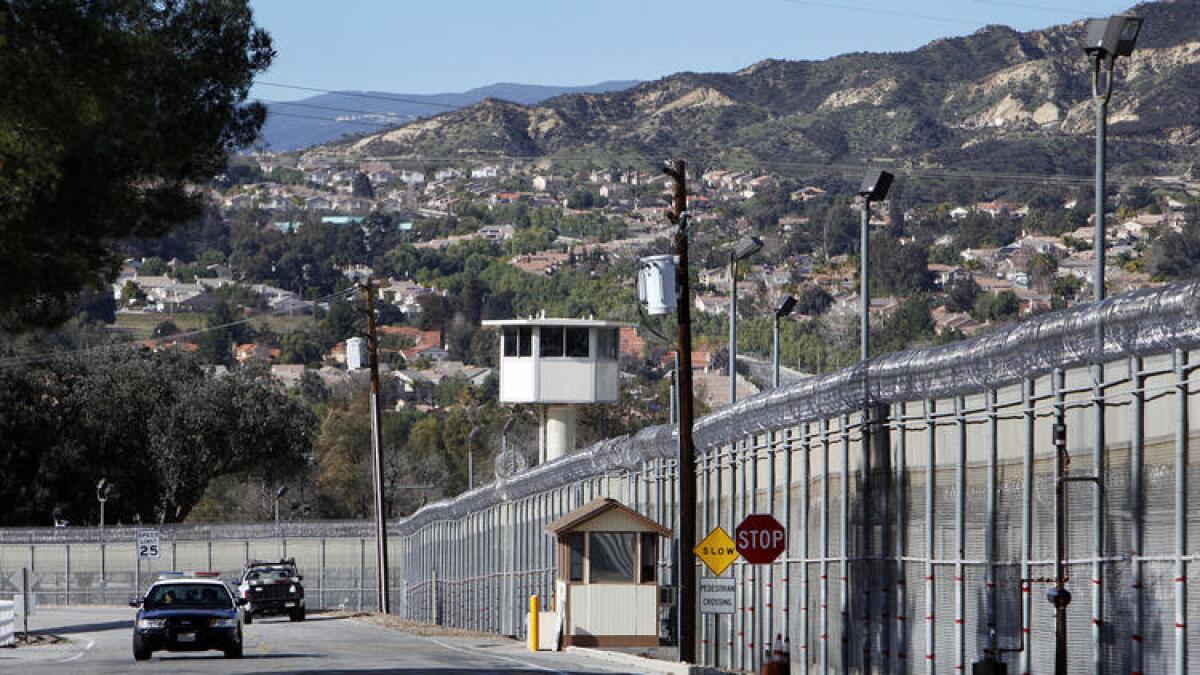
Felons serving time in county jails would be able to vote in California elections under a bill approved Tuesday by the state lawmakers and sent to the governor.
The Senate approved the measure aimed at thousands of people convicted of low-level, nonviolent felonies but serving time in county jail rather than state prison under a reorganization aimed at reducing prison overcrowding. Those convicted of misdemeanors can already vote from jail.
Under current law, voting rights are restored to felons once they complete prison and parole. Those still in prison for a felony would remain unable to vote. The measure was approved on a party-line vote of 23-13.
Sen. Bob Hertzberg (D-Van Nuys) said the bill is aimed at helping convicts to transition back into society.
“When people violate the law they should pay a price,” Hertzberg told colleagues. “But is the price forever? Is the price to disenfranchise them from civic engagement?”
Hertzberg said the bill by Assemblywoman Shirley Weber (D-San Diego) recognizes “redemption” and encourages voter turnout.
“You have to give people hope. You have to give them a way forward,” he said.
However, Republicans including state Sen. Joel Anderson of San Diego said the bill restores rights to people who have not completed jail sentences and rehabilitation.
“You are rewarding people who have made no attempt at redeeming themselves,” Anderson said. “The right to vote is not the way to rehabilitate people. Let’s not reward bad behavior.”
Others said they worried felons would vote in districts where they are jailed, which could shape election results.
Sen. Jeff Stone (R-Murrieta) said AB 2466 generated “the most outrage” he has heard from constituents over bills being considered this year.
Independent presidential candidate Evan McMullin misses deadline to appear on California ballot
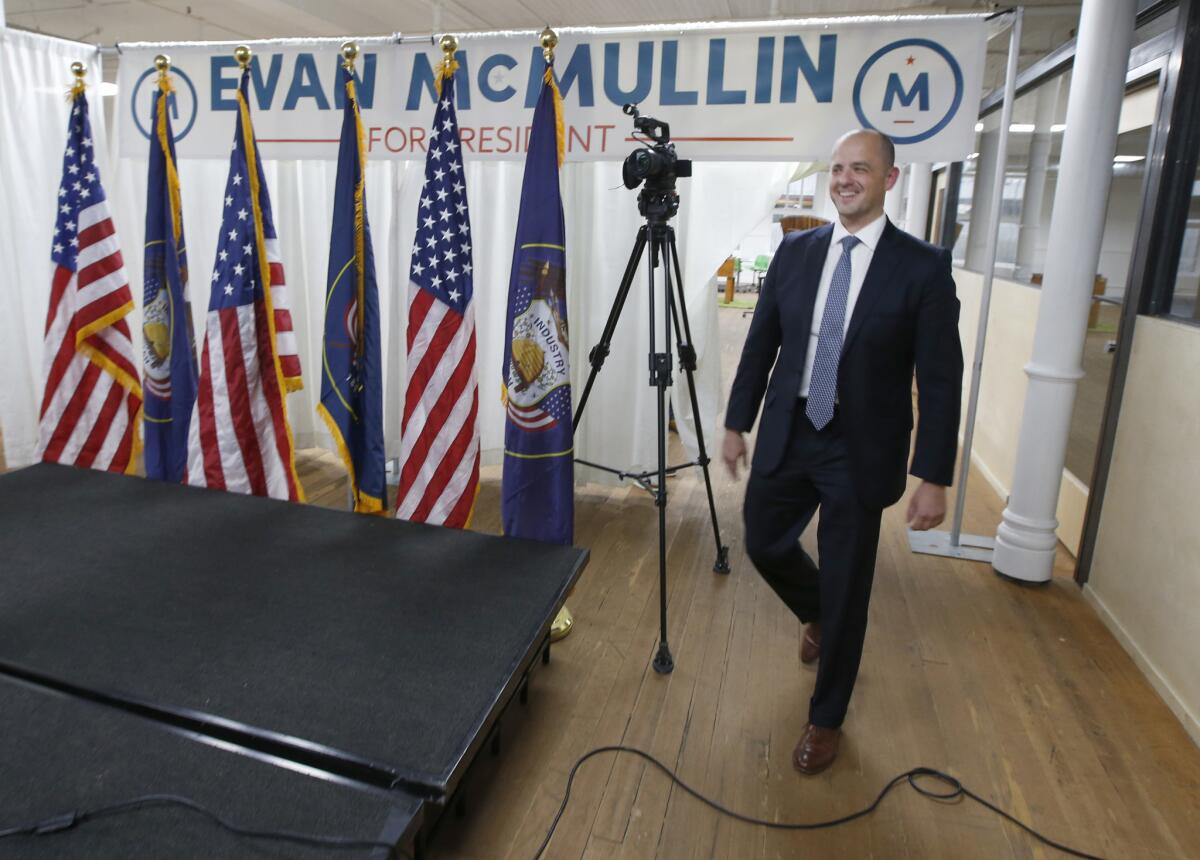
Evan McMullin, the former CIA counter-terrorism officer who last week launched a late independent campaign for the presidency, is hitting some roadblocks as he tries to get his name on ballots across the U.S. ahead of the general election.
McMullin campaign officials said Monday they did not meet California’s deadline last Friday to submit nomination papers signed by 178,039 registered voters.
“In California, both the legal and write-in options remain for us and we intend to pursue any and all options to ensure that Californians get a chance to vote for Evan McMullin in November,” McMullin campaign chief strategist Joel Searby told Politico.
McMullin will appear on the ballot in Utah, where a candidate needs 1,000 signatures. California’s 178,039 signatures is the equivalent of 1% of the statewide registration from the November 2014 general election.
Searby hinted at filling legal challenges to get McMullin’s name on the ballot in some states.
“Part of the problem with California and Florida and Texas and several others is that the threshold is so wildly divergent from almost every other state, so we believe it’s ripe for a challenge and we intend to proceed,” he told Politico.
McMullin is running as a conservative alternative and may be attractive to Republican voters unhappy with the party’s nominee, Donald Trump.
Trump will appear on California’s ballot as the candidate of the Republican Party as well as the ultra-conservative American Independent Party.
It will be the first time in at least 80 year that a presidential candidate is listed on the California ballot as the choice of two parties, state election officials said.
Shut out of banks, California pot shops may soon be able to pay their taxes in cash

With marijuana businesses unable to use banks, the California Senate approved a bill Tuesday that would allow them to pay state taxes with cash while avoiding a penalty that is currently imposed.
The Senate sent Gov. Jerry Brown AB 821, which would end the state Board of Equalization policy of charging a 10% penalty when taxes of more than $10,000 are paid in cash. The board now considers waiving the penalty for cash payments on a case-by-case basis.
“It’s very cumbersome and time-consuming,” said Sen. Fran Pavley (D-Agoura Hills) of the waiver process.
Federal law classifies marijuana as an illegal drug, which means businesses that handle cannabis cannot deposit their sales revenue at federally regulated banks.
Assemblyman Mike Gipson (D-Carson) carried the bill, which is supported by the marijuana industry.
The bill was opposed by several Republicans, including Sen. Joel Anderson of San Diego, who noted that other industries would like the option of paying taxes with methods other than electronic transfer.
“Why are we making exceptions for this industry and not all industries?” Anderson asked during the floor debate. “What would be the compelling reason to give them special treatment?”
California lawmakers, faith leaders begin fast in support of overtime pay for farm workers
California lawmakers and religious leaders will fast over the next 24 hours in support of a bill that would phase in overtime pay for farm workers in four years.
Gathered on the north steps of the Capitol, pastors led prayers to start the fasting period, and legislators recounted their own experiences in the fields, describing their personal ties to the laborers whose backbreaking work brings the majority of the produce grown in California to stores and tables.
AB 1066 “is about the simple idea that there is a set of workers that is equal to each and every other worker in the state of California,” said Assemblywoman Lorena Gonzalez (D-San Diego), who revived the legislation after a similar bill she authored was killed on the Assembly floor in June.
AB 1066 would phase in farm worker overtime starting in 2019, lowering the current 10-hour day to the standard 8-hour day, and establishing for the first time a 40-hour standard workweek over the next four years.
Supporters of the effort have argued that existing overtime allowances for farm workers are too limited compared with other jobs. Opponents say it could impose greater burdens on farmers and the agricultural industry, causing cost increases and spurring some growers to leave the state.
More than 100 people across the country are taking part in the fast, which will conclude Wednesday with a ceremony at Cathedral of Blessed Sacrament.
Juanita Ontiveros, who comes from a long line of farmworkers and who picked crops as a young woman, said the bill would correct a targeted injustice.
“I don’t think anyone who knows the struggles that farmworkers go through can just sit there and let this happen,” she said. “Farmworkers are the ones who really feed the nation and yet they can’t provide for themselves.”
Regulators holding cap-and-trade auction as lawmakers consider next steps on climate change
As lawmakers debate the future of California’s climate programs, they’ll be keeping an eye on new developments with the state’s cap-and-trade program.
Regulators are holding their regularly scheduled auction Tuesday, an opportunity for companies to bid on the permits necessary to emit greenhouse gases in the state. During the last auction in May, demand for permits dropped, evidence of the legal and political uncertainty surrounding cap-and-trade.
Full details on revenue from the auction won’t be available until Sept. 12, but a summary of the results will be released next week, before the end of the legislative session.
Top Democratic lawmakers and Gov. Jerry Brown have been discussing legislation that would extend California’s goal for reducing greenhouse gas emissions, intended to signal that the state’s commitment to climate programs will continue past 2020, the current target.
Although the measure currently under consideration would not resolve all the legal disputes involving the cap-and-trade market — there’s a pending lawsuit that accuses regulators of implementing an unconstitutional tax — some supporters believe it would still be a step in the right direction.
“Tomorrow’s auction will probably be a further signal that we have to stabilize and bring predictability to the market,” said Senate leader Kevin de León (D-Los Angeles). “Any investor would want to make sure that there’s stability, continuity, and predictability.”
Even though the goal of cap-and-trade is to lower emissions, revenue from the program has become a key part of political discussions over its future. Brown is counting on the money to help fund bullet train construction, and lawmakers are vying to ensure the money is spent in their districts.
“If [the auction] goes really badly, then there can be extra pressure on trying to pass an extension of cap-and-trade,” said Assemblyman Jimmy Gomez (D-Los Angeles).
Lawmakers act to protect those who rescue animals from hot cars
Californians would be immune from liability if they break a car window or enter a vehicle to rescue an animal in danger of serious injury or death from heat under a measure approved Monday by the state Senate.
Sen. Steve Glazer (D-Orinda) said the measure is needed to protect bystanders who need to take dramatic action to rescue an animal when authorities are delayed.
“In an emergency, good Samaritans should be confident that they won’t be sued for taking heroic actions to rescue a pet,” said Assemblyman Marc Steinorth (R-Rancho Cucamonga), an author of the bill, after the unanimous vote to approve the bill. It will now go back to the Assembly for final action on amendments.
In 2006, the state enacted a law against leaving an animal in an unattended vehicle under dangerous conditions.
The new bill is supported the Los Angeles County district attorney’s office and the Humane Society of the United States. The organizations say animals continue to be left in unattended vehicles, despite educational efforts and the fact that owners risk fines and imprisonment.
“Plenty of Californians have come across animals in need of rescue from parked cars on hot days, but aren’t sure what to do and fear being sued or arrested if they take unauthorized steps to free an animal,” the Humane Society said in a letter to lawmakers.
The bill, AB 797, is opposed by the California Federation of Dog Clubs, which said it should be left to professionals to determine whether a dog is in need of rescue.
“The unfortunate owner could find himself liable for unwarranted damages to his property, suffering the loss of his pet and would have no recourse for damage to the car or the loss or death of his dog in the course of the ‘rescue,’” the group wrote to legislators.
Some of California’s House Democrats are getting new numbers after a hacker posted their info
Phone numbers and email addresses for at least some of California’s 39 House Democrats were among the details published online last week after the apparent hacking of of the Democratic Congressional Campaign Committee.
House Minority Leader Nancy Pelosi over the weekend warned House Democrats and their staffs not to let their families answer the phone after email addresses and cellphone numbers belonging to nearly 200 members of the caucus were posted.
Several California members said they have been bombarded with spam and prank calls. Others didn’t want to speak publicly about it, worried it might inspire more people to contact them.
“I have received scores of mostly obscene and sick calls, voicemails and text messages,” Pelosi wrote in a letter to House Democrats on Saturday.
Rep. Mark Takano’s personal cellphone number and email both appeared on the list, though the calls he got weren’t “as malicious as I heard the leader got,” he said.
One late-night caller encouraged him to change his number “so you don’t get calls from cranks like me,” Takano recalled.
The Riverside Democrat began setting up a new number and email address Monday, a process he called “tedious” because of all the ways people access websites and apps using the same email address.
President Obama and cyber security experts have pinned responsibility for a similar breach of the Democratic National Committee on Russian hackers.
Takano called the ordeal a “B-grade James Bond knockoff” by Russian military intelligence.
“I definitely think the American people are going to be smarter than their manipulations,” he said.
Nonetheless, he said people should be concerned about a foreign government getting involved in American politics.
“I don’t think we should underestimate the Russian intelligence and military apparatus,” he said.
Rep. John Garamendi told U.S. News and World Report that the hack has been a serious political, personal and legislative disruption.
“There are nearly 200 of us who have to change our phone and email accounts, and that’s very disruptive in the middle of a campaign,” the Walnut Grove Democrat said.
Rep. Eric Swalwell’s cellphone number and email were also on the list.
“I’ve gotten a ton of spam emails and just a bunch of bizarre calls from people all across the country,” the Dublin Democrat said.
Still, the congressman, who’s known for handing out his cellphone number freely, said he doesn’t plan to change his phone number unless he’s told it is no longer secure.
“I’ve never hidden my number from constituents before and I want them still to be able to reach me,” he said.
He, too, said the the larger issue is whether Russia is trying to influence the U.S. election.
“This is very aggressive behavior and it warrants a response,” Swalwell said. “They can’t go unchecked. It’s unacceptable to try and meddle in another country’s elections.”
Last week, Swalwell and two other House Democrats called on House Republican leaders to have the Judiciary Committee investigate whether Republican nominee Donald Trump broke any laws by encouraging Russia to find Democratic nominee Hillary Clinton’s missing emails.
A few California members and their staffs said the information that was posted was out of date, so the publishing of it had no practical effect.
Peace and Freedom Party picks Gloria La Riva as presidential nominee
San Francisco community activist Gloria La Riva was selected to be the presidential nominee for the Peace and Freedom Party at its convention in Sacramento over the weekend. She will appear on California ballots alongside running mate Dennis Banks.
La Riva previously ran for governor of California with the party in 1998. Banks is a longtime organizer with the American Indian Movement.
“Having a socialist option on the ballot of the most populous state in the United States is tremendous. Across the state there are millions of workers and their families who face unemployment, poverty, racism, deportations and police brutality, inherent symptoms of the capitalist society we live in,” La Riva said in a statement.
La Riva is running on a platform that includes among other proposals the cancellation of all student debt, free healthcare, prosecution of police who “abuse and kill” and for an end to all U.S. wars and occupations.
The Peace and Freedom Party, which was founded in Los Angeles in 1967 following protests over the Vietnam War, previously nominated actress Roseanne Barr in 2012. She picked anti-war activist Cindy Sheehan as her running mate.
Ralph Nader appeared on ballots in two states, California and Iowa, as the party’s nominee in 2008.
California sides with Obama administration on emissions reduction rules
California is jumping into another national debate over environmental regulations.
State Atty. Gen. Kamala Harris joined her counterparts from eight other states on Monday to fight a lawsuit against federal rules limiting greenhouse gas emissions.
The rules are being attacked by several other states and the oil and gas industry.
“Climate change is a real and direct threat to the health and well being of our communities,” Harris said in a statement. “We must do everything in our power to limit greenhouse gas emissions and preserve our planet for future generations.”
California has previously joined legal efforts to protect other federal regulations, such as President Obama’s Clean Power Plan, which tackles pollution from power plants.
Bill restricting release of police body camera footage of officer deaths passes in state Senate
Assembly votes to limit police from seizing the property of suspected criminals
California lawmakers paved the way Monday to rein in the ability of police departments to seize property from suspected criminals.
The Assembly voted 66-8 in favor of SB 443, which would add limits to using so-called asset forfeiture to seize property from suspects who haven’t been convicted of a crime.
If the bill passes, police would no longer be able to permanently seize property worth less than $40,000 without a criminal conviction. The legislation allows for a lower burden of proof for seizures above that threshold so law enforcement can continue to use the tactic to combat large-scale drug trafficking.
“I think that this bill strikes a very appropriate balance between protecting the right of law enforcement to enforce the law on one hand and protecting against unjustified seizure of property on the other hand,” Assemblyman Jay Obernolte (R-Big Bear Lake) said before the vote.
Assemblyman Jim Cooper (D-Elk Grove) opposed the bill, saying it would give an “advantage” to neighborhood narcotics dealers.
SB 443 now moves to the Senate.
Actors may soon keep their ages confidential on entertainment job websites

Addressing concern about age discrimination in Hollywood, the state Senate on Monday approved a bill that would allow actors to keep their ages from being disclosed on websites that provide employment services to the entertainment industry.
The bill sought by the Screen Actors Guild-American Federation of Television and Radio Artists was approved on a 25-12 vote even though several Republican members said it is meaningless because actors’ ages are widely available on the Internet on sites including IMDB.com.
“We’re making laws that can’t be fully enforced,” state Sen. Joel Anderson (R-Alpine) said.
He said the answer is to enforce laws against age discrimination by employers.
The measure goes back to the Assembly for a final vote.
State Sen. Bob Hertzberg (D-Van Nuys) said AB 1687 is needed because some casting directors wrongly hold actors’ ages against them even if they look younger.
“It is important that this does impact peoples lives,” Hertzberg said, adding he knows some actors in their 30s who have played teenagers because they look younger than they are.
Republican Sen. Jim Nielsen of Gerber questioned giving one class of employee special treatment.
“I don’t know what’s so sacred about celebrity birth dates,” Nielsen said. “[Lawmaker’s] birth dates are everywhere. These celebrities are public figures just like most of us.”
This 74-year-old veteran biked 1,550 miles to get 74 names added to the Vietnam War memorial

Del Francis, 74, biked from his home in Sulphur Springs, Texas, to the U.S. Capitol in his quest to have 74 names added to the Vietnam Veterans Memorial Wall.
Rep. Adam Schiff (D-Burbank) on Monday joined 74-year-old military veteran Del Francis for the last few miles of his 1,550-mile bicycle ride from Texas to the U.S. Capitol.
The veteran rode as part of an effort to get the names of 74 sailors he served with on the Long Beach-based USS Frank E. Evans added to the Vietnam Veterans Memorial in Washington, D.C.
Sarah D. Wire will have more on the ride and the effort a little later today.
Assemblyman Roger Hernández missing from Capitol, campaign trail after domestic violence accusations
With less than 90 days until voters in the San Gabriel Valley go to the polls to decide if Democratic Assemblyman Roger Hernández will become a member of Congress, he has been absent from the campaign trail and his work at the state Capitol.
Hernández has been out on medical leave for unspecified reasons since the Legislature returned from summer break two weeks ago, and it is unclear if he will return before the legislative session ends Aug. 31.
The West Covina assemblyman has been out of the public eye since a judge granted his ex-wife’s request for a restraining order against him on July 1 after she accused him of severely beating her several times before and during their marriage.
Hernández has not answered phone calls from Times reporters seeking comment. A spokeswoman for his office declined to explain the cause of the medical leave and said she did not know when he would return.
His attorney, Donald Schweitzer, said the assemblyman has been experiencing stress since the ruling and is under a doctor’s order to rest. He said he did not know what medical issue spurred Hernández’s leave, but that his “blood pressure was a little bit up.”
“It is legitimate,” Schweitzer said of the leave. “He has had a lot of anxiety because of what has gone on in his professional career and with his restraining order.”
The political fallout following the issuance of the restraining order was swift and since then his campaign challenging Rep. Grace F. Napolitano (D-Norwalk) for her 32nd District seat has been nearly silent.
Judge dials back voter guide claims from pro- and anti-pot legalization groups
A Sacramento Superior Court judge on Friday ordered both supporters and opponents of a ballot measure to legalize recreational marijuana to modify the official arguments they make to voters in November.
The changes dial back claims by both sides in state voter guides regarding the costs of legalizing marijuana, advertising exposure to children and potential health and public safety effects. Many of the changes modify language that says the measure “will” have a certain impact to saying that it “could” have that impact.
One of the hotly contested parts of the measure, Proposition 64, describes the extent to which children could be exposed to television advertisements promoting marijuana. As the Times has reported, the initiative opens the door to marijuana television ads, though there is currently a federal prohibition against them because the drug is illegal.
Judge Shelleyanne W.L. Chang ruled that supporters and opponents needed to soften their claims on the issue. If federal law ultimately allows for television commercials, the initiative would ban those directed toward children, but not ads appearing on primetime television.
Both sides claimed victory after Friday’s decision.
“As a result of these actions, voters will have more objective, fact-based information in their ballot pamphlet, instead of silly scare tactics from the anti-marijuana browbeaters,” said Jason Kinney, spokesman for the Yes on Proposition 64 campaign.
“The ruling today was clear — marijuana ads could be on broadcast television if Prop. 64 passes — ads that could be seen by children,” said No on Prop 64 campaign consultant Wayne Johnson.
If Prop. 64 passes in November, people age 21 and older could possess and use up to an ounce of marijuana and pot shops could sell it for recreational purposes.
Voters will get more details about proposed tobacco tax hike, judge rules
Opponents of a ballot measure to increase taxes on cigarettes by $2 a pack scored a win in court Friday when a Sacramento Superior Court judge ordered the state to more clearly describe the measure that will go before voters in November.
At issue was how much detail the state attorney general’s office needed to give voters in explaining that money from the tax increase wouldn’t count toward the state’s funding requirements under Proposition 98, the 1988 ballot measure that guarantees a major portion of state revenues for education.
The existing language said the measure “excludes these revenues from Proposition 98 funding requirements.” But opponents argued the state needed to tell voters that Proposition 98 involved school funding. Judge Michael Kenny agreed.
“Voters don’t know the numbers,” Kenny said.
He ordered lawyers for the opponents and the attorney general’s office into the hallway to figure out new language, which they agreed to after an hour of shuttling proposals back and forth. The line in question now says: “Excludes these revenues from Proposition 98 education funding calculation requirements.”
This matters because voters tend to favorably view initiatives that benefit education and schools, given their strong historical support for measures boosting funding for them. Opponents of the measure, Proposition 56, are already arguing that the tax increase “cheats our kids’ schools.”
“We believe that voters should have this important clarifying information as they determine their vote,” said No on 56 campaign spokeswoman Beth Miller in a statement after the ruling.
Jay Hansen, a board member of the Sacramento City Unified School District and a supporter of the tax hike, said after the ruling that the measure would help children, noting that it dedicates 15% of its revenue to anti-smoking programs in schools.
“The machinations of Big Tobacco aren’t going to change any of that,” Hansen said.
Supporters of Proposition 56 include the American Cancer Society, the American Heart Assn. and billionaire Tom Steyer. Backers have raised $13 million so far this year. Tobacco companies Philip Morris and R.J. Reynolds have poured in nearly $36 million to oppose it.
Shelved DNA bill had personal meaning for Los Angeles Assemblyman Mike Gatto
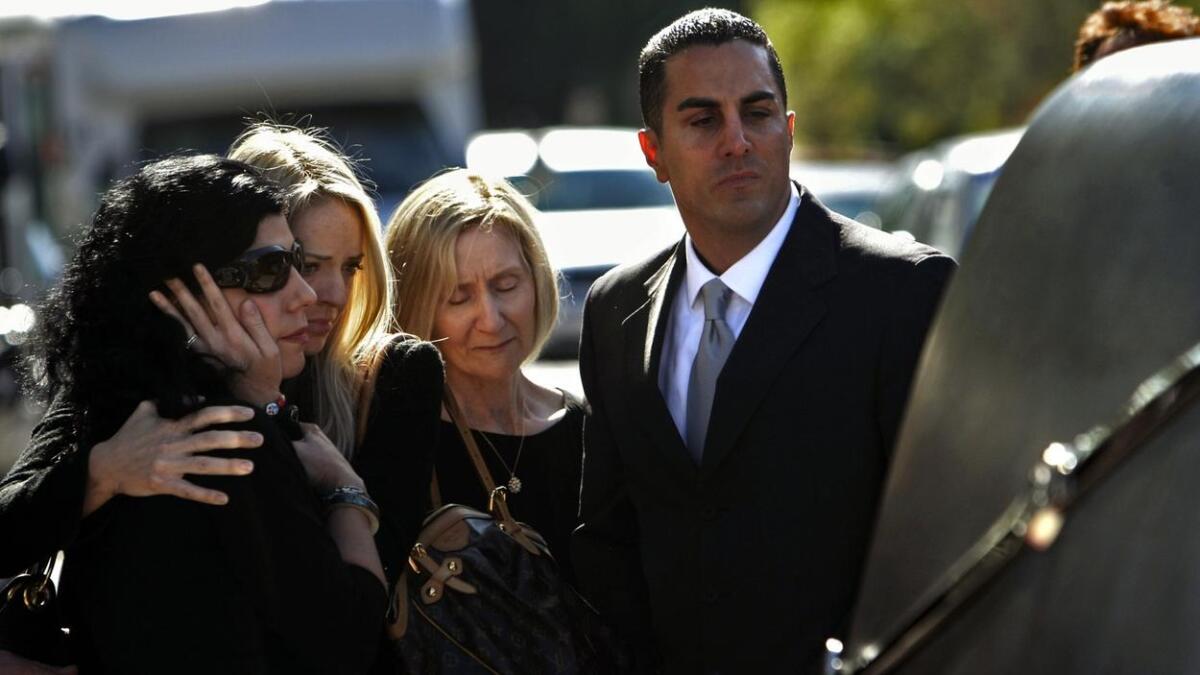
Of the California bills shelved Thursday amid the flurry of “suspense file” activity was legislation that would have allocated $15 million for law enforcement agencies to analyze DNA evidence and investigate cold cases.
AB 2440 by Assemblyman Mike Gatto (D-Los Angeles) was not his most high-profile legislative proposal in his six years in office. But as the lawmaker prepares to leave the state Capitol after his term ends this year, it did hold a meaningful personal connection for him, he said.
Gatto said that over the three years since his father was killed in his Silver Lake home, the victim of an apparent home invasion that remains unsolved, he has strived to be a voice for crime victims coping with a slow and often unwieldy justice system.
Gatto last year wrote legislation, signed by Gov. Jerry Brown, that allows DNA to be collected from people arrested and charged but not yet convicted of felonies, once a judge makes a finding of probable cause. To protect the wrongfully accused, the DNA sample is expunged if the case is dismissed or the person acquitted or exonerated.
AB 2440 sought to build on that legislation and provide funding for DNA testing. The bill would have provided money from the general fund to the state controller, who would distribute the funds to counties based on their contributions to the state’s DNA Identification Fund.
The proposal came as counties nationwide are grappling with growing amounts of DNA evidence and evolving changes to the way results are interpreted.
Keeping state and federal DNA databases updated is crucial for families still waiting for some semblance of closure, Gatto said. And he knows how difficult it is to wait.
“Being a crime victim is the only group that you don’t choose to join.”
— Assemblyman Mike Gatto
Every Monday, Gatto, like thousands of crime victims across the state, waits for a phone call from a state investigator with news of a potential DNA match in his father’s unsolved case.
Gatto said his experience is one no other sitting legislator shares, and is vital to informing criminal justice policy.
“Being a crime victim is the only group that you don’t choose to join,” he said. “It is thrust on you.”
Prosecutors say Rep. Ami Bera’s father should serve a year in prison for campaign money crimes
The father of Sacramento County Rep. Ami Bera should serve a year in federal prison and pay a fine of $130,200 for his role in a multi-year campaign donation scheme, according to a recommendation filed by federal prosecutors on Thursday.
Babulal Bera, 83, pleaded guilty to campaign fraud charges in May and is scheduled to be sentenced in federal court in Sacramento on Thursday.
The crime committed by the father of the three-term congressman was “broad, sustained and knowingly wrong,” prosecutors wrote in their sentencing recommendation.
The recommendation for prison time comes a week after a court report recommended possible probation for the elder Bera.
The father pleaded guilty to soliciting campaign donations for his son — some $260,000 in all — over two election cycles and then secretly repaying the money to those donors. Prosecutors say Bera wrote reimbursement checks from 13 different bank accounts to cover his tracks.
The recommended sentence of one year and one day would be substantially shorter than the minimum time behind bars recommended by sentencing guidelines. Prosecutors said in the court filing that Bera’s age and previously unblemished record merit a lighter sentence.
But they didn’t mince words about the seriousness of the crimes, including the possibility that Rep. Bera wouldn’t be in Congress were it not for his father’s illegal campaign fundraising plan.
Babulal Bera’s efforts in the 2012 election cycle “may have at least contributed to the sense that his son’s fundraising prowess remained,” prosecutors said.
“Everyone who contributes to a political candidate is trying, in small part at least, to influence an election in favor of the supported candidate,” prosecutors wrote in the court filing. “However, by knowingly and repeatedly violating the rules that govern how one may support a candidate, the defendant was attempting to exert improper influence in the electoral process.”
The sentencing recommendation report also references a suggestion in a court report that Bera’s father was simply overly excited about his son’s political chances and should be eligible for only probation.
“He carried on these acts month after month, year after year, and over the course of two campaigns,” replied prosecutors in the new filing. “He cannot explain away his actions as the result of runaway emotions.”
Times journalists recognized

Capitol Weekly this week named two members of The Times’ Sacramento bureau to its “Top 100,” a ranking seven years running that captures the movers, shakers, newsmakers and newsbreakers in the capital.
Columnist George Skelton, a regular on the list, is “Intelligent, insightful, frequently irascible, but always fun to read,” the magazine wrote when giving him a slot in the middle.
And Bureau Chief John Myers returns to the list at spot No. 76.
Leading the pack are officials — and the gubernatorial spouse — from Gov. Jerry Brown’s administration.
Hollywood mega-projects could be built sooner if Gov. Brown signs measure passed Thursday
An effort to speed up construction of mega-projects in California — which would likely include four major developments in Los Angeles — passed the state Legislature Thursday and now moves to Gov. Jerry Brown’s desk.
The bill aims to make potential lawsuits under the state’s main environmental law governing development wrap up within nine months. To qualify, a project would have to cost more than $100 million, pay high wages to construction workers and meet targets for greenhouse gas emissions and renewable energy.
Four projects in Los Angeles, including two skyscrapers in Hollywood and a 38-acre park capping U.S. Highway 101 between Hollywood and Santa Monica boulevards, plan to apply for the perk should Brown sign the legislation. Proponents estimate it could cut three years off their construction timelines.
“This is great news for our economy and the many communities throughout the state who were seeking certainty about much-awaited projects in their hometowns,” said bill author Sen. Cathleen Galgiani (D-Stockton) in a statement. “SB 734, which is supported by business and labor, will help large job-producing green projects avoid delay and keep Californians working.”
The bill, SB 734, passed both houses of the Legislature with bipartisan supermajority votes, meaning that it will take effect immediately with Brown’s approval. The Senate vote Thursday was 27-0.
It’s unclear, though, how much help the bill might be to the large projects. A previous version of the legislation has yet to provide any formal legal relief to the half dozen projects that had qualified for streamlined judicial review. Another project in Los Angeles, the Frank Gehry-designed mixed-use development at 8150 Sunset Blvd. is one of the six already granted expedited review and is awaiting final approval by the city of Los Angeles.
Some environmental groups, including the Sierra Club California, oppose the measure because they don’t believe the restrictions are strong enough to merit a break from the normal rules. The policymaking body of the state court system also is against the bill because prioritizing lawsuits against these projects would slow down other cases.
Update: This post has been corrected with the full name of bill author Sen. Cathleen Galgiani (D-Stockton).
By the numbers: Heavy load of bills pushed through Senate panel on Thursday
Nancy Pelosi visits Orlando’s Pulse nightclub on Florida campaign trip: ‘Love will triumph over hate’
House Minority Leader Nancy Pelosi on Thursday met with survivors of Orlando’s Pulse nightclub shooting, as well as families of some of the 49 people who died in the terror attack.
Pelosi left flowers at the memorial outside the club, writing “San Francisco is Orlando strong and united” alongside other messages. Since the shooting in June, she has worn a rainbow armband most of the times she has appeared in public.
“After losing her brother to AIDS, Barbara Poma opened Pulse to keep his memory alive through a place where young LGBT Americans would know they were loved, celebrated and safe,” Pelosi, whose represents San Francisco, said in a statement. “Pulse was a monument to joy, born out of grief. Through our tears, in the name of young lives cut too short, let us renew this enduring faith: love will triumph over hate.”
The minority leader is scheduled to appear with former Democratic National Committee chair Rep. Debbie Wasserman Schultz in Florida on Friday at an event on the Zika virus. She will also hold a campaign fundraiser for Wasserman Schultz, who announced her resignation as chair just before the party’s national convention amid an email scandal.
Pot tax goes down in flames in California Legislature
A bill to put an excise tax on medical marijuana in California was killed Thursday by a Senate panel after advocates for cannabis users said it would put a financial burden on patients.
The Senate Appropriations Committee shelved AB 2243 with knowledge that California voters will consider a 15% pot tax on Nov. 8 when they take up Proposition 64, which would also legalize recreational use of cannabis.
The legislation by Assemblyman Jim Wood (D-Healdsburg) would have charged up to $9.25 per ounce of marijuana flowers, $2.75 per ounce of pot leaves and $1.25 per ounce of immature pot plants.
Wood said the funding is needed to help cover enforcement and environmental costs under a new system approved last year that will license the growing, transport and sale of medical marijuana.
The Assemblyman was baffled by the vote and seeking an explanation. “Something got in the way of good policy today, and I think we all deserve a real answer for what that was,” Wood said.
Some in the marijuana industry said it was premature to approve a tax two years before the Bureau of Medical Marijuana Regulation begins issuing licenses.
The measure was opposed by Americans for Safe Access and California NORML.
We generally oppose any excise tax that is going to be passed on to the patient,” Melissa Wilcox of Americans for Safe Access said after the vote.
The measure was shelved without comment, and Committee Chairman Ricardo Lara (D-Bell Gardens) did not return calls for an explanation.
Sorry, Maya Dirado: You’ll still have to pay taxes on that Olympic medal
For an Olympic medal winner from California, call it the thrill of victory and the agony of taxes.
And it won’t change when they return from Rio de Janeiro, after an effort to exempt their winnings from state taxes was killed on Thursday by a legislative panel.
AB 1944 by Assemblyman Brian Jones (R-Santee) would have given tax-exempt status to bonuses paid by the U.S. Olympic Committee for athletes who win gold, silver or bronze medals.
Those payments — $25,000 for gold, $15,000 for silver and $10,000 for bronze — are considered taxable income under California law. The bill would have exempted those winnings for a four-year period starting this tax year.
The bill was killed without discussion or explanation by the Senate’s appropriations committee during the biannual “suspense file” hearing to decide the fate of bills that would cost money to the state.
The costs, as estimated in a committee analysis, were pretty minor: $100,000 this year and a total of $10,000 in the following two tax years.
The bill, which would have also made winnings in the Paralympic Games tax-free, was hardly a new idea. Legislative efforts in 2012 and 2014 also failed to win passage.
Bill that could increase cost of concealed-gun permits is on Senate floor
A bill that could make it more expensive to get concealed-weapon permits in California is pending on the Senate floor amid opposition from gun-rights advocates.
The bill would require sheriffs and police chiefs who issue permits to charge a license fee to cover the costs of issuing and enforcing the permits, which would likely drive fees up.
Assemblyman Kevin McCarty (D-Sacramento) had argued the fees were too low.
“There is no guidance on how much to charge for the application fee,” he said in a letter to lawmakers. “Given this vagueness, it is unsurprising that different issuing authorities have interpreted the law differently. Sacramento County is facing a shortfall of approximately $250,000 caused by inadequate CCW application fees and is facing cuts to essential programs.”
UPDATED at 4:30 pm: A previous version of this story said the bill had been held in committee Thursday. It has moved to the state Senate floor.
Diapers and tampons could get cheaper in California
Efforts to exempt diapers and feminine hygiene products from sales taxes cleared a legislative hurdle Thursday.
The California Senate Appropriations Committee approved both bills, and they now move to the Senate floor. They would still need approval from the Senate and the governor before becoming law.
The bills to end taxes on diapers, AB 717, and feminine hygiene products, AB 1561, would exempt those items from state sales taxes. The bills’ authors say diapers, tampons and sanitary pads are medically necessary and therefore shouldn’t be taxed.
Measure to stiffen penalties for fentanyl trafficking is shelved
A measure to impose harsher penalties for trafficking of fentanyl, a powerful opiate that is up to 100 times stronger than morphine, sputtered on Thursday.
The bill by state Sen. Patricia Bates (R-Laguna Nigel) would have added a sentencing enhancement of up to 10 years for those convicted of trafficking the drug, putting it on par with punishments for certain crimes involving heroin and cocaine.
The opiate was linked to a string of deaths and overdoses in Sacramento County this spring.
The Assembly Appropriations committee held back Bates’ bill, SB 1323.
“Unfortunately, the governor’s focus on decreasing the state’s prison population has made it difficult to pass any legislation that would address weaknesses in current criminal law,” Bates said in a statement. “Given fentanyl’s deadly potency, the law should treat fentanyl trafficking the same as heroin and cocaine. Today’s decision is a sad setback for law enforcement efforts to go after big-time fentanyl dealers.”
Bills to abolish Daylight Saving Time, expand farmworker overtime and more survive Legislature’s ‘suspense file’
No lower fines for drivers who roll through red lights on right turns in California
An effort to reduce the fine for drivers who don’t fully stop at a red right before turning right was killed Thursday by the Assembly’s appropriation committee.
The decision, part of the biannual “suspense file” hearing, was made without any explanation from committee members. The bill, SB 986, had received almost unanimous support in prior hearings.
Its author, state Sen. Jerry Hill (D-San Mateo), had argued that the existing fine for what’s often called a “California roll” through a red light was mistakenly set too high almost two decades ago.
The bill would have reduced the base fine for not fully stopping before turning right on red to $35 from $100. A committee analysis this summer pointed out that the total fine for a violation can add up to $541.
SB 986 had broad support, from motorists groups to the California Assn. of Highway Patrolmen. Its failure was probably spurred by an analysis that predicted a “significant loss of state and local penalty assessment-related revenues” were it to pass.
California lawmakers kill legislation that would address state’s felony sentencing laws
California lawmakers held a bill on Thursday that would have kept felony offenders from receiving longer sentences for crimes not presented to a jury.
SB 1202, authored by state Sen. Mark Leno (D-San Francisco), provided that aggravating factors relied upon by a judge to impose tougher punishments would have to go before a jury and be found true beyond a reasonable doubt.
The bill sought to address a 2007 Supreme Court decision that found California’s sentencing process unconstitutional. It came as the state has moved away from tough-on-crime policies.
California Attorneys for Criminal Justice, the sponsor of the legislation, said it would prevent “a judge from unilaterally imposing an extended prison sentence based on the facts that a jury never sees or finds to be true.”
But among its opponents, the San Diego County district attorney’s office contended it would unduly prolong trials and burden an already stressed criminal justice system.
On Thursday, Leno said his legislation was likely shelved as state lawmakers might want to stick with the status quo.
Another bill by Senator Bill Monning (D-Carmel) would extend a temporary solution to California’s sentencing process until Jan. 1, 2022, providing that judges, in their own discretion, impose the punishment that best serves the interest of justice.
His legislation, he said, was likely shelved due to its cost.
“We thought the estimates were especially high, but I don’t deny there would be an additional expense,” Leno said. “My response to that would be, ‘Yeah, justice costs money.’”
UPDATED at 4:42 p.m.: Updated with comments from state Sen. Mark Leno.
Low-income housing could go on 2018 ballot
Cross one more item off the November ballot.
State lawmakers moved a $3-billion bond for low-income housing to the floor of the Assembly on Thursday, but in doing so changed the date of a potential public vote on the measure to 2018.
The bond from Sen. Jim Beall (D-San Jose) is designed to build and rehabilitate housing for low-income residents, the homeless and farm workers.
The measure still faces a high hurdle before voters see it. The bond requires a bipartisan super-majority vote in the Assembly and the signature of Gov. Jerry Brown before it would reach the ballot. The Brown administration has already expressed opposition because of the cost to the state budget.
Proposal to set new climate targets expected to advance
Fundraising for November ballot measures picks up speed
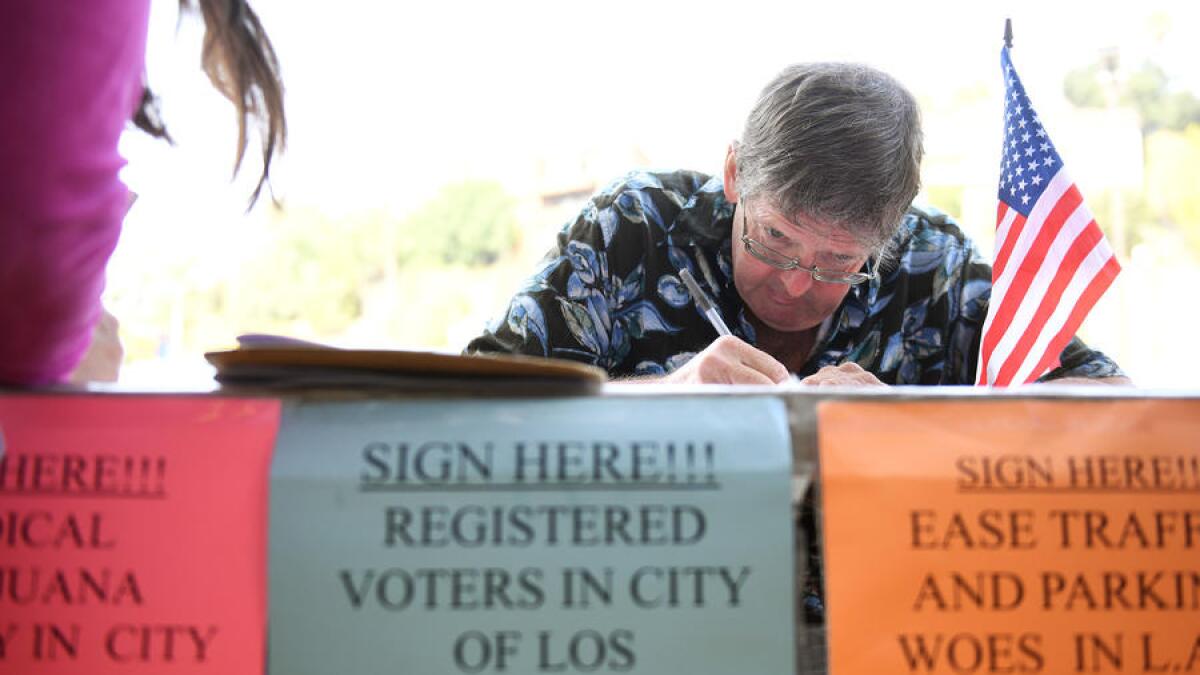
Fundraising this year for the 17 propositions on the November ballot — the most on any California ballot since 2000 — has hit nearly $200 million.
Campaigns to support or oppose the measures collected almost $127 million by the end of June, the most recent deadline for campaign finance reports.
But since then, fundraising appears to have accelerated. A review of daily campaign disclosures found more than $72 million in contributions since July 1.
Just five of the ballot measures account for almost three-quarters of the cash raised this year. Most of the money has poured into campaigns concerning marijuana legalization, tax hike extensions and drug price regulation.
Tobacco and pharmaceutical companies have emerged as some of the biggest contributors. Cigarette manufacturers have poured cash into a campaign opposing a new tax on tobacco products. And pharma groups have donated more than $50 million to kill proposed drug pricing regulations.
A very long list of bills on ‘suspense file’ of Legislature
Bill banning use of bullhooks on elephants goes to Gov. Jerry Brown
California Senate confirms Scott Kernan as head of state prison system

The state Senate on Thursday confirmed the appointment of Scott Kernan as head of the state prison system amid hopes by members that he will continue to seek reforms to reduce recidivism.
Kernan’s appointment by the governor as secretary of the Department of Corrections and Rehabilitation received a unanimous vote.
California’s prison system has been under federal control and oversight, subject to class actions over inmate healthcare, mental health services and solitary confinement.
Senate President Pro Tem Kevin de León (D-Los Angeles) said Kernan’s more than three decades with the department give him an advantage in making changes.
“It is increasingly difficult for any outsider to come in and take the helm of the largest criminal justice system in the nation,” De León told his colleagues. “I feel confident that he has the full skill set and wherewithal to make the necessary changes to keep all of our communities safe. It’s not enough to lock folks up. “
Kernan, whose annual salary is $243,360, also won support from Republican senators including Jim Nielsen of Gerber. “I admire his stewardship and his steady hand,” Nielsen said.
Legislative leaders meet before big appropriations votes
Here are the 10 biggest issues we’re tracking in the California Legislature this month
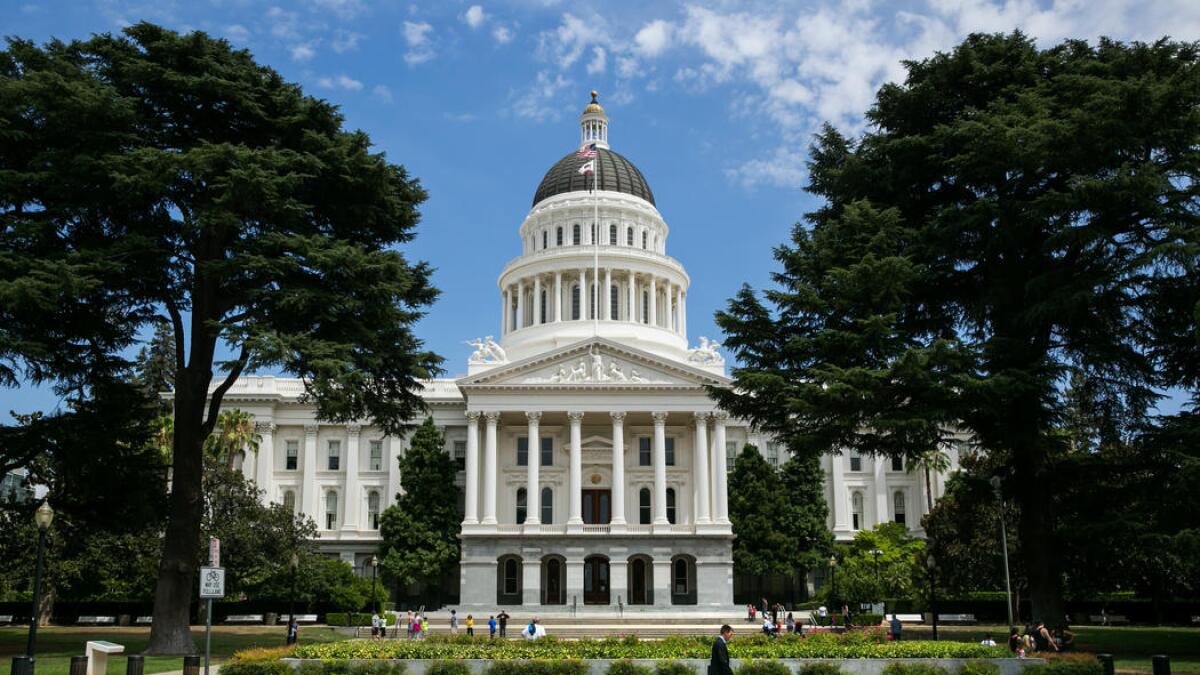
As the California Legislature heads into its last frantic weeks, the politics team has put together snapshots of the 10 biggest issues legislators are considering and will track where they are in the legislative process.
Among them are decisions about whether to toughen up sex crime sentences, a reaction to the former Stanford University student who was sentenced to six months in jail for sexual assault. At the same time, legislators are deciding whether to loosen up on Internet poker by making it legal and regulating the game in certain establishments. Another big issue we’re very interested in: efforts to further regulate medical marijuana just ahead of a November ballot measure that could legalize recreational marijuana throughout the state.
As things progress, we’ll be tracking the current status of particular pieces of legislation, and explaining the back story behind each as opponents and proponents of the issues maneuver in Sacramento. Follow along with us.
State lawmakers close in on changes to California’s energy regulator
Today’s live-or-die moment for hundreds of bills in Sacramento begins with ‘almost total secrecy’

There are days, weeks or even months that go by in the state Capitol where less happens than will take place today before lunchtime.
The appropriations committees of both the state Senate and Assembly convene in a few hours to decide the fate of more than 450 bills that have been sidelined the past few months, placed on what’s known at the statehouse as the “suspense file.”
Simply put: These are bills that are projected to cost the state money, generally an expense of $150,000 or more. That means a lot of bills are held in limbo, ostensibly so lawmakers can later decide how much cash there is to go around.
Even so, it’s not quite that simple.
“There’s nothing in life that’s just a cost analysis,” said Assemblyman Mike Gatto (D-Glendale), a former appropriations committee chairman. “When you’re telling people ‘No,’ and in this case you’re telling very powerful people ‘No,’ it’s difficult.”
The decisions can take weeks. The Assembly’s current chairwoman, Lorena Gonzalez (D-San Diego), has been tweeting hints of what’s to come for the past couple of weeks.
While the suspense file was most prominently used during California’s recession years as a way to limit spending, it also serves a more opaque purpose: Bills that don’t move forward are killed without a recorded voice vote.
“Occasionally the role of appropriations chair is one where you save the caucus from a difficult vote,” Gatto said.
And no record to campaign on or against come November.
It’s also an event where even legislators don’t know what’s going to happen ahead of time. “There’s almost total secrecy,” he said.
With the Legislature adjourning for the year in less than three weeks, bills that are held in appropriations committees today are officially dead. And there is rarely a public explanation for why that happens.
That means that no one will know for sure whether a bill is really killed because of its price tag or its politics.
An expansion of California’s family leave law, stalled in the Legislature, gets a second chance
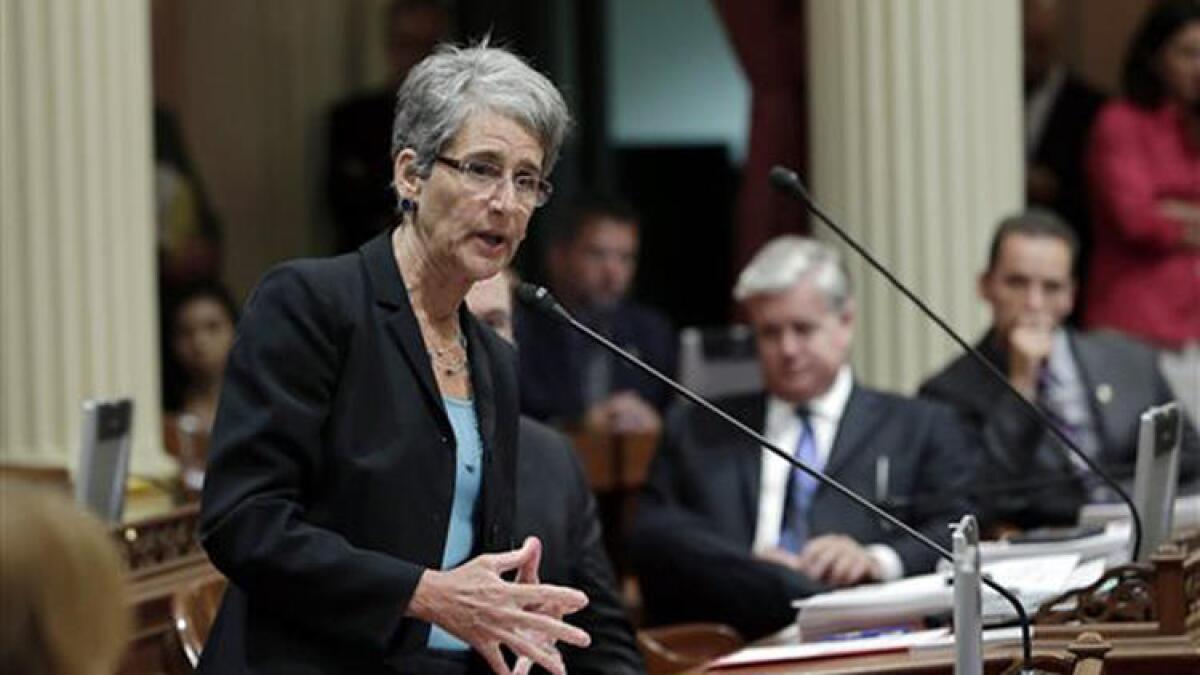
Democratic legislative leaders said Wednesday they are renewing a push to expand California’s family leave law, an effort stymied earlier in the year when the proposal was surprisingly killed in an Assembly committee.
The proposal would require a company of 10 or more workers to allow eligible employees up to 12 weeks of job-protected parental leave to bond with a new child. Current law excludes many small businesses from family leave requirements beyond women recovering from childbirth.
The original bill’s defeat in the Assembly Labor and Employment Relations Committee in June came as a surprise, but followed earlier friction between its author, state Sen. Hannah-Beth Jackson (D-Santa Barbara) and the committee chairman, Assemblyman Roger Hernández (D-West Covina).
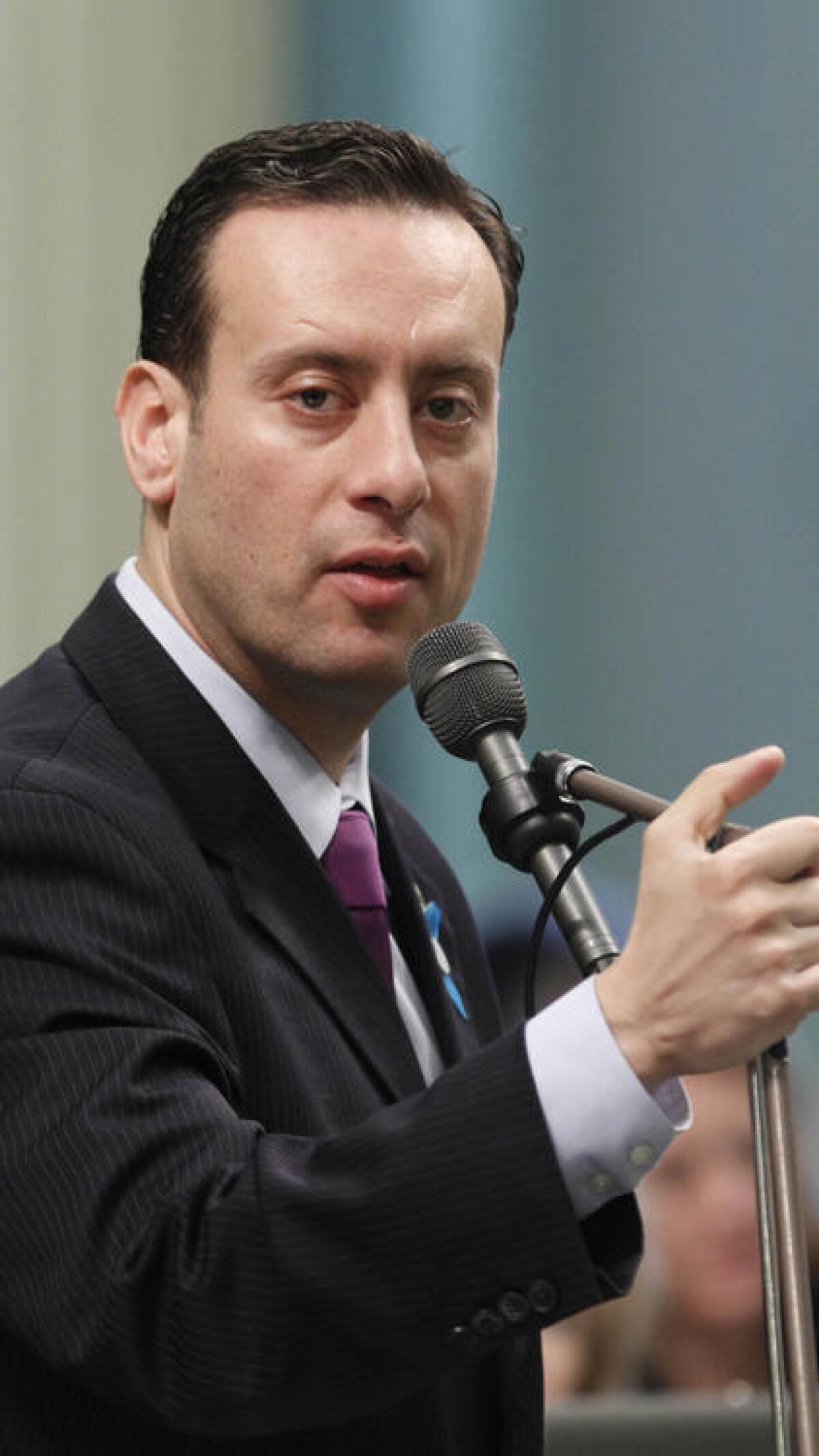
Jackson, a co-chair of the Legislative Women’s Caucus, led an effort in April to demand Hernández take a leave of absence in the wake of domestic violence allegations, an effort he rejected.
The assemblyman is on medical leave, and was stripped this summer of his position as chair of the committee.
Whether Jackson saw the killing of the family leave bill as political payback is unclear. A request for comment was not returned as of late Wednesday afternoon. Regardless, legislative leaders in both houses are behind the revival of the proposal, now contained in Senate Bill 654.
“Paid family leave is a vital issue that will make a huge difference in the lives of California’s working parents,” said Assembly Speaker Anthony Rendon (D-Paramount) in a written statement.
UPDATE AUG. 11 12:20 p.m. This story was updated to add a missing word that clarifies no comment was received from Jackson’s office.
California mayors voice support for climate proposal
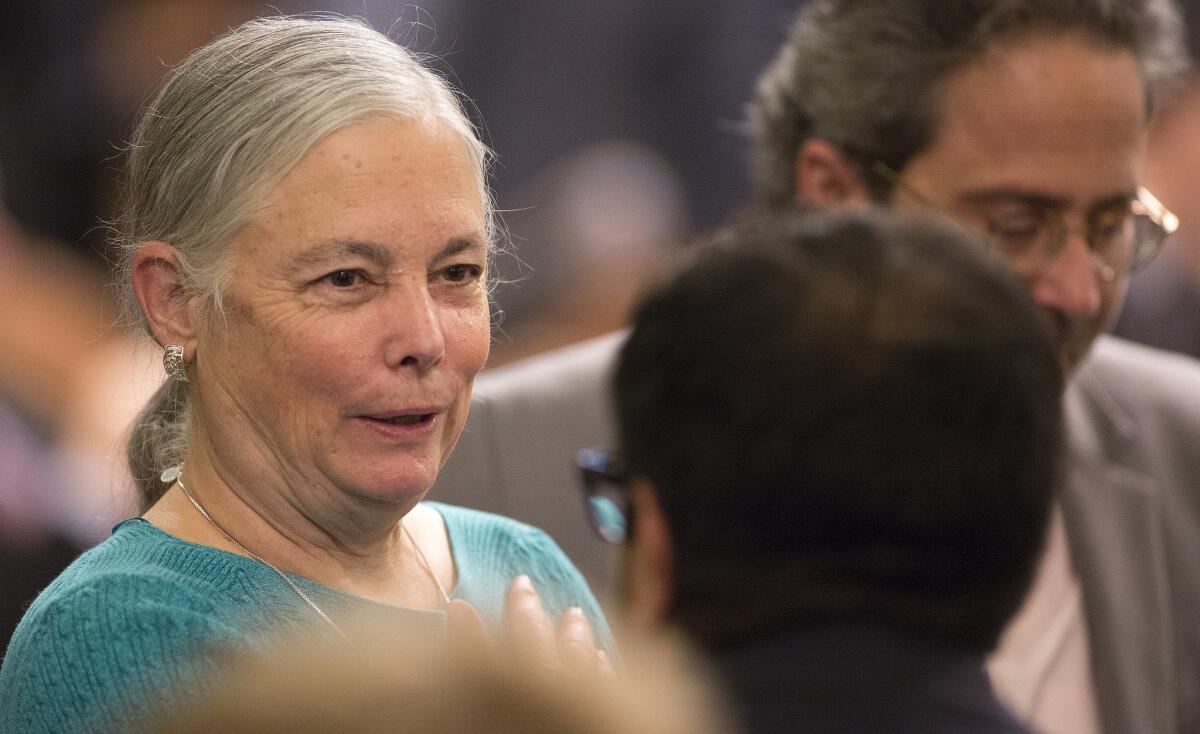
A bipartisan group of California mayors is urging lawmakers to approve legislation from Sen. Fran Pavley (D-Agoura Hills) that would extend the state’s targets for reducing greenhouse gas emissions.
The measure, SB 32, would set a goal of 40% below 1990 levels by 2030, an increase from the current target of hitting 1990 levels by 2020.
“Our cities continue to bear witness to the consequences of a changing climate,” the mayors wrote. “From record heat and fire to the continued water quality and availability challenges fo the drought, we are increasingly challenged by the consequences of climate change.”
The group of mayors includes one Republican, Fresno Mayor Ashley Swearengin. Also signing the letter is Eric Garcetti of Los Angeles, Edwin Lee of San Francisco, Robert Garcia of Long Beach, Libby Schaaf of Oakland, Kevin Johnson of Sacramento, Sam Liccardo of San Jose and Miguel Pulido of Santa Ana.
The legislation is expected to be heard Thursday in the Assembly Appropriations Committee, which will determine whether it will advance this year. Gov. Jerry Brown has already signaled that the issue may not be resolved until farther down the road, possibly through a ballot measure in 2018.
Lawmakers approve audits of UC spending and delta tunnels project
California legislators on Wednesday gave the green light to formal audits of several parts of state government, including UC President Janet Napolitano’s office and Gov. Jerry Brown’s ambitious plan to build underground water tunnels through the Sacramento-San Joaquin River Delta region.
The water project, now estimated to cost some $16 billion to build, has been mired in legal and political controversy for several years. The audit, requested by Assemblywoman Susan Talamantes Eggman (D-Stockton) and Sen. Lois Wolk (D-Davis), was sparked by criticism over spending on the delta project’s preliminary stages.
Meanwhile, the audit of Napolitano’s office is the latest salvo in a pitched political battle between legislators and the UC president over university spending and budget priorities. State auditors will examine both how Napolitano spends money and whether there are enough internal budget controls across the University of California system.
“We must be assured the maximum resources are directed to classrooms and student services,” said Assemblyman Phil Ting (D-San Francisco), the lawmaker who requested the audit, in a written statement.
State senator drops proposal that angered religious universities in California
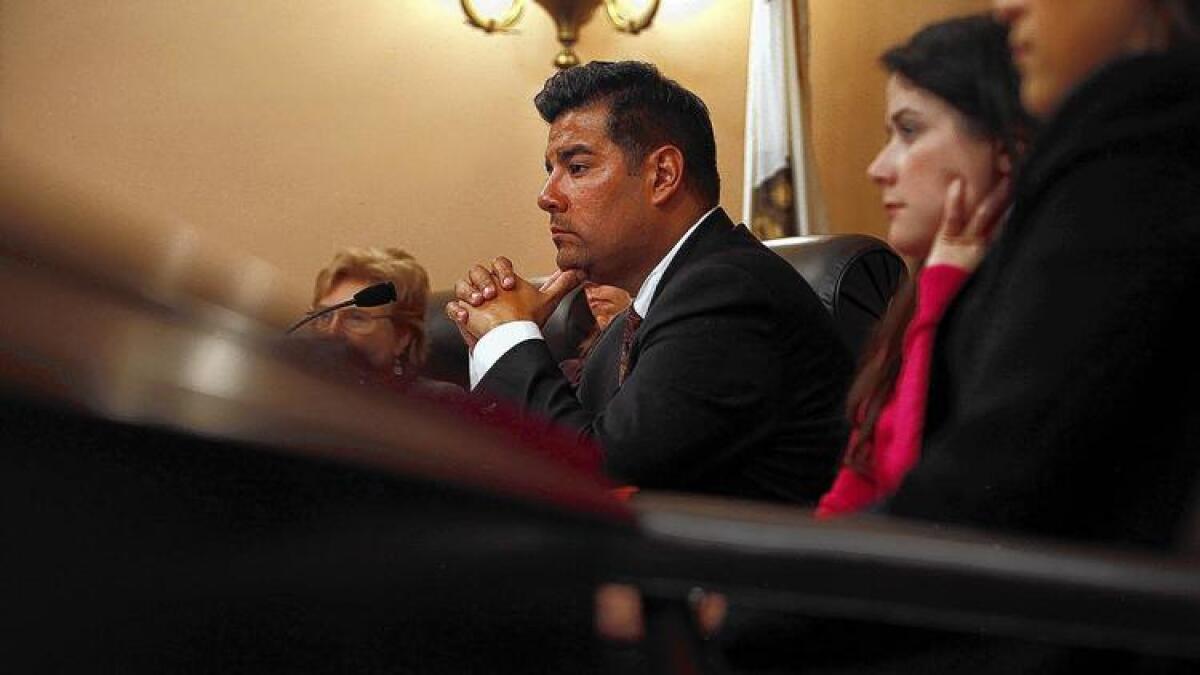
Faced with intense opposition from religious colleges in California, a state Senator said Wednesday he has decided to amend a bill by dropping a provision that would have allowed gay and transgender students to more easily sue private universities for discrimination if they are disciplined for violating church teachings.
Sen. Ricardo Lara (D-Bell Gardens) is removing a provision of his bill that sought to take away the exemption of religious schools to anti-discrimination laws. Instead, he will press forward with the amended bill that would still require such schools to disclose if they have an exemption and report to the state when students are expelled for violating morality codes.
“The goal for me has always been to shed the light on the appalling and unacceptable discrimination against LGBT students at these private religious institutions throughout California,” Lara said.
“I don’t want to just rush a bill that’s going to have unintended consequences so I want to take a break to really study this issue further,” the senator said. He said the requirement for schools to report expulsions based on morality codes to the state Commission on Student Aid will give him information on how common such cases are.
The senator said he will pursue other legislation next year, possibly including the provision dropped Wednesday.
Lara’s decision came after a half-dozen universities formed a new committee called the Assn. of Faith Based Institutions and contributed $350,000.
The group has flooded the districts of members of the Assembly Appropriations Committee, including Chairwoman Lorena S. Gonzalez (D-San Diego), with mailers saying the bill violates religious freedoms and urging voters to contact their Assembly person.
“Stop state control of private education,” says one mailer to Gonzalez’s constituents. Her committee is scheduled to vote on the bill Thursday.
The institutions include Azusa Pacific University, Point Loma Nazarene University and William Jessup University.
After Lara’s announcement, the universities released a letter to the Senator that said “Pending review of this new language, we are pleased to change our position on this legislation from “oppose unless amended” to `support.’ ”
The new flexing of political weight is in addition to lobbying that has been done on behalf of 32 universities by a group called Assn. of Independent California Colleges and Universities.
Association President Kristen F. Soares said she wants to see the final language before making a firm statement but said the group will likely end up supporting the bill as amended.
“It’s a positive development,” Soares said. “This gives us time to really work on the issue the senator is trying to address.”
Jessup President John Jackson said his university “can support a bill that includes the disclosure requirements of SB 1146 as previously written.”
As originally written, the bill would have allowed lawsuits from students who allege discriminatory treatment because they are in same-sex relationships or because they are required to use restrooms, locker rooms and student housing that do not correspond to the gender with which they identify, college officials say.
Just last week, opposition was voiced by Los Angeles Catholic Archbishop José Gomez and Bishop Charles Blake of the Church of God in Christ.
“As it is written today, SB 1146 would violate the religious freedom of faith-based colleges and could jeopardize higher educational opportunities for the tens of thousands of Californians they serve, including many who are black, Latino, Asian and low-income,” the two religious leaders wrote.
It took top dollar to qualify 15 measures on California’s ballot
Dozens of proposed ballot initiatives were floated to California voters this year, and the ones that made it on the November ballot paid a premium for the privilege.
It cost a total of $45.8 million to gather signatures for the 15 measures that qualified by petition, or an average of about $4 per signature.
That’s a vast difference from the last presidential election year, when the average ballot initiative paid about $2.50 per John Hancock.
The number of initiatives circulated, combined with the top dollar that many campaigns were willing to pay to get them qualified, has stunned even veterans of the craft.
Carl Towe, who owns a firm that coordinates signature gatherers, said he’s never seen pay like this in the 30 years he’s worked in the field.
“I knew that supply and demand would drive the prices up,” he said. “But I had no idea whatsoever that they would get up this high.”
“Toward the end, it became a price war,” Towe said. When one campaign pushed a certain initiative to $3 a signature, another would ante up and pay $3.50, he said.
“It got to the point where we wondered, when will it stop?” he said.
Proposition 54, a transparency measure sponsored largely by Republican mega-donor Charles Munger Jr. that would require bills be published online for at least three days before legislative votes, paid the most: $6.61 per signature submitted to the secretary of state.
Gov. Jerry Brown’s parole initiative, which could make thousands of inmates eligible for early parole, was one of the last initiatives to hit the streets after being held up by a legal challenge. That campaign also paid a premium, about $5.22 a signature.
Campaigns that started early, before the glut of measures hit the streets, paid the least: Proposition 52, a constitutional amendment that would make it more difficult for the Legislature to divert funds from the Medi-Cal program, qualified early and spent just $1.79 a signature.
California lawmakers celebrated the last month of legislative session with a potluck at the Capitol
Bill limiting campaign money to tax board amended to call for study
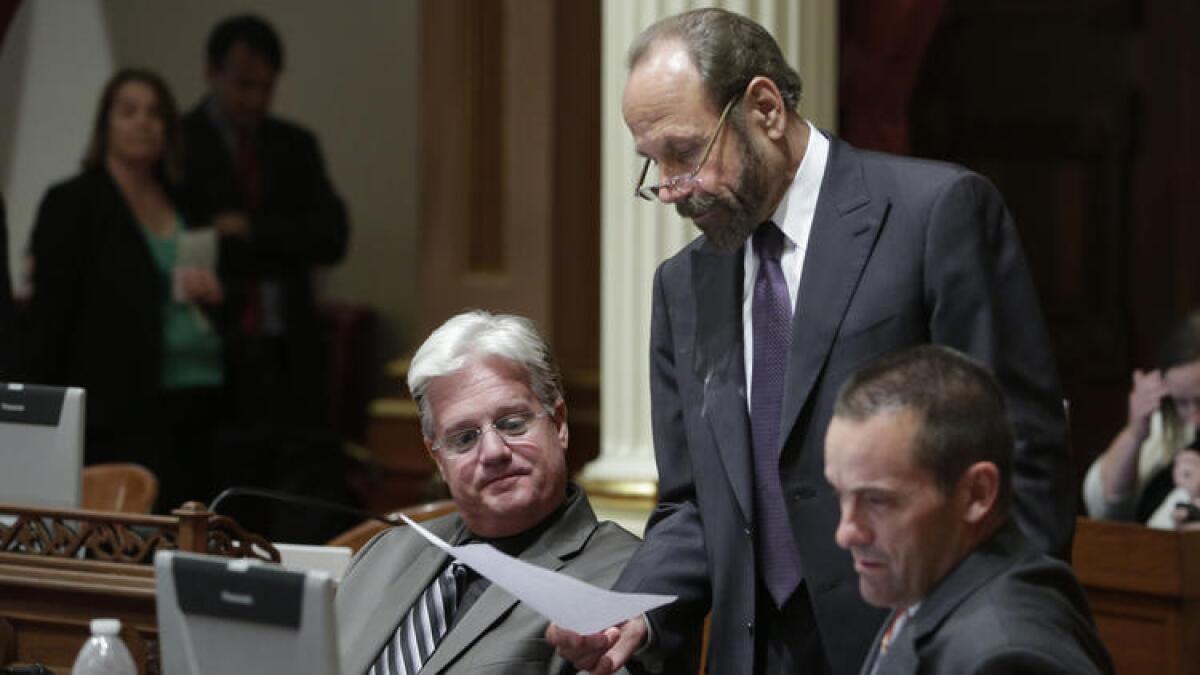
Faced with strong opposition from a member of the Board of Equalization, state Sen. Jerry Hill (D-San Mateo) has for a second time amended a bill that would have imposed tough new campaign contribution limits on board members to avoid conflicts of interest.
The new bill simply calls for a study of possible new limits.
Hill introduced SB 816 after The Times reported that donors were circumventing a $250 contribution limit to board members by funneling the money through political action committees or giving several donations — 45 from employees at one tax firm — of $249 each.
Hill’s bill originally would have prohibited any contributions from firms and individuals with business before the board.
But, after board member Jerome Horton testified that the proposal was unnecessary, Hill amended his bill to reduce the contribution limit from entities appearing before the board from $250 to $100.
On Monday, facing opposition and doubts about getting the bill out of the Assembly Appropriations Committee, Hill amended his bill a second time, simply requiring that the board conduct a study by 2018 on the possible impact of a $100 limit, according to an official close to the senator.
Sacramento County sheriff and GOP congressional candidate dithers on whether he’ll vote for Donald Trump
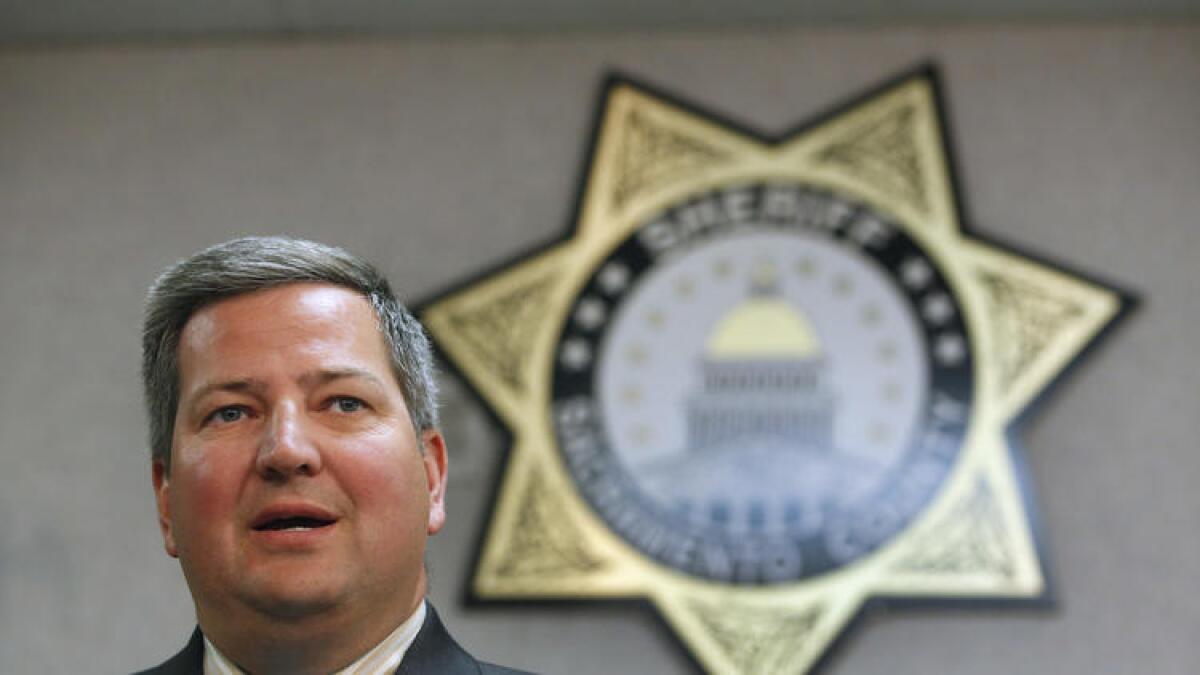
After saying he planned to vote for Republican presidential nominee Donald Trump, Sacramento County Sheriff and 7th Congressional District candidate Scott Jones says now he’s not so sure.
“I don’t know what I am going to do, to be honest with you,” Jones said in a interview with KFBK 1530/93.1 FM in Sacramento on Thursday.
But on Monday, Jones’ campaign strategist, Dave Gilliard, told the Sacramento Bee that Jones would still vote for Trump if the election were held today, “not enthusiastically, but because [Hillary] Clinton is simply not trustworthy.”
Since saying he’d vote for Trump in May, Jones has tried keeping Trump at arm’s length, insisting that his vote is not an endorsement, while criticizing Trump’s “hate speech.” Democrats, including Jones’ opponent, Rep. Ami Bera, have sought to tie the Republican to his party’s nominee.
Jones is one of multiple California Republicans trying to to maneuver around Trump’s candidacy.
Some donors on the list that’s central to ethics complaint against Rep. Mike Honda are helping pay for his defense
Some of the very political benefactors whose names are involved in an ethics complaint against Rep. Mike Honda are helping him defend against it.
Three donors who recently contributed to the Silicon Valley congressman’s legal defense appear on the list of supporters the Silicon Valley congressman is accused of providing special benefits to in exchange for their support. The allegation is at the center of an ethics investigation that has been going on for nearly a year.
Business-aligned Democrats and GOP Assembly members want audit of state’s climate change money
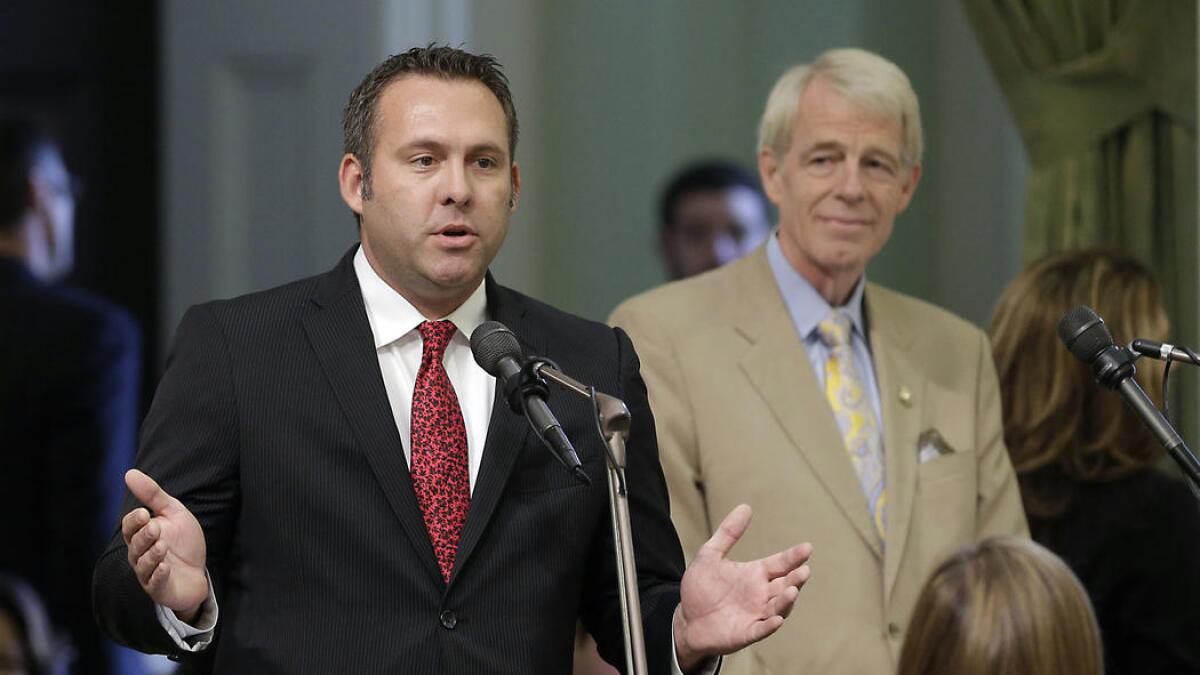
A bipartisan group of more than a dozen members of the Assembly are renewing a request to audit the state’s primary spending program to combat climate change.
The request spearheaded by Assemblyman Adam Gray (D-Merced) comes as Gov. Jerry Brown and lawmakers are struggling to reach a deal to extend greenhouse gas reduction targets beyond 2020 alongside the cap-and-trade program, the main mechanism by which the state aims to achieve its climate goals.
“While we determine the next phase in California’s effort to combat global climate change, it simply makes sense to see whether or not the programs receiving this revenue are producing the expected results,” said the legislators in an Aug. 4 letter to Assemblyman Freddie Rodriguez (D-Pomona), the chairman of the Joint Legislative Audit Committee. “Rushing into decisions with less than ideal information does not help build public confidence.”
Besides Gray, Assembly GOP leader Chad Mayes of Yucca Valley and the leaders of the business-aligned Democratic caucus Jim Cooper of Elk Grove and Rudy Salas of Bakersfield also signed the letter. Should Brown and the Legislature push for a bipartisan, super-majority vote to renew climate targets and cap and trade, all would be considered key votes.
Currently, the cap-and-trade program generates revenue from industries that must purchase emissions credits to meet pollution targets. The money finances programs aimed to reduce greenhouse gases, including popular subsidies for consumers to purchase zero-emission vehicles.
Some lawmakers have targeted the fund and the agency that administers it, the California Air Resources Board, for some time, arguing it needs greater oversight. Gray initially made his audit request in April, and since then ARB officials have given lawmakers more information about the program’s funding and emission goals.
But it doesn’t appear that the audit request is going anywhere this year. The request isn’t on this week’s audit committee agenda, which is its final meeting of the year. A spokeswoman for Rodriguez said Gray’s request didn’t come in time to be considered.
Labor and environmental groups say they are done negotiating over Gov. Jerry Brown’s housing plan
Major labor, environmental and tenants groups have walked away from negotiations over Gov. Jerry Brown’s plan to streamline approval for housing developments that include setting aside a percentage of units for low-income Californians, further imperiling the plan’s chances of passing this year.
“After several meetings without an agreement on a variety of requested changes, we believe it is time to focus on real affordable housing solutions that don’t directly undermine local voices and place communities and our environment at risk,” said a statement from the State Building and Construction Trades Council, Sierra Club and Tenants Together, who are among a coalition of more than 60 groups who joined to oppose the governor’s housing proposal.
Cesar Diaz, the legislative director for the State Building and Construction Trades Council, confirmed that the coalition would not participate in further discussions over the plan.
“This needs much more time and a policy-vetting process,” Diaz said.
Brown wants to wipe away additional local approvals for housing projects that reserve a portion of their developments for low-income residents provided that the housing plan matches local zoning regulations. This means that developers could qualify under the plan if they proposed a 100-unit project on land zoned at that density, but not if they wanted to build anything larger.
The idea aims to address the state’s housing shortage, which many academics and economists blame for soaring housing prices.
But labor and environmental groups have long balked at the proposal because it strips away further environmental reviews from housing projects. The construction workers union also has wanted to guarantee higher wages for qualifying projects, something the governor’s office has resisted. Tenants groups have expressed concern that the plan doesn’t do enough to protect existing low-income renters.
The organizations are all significant interest groups influencing Democrats at the Capitol. No lawmaker on either side of the aisle has emerged as a champion of Brown’s plan, even after the governor attempted to sweeten the deal in June by agreeing to spend $400 million on low-income housing subsidies should the Legislature pass a version of his plan.
Brown spokeswoman Deborah Hoffman said the governor still plans to push forward with his plan.
“We find it odd that they are walking away from talks when the conversation is just beginning,” Hoffman said in a statement. “The governor has been very clear that we need to constrain development costs, improve the pace of housing production and that the $400 million in the budget is contingent upon the passage of a ‘by right’ approval process for affordable housing.”
Previously, Ben Metcalf, the governor’s director of Housing and Community Development, has warned that Brown might not have interest in increased spending on housing or further regulatory reform should lawmakers not pass a measure this year. The deadline for a decision is the end of the legislative session in August.
This post has been updated with a statement from the governor’s office.
The Capitol welcomes the Los Angeles Rams back to California
State lawmakers hold memorial for late Sen. Sharon Runner
A month after her death, state Sen. Sharon Runner (R-Lancaster) was remembered during a memorial ceremony Monday as someone who worked hard for legislation to protect children and unified people of different views.
The ceremony was held by the state Senate at the Capitol.
Runner, who died July 14 at age 62 of respiratory complications from lung disease, was eulogized by House Majority Leader Kevin McCarthy (R-Bakersfield) as “a woman who faithfully served others her whole life.”
“She was a magnet. She brought people together that normally would not come together,” McCarthy said in an emotional speech in which he recalled that he and Runner were both elected to the state Assembly in 2002.
Senate leader Kevin de León (D-Los Angeles) praised Runner for “a true display of incredible courage, perseverance and faith” when she returned to the Senate last year after a double lung transplant in 2012 that was part of her long battle with scleroderma.
Colleagues praised Runner for leading efforts on a sweeping law that targeted sex offenders.
The ceremony featured a trumpeter playing “Taps” and a color guard, and was attended by Runner’s husband, George Runner, a member of the state Board of Equalization.
Sharon Runner served six years in the Assembly before being elected to the Senate in 2004.
Is it 2018 already? Fundraising race already on in lieutenant governor contest
GOP congressman swings back at Modesto Bee editorial that slammed him for his silence on Trump
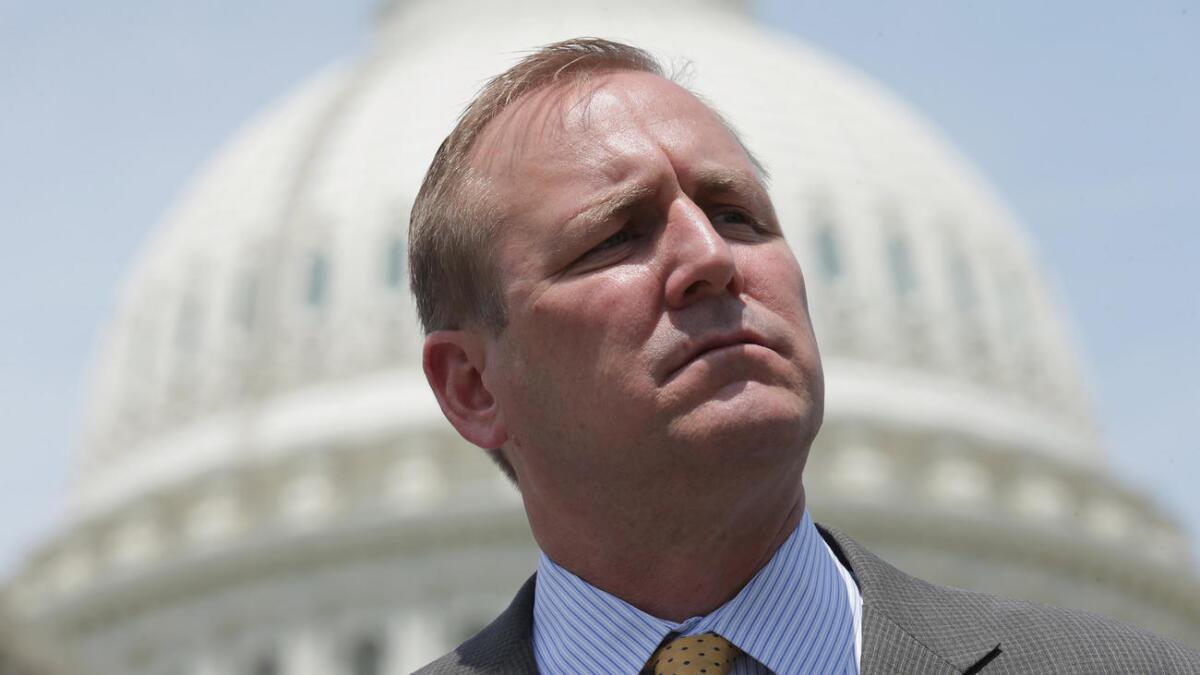
Central Valley Rep. Jeff Denham swung back Monday at a Modesto Bee editorial that harshly criticized his reluctance to talk about Donald Trump.
Modesto Bee newspaper’s editorial board last week sharply criticized the Republican over his silence on whether he supports Trump, saying in an editorial that he “has remained silent, apparently hoping the issue, if not Trump himself, will disappear.”
The editorial came after Bee reporters repeatedly asked Denham whether he supports the Republican presidential nominee.
“Like many Americans from both parties, my first choice for president is not on the ballot in November,” Denham wrote in his responding op-ed. “So I will cast a vote for the candidate who I believe will do the best job protecting our nation, defending our Constitution and addressing the serious economic issues facing the Valley, especially the water crisis.”
Denham has said in the past he planned to support the Republican nominee but had not specifically endorsed Trump, something he also did not explicitly do in his response to the Bee.
Denham’s 10th Congressional District is home to a large Latino population, and Democrats there have repeatedly sought to connect Denham and Trump in voters’ minds.
The Bee’s editorial board didn’t endorse Democrat Michael Eggman, who is on the ballot against Denham in November, but flatly declared, “Donald Trump is a litmus test, and Jeff Denham has failed it.”
Denham took particular issue with that line, writing, “This test is not based on my position on the issues or on my record as a representative for the Valley. This litmus test is based entirely on whether I will denounce the presidential nominee of my own party for his choice of words, not his record.
“The Bee knows that by doing so I would be helping elect a candidate I do not agree with on many important issues. Perhaps that is the motive behind the editorial.”
Internet-poker vote delayed
Legislature focuses on human trafficking victims
As California lawmakers attempt to tackle human trafficking before adjourning the legislative session this month, at least one bill seeks to protect young, vulnerable victims at the center of many cases in court.
The legislation by Assemblyman Miguel Santiago (D-Los Angeles) would allow minors under 16 to testify through closed-circuit televisions outside the courtroom, where they can share their painful experiences away from the presence of the jury and the defendant.
Of some two dozen human trafficking bills still pending at the state Capitol, Santiago’s is the one that has rallied the most support from advocates and law enforcement. But it has one major opponent, the American Civil Liberties Union, which says the law would erode the constitutional right of defendants to confront their accusers.
Push for regional electricity grid gets bounced to next year, with Gov. Jerry Brown citing ‘unresolved questions’

Scratch another item off California lawmakers’ to-do list for the legislative session that ends Aug. 31.
A measure that would create a regional electricity grid, intended by Gov. Jerry Brown to spread renewable energy throughout the West, won’t be considered until next year.
In a letter to lawmakers on Monday, Brown said more work was needed on the plan, and there are some “important unresolved questions.”
Mandatory sentencing proposals are among the legislative responses to the Stanford sexual-assault case
California lawmakers have introduced three bills in response to public outrage over the six-month jail sentence given to Brock Turner, a Stanford University student convicted of sexual assault in June.
Two of them would increase mandatory punishments in similar cases in the future. That’s led to fears among some critics about the history of mandatory sentencing in California, which many blame for the boom in the state’s prison population.
Loretta Sanchez endorses in race to replace her in Congress
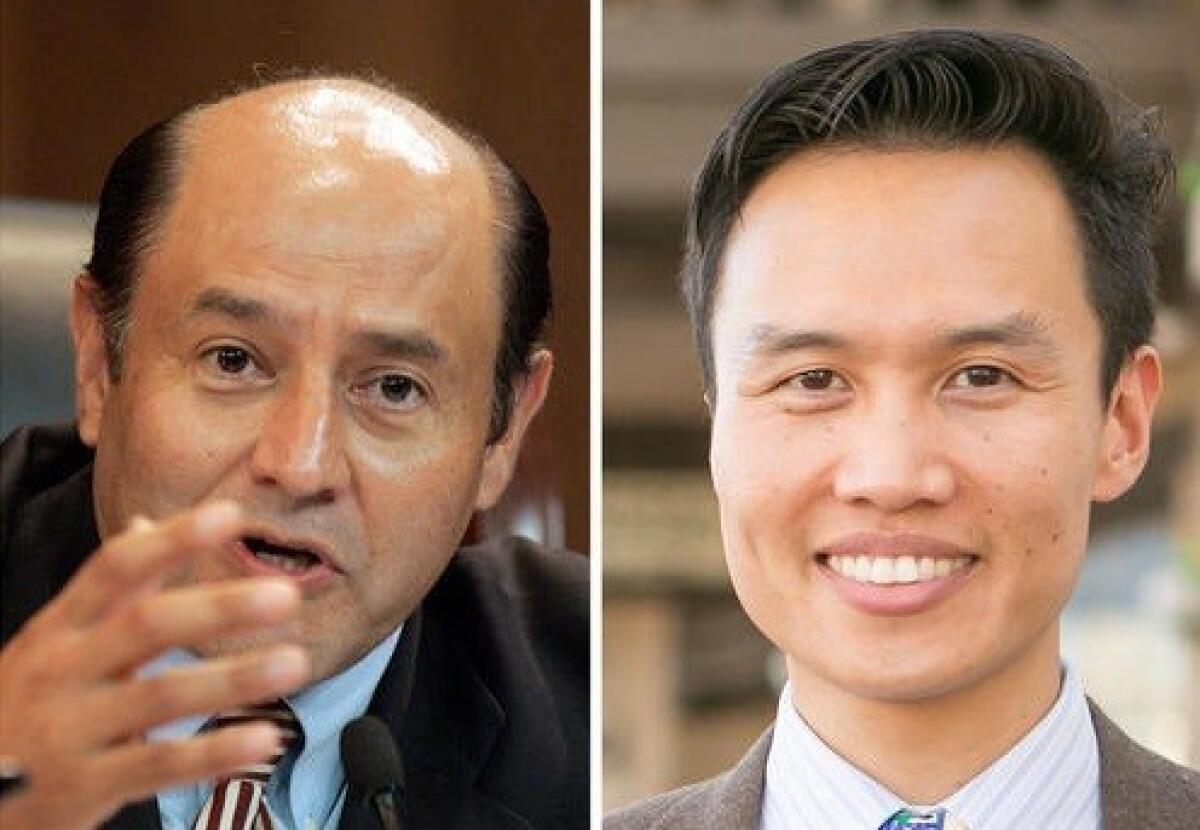
Rep. Loretta Sanchez (D-Orange) proclaimed her preferred successor Friday, endorsing former state Sen. Lou Correa in her Orange County district.
Sanchez, who is running for U.S. Senate, said in a statement that Correa “has a great record of fighting for Orange County’s families” and “the proven experience we need right now in Washington.” Sanchez has been credited with helping Correa first get elected to the Legislature.
Correa, 58, is facing Garden Grove Mayor Bao Nguyen in Orange County’s first-ever Democrat-on-Democrat congressional race. Nguyen could appeal to Vietnamese Americans, who make up 7% of registered voters.
Sanchez joins other members of the California delegation who also have endorsed Correa, including House Minority Leader Nancy Pelosi (D-San Francisco) and Sanchez’s sister, Rep. Linda T. Sanchez of Whittier.
In a statement, Correa said he would “pick up where [Sanchez] left off and continue to work hard every day to serve all of my community members.”
Nguyen, who defied expectations and eked out enough votes to get past a Republican and another former Democratic state legislator in the June primary, faces an uphill battle in November, with many high-ranking Democrats siding with Correa so far.
California voters rejected a Madera County tribal casino, but federal officials have approved it anyway
Federal officials have approved plans for a Central Valley tribal casino, even though California voters overwhelmingly rejected the project in 2014.
The decision last week by the U.S. Dept. of the Interior effectively nullifies the vote against the North Fork Rancheria of Mono Indians and its proposed casino alongside Highway 99 in Madera County.
“It was disappointing,” said Cheryl Schmit, the proponent of 2014’s Proposition 48.
Prop. 48 was a referendum asking voters if they agreed with the decision by Gov. Jerry Brown and the Legislature to approve the plans for a casino with as many as 2,000 slot machines. The project site was not originally designated as tribal land, but was later approved for casino use through a process that critics panned as “off reservation” gaming.
Nearly 61% of voters cast a ballot to reject the casino project on Nov. 4, 2014. The tribe then sued the state, claiming “bad faith” negotiations. A judge ultimately agreed, leading to the decision by U.S. Acting Asst. Secretary Lawrence Roberts that the North Fork tribe “may conduct” casino gaming on the Madera property.
“The tribe is extremely excited about this achievement,” said Maryann McGovran, chairwoman of the North Fork tribe, in a written statement.
But the project faces a number of significant remaining hurdles. A spokesman for the tribe said Friday that a half dozen lawsuits remain pending, including one that challenges Brown’s authority to have agreed to the project in the first place.
“We’re not giving up,” said Schmit.
Gun rights activists sue California for forcing deletion of legislators’ personal information from website

A group opposed to new gun control laws is suing the state for successfully demanding the removal of a blog post that listed the home addresses of legislators who voted for California’s newest measures.
The lawsuit is being funded by the Firearms Policy Coalition on behalf of one of the group’s members, who is listed in the lawsuit under the pseudonym “Publius” and writes a blog called the “The Real Write Wringer.”
The blog recently published the names, home addresses and home phone numbers of 40 legislators who voted for a sweeping gun control package in June, saying the officials “decided to make you a criminal if you don’t abide by their dictates. So below is the current tyrant registry.”
The hosting company WordPress took the post down after it received a letter from Deputy Legislative Counsel Kathryn Londenberg saying the information put elected officials at “grave risk” and citing state law barring the release of such information.
Londenberg warned that if the information was not removed from the blog within 48 hours “we reserve the right to file an action seeking injunctive relief, as well as associated court costs and attorney’s fees.”
Brandon Combs, president of Firearms Policy Coalition, said the post was not threatening to elected officials. He said the state’s action was censorship that violates the 1st Amendment.
“Our ... lawsuit argues that a state of California statute and the legislative counsel’s demand letter threatening legal action and penalties unconstitutionally forced WordPress into taking down the material,” Combs said.
Rep. Ami Bera’s father shouldn’t get probation for campaign fraud, prosecutors say
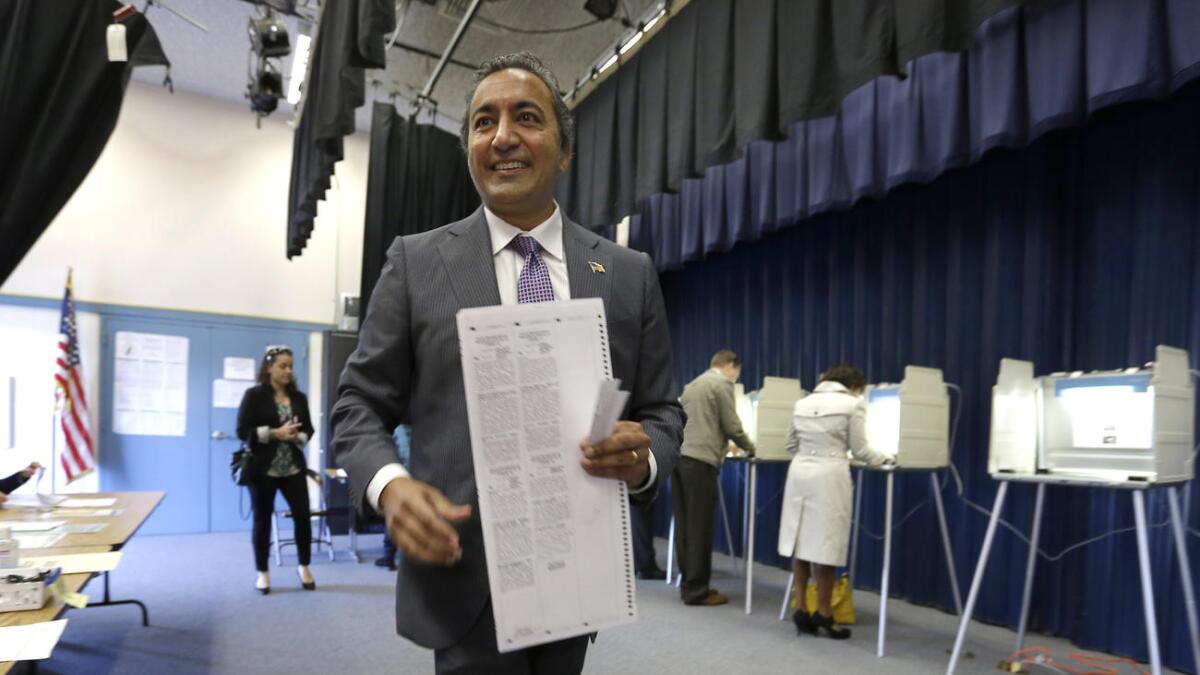
Federal prosecutors oppose allowing the father of Sacramento County Rep. Ami Bera to avoid prison for illegally funneling more than $250,000 into the congressman’s campaign accounts, according to a document filed in court Thursday.
Babulal Bera, 83, pleaded guilty in May to charges that he asked others to make contributions to his son’s campaigns in 2009 and 2011 and then repaid at least a portion of those donations. He’s scheduled to be sentenced in federal court on Aug. 18.
Prosecutors have raised concerns about a pre-sentencing report recommendation that would allow the elder Bera to be placed on probation. In May, prosecutors suggested that they might ask for a sentence of 30 months in prison — less than the recommended guidelines for the crimes.
“The government objects” to the possibility of probation, prosecutors wrote in Thursday’s filing, “as it is unsupported by the facts of this case and the serious nature of the defendant’s offense.”
The document does not detail exactly what sentence prosecutors will ultimately recommend before Babulal Bera is sentenced by U.S. District Judge Troy L. Nunley.
Prosecutors also objected to the pre-sentencing report’s recommendation that Bera be ordered to pay a $100,000 fine. They say guidelines require a fine of at least $130,000.
Sparks fly as California’s U.S. Senate candidates wrestle about how often to debate
California’s two U.S. Senate candidates may both be Democrats and align on a number of issues facing the country, but they don’t see eye to eye when it comes to debates.
California Atty. Gen. Kamala Harris on Friday agreed to two debates, announced via tweet by Sean Clegg, a Harris political consultant. One will be in Northern California on Sept. 20 and the second in Southern California on Oct. 5
Her rival, Orange County Rep. Loretta Sanchez, doesn’t think that’s enough, and Sanchez political consultant Bill Carrick took a not-too-subtle swipe at Harris in response.
“California has the first open U.S. Senate seat since 1992, and the people of California need more than just two opportunities to hear from the candidates and the debates need to be in more regions covering a much larger portion of the State’s voters,” Carrick said in an emailed statement. “Given her lack of experience, Kamala Harris needs to prove that she understands federal policies, national security, foreign relations and our economy if she wants to be our United States Senator.”
Carrick said debate negotiations between the two campaigns are still open, and he accused the Harris campaign of “arrogantly announcing” there would only be two debates.
He also noted that the two presidential nominees will debate at least three times, and said that should be the “minimum standard” for California’s Senate race.
Clegg said that there were the same number of debates held before the Senate primary in June.
“If Loretta Sanchez can’t make her case in four debates it should be ‘case closed,” Clegg said in an email. “Rather than whining about these debates Bill Carrick should begin preparing his candidate so that she does not offend another large segment of the California electorate.”
California Politics Podcast: Legislature’s last lap
When the sun rises on Sept. 1, California’s legislative year will officially come to a close. In this final month of deliberations in Sacramento, there are some big battles worth watching.
On this week’s California Politics Podcast, we take a look at some of the big topics lawmakers will confront, including the question of whether to extend the state’s landmark climate change law, the call for action on affordable housing, and issues related to police accountability and sexual assault punishment.
We also discuss the controversy surrounding the absence of Assemblyman Roger Hernández (D-West Covina) after domestic violence accusations and his removal from all legislative committees.
I’m joined by Marisa Lagos of KQED News and Anthony York of the Grizzly Bear Project.
Democratic congressional challenger gets backing of Lancaster’s Republican mayor
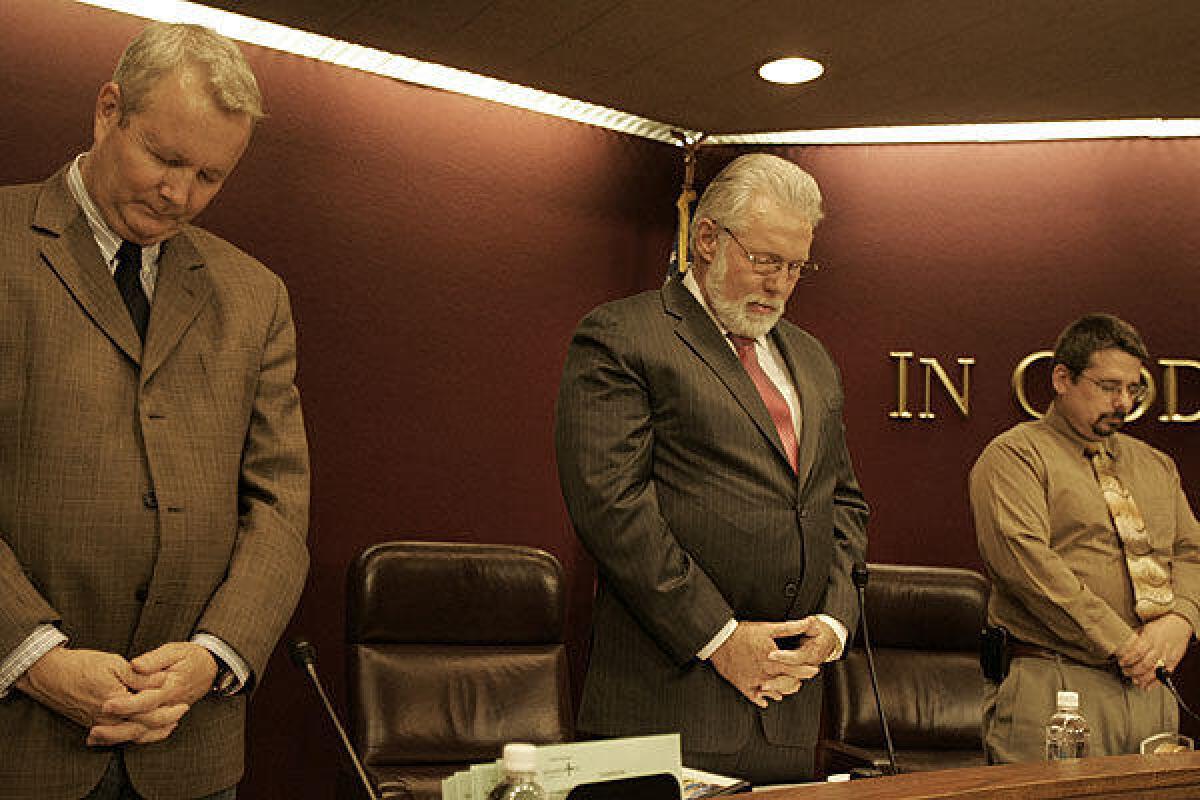
R. Rex Parris, the Republican mayor of Lancaster, said the last Democrat he endorsed was Kathleen Brown back in 1994 when she was lost her bid challenging GOP Gov. Pete Wilson.
This year, Parris has another Democrat he likes: congressional hopeful Bryan Caforio.
Parris, known for his straightforward and surly style, endorsed the Democrat on Thursday over Republican Rep. Steve Knight of Palmdale, who represents the 25th District, spanning northern Los Angeles County, including a part of Lancaster.
Parris noted that in the past he has supported and contributed to the campaigns of Knight and his late father, state Sen. William J. “Pete” Knight.
But Parris, well known as a backer of renewable energy, criticized Knight for supporting a partially natural-gas-fired power plant in neighboring Palmdale. He said Knight hadn’t done enough for Lancaster while in the state Legislature or Congress.
“He has just never provided us help,” Parris said. “He has never asked us how he could help.”
Parris said he was also disappointed to see that Knight had remained silent about support for Republican presidential nominee Donald Trump.
Knight eventually addressed the issue this week, saying Trump’s comments about the parents of a Muslim American soldier killed in Iraq were “deplorable” -- after Caforio called for Knight to “disavow” Trump’s remarks.
Trump could make a difference in what is likely to be a punchy race between Knight, a freshman in Congress, and Caforio, a first-time candidate and lawyer.
Republicans have lost their edge among registered voters, and the district is almost evenly split between Democrats and Republicans, with 21% of voters listing no party preference.
National Democrats have been targeting the district since March when Trump emerged as the likely nominee.
In June, the nonpartisan Cook Political Report called Knight “the most vulnerable incumbent in California.”
Modesto Bee editorial board criticizes Rep. Jeff Denham over silence on Trump
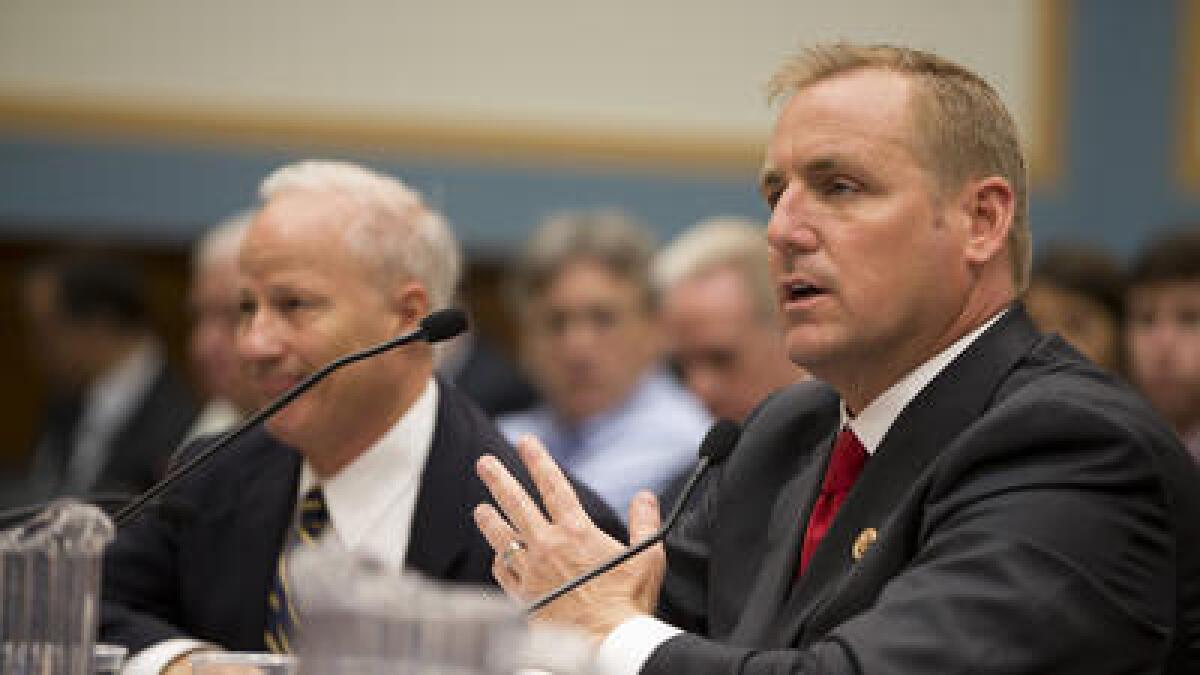
The down-ballot effect of controversial Republican presidential nominee Donald Trump seems to grow every day, causing more and more problems for California’s GOP members of Congress.
This week the editorial board of the Modesto Bee newspaper sharply criticized Central Valley Rep. Jeff Denham over his silence on whether or not he supports Trump, saying in an editorial that he “has remained silent, apparently hoping the issue, if not Trump himself, will disappear.”
The paper stopped short of endorsing Denham’s November opponent, Democrat Michael Eggman, but flatly declared, “Donald Trump is a litmus test, and Jeff Denham has failed it.”
“Supporting Trump is supporting racism, misogyny, business chicanery, bullying, unparalleled narcissism and more. Repudiating Trump’s brand of politics should be easy, as it has been for some of the nation’s most steadfast Republicans,” the editorial reads.
Both Denham and his Republican colleague Rep. David Valadao of Hanford represent heavily Latino districts where voters could rebel against Trump’s incendiary comments about Mexican immigrants.
Democrats have kept a spotlight on the issue, hoping they can claim upset victories.
Valadao in June said he couldn’t endorse Trump because he couldn’t back a candidate who “denigrates people based on their ethnicity, religion, or disabilities.”
Though Denham said this spring he said would “be supporting the Republican nominee,” he has not said whether he will endorse Trump.
“Jeff Denham needs to own his opinion. If his conscience tells him to back Trump, then he should say it. If he can’t abide Trump’s unrestrained ego and veiled race baiting, he should say that, too,” the editorial read.
‘Ready for Hillary’ hangman tweet leads to local GOP official’s resignation

The Riverside County Republican Party official who tweeted a picture of a hooded hangman with the phrase “I’m Ready for Hillary” on Thursday resigned from his job with the state Board of Equalization.
Nathan Miller, a local party official and aide to Board of Equalization member Diane Harkey, accepted responsibility for the tweet, said Russell Lowery, a spokesman for Harkey’s office.
“He had a lapse of judgment and offered his resignation. We accepted,” Lowery said.
Miller worked as deputy district director for Harkey, organizing tax information events for local businesses, Lowery said.
According to the Riverside Press Enterprise, the tweet was sent out by the county party’s official Twitter account at 2 p.m. Wednesday. The tweet was quickly deleted.
On Wednesday, Riverside County GOP Chairman Scott Mann said he was “horrified” by the tweet, and promised to take action against the person responsible. But in an email to the Press Enterprise shortly after the tweet was posted, Mann dismissed it as “political satire” that expressed how Democratic presidential nominee Clinton “has gotten away with every scandal and political flip-flop in her public life.”
Howard Katz, chairman of the Riverside County Democratic Party, called the tweet a dangerous provocation.
Jerry Brown launches committee for possible 2018 ballot measure on climate change
With California’s landmark cap-and-trade program in peril from legal challenges and political uncertainty, Nancy McFadden, a top aide to Gov. Jerry Brown, insisted on Thursday the program will be extended “one way or another.”
Dana Williamson, a political consultant for Brown, confirmed Thursday that the governor opened a committee today to raise funds for a possible initiative in two years.
The statement comes after a bustling day of action in the Capitol around efforts to extend California’s landmark climate policies. Brown met with Senate leader Kevin de León (D-Los Angeles) Thursday morning, and De León later met with Assembly Speaker Anthony Rendon (D-Paramount) to discuss the future of a measure to set new goals for greenhouse gas emission reductions by 2030.
Backers of the bill, SB 32 by Sen. Fran Pavley (D-Agoura Hills), say it is necessary to help shore up the state’s cap-and-trade program, a centerpiece of California’s effort to fight climate change. The program functions by capping how much greenhouse gas can be emitted into the atmosphere and requiring companies to obtain permits, each allowing 1 metric ton of emissions.
But the measure has looked politically tenuous, facing opposition from the oil industry and reluctance from a large bloc of business-aligned Democrats in the Legislature.
After his meetings on Thursday, De León said the bill’s fate was still in flux.
“Things are still fluid,” he said in a brief interview, adding, “this is going to get done one way or the other. I’d sure like to get it done sooner rather than later.”
Effort to give big development projects environmental relief passes the Assembly with overwhelming support
A bill that would give some legal environmental relief to mega-development projects across California, which would probably include four in Los Angeles, overwhelmingly passed the Assembly on Thursday.
The measure aims to ensure that any environmental litigation against projects worth more than $100 million that create high-paying jobs and meet greenhouse gas and renewable energy standards wraps up within nine months.
The bill received bipartisan, super-majority support in the Assembly. Republicans have tried to reform the state’s main environmental law, known as the California Environmental Quality Act, or CEQA, for many years, saying it as an impediment to development.
“We really need to do this for all projects in California,” said Assemblywoman Kristin Olsen (R-Modesto).
The bill now goes to the Senate, where its author, Sen. Cathleen Galgiani (D-Stockton) wants another super-majority vote so the measure can take effect immediately. She and other Democratic supporters of the bill have said such projects deserve relief because they’ll boost the economy and meet labor and environmental standards.
Supporters of the new measure believe it could allow the Los Angeles developments to get built three years sooner. A similar reform, however, has yet to provide much relief. None of the six large developments that qualified under a previous version of the legislation have so far needed to use the fast-track provisions to navigate the legal process.
The four Los Angeles developments that intend to apply for fast-track status if the measure passes are:
- A $1-billion redevelopment of the Crossroads of the World complex in Hollywood
- A $200-million hotel and residential development at the corner of Yucca Street and Argyle Avenue in Hollywood
- The redevelopment of Barlow Respiratory Hospital near Dodger Stadium that would add 400 single-family homes to the property
- A $1-billion park created by capping 38 acres of U.S. Highway 101 between Hollywood and Santa Monica boulevards
Times intern Sophia Bollag contributed to this report.
House Minority Leader Nancy Pelosi, Rep. Anna Eshoo visit troops in Afghanistan
House Minority Leader Nancy Pelosi, Rep. Anna Eshoo of Menlo Park and six other House Democrats wrapped up a two-day trip Thursday to visit U.S. troops in Afghanistan.
They met with military members from the U.S., NATO and Afghanistan during a tour of Afghan Forward Operating Base Oqab in Kabul, according to a news release.
The members also met with Gen. John Nicholson Jr., commander of NATO Resolute Support Mission and of U.S. forces in Afghanistan; U.S. Ambassador to Afghanistan Peter Michael McKinley; and Afghan President Ashraf Ghani.
Earlier in the week the delegation stopped in Italy to talk about counter-terrorism, cyber security and national security with Italian officials, including Italian President Sergio Mattarella, Foreign Minister Paolo Gentiloni and Chamber of Deputies President Laura Boldrini, and about climate change and global poverty with Archbishop Silvano Maria Tomasi of the Vatican.
The members are on their way home, Pelosi’s office said.
Legislature honors Dodgers legend Vin Scully
Backers of pot initiative sue to challenge opposition’s ballot arguments
The campaign committee for an initiative to legalize the recreational use of marijuana filed a lawsuit Thursday alleging that the ballot arguments by the measure’s opponents contain multiple “false and/or misleading statements.”
The Yes on Proposition 64 committee is asking the Sacramento County Superior Court to delete or amend statements that will be included in ballot pamphlets going to voters. The ballot arguments were signed by public leaders including Sen. Dianne Feinstein and California Assn. of Highway Patrolmen President Doug Villars.
“Defenders of the failed war on marijuana are entitled to their own opinions but not their own facts,” said Jason Kinney, a spokesperson for the campaign. “More so than any I’ve seen in recent memory, the ballot arguments submitted with a straight face by the opponents fundamentally and factually misrepresent this ballot measure and are riddled with obvious falsehoods.”
Tim Rosales, a spokesman for the “No on Prop. 64” committee said it will challenge “misstatements” in the supporters ballot arguments as well.
“We are not surprised,:” Rosales said of the lawsuit by initiative supporters. “Their campaign is in trouble and they know it, and we believe we will prevail.”
The lawsuit alleges that the ballot arguments are inaccurate in saying: “Children will be exposed to ads promoting marijuana gummy candy and brownies.” The suit maintains that the initiative prohibits marijuana products “designed to be appealing to children.”
The civil action also disputed an argument that Proposition 64 would repeal “countless consumer protections” signed into law, arguing it does not repeal any laws.
The lawsuit also challenged the claim that the initiative “rolls back the total prohibition of smoking ads on TV.” Kinney said the initiative does not affect the tobacco ban, and that federal law continues to prohibit ads on marijuana.
Embattled Assemblyman Hernández continues to get per diem even while on medical leave
Assemblyman Roger Hernández, who was booted from his committee posts this summer after a judge issued a domestic violence restraining order against him, continues to draw per-diem payments for travel-related expenses to Sacramento despite being absent from work and on medical leave.
Assembly officials confirmed this week that Hernández continues to receive a daily stipend of $176 in addition to his $100,113 annual salary. The development underscores how the West Covina Democrat’s ongoing legal trouble has become a political headache for Assembly Democrats — one that Speaker Anthony Rendon (D-Paramount) sought to avoid by encouraging Hernández to resign before the Legislature reconvened this week for the final month of the 2016 session.
The turmoil has also sparked debate in the Capitol over whether to invoke a new law — approved by voters in the wake of a series of scandals in the state Senate — that allows legislators to suspend a lawmaker without pay.
California takes first step to establishing lane-splitting guidelines for motorcyclists
California is expected to become the first state in the nation to formalize the practice of lane splitting after state Assembly members on Thursday passed a bill authorizing the California Highway Patrol to establish guidelines for motorcyclists on how to do it safely.
The bill, sponsored by Assembly member Bill Quirk (D-Hayward), passed Thursday with a 69-0 vote. It now goes to Gov. Jerry Brown for his signature. On the floor, Quirk said the proposed law had many positives, including reducing traffic congestion and promoting safety.
“No issue is more important to me than roadway safety,” he said
Lane splitting, in which a motorcyclist passes other vehicles by riding between them along the lane line, has long been a hot issue in the state.
Technically, it has not been legal or illegal, falling in a gray area where it was treated as acceptable by law enforcement agencies. But when the CHP published safe strategies on the practice in 2015, a citizen complained that the agency should not be allowed to create public policy. In came in AB 51.
Watch what lane-splitting looks like in L.A. traffic >>

Los Angeles motorcyclist Susanna Schick, who took columnist Robin Abcarian on a ride-along, discusses lane-splitting from a rider’s perspective.
Quirk’s original bill proposed that lane splitting could occur legally only when a motorcycle was moving no more than 15 miles per hour faster than the traffic around it, and it prohibited the practice at speeds above 50 mph.
Several motorcyclists’ groups objected to that language, finding the speed limit too low. Other groups and individuals, who believe that lane splitting is dangerous regardless of the speed, objected to the proposal on principle.
The revised bill, which has sailed through the legislative process, provides a basic definition of “lane” and leaves the rest to the CHP.
“We think it’s a great idea,” said Nicholas Harris of the Western States Representative of the American Motorcyclist Assn. “It will give the CHP the authority it needs to educate the drivers and riders of California on the safe guidelines.”
Former Republican congressman backs Loretta Sanchez for Senate
Former Republican Rep. Howard “Buck” McKeon of Santa Clarita crossed party lines to endorse Democrat Loretta Sanchez for U.S. Senate, citing her expertise on military and national defense issues.
The Orange County congresswoman hopes to piece together a patchwork of support among Democrats, Republicans and independent voters in her uphill effort to overtake the front-runner, state Atty. Gen. Kamala Harris.
McKeon, a former chairman of the House Armed Services Committee, praised Sanchez’s work to protect American troops and their families. Sanchez serves on the Armed Services and Homeland Security committees.
“I have worked closely with Loretta for many years and have seen firsthand her ability to put partisanship aside and work with Democrats and Republicans to help move policies forward that better protects our troops and the homeland,” McKeon said in a statement released by the Sanchez campaign.
Sanchez said she was honored to have the support of her former colleague, adding, “My 20 years of national security experience speaks to my capacity to be ready to work on day-one.”
McKeon served in Congress for more than two decades before deciding not seek reelection in 2014.
He joins another well-known Southern California Republican, former Los Angeles Mayor Richard Riordan, in backing Sanchez. Riordan, a political maverick who has never been shy about bucking his Republican Party, criticized Harris as a “crazy liberal.”
Republican political consultant Dave Gilliard also is working with a super PAC to support the Sanchez campaign. Gilliard said the congresswoman’s experience on issues related to national security, veterans and public safety made her to best choice. Gilliard said the Jobs Opportunity and Freedom PAC is in the process of raising money for the effort.
Inside an intraparty congressional fight
In his eight terms in Congress, Rep. Mike Honda has earned a reputation as a well-liked lawmaker and one of the liberal stalwarts of the House, with high rankings from labor, civil rights and environmental groups.
Now, thanks to shifting demographics and a looming ethics investigation, Honda might be in trouble.
In the June primary, Honda received 2,200 fewer votes than fellow Democrat Ro Khanna, who is back in a rematch.
The results could mark a turning point in the 75-year-old congressman’s career: In November, Roll Call named Honda one of the top 10 most vulnerable members of Congress.
“I wouldn’t call it losing,” Honda said in a recent interview. “Let’s call it moving on to the general election.”
That’s a big reversal from the 2014 primary, when Honda handily defeated his upstart challenger by more than 20 percentage points.
Still, political observers say it would be a mistake to count the congressman down and out quite yet.
Kamala Harris nabs support from top legislative leaders
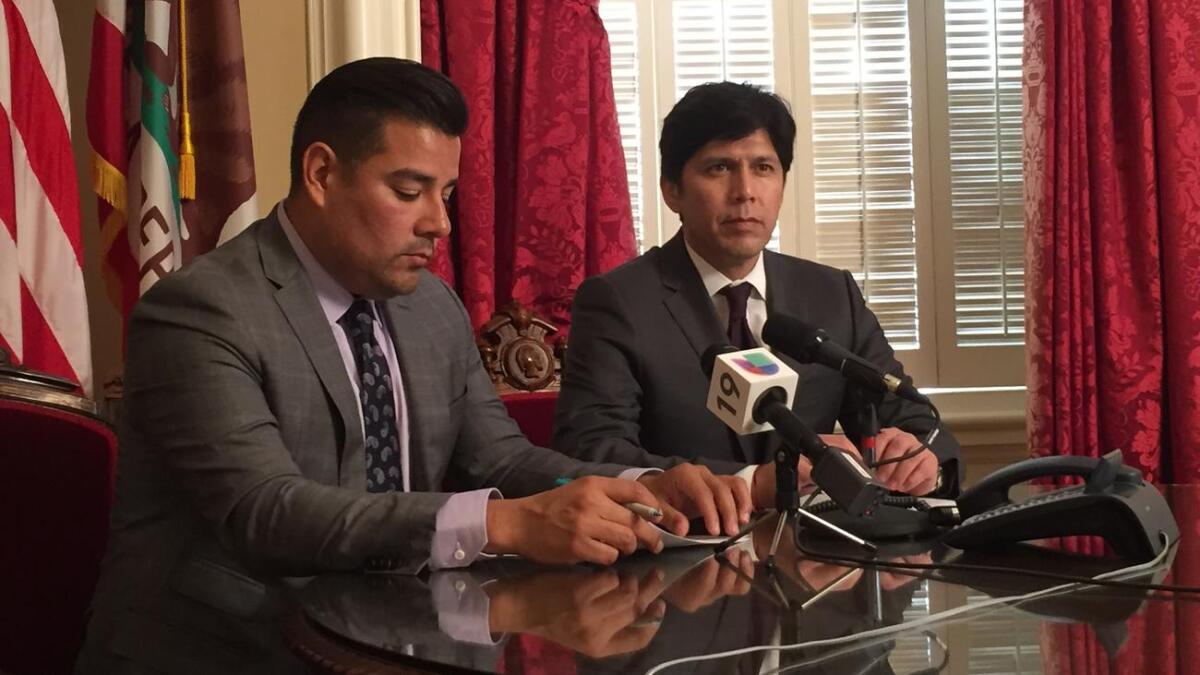
California Atty. Gen, Kamala Harris on Thursday landed endorsements for her U.S. Senate bid from three prominent current and former state politicians: state Senate President Kevin De Leόn, Sen. Ricardo Lara and former Assembly Speaker Fabian Núñez.
The endorsements from some of the state’s most influential Latino politicians are a coup for Harris, who remains the front-runner in the Senate race. Still, recent opinion polls show Orange County Rep. Loretta Sanchez remains much stronger among Latino voters.
“Kamala is a leader for all Californians,” De Leόn (D-Los Angeles) said in a statement released by the Harris campaign. “In this political climate that’s been defined by fear and divisive attacks, I’m proud to stand with Kamala Harris -- someone who proudly fights for the best ideals of our state and our democracy.”
Lara (D-Bell Gardens) praised Harris’ work protecting the rights of immigrants, and Núñez noted her efforts to crack down on polluters and protect the environment.
Riverside County GOP tweets picture of executioner ‘Ready for Hillary’

The Riverside County Republican Party tweeted out a picture of a shrouded hangman holding a noose, with a caption below saying, “I’m Ready for Hillary.”
According to the Riverside Press-Enterprise, the tweet was sent out by the county party’s official Twitter account at 2 p.m. Wednesday. The tweet has since been removed.
Riverside County GOP Chairman Scott Mann said he was “horrified” by the tweet, and promised to take action against the person responsible.
“I was made aware of derogatory tweet this afternoon toward Secretary Clinton when the Press-Enterprise called me for comment. I was horrified and had the tweet taken down immediately,” Mann said in an email to the Times on Wednesday afternoon. “While some may think it was political satire, it clearly has no place in American political dialogue. As chairman of the Republican Party of Riverside County, I apologize to everyone and anyone who was offended by it.”
According to the Press-Enterprise, Mann’s response earlier in the day was much different. The paper reported that in an email he stated: “That meme is nothing more than political satire. It simply expresses how Ms. Clinton seemingly has gotten away with every scandal and political flip-flop in her public life — from classified email and Benghazi to her changing positions on healthcare, TPP, NAFTA, gay marriage, etc.”
Howard Katz, chairman of the Riverside County Democratic Party, called the tweet a dangerous provocation. Republican presidential nominee Donald Trump already has condoned violent attacks against protesters at his rallies, Katz said.
“If you listen to Trump and you listen to his followers, ‘lock her up’ and all that, I don’t see any way you can read this as anything other than it being a threat,” Katz said. “It’s not satire. They should know better.”
After meeting Colorado governor, California Senate leader has concerns about legalizing recreational pot

A chance meeting with the governor of Colorado has left California Senate leader Kevin de León (D-Los Angeles) with concerns about an initiative that would legalize the recreational use of marijuana in this state, he said Wednesday.
“I’m not there yet,” De León told reporters when asked his position on Proposition 64. “I don’t know if I am behind the times in comparison to other folks, but I still have my concerns.”
De León said that on a flight back from last month’s Democratic National Convention in Philadelphia he was seated next to Gov. John Hickenlooper of Colorado and the two had a long discussion about the effect of a pot legalization measure approved in that state. The governor had opposed legalization, and said last year that his state’s decision to approve it in 2012 was a “bad idea.”
Hickenlooper has since softened his position, saying the regulatory system “might work.”
“We had a very comprehensive conversation,” De León told reporters during a Capitol press briefing. “I still have my concerns.”
He said he worries that the recreational pot being sold these days is much more potent, leading to a spike in emergency room visits in other states. He also is concerned about the sale of pot edibles in the forms of gummy bears and other candy that might attract minors.
“These are real-life consequences,” he said.
Jason Kinney, a spokesman for the Proposition 64 campaign, said it specifically prohibits making edibles “designed to be appealing to children or easily confused with commercially sold candy.”
Addressing other bills on vices, De León said Wednesday that he is in no hurry to approve the legalization of Internet poker and fantasy sports sites in California. A poker bill is pending in the Assembly.
A bill allowing fantasy sports websites missed a key deadline for approval by a policy committee, according to Dan Reeves, the chief of staff for De León.
“The author pulled the bill from a hearing so technically it’s dead,” Reeves told reporters.
Assemblyman Adam Gray (D-Merced) could still revive the bill this year, Reeves noted. Trent Hager, a chief of staff for Gray, said in a statement that the Internet poker bill will be brought up on the Assembly floor Monday “and we will continue to work to move both consumer protection pieces forward.”
Asked if he wants to put a regulatory system in place to allow fantasy sports games, De León said he was “not in a rush for anything.” He made the same comment on the Internet poker bill.
Meanwhile, De León said that if the Legislature is unable to come up with a deal to finance transportation needs by the end of the regular session on Aug. 31, the matter could be taken up after that date in a special session called by the governor.
State lawmakers are warned that California’s 911 system needs cash, and soon

California is running out of money for 911 emergency services and lawmakers need to find a solution, industry and local government representatives said Wednesday in a hearing at the state Capitol.
By the end of the fiscal year, California will have depleted its 911 fund to less than $11 million, down from nearly $77 million three years ago. The fund covers the majority of costs for 911-related equipment and services in most local communities.
California is transitioning to an updated 911 network, known as Next Generation 911, to better accommodate wireless callers. It will also allow users to send texts, video and other electronic data.
Over the next five years, the state’s Office of Emergency Services estimates transitioning to the new system while maintaining the old network could cost more than $900 million, said Assemblyman Freddie Rodriguez (D-Pomona).
Part of the updates to the network include improving location tracking services. Although many consumers can already track their own location on their smartphones, it will take five to six years for the 911 network to trace calls and text messages from cellphones at that level, said Steve Carlson, a representative from a trade group that represents wireless providers.
As the technology used by Californians to communicate with emergency responders changes, 911 networks need a flexible funding source to keep up, representatives from police and fire departments said.
California funds its 911 services through a tax on phone bills. Representatives of the telecommunications industry asked lawmakers to consider other funding options, including from a general tax fund and from grant funding.
“While the 911 system is changing, the funding mechanism for the program that was passed in 1976 has essentially stayed the same,” Rodriguez said.
Senate leader frets over plan for regional electricity grid
State Senate leader Kevin de León said Wednesday he isn’t yet sold on Gov. Jerry Brown’s effort to create a regional electricity grid intended to increase cooperation between California and five other states.
“If we do this, we need to make sure we do it right,” De León (D-Los Angeles) told reporters. Brown has been working on a plan since last year in hopes of expanding the reach of clean energy, allowing solar and wind power to be generated around the region. But there are concerns the plan would bolster a utility that relies on coal power plants and allow dirtier electricity into California.
It also would reduce California’s control over its own electricity grid, a sticking point in a state that suffered through an electricity crisis in 2000 and 2001.
While De León said he supports Brown’s plan in theory, he added, “Our climate leadership in California cannot be undermined. We can’t go two, three, four steps backwards to reach a deal for regionalization.”
The issue could come before the Legislature this month as lawmakers finish their work for the year.
De León also said he would continue pushing for new legislation to extend and expand targets for reducing greenhouse gas emissions. The issue has been the subject of intense negotiations, and oil companies have attempted to undermine regulations requiring cleaner fuels as part of reaching a deal. De León said he opposes that.
“One way or another, it’s going to get done,” he said. “The key thing here is making sure we don’t negotiate a bad deal just to get something done.”
Children, mothers march at the state Capitol to extend overtime pay for domestic workers
Holding balloons and chanting, dozens of children marched on the state Capitol grounds Wednesday in support of a bill that would extend California’s law mandating overtime pay for domestic workers.
Their mothers were in tow, pushing strollers, carrying babies, and holding signs. The rally, organized by the California Domestic Workers Coalition, was held to gather support for a bill by state Sen. Connie Levya, (D-Chino).
SB 1015 would continue requirements that housekeepers or nannies be paid overtime for working more than 9 hours in a day or 45 hours in a week.
Gov. Jerry Brown signed the original law in 2013, but it’s scheduled to expire next year without action from lawmakers before the adjourn at the end of August.
Among the marchers were Blanca Perez, 37, and Maria Barranca, 40, who have worked cleaning houses in Sacramento and across the state. They said they came with their children to support other domestic workers fighting for fair pay.
“More than anything, we want to show support,” said Barranca.
Rep. Karen Bass launches online petition demanding Trump take a ‘psych evaluation’
Republican Rep. Steve Knight calls Trump’s comments on Khan family ‘deplorable’
Rep. Steve Knight (R-Lancaster) has called Republican presidential nominee Donald Trump’s verbal attacks on the family of a Muslim American soldier killed in Iraq “deplorable” after his congressional challenger called for the congressman to disavow Trump.
Democrat Bryan Caforio on Monday called for Knight “to disavow his party’s nominee’s comments immediately and without reservation” and said it was “disappointing” that Knight remained “silent about Trump’s inability to serve as commander in chief while his party’s leader attacks our fallen heroes.”
Knight, who had been largely silent about his stance on his party’s nominee, released a statement late Tuesday criticizing Trump’s comments.
“As someone that has attended funerals and spoken with families of police officers and service members that have lost their lives in service, I recognize the long-term pain that is felt by those that suffer the loss of a family member,” Knight, a former LAPD officer, said in the statement.
“To the Khan family and every other family that has suffered a loss like this I am sorry and pray that you will be comforted in knowing that the loss was in hopes of achieving a greater good,” he said.
“The recent comments of Mr. Donald Trump toward the Khan family are deplorable. No matter what happens with the upcoming election, it is my hope that Trump will seek to learn more about Gold Star families and the pain that they feel not for just a moment of learning of the loss of a loved one, but a pain that is felt for the rest of their lives,” he said.
Knight’s political consultant Matt Rexroad said that Knight has not endorsed a candidate for president.
“I don’t know that he is planning to endorse anyone,” he said.
Caforio, a first-time candidate, is running against Knight in the 25th Congressional District in north Los Angeles County. Once a solid Republican stronghold, the sprawling district is now almost evenly split between Democrats and Republicans, with 21% of voters listing no party preference.
Oops! California secretary of state accidentally told two candidates they are on the November ballot
California Secretary of State Alex Padilla’s office mistakenly told two congressional candidates in July that they had made it onto the November ballot.
Padilla’s spokesman blamed a clerical error for issuing a letter of nomination to candidates who actually came in third place during the June 7 primary.
In the 29th Congressional District it was Joe Shammas who was told he would be challenging Rep. Tony Cardenas (D-Los Angeles) in the fall. Actually, Democrat Richard Alarcon came in second place, besting Shammas, a fellow Democrat, by 1,550 votes.
In the 30th District, Democrat Patrea Patrick got a letter saying she’d won and would face Rep. Brad Sherman (D-Porter Ranch) on the Nov. 8 ballot. But in that race, Republican Mark Reed finished second, ahead of Patrick by 6,830 votes.
The secretary of state had a July 15 deadline to certify the results of the June 7 primary election. California law advances the two candidates who received the most votes in the primary, regardless of party.
Secretary of state spokesman Sam Mahood said by email that both candidates were issued “a certificate of nomination due to clerical error in our elections division. The error was identified and corrected.”
Mahood said the mistake occurred when an employee misread a printed copy of the election results.
Shammas told The Times that he received the letter July 19, and when he called the secretary of state’s office to verify it he was initially told that there was no error and that he would be on the ballot.
Hearing that, Shammas restarted his campaign website, purchased yard signs and posters, and resumed campaigning. On Monday, he received a follow-up letter from the secretary of state’s office explaining that he would not be on the ballot and asking him to return the original letter.
“Is this how business is done? I just don’t understand this at all,” Shammas said. “I don’t know how they could make a mistake. This has cost me money, caused me a headache.”
He was able to cancel the order for the signs and posters but will still have to pay a fee.
Congressional challenger calls on Republican Rep. Steve Knight to disavow Donald Trump
Now that Donald Trump is officially the Republican nominee for president, some down-ballot GOP candidates are being called on by their Democratic opponents to denounce his remarks after he spent the weekend trading barbs with the parents of a Muslim American soldier who died in Iraq.
Rep. Steve Knight (R-Lancaster), who is facing a tough race against Democrat Bryan Caforio in the 25th Congressional District in north Los Angeles County, was called on by Caforio “to disavow his party’s nominee’s comments immediately and without reservation.” The district is almost evenly split between Democrats and Republicans, with 21% of voters listing no party preference.
Caforio said it was “disappointing” that Knight remains “silent about Trump’s inability to serve as commander in chief while his party’s leader attacks our fallen heroes.”
“Congressman Steve Knight’s continued silence calls into question whether he can stand up for and protect families of California’s 25th,” Caforio said in a statement released Monday.
Knight, a first-term congressman and former state senator, was on the fence about Trump in May when he told The Times he was still “working on figuring out what I am going to do with the presidential race.”
“We still got a convention,” he said that month. “And they are not going to cancel the convention, and he still hasn’t gotten enough delegates. So until that happens, I think this is a moot point, I think this is something for sensationalism.”
With the conventions over, where does Knight stand now?
“Knight has not endorsed anyone for president. I just confirmed that,” said Knight’s political consultant Matt Rexroad.
Rexroad said that Knight has not endorsed a candidate for president in the past.
“I don’t know that he is planning to endorse anyone,” he said.
Rexroad said he had “no response” on Caforio’s call for Knight to disavow Trump.
Caforio’s campaign has also called for six debates before election day. Rexroad said Knight’s campaign is “working on the debates.”
“They certainly will be debating,” he said.
Caforio, an attorney and first-time candidate for public office, seems to be running the playbook set out by Democratic National Campaign Committee Chairman Rep. Ben Ray Luján of New Mexico at the Democratic National Convention last week.
Speaking to voters who “don’t consider themselves Democrats,” Luján said:
“If your member of Congress is supporting Donald Trump instead ask yourself this: What does that say about their leadership, their character, their values?
“If they won’t even stand up to Donald Trump, what makes you think they will stand up for you and your family?” he said.
South Bay assemblyman says he won’t vote for Donald Trump or Hillary Clinton
Late last week, after the dust had settled on the Republican and Democratic national conventions, Assemblyman David Hadley (R-Manhattan Beach) made an announcement: He won’t vote for either party’s presidential nominee.
“Here is the bottom line: I am not voting for either Secretary Clinton or Mr. Trump,” Hadley wrote in an op-ed in the Daily Breeze. “Both have shown themselves unfit for the highest office in the land. Neither reflects the South Bay values that this citizen legislator is trying to bring to Sacramento.”
Hadley is facing a competitive reelection campaign against Democrat Al Muratsuchi, who Hadley defeated in 2014 and who has repeatedly challenged the first-term assemblyman to denounce Donald Trump.
Muratsuchi even set up a website, HadleyTrump.com, to feature videos of Hadley silently grinning when asked for reaction to Trump’s comments.
In the op-ed, Hadley said Trump “is a recurring litany of insults, provocation and polarization,” and he said Hillary Clinton endangered members of the American military because of her email practices when she was secretary of State. In the final line of the piece, Hadley urges citizens to vote in November.
But Dylan Gray, a spokesman for the Hadley campaign, said the assemblyman has not yet decided whether he will vote for a third-party contender, a write-in candidate or abstain from voting in the presidential race.
Hadley will, however, cast a vote in the down-ticket races, including state and local offices, and will weigh in on ballot initiatives, Gray said.
Initiative legalizing recreational use of marijuana could someday result in pot ads on TV
Nearly a half-century after tobacco ads were kicked off television in the United States, an initiative in California would take a first step toward allowing TV commercials promoting pot to air alongside advertisements for cereal and cleaning products.
Proposition 64, which is on the November ballot, would allow people age 21 and older to possess and use up to an ounce of marijuana and would allow pot shops to sell cannabis for recreational use.
The initiative also includes a provision that could someday allow cannabis sellers to advertise their products in print ads, on digital sites and on radio and television stations.
State teachers union has given more than $13 million to extend income taxes on wealthy Californians
California’s largest teachers union has given more than $13 million to the effort to extend income tax hikes on California’s highest earners, according to newly released state campaign finance reports.
The report shows the California Teachers Assn. gave $3 million between April and June this year, in addition to the $10 million the union donated last month.
Before the $10-million contribution, supporters of the Proposition 55 campaign reported having $14 million in the bank. Also supporting the measure are the California Hospital Assn., Service Employees International Union and the California Medical Assn.
Proposition 55 would extend temporary taxes first approved by voters in 2012 by 12 years. Single filers earning more than $263,000 a year and joint filers reporting more than about $526,000 would continue to pay higher rates through 2030. The independent Legislative Analyst’s Office has estimated Proposition 55 could bring in as much as $7.5 billion in tax revenue by 2019.
The state budget passed in June doesn’t rely on the tax passing, but Gov. Jerry Brown’s administration has warned the state could see deficits if the ballot measure doesn’t win on Nov. 8.
So far, there is no organized opposition to Proposition 55.
Gov. Jerry Brown sells his Oakland home for a loss
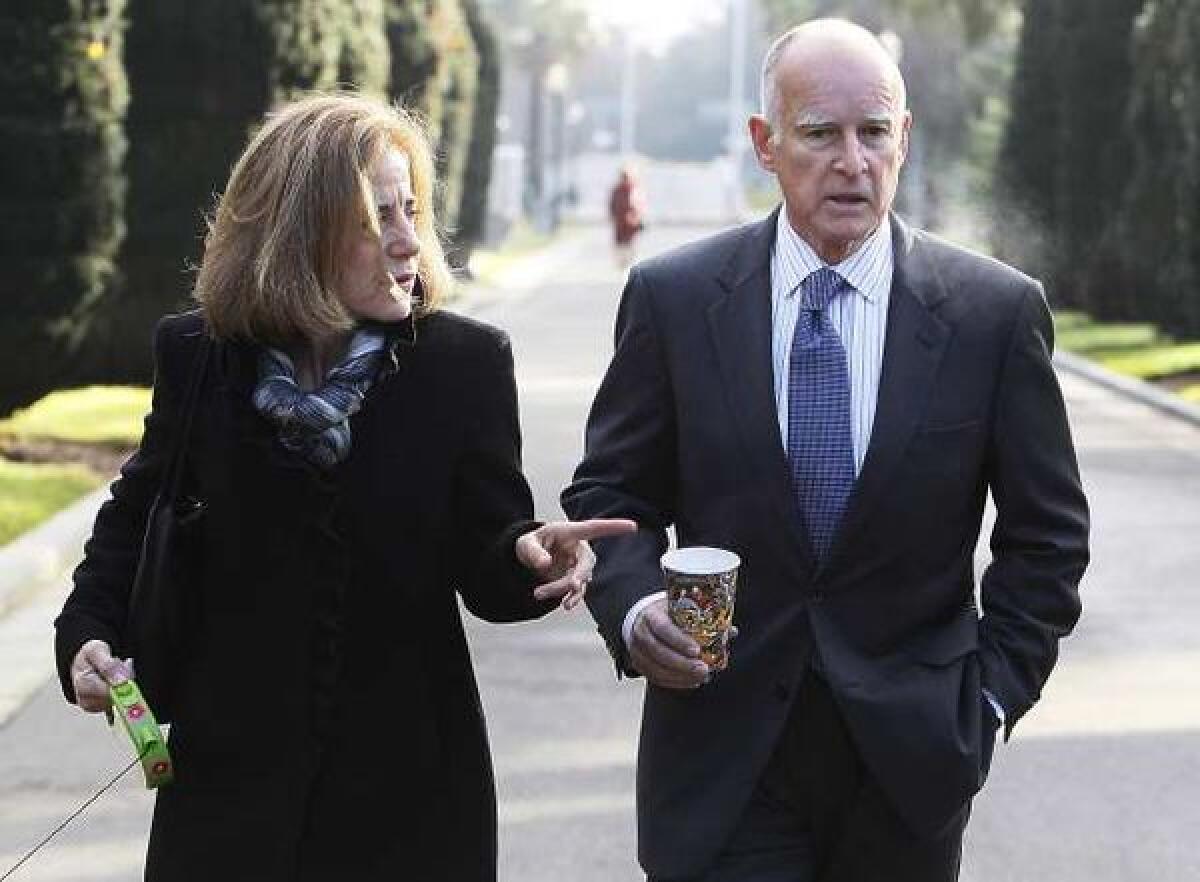
Gov. Jerry Brown is no longer an Oakland homeowner.
The governor and First Lady Anne Gust Brown closed on the sale of their Oakland Hills home last week, completing the journey that began late last year when the first couple moved into the historic governor’s mansion in Sacramento.
The real estate website Curbed San Francisco reported on Monday that the 4,147-square-foot home closed on July 30 with a sale price of $2.375 million. That’s less than the Browns were asking for the home when it went on the market in April, and also slightly less than they reportedly paid for it in 2007.
The governor was mayor of Oakland for eight years between his stints as chief executive of the state and after his last presidential campaign in 1992. Brown’s family also owns land in Colusa County and the governor is fond of talking about his ancestral ties to the rural property.
For now, though, home is officially the renovated governor’s mansion. Brown’s father, the late Edmund G. “Pat” Brown, was the last governor to spend any significant time there. The younger Brown never lived in the mansion with his parents, but visited and studied for the bar in a small room on the top floor.
A spokesman for the governor said Monday the mansion is now the couple’s official address, and that both Brown and his wife have mailed the change in their voter registration.
Competing death penalty ballot measures reel in $6 million
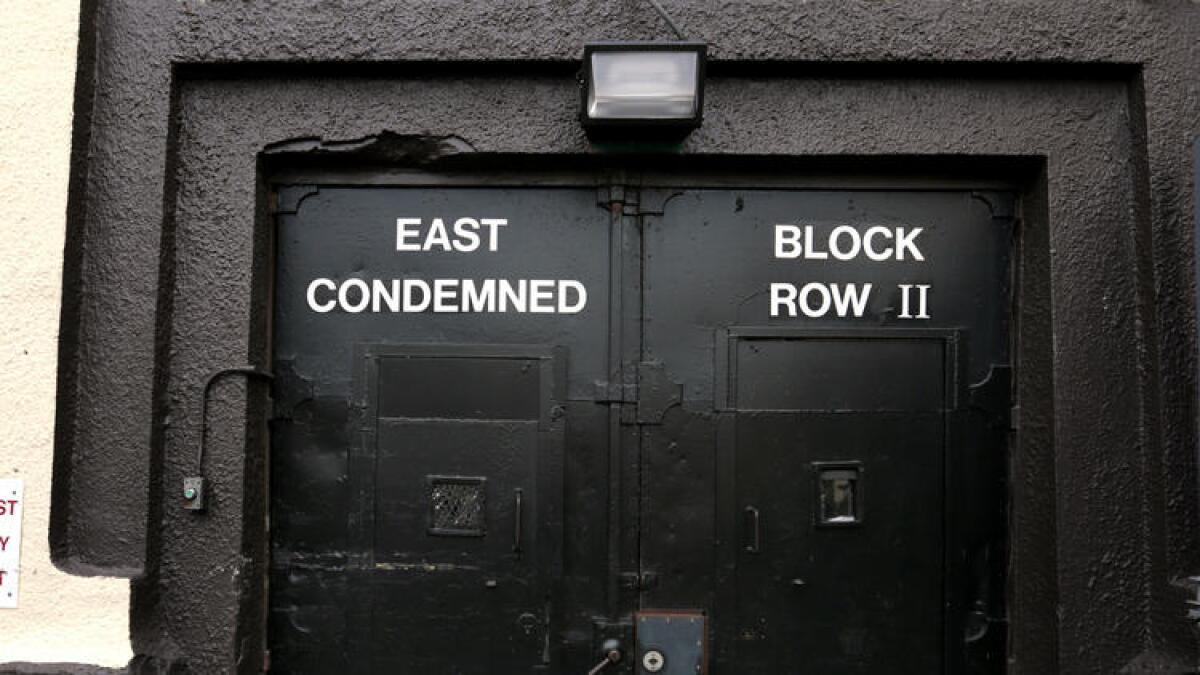
Campaign contributions poured into dueling death penalty campaigns in California, reaching more than $6 million as of June 30, according to the latest campaign finance reports.
The highest total amount of contributions -- $3.6 million so far in 2016 -- has flowed to Proposition 62, which seeks to abolish capital punishment and replace it with life in prison without parole. The Nov. 8 ballot measure reported raising $1.3 million in donations during the latest reporting period, which spanned from April to June.
But campaign efforts to stop Proposition 62 and pass Proposition 66, which seeks to speed up executions through limited and expedited appeals, have not been far behind, pulling in $2.4 million in total contributions this year. Of that, $2.2 million came in during the latest reporting period.
Nearly $66 million in campaign cash to kill a prescription drug ballot measure in November
Opponents of a ballot measure that would limit how much pharmaceutical companies can charge state agencies for prescription drugs had nearly $66 million on hand in June.
The campaign against Proposition 61 reported Monday it had $65.9 million in cash as of June 30. That far outpaced supporters of the measure, whose own campaign filing reported a little more than $7 million.
Proposition 61 would prevent state agencies from paying more for a drug than the price paid by the U.S. Department of Veterans Affairs.
Drug manufacturers, including Merck, Pfizer and AbbVie, are among the largest funders of the opposition campaign.
Supporters of California gun control initiative have big fundraising lead over opponents
Tapping some high-profile donors, supporters of a California gun control initiative on the November ballot have a huge head start over opponents in campaign fundraising, according to financial reports filed Monday with the state.
Lt. Gov. Gavin Newsom’s Safety for All Committee reported it has raised $3.8 million so far, compared with $467,000 raised by two committees opposing Propostion 63.
Proposition 63 would ban possession of high-capacity ammunition magazines, require background checks for Californians buying bullets, create a process for getting felons to relinquish firearms and mandate reporting of lost or stolen guns.
One opposition committee, the Coalition for Civil Liberties, was formed by the California Rifle and Pistol Assn. and has raised $229,000, including $45,000 from the National Rifle Assn. A second opposition group was formed by the Firearms Policy Coalition Second Amendment Defense Committee and has raised $238,000, receiving dozens of contributions, many of which are $25 or $100 each, from regular Californians including teachers, engineers, attorneys, physicians and clerks.
Newsom’s campaign committee has received $1.1 million from the California Democratic Party, $732,000 from Newsom’s lieutenant governor campaign committee, and $400,000 from former Facebook President Sean Parker.
Lt. Gov. Gavin Newsom, Treasurer John Chiang sitting on millions for 2018 bids for governor
State Senate advances bill that would allow selfies at the ballot box
Assemblyman Roger Hernández out on medical leave following domestic violence accusations
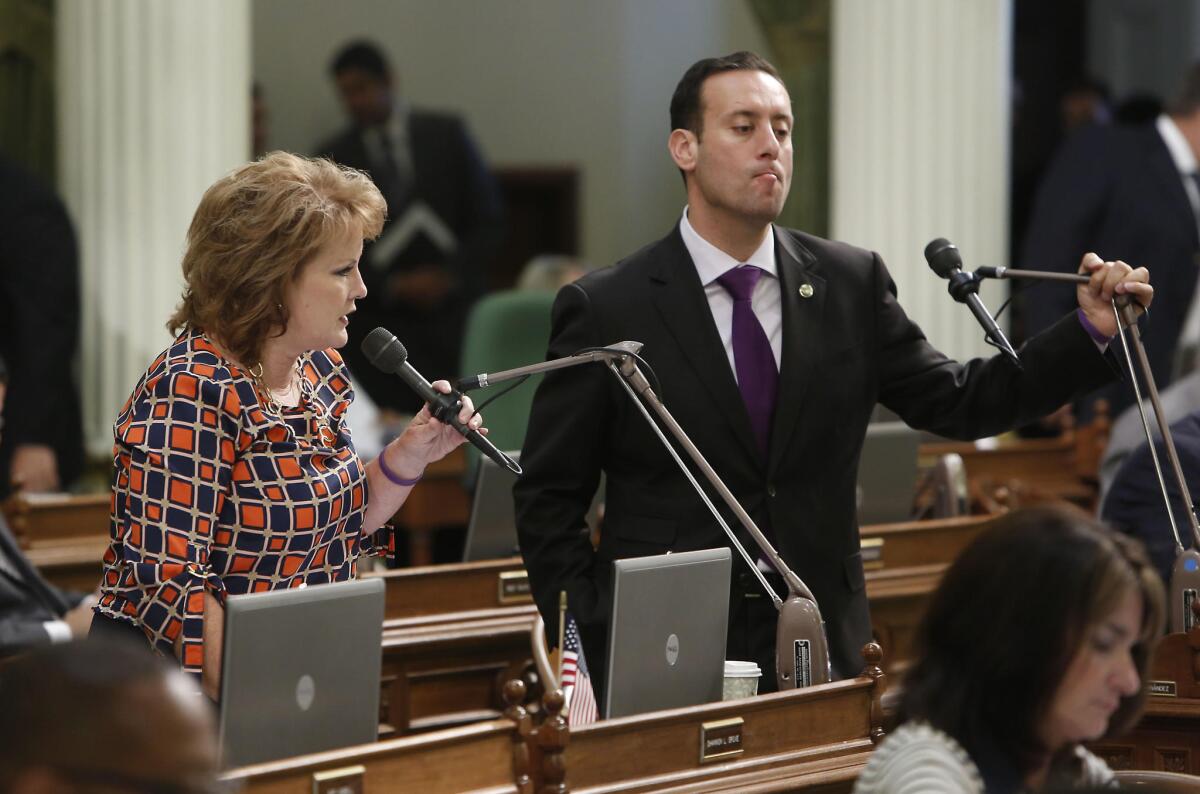
Embattled San Gabriel Valley state Assemblyman Roger Hernández (D-West Covina), who was stripped of his committee assignments earlier this summer after a judge issued a domestic violence restraining order against him, was out on medical leave as the state Legislature reconvened Monday.
John Casey, a spokesman for Assembly Speaker Anthony Rendon (D-Lakewood), said Hernández submitted a note from his doctor seeking to have him excused from work for a week and a half.
Dayana Partida, Hernández’s deputy district director, would not disclose the cause for the medical leave, citing privacy concerns.
She said there is no expected date for Hernández’s return. The Assembly is set to adjourn at the end of the month.
“His return will be determined by his doctor,” she said.
Rendon removed Hernández from his post as chairman of the Committee on Labor and Employment in July after a judge ordered Hernández to stay away his ex-wife for three years when she came forward with claims that he severely beat her during their marriage.
Los Angeles County Superior Court Judge Shelley Kaufman said he found the claims by Baldwin Park City Councilwoman Susan Rubio to be credible.
Shortly after the restraining order was issued, Hernández lost the endorsements of several fellow lawmakers who had previously backed his campaign for Congress.
Hernández, who will leave the Assembly after this year because of term limits, will face nine-term incumbent Rep. Grace Napolitano in November.
Hernández has kept a low profile since the July ruling.
He left the country for a period, though his office will not say where he was, and he has not held campaign events.
State ethics watchdog investigating claims that L.A. assemblyman coordinated with independent expenditure committee
The California Fair Political Practices Commission confirmed it is investigating allegations that Assemblyman David Hadley illegally coordinated with an independent expenditure committee supporting him.
In a letter to the Hadley campaign, the FPPC said it has “not made any determination about the allegations” made in a complaint filed three weeks ago, but that a “full investigation” has been opened.
Hadley’s opponent, Democrat Al Muratsuchi, filed the complaint, which alleged that Hadley consultant Steven Presson was also being paid by Spirit of Democracy, a political committee funded largely by Republican donor Charles Munger Jr.
On the same day Spirit of Democracy first reported spending money to support Hadley, Presson refunded his $4,000 in consulting fees to the committee. The Hadley campaign has paid Presson $35,000 so far this election cycle.
State law prohibits candidates’ official campaigns from coordinating with independent expenditure committees, which are allowed to spend unlimited amounts of money on political campaigns. The rules governing coordination were tightened last year, and now presume coordination is occurring when committees share a consultant.
A spokesman for Hadley’s campaign confirmed it had received the letter, but declined to comment further on the matter.
There’s no indication of whether the ethics panel will complete its investigation before the contentious Nov. 8 election between Muratsuchi and Hadley, who are battling over the beach town swing district in the Los Angeles South Bay. Most FPPC investigations are concluded within 6 months, said spokesman Jay Wierenga.
Yes, Pokemon even on the floor of the state Assembly
Drone manufacturers pushing back against regulations at state Capitol

As drones multiply in number and category, cities and states want to set boundaries. But pushback to statewide regulations is coming from the lobbying efforts of a budding industry that hopes to influence policy at the state Capitol and nationwide.
Drone manufacturers and associations this legislative session boosted their politicking, successfully beating back several bills they said would create a patchwork of laws that vary by state and hinder innovation.
DJI Technology Co. and GoPro, a body-wearable camera maker working on its own drone, doled out more than $125,000 for the first time to hire lobbying firms. And even Google and Amazon have added the unmanned machines to their lobbying priorities.
Some big developments could be protected from long lawsuits if this state bill passes
A handful of big developments could mark the Los Angeles skyline years sooner than planned if state lawmakers pass a bill intended to cut down on lawsuits against mega-projects in California.
The developments, including a $1-billion skyscraper at Crossroads of the World in Hollywood, would likely qualify to shorten lawsuits under the California Environmental Quality Act to no longer than nine months.
The perk, proponents say, would shave years off development timelines. But critics are upset that only large projects would get a special benefit.
From climate change to voting rules, here’s some of what we’re watching as the Legislature reconvenes
They’re back and they’re in a hurry.
Legislators reconvene on Monday afternoon after a month long summer recess, with hundreds of bills to consider and a strict Aug. 31 deadline by which to wrap up their work for 2016.
Some of the debates could set the course for years on major public policy issues. Others are narrowly focused efforts, aimed at issues that have driven news headlines for weeks.
And if this is like most end of session sprints, some will be last minute proposals hatched in private meetings and rushed to a final vote with little or no public notice.
It’s August, and everyone’s returning to Sacramento
After a relatively quiet few weeks in the state capital, things get going in earnest Monday as lawmakers race the clock to finish the legislative session.
We’ll be tracking every twist and turn in this space. If you’re interested in the presidential campaign, make sure to keep an eye on Trail Guide.
And of course, for a daily email blast of what to expect in California politics, sign up for our Essential Politics newsletter.